Session 2008/2009
Second Report
Committee for Social Development
Report on the Consultation
on the Implementation of the
Neighbourhood Renewal Strategy
TOGETHER WITH THE MINUTES OF PROCEEDINGS, MINUTES OF EVIDENCE
AND WRITTEN SUBMISSIONS RELATING TO THE REPORT
Ordered by Committee for Social Development to be printed 5 February 2009
Report: 14/08/09R (Committee for Social Development)
This document is available in a range of alternative formats.
For more information please contact the
Northern Ireland Assembly, Printed Paper Office,
Parliament Buildings, Stormont, Belfast, BT4 3XX
Tel: 028 9052 1078
Membership and Powers
The Committee for Social Development is a Statutory Departmental Committee established in accordance with paragraphs 8 and 9 of the Belfast Agreement, section 29 of the Northern Ireland Act 1998 and under Standing Order 48.
The Committee has power to:
- consider and advise on Departmental budgets and annual plans in the context of the overall budget allocation;
- consider relevant secondary legislation and take the Committee stage of primary legislation;
- call for persons and papers;
- initiate inquires and make reports; and
- consider and advise on any matters brought to the Committee by the Minister for Social Development.
The Committee has 11 members including a Chairperson and Deputy Chairperson and a quorum of 5.
The membership of the Committee since 9 May 2007 has been as follows:
Mr David Simpson MP (Chairperson) 2
Mr David Hilditch (Deputy Chairperson)
Mr Mickey Brady
Mr Alban Maginness
Mr Thomas Burns
Mr Fra McCann
Mr Billy Armstrong 3
Ms Carál Ní Chuilín 1
Mr Jonathan Craig
Miss Michelle McIlveen
Ms Anna Lo
1. With effect from 20 May 2008 Ms Carál Ní Chuilín replaced Mrs Claire McGill
2. With effect from 9 June 2008 Mr David Simpson MP MLA replaced Mr Gregory Campbell MP MLA as Chairperson of the Social Development Committee.
3. With effect from 29 September 2008 Mr Billy Armstrong replaced Mr Fred Cobain
Table of Contents
Report
Implementation of Neighbourhood Renewal
Summary of Responses to Consultation
Appendix 1
Minutes of Proceedings Relating to the Report
Appendix 2
Appendix 3
Questionnaire to Neighbourhood Renewal Partnerships
Appendix 4
Appendix 5
Correspondence from Committees
Appendix 6
Correspondence from the Department for Social Development
Appendix 7
Appendix 8
List of Neighbourhood Renewal Partnerships
Appendix 9
Executive Summary
The Neighbourhood Renewal Strategy was launched in June 2003 with the expectation that measurable improvements would be made to the quality of life for residents in some of the most deprived wards in Northern Ireland. Although much enabling work has been undertaken in the intervening years, it could be argued that little measurable improvement has been achieved.
The Committee undertook a review of the implementation of the Neighbourhood Renewal Strategy in response to concerns raised by some of the 36 Neighbourhood Renewal Partnerships. The Partnerships highlighted difficulties in relation to action plans; accountability of the statutory partners; the planned transfer of responsibilities from the Department for Social Development to local councils; the re-categorisation of Neighbourhood Renewal projects and the expected withdrawal of some funding.
The purpose of this report is twofold – firstly, to highlight the findings of the consultation into the implementation of the Neighbourhood Renewal Strategy and secondly, to set out recommendations for improvement to the delivery of the Neighbourhood Renewal Strategy.
The Committee’s report was centred on the following aspects of the implementation of Neighbourhood Renewal Strategy:
Targets - The Committee believes that the progress of the Neighbourhood Renewal Strategy must be measured against targets which are linked to area-specific deprivation indicators. The targets should cover the main social, economic, physical and community renewal objectives identified at the launch of the strategy. Action Plans should also be aligned to the achievement of these key deprivation improvement targets. The Committee recognises that improvements in deprivation indicators may, in some cases, take years to achieve. Nonetheless, the Committee believes that progress against targets and supporting activity should be reported regularly by all relevant stakeholders and that quick-wins should be identified in order to boost the confidence of the Neighbourhood Renewal stakeholders.
Budgets - The Committee recognizes that the Department for Social Development has committed significant resources to the delivery of Neighbourhood Renewal. To enhance the commitment of other funding departments, the Committee believes that additional service provision commitments for Neighbourhood Renewal areas should be made by other departments and that these should be supported by ring-fenced funding arrangements. The Committee also believes that ownership and understanding of the budget process at Neighbourhood Renewal Partnership level is essential and that the Department should do more to facilitate this. Furthermore, the Committee believes that consideration should be given to limiting the audit burden for small Partnerships and increasing resources to allow Partnerships to develop their management and service delivery capacity.
Governance - The Committee accepts that the commitment of resources across a number of departments will be essential if Neighbourhood Renewal objectives are to be achieved. The Committee believes that the current governance arrangements for Neighbourhood Renewal are ineffective in securing cross-departmental buy-in. The Committee believes that an alternative governance structure, including relevant members of the Executive should be considered. To supplement strategic leadership and to enhance delivery, the Committee believes that Memoranda of Understanding should be agreed between all relevant stakeholders including those at budget-holder level. The Committee believes that the Department should take steps to ensure that the proposed revised governance arrangements and improved delivery of the Neighbourhood Renewal Strategy are not frustrated by lengthy master planning processes.
Communication & Support - The Committee believes that the Department should revise its communication strategy and standardize the level and quality of service provided to Neighbourhood Renewal Partnerships.
Transfer to Councils - While the Committee’s review of the implementation of the Neighbourhood Renewal Strategy was ongoing, the Minister announced that, as part of the Reform of Public Administration some responsibilities for the delivery of the strategy would be transferred to the enlarged local councils. In response to the concerns of stakeholders, the Committee extended its review to consider this issue. The Committee believes that the community planning framework should be set out as soon as possible, as should the resources that are to be transferred to the enlarged councils. In order to further dispel concerns, the Committee urges the Department to publish the results of the pilot schemes involving the transfer of Neighbourhood Renewal to existing local councils and to commit to a wide-ranging consultation prior to the final transfer.
Recategorisation of Neighbourhood Renewal Projects - While the Committee’s review of the implementation of the Neighbourhood Renewal Strategy was ongoing, the Minister announced that some Neighbourhood Renewal projects were to be re-categorized and their funding to be discontinued. The Committee accepts that the Department should not undertake work which is the responsibility of other departments. The Committee contends however that prior to the discontinuation of support for these projects that the Department should identify the impact of the discontinuation of the funding; establish protocols for the transfer of responsibilities, and provide additional support to manage the transition.
Summary of Recommendations
“The Committee for Social Development makes the following recommendations to the Department for Social Development”
Recommendation 1
The Committee believes that the Department should devise relevant targets which are area-specific covering the main social, economic, physical and community renewal objectives of the Neighbourhood Renewal Strategy and agreed with relevant Neighbourhood Renewal stakeholders.
Recommendation 2
The Committee believes that the Department should devise a means of charting progress against area-specfic targets. Progress updates should be provided regularly and should form part of a reporting cycle for both Neighbourhood Renewal Partnerships and all relevant funding departments.
Recommendation 3
The Committee believes that the Department should consider a review of Action Plans with Neighbourhood Renewal Partnerships ensuring the development of costings and milestones for the agreed actions and the elimination of unrealistic or unachievable objectives.
Recommendation 4
The Committee recommends that the Department give serious consideration to the development of Neighbourhood Renewal quick wins (i.e. short term achievable goals) which will boost the confidence of Neighbourhood Renewal stakeholders.
Recommendation 5
The Committee strongly urges the Department to agree additional service provision commitments for Neighbourhood Renewal areas with all funding departments, which will be supported by ring-fenced budgets. The additional service commitments to be linked to area-specific targets and aligned with the funding departments’ PSA targets.
Recommendation 6
The Committee recommends that the Department facilitate enhanced ownership of budgets at Neighbourhood Renewal Area Partnership level through improved communication with Partnerships.
Recommendation 7
The Committee recommends that the Department considers a review of the grant application process including an assessment of the audit burden faced by Neighbourhood Renewal Partnerships.
Recommendation 8
The Committee recommends that the Department ensures that adequate budgets are available for training and improving the capability and service delivery of Neighbourhood Renewal Partnerships.
Recommendation 9
The Committee strongly urges the Department to consider revision of the governance arrangements for Neighbourhood Renewal so as to include a strategic tier involving relevant members of the Executive and an implementation tier involving budget-holding officials in appropriate departments.
Recommendation 10
The Committee recommends that the Department develops Memoranda of Understanding between Neighbourhood Renewal Partnerships, funding departments and other statutory partners – so as to ensure attendance at Neighbourhood Renewal Partnership board meetings; commitment from departments in relation to Action Plans and realistic expectations in respect of all stakeholders.
Recommendation 11
The Committee urges the Department to review its practices in respect of master plans as they affect Neighbourhood Renewal Areas so as to avoid decision-making paralysis and consequent unnecessary delays.
Recommendation 12
The Committee recommends that the Department reviews its communication strategy for Neighbourhood Renewal and standardizes the level and quality of service provided by Development Offices and the Neighbourhood Renewal Unit.
Recommendation 13
The Committee urges the Department to set out the community planning framework that is to be used by the enlarged councils to deliver Neighbourhood Renewal and ensure cross-departmental buy-in. The Committee further strongly recommends that every effort be made by the Department to preserve and enhance the valuable existing relationships between statutory partners and the Voluntary and Community Sector organisations involved in Neighbourhood Renewal.
Recommendation 14
The Committee recommends that the Department sets out the resources that it and funding departments will ring-fence for the enlarged councils in support of the community planning framework and the delivery of Neighbourhood Renewal.
Recommendation 15
The Committee recommends that the Department publishes the results of pilot schemes involving the transfer of Neighbourhood Renewal responsibilities to councils and to undertake a wide-ranging consultation prior to further implementation of the transfer.
Recommendation 16
The Committee recommends that the Department sets out the affects of the re-categorization of Neighbourhood Renewal projects in terms of the impact on Neighbourhood Renewal Partnerships. The Committee believes that the Department should establish protocols for the transfer of responsibility, for the re-categorized projects and provide additional support to ensure continuity of funding during the transfer.
Introduction
From May 2007, the Committee for Social Development received correspondence and briefings highlighting concerns relating to the implementation of the Neighbourhood Renewal (NR) Strategy.
The Committee sought clarification from the Department for Social Development in relation to the specific issues raised, and elected at its meeting of 27 September 2007 to undertake a review of the implementation of the NR Strategy. The review was to take the form of a consultation with key stakeholders including NR Partnerships and relevant statutory partners.
The Committee consulted with stakeholders on the following key aspects of the implementation of the NR Strategy:
- Targets and how progress was to be measured;
- Budgets and how these were to be linked to Action Plans; and
- Governance and the interaction between NR Partnerships and statutory partners
At its meeting of 15 May 2008, the Committee agreed to extend its review of NR to include the impact of the transfer of powers and responsibilities to local councils. The Committee sought responses from the Department of the Environment; the Office of the First Minister and deputy First Minister: and all 26 local councils.
At its meeting of 13 November 2008, the Committee agreed to further extend its review of NR to include the impact of the re-categorization of NR projects – specifically category 2 projects (which were identified as being aligned with NR objectives but for which the funding responsibility is deemed to lie with other departments). The Committee consulted with NR Partnerships and again sought responses from the Department for Social Development and other departments.
The Committee, at various times, advised the Department for Social Development of the feedback from stakeholders and actively sought engagement with the Department in order to better inform the Committee’s understanding of the issues raised.
This report has been produced in order to generate debate, highlight the issues affecting stakeholders, and set out helpful recommendations in respect of the implementation of the NR Strategy.
Background
In June 2003, the “People & Place – A Strategy for Neighbourhood Renewal” document was launched. Neighbourhood Renewal (NR) Strategies had been undertaken throughout the United Kingdom and had been targeted at communities suffering the highest levels of deprivation. The NR Strategy was intended to represent a move away from short-term project-led interventions (which characterized programmes in Northern Ireland such as Making Belfast Work) towards a long-term programme-based approach to tackle deprivation and close the quality of life gap. Lead responsibility for the NR strategy in Northern Ireland lay and continues to lie with the Department for Social Development.
The NR Strategy has 4 objectives:
- Community Renewal – to develop confident communities that are able and committed to improving the quality of life in the most deprived areas of Northern Ireland;
- Economic Renewal – to develop economic activity in the most deprived neighbourhoods and connect them to the wider urban economy;
- Social Renewal – to improve social conditions for the people who live in the most deprived neighbourhoods through better co-ordinated public services and the creation of safer environments; and
- Physical Renewal – to help create attractive, safe, sustainable environments in the most deprived neighbourhoods.
The illustrative targets for the NR areas, associated with each of the objectives are as indicated below:
- Community Renewal
- to increase the proportion of residents involved in community activities; and
- to increase the proportion of residents giving a positive assessment of community sector activities.
- Economic Renewal
- to reduce the proportion of the working age population suffering enforced exclusion from the world of work;
- to reduce the number of unemployed claimants;
- to reduce the proportion of long term unemployed claimants; and
- to match the Northern Ireland position of 76% of the working age population qualified to National Qualification Framework Level 2.
- Social Renewal
- to halve the gap in life expectancy between those living in NR areas and the rest of Northern Ireland;
- to reduce the Standardised Mortality Ratios;
- to increase the proportion of pupils gaining 5 or more GCSEs (A* to C), intermediate GNVQ or NVQ Level 2, in secondary schools serving NR Areas;
- to increase attendance rates to the average in secondary schools serving NR Areas to the average;
- to increase the proportion of pupils staying in school and further education;
- to eliminate the shortfall in pre-school provision in NR Areas;
- to reduce the overall crime rates to the Northern Ireland rate;
- to halve residents’ reported perceptions of the levels of crime and anti-social behaviour in their area;
- to increase residents reported level of security; and
- to reduce the income deprivation rate.
- Physical Renewal
- to stabilize the populations of the NR areas;
- to reduce the total area covered by derelict disused sites;
- to increase the satisfaction levels of residents with their area as a place to live; and
- to reduce the number of vacant properties.
The timescale for the achievement of these targets was indicated as being the duration of the NR Strategy – 7 to 10 years. The People & Place document also indicated that baseline studies would be undertaken in each NR Area in order to facilitate the development of more specific and measurable targets. Progress against these targets was to be reviewed regularly both for the overall strategy and for individual NR Areas.
The restoration of devolved government in Northern Ireland saw revised Public Sector Agreement (PSA) targets being set. Under PSA 6, the Department for Social Development is required by 2010 “in conjunction with other government departments, agencies and public bodies, to implement the Neighbourhood Renewal Strategy which aims to close the gap between the quality of life for people and marginalized groups in the most deprived neighbourhoods and the quality of life in the rest of Northern Ireland.”
Implementation of the
Neighbourhood Renewal Strategy
Following the launch of the People & Place document in June 2003, the Department for Social Development (DSD) undertook the implementation of the Neighbourhood Renewal (NR) Strategy, the key aspects of which are discussed below.
Selection of NR Areas
In response to feedback from the consultation on the NR strategy, the Department elected to target NR resources within the most deprived 10% of urban areas as measured by the Noble Multiple Deprivation Measures. Again, based on feedback from the consultation, the Department determined that the NR Areas should be a workable size; must complement and build upon existing initiatives and must “make sense to the people who lived in them”. It was further determined that NR Area boundaries could be finalized following local consultation. To facilitate this process and in recognition of existing regeneration work, it was determined that projects immediately outside the NR areas could continue to be supported if they contributed to the needs of the target area.
Where the most deprived urban wards were contiguous, they were combined into coherent groupings of more than 1000 inhabitants. Where the boundaries of the grouping coincided with an existing initiative, these boundaries were then used to define the NR Area. Where the boundaries did not coincide with an existing initiative, they were determined based upon the results of local consultation. Where deprived areas were too small to qualify as NR Areas, the Department agreed to provide funding for these areas at the same per capita rate.
Through the process described above, 36 NR Areas were established.
The NR Areas are as follows:
Belfast: Andersonstown; Colin (Poleglass and Twinbrook); Crumlin/Ardoyne (including the Lower Oldpark and Cliftonville); Falls/Clonard; Greater Shankill; Inner East Belfast; Inner North Belfast; Inner South Belfast; Ligoniel; Outer West Belfast; Rathcoole; South West Belfast; Tullycarnet; Upper Ardoyne/Ballysillan; Upper Springfield/Whiterock.
North West: Triax; Outer North; Outer West; Waterside; Limavady (Hospital Lane; Greystone Park and Roeview Park); Strabane (Fountain; Springhill Park and Ballycolman estates).
Other: Armagh (Callanbridge Park; Mullacreevie and Drumarg estates); Ballyclare (Grange and Thornhill estates); Ballymena (Ballykeel and Ballee estates); Bangor (Kilcooley estate); Brownlow (Craigavon); Churchlands (Coleraine); Coalisland; Coleraine (East – Ballysally and Milburn estates); Downpatrick (Flying Horse, Model Farm and New Model Farm estates); Dungannon (Ballygawley estate); Enniskillen (including Kilmacormick and Cornagrade); Lurgan (Edward Street, Hill Street and Russell Drive); Newry (Derrybeg, Carnagat, Daisy Hill and Mourneview Park estates); North West Portadown (Obins Street, King Street, Churchill Park and Woodside areas); Omagh (Gallows Hill and Campsie Road).
Neighbourhood Renewal Partnerships
For each of the NR Areas, a Neighbourhood Renewal Partnership was established. The Partnerships are designed to be representative of local community interests, appropriate government departments, public sector agencies, private sector interest groups and local political representatives. The Partnerships include balanced representation in respect of age, marital status, disability, political opinion, race, religious belief, sex, sexual orientation and family status.
Each NR Partnership is responsible for:
- analyzing and prioritizing the needs of their NR Areas;
- engaging and consulting local communities to drive and implement the NR Strategy;
- leading the process in the preparation of the Vision Statements and the 3 year NR Action Plans;
- overseeing the implementation of the Action Plans;
- publicizing and building awareness of the NR Strategy, across the target areas, with responsibility for informing local communities of progress made; and
- participating in the monitoring and evaluation of Vision Statements and Action Plans including reporting progress against their Action Plan targets.
The Vision Statement and Action Plans referenced above are intended to become the framework for the sustainable regeneration and development of neighbourhoods. The Vision Statements are to include a statement and analysis of the key challenges and priorities in the area having regard to the objectives and criteria of the strategy. The Action Plans are to detail and prioritise the activities and advise how the needs of the area are to be met and identify how projects could be best delivered i.e. by statutory, community/voluntary sector and private sector bodies.
Governance Arrangements
Although led by the Department for Social Development, NR is a multi-agency strategy, requiring partnership between statutory bodies and organizations in the voluntary and community sector. The governance arrangements for the NR strategy are set out below.
Cross-Departmental Group
To secure buy-in across government departments to the NR Strategy, the Department established a cross-departmental group led by the Minister for Social Development. The group is to provide strategic direction to the implementation of NR. The terms of reference of the group required members to provide leadership to ensure that NR was considered in all appropriate aspects of departmental business. Members of the group are required to drive the work of departments and agencies in ongoing negotiations with DSD to address key NR priorities. The cross-departmental group included representatives of the Department for Education and Learning (DEL); the Department for Regional Development (DRD); the Department for Education (DE); the Department for Agriculture and Rural Development (DARD); the Department of the Environment (DOE); the Department for Culture, Arts and Leisure (DCAL); the Department for Health, Social Services and Public Safety (DHSSPS); Invest NI; the Department for Finance and Personnel (DFP); the Department of Enterprise, Trade and Investment (DETI); the Northern Ireland Office (NIO) and the Office of the First Minister and deputy First Minister (OFMDFM).
NR Advisory Group
A Neighbourhood Renewal Advisory Group was also to be established. This was to advise the Ministerial group and was to be made up of representatives from some of the most deprived neighbourhoods, together with other experts and stakeholders. A single NR Advisory Group has not been established as originally planned. Instead individual Development Offices have established their own advisory groups
Neighbourhood Renewal Unit
The Department for Social Development manages the interface with NR Partnerships in Belfast through the Neighbourhood Renewal Unit and elsewhere through the three Regional Development Offices.
The role of the NR Unit within DSD is to set out broad policy parameters; oversee the implementation of the NR Strategy; establish strategic direction; develop planning frameworks and guidance and disseminate knowledge and experience of good practice in NR. The Unit is to make recommendations to the Minister at various stages of the NR process and also to report to the Minister on progress. The Unit is further required to provide ongoing advice and support on NR issues and to promote good practice between NR Partnerships in relation to regeneration issues.
The Unit is to work through the Ministerial Group with other departments to produce baseline information and develop appropriate outcome targets against which progress is to be measured, both for the strategy overall and subsequently for individual neighbourhoods.
Relevant monitoring and evaluation frameworks to support and facilitate reporting were to be developed. Working in partnership with the Voluntary and Community Unit and the Development Offices, the Neighbourhood Renewal Unit is also to facilitate appropriate awareness seminars for DSD staff as required.
DSD Development Offices
The DSD Development Offices (Belfast Regeneration Office, North West and Regional Offices) facilitated the establishment of NR Partnerships. Development Office staff also provide support and guidance to NR Partnerships e.g. in the production of Vision Statements and Action Plans and in local implementation. In liaison with the NR Unit, the Development Offices encourage the full participation of key statutory organisations in the NR Partnerships. The Development Offices determine whether NR Partnerships are ready to be accepted as a recognised Partnership and assess the appropriateness of NR Action Plans and administer funding from the DSD Neighbourhood Renewal Investment Fund.
A Development Office official sits on each NR Partnership in order to provide support and guidance in the implementation of NR, including:
- providing advice and support to the NR Partnership on DSD procedures.
- acting as a conduit between the NR Partnership and Government to facilitate communication.
- updating the Partnership as and when required on NR issues.
- ensuring emerging relevant issues are referred back to the Department for early action/resolution to facilitate the ongoing work of the Partnership.
Where necessary the Development Office official escalates issues to more Senior Officers for consideration and advice.
Working closely with colleagues in DSD’s Voluntary and Community Unit, the Development Offices help improve and develop the skills of people who are responsible for NR at a local level and encourage local communities to influence and become involved in NR. Activities include network meetings to share experience of what works, seminars on particular themes and topics, e.g. education, health, employability and study visits to other NR areas.
Directors in the Development Offices report to the cross-departmental group through the NR Unit, on the progress made in developing and implementing NR locally. The Department believes that the Development Offices play a pivotal role in supporting and strengthening public sector co-ordination in NR in their areas, and in promoting closer working relationships between the various bodies with an interest in regeneration.
Re-categorisation of Budgets
In March 2008, the Minister for Social Development indicated that it was her intention to redirect NR budgets to the priorities identified within NR Action Plans. Three year contracts were to be offered, subject to appraisal requirements to Category 1 groups, i.e. those delivering on NR priorities which fall within the functional responsibility of the Department for Social Development.
Category 3 groups, i.e. those which were deemed not to be delivering on NR priorities, were to have their funding discontinued by August 2008.
Those groups – termed Category 2 – were described as delivering on NR priorities but viewed by the Department as being another department’s funding responsibility and were to have their DSD funding discontinued by March 2009. The projects affected are identified in appendix 6.
Transfer to Councils
In April 2008, the Minister for Social Development advised the Committee that she intended to transfer responsibility for the delivery of NR from the Department to the enlarged local councils. Responsibility for policy development in respect of NR was to remain with the Department. It was indicated that the transfer had been identified as part of the Reform of Public Administration (RPA) proposals for local government. Although RPA proposals were not to be implemented until 2011, the Minister advised that she was considering testing the delivery of some NR functions by councils in advance of 2011 and was to undertake pilot projects in certain existing council areas.
The Minister also advised that she expected that by 2011 new community planning powers would be in place which would enable councils to secure the buy-in of statutory partners for NR and other strategies.
Summary of Responses to Consultation
Responses from Neighbourhood Renewal Partnerships in respect of the Implementation of Neighbourhood Renewal
At its meeting of 27 September 2007, the Social Development Committee agreed to issue a questionnaire to all 36 Neighbourhood Renewal (NR) Partnerships in respect of the implementation of NR[1].
32 partnerships responded. The key points raised were as follows:
Structure and establishment of partnerships
- Size of NR Area
Most partnerships felt that their NR Area was of a workable size, though some indicated that they would like more flexibility to link initiatives to other areas.
- Guidance from the Neighbourhood Renewal Unit
The majority of partnerships felt that the guidance provided by the NR Unit on the structure of the partnerships and the development of the Action Plans was adequate or better.
- Representation of key stakeholders on NR Partnerships
Most NR Partnerships felt that there was insufficient private sector or political representation on their board. Some NR Partnerships indicated that statutory representatives were not in a position to influence decisions within their own organization.
Technical Assistance
- Obtaining technical support
Just over half of the partnerships reported that the process for obtaining technical support was adequate or better. Other partnerships reported dissatisfaction with a perceived inflexible tendering process which in some cases excluded organizations that NR Partnerships had worked with previously.
- Action Plan development / completeness
Here again responses were mixed, with some partnerships reporting satisfaction in respect of the time allocated to developing Action Plans. Other NR Partnership indicated significant dissatisfaction in respect of the timing of the Action Plan consultation and the failure of statutory partners to buy-in to the Action Plan targets.
Operational Issues
- NR Networking / Training
Reaction to the Department’s provision of training, seminars and NR visits and networking opportunities among the NR Partnerships was mixed. Around half of the NR Partnerships indicated at the time of questioning, that they had not availed of the training or seminars provided by DSD or other providers. About half of the partnerships who responded indicated that they had undertaken study visits to other NR Areas.
- NR Unit & Development Office support / good practice advice
NR Partnerships were roughly equally divided with regard to their opinion of the support provided by the NR Unit and Development Offices. About half felt that information was communicated informally leading to occasional inconsistencies and some confusion.
Funding
- Budgeting
Two thirds of NR Partnerships appeared to believe that they were not working to an agreed budget but would welcome its introduction as essential in developing Action Plan priorities.
- Accessing funding
The majority of NR Partnerships criticized the process for applying for NR funding – citing bureaucracy, an absence of guidance and delays in responses to applications.
External Constraints
- Impact of RPA
NR Partnerships cited increased uncertainty among statutory bodies as an adverse impact of RPA – certain bodies being unwilling / unable to commit resources until the details of RPA were known.
- Involvement of larger regional voluntary organisations
Most NR Partnerships welcomed the involvement of larger regional voluntary organizations in the delivery of NR but were concerned in respect of NR funding being diverted.
Other Comments
- NR Partnerships repeatedly referred to patchy buy-in by other statutory bodies and suggested the development of inter-departmental targets;
- NR Partnerships also requested clarification / simplification in respect of funding – suggesting a lead agency for all NR funding with greater control by the NR Partnerships;
- NR Partnerships recommended ring-fenced funding from other statutory agencies for NR and the failure of statutory bodies to implement Action Plan targets;
- NR Partnerships commented on the need for, and difficulty in obtaining, matched funding.
Further consultation with NR partnerships in respect of the implementation of the NR Strategy was undertaken by the Committee on 5 June 2008. A summary of their responses is provided.
- Expectations
NR Partnerships believed that the expectations in respect of NR had been raised and were in imminent danger of being dashed. NR Partnerships recommended that the Department urgently consider the identification of short term goals for NR which would boost community confidence.
- Statutory participation
NR Partnerships believe that the participation of other departments has been inconsistent or poor. The NR Partnerships recommended:
- that departments be required to demonstrate in their spending plans how they are going to meet NR targets and that failure to engage in NR should lead to sanctions;
- that departmental budgets should be linked to Action Plan outputs and this money be ring-fenced (and that generous allowances be made for project slippage).
- Accountability
NR Partnerships recommended that there be a lead agency for NR spend and that the lead agency would ensure that:
- departments set out how their resources are to be reorganized to support NR;
- departments have service level agreements with Partnerships for the delivery of NR.
- there would be clear guidelines and processes for the strategic operational and financial implementation of NR for all departments
NR Partnerships also recommended that:
- the cross-departmental group should review and scrutinize the delivery of NR;
- NR should be a permanent agenda item on the Permanent Secretaries meeting;
- relevant Assembly Committees undertake scrutiny of NR in their department;
- Action Plans
NR Partnerships recommended the following in respect of Action Plans that:
- floor targets be developed for all Action Plans;
- all Action Plans be costed;
- all Action Plan be approved and adopted by the funding departments; and
- NR Partnerships have input into the identification of targets and outputs for the Action Plans.
- RPA and the transfer to councils
NR Partnerships recommended that there be consultation on the transfer to local councils and that the timeframe and necessary legislation be set out.
NR Partnerships recommended that councils be given responsibility for tackling deprivation but that the NR budget remain ring fenced, with the NR Partnerships having a larger degree of control of budgets.
NR Partnerships recommended that a deprivation sub committee with NR Partnership representation be developed for each enlarged council.
Responses from NR Partnerships in respect of the impact of the withdrawal of funding from Category 2 Projects
On 11 November 2008, the Committee wrote to NR Partnerships seeking information on the impact of the anticipated withdrawal of funding from so-called Category 2 projects. A very limited number of responses were received from NR Partnerships[2]. The Andersonstown NR Partnership indicated that the withdrawal of funding from Category 2 projects would have a significant impact – leading to a loss of funding of approximately £200k and up to 6 posts[3].
Response from the Department in respect of the impact of the withdrawal of funding from Category 2 Projects
In order to inform the Committee’s understanding of this issue, further information was sought from the Department in respect of Category 2 projects. The Department was unable to specify the number of posts that would be lost or the extent of the funding to be withdrawn, as this was still the subject of negotiation. The Department did however indicate that funding was to be withdrawn for 28 projects and that approximately 200 further projects had been identified as Category 2 and were the subject of negotiation[4]. The Category 2 projects have been identified in NR Areas throughout Northern Ireland and include youth services, health services, play groups, education services and community relations services etc.
Responses from other Departments in respect of the Impact of Neighbourhood Renewal on their Operational and Financial Planning Processes
Following the evidence sessions with NR Partnerships on 5 June 2008, the Committee wrote to the Department seeking, inter alia, details of how the NR Strategy impacted on the operational and financial planning processes of other departments and agencies. The Department obtained information from other departments, these are summarized below[5]:
- Department of Agriculture and Rural Development (DARD)
The Committee was advised that, as NR is an urban initiative, there had been no reprioritization of DARD’s agricultural and rural programmes.
- Department for Culture, Arts and Leisure (DCAL)
The Committee was advised that non-departmental bodies e.g. the Arts Council and Sports NI had worked with the NR Advisory Group to ensure alignment of policy with NR objectives.
- Department of Education (DE)
The Committee was advised that projects such as the Extended Schools programme were expected to lead to effective working relationships with key stakeholders such as NR Partnerships. It was also indicated that a funding protocol had been agreed between DSD and DE so as to avoid the relevant DSD-funded projects ending without any arrangements for exit strategies or sustainability.
- Department for Employment and Learning (DEL)
DEL advised that its programmes for dealing with unemployment and training needs were applied across all of Northern Ireland. DEL believed that its programmes would inevitably lead to an indirect improvement in employability for NR Areas. Targets for improvement, or data demonstrating a positive impact, for NR Areas were not available.
DEL also advised that the Strategy and Equality Branch acted as a liaison with NR Partnerships and had responded in detail to each Action Plan indicating the services that DEL could provide.
- Department for Enterprise, Trade and Investment (DETI)
The response from DETI indicated that Invest NI was actively involved with NR Partnerships. DETI had baselined Invest NI activity in NR Areas and was updating this monthly.
It was further indicated that Enterprise Northern Ireland was acting as the key liaison with NR Partnerships but that uptake of the services available from DETI were reported as being “minimal”.
DETI had set targets at NR Area level including – increasing the number of business start-ups; improving productivity of small business; and increasing the number of people, from all groups within society, starting up a new business.
- Department of Health, Social Services and Public Safety (DHSSPS)
The DHSSPS advised that involvement in NR was underway at senior official, board and trust level. The Committee was advised that targets had been set for NR areas in respect of life expectancy, teenage pregnancy and suicide rates. DHSSPS further advised that Departmental representatives were involved in the Belfast Strategy Group which is tasked with ensuring cross-governmental support and co-ordination of the Belfast NR Action Plans.
DHSSPS indicated that, although their use of the capitation formula deliberately skewed resources towards deprived localities such as NR Areas, DHSSPS were obliged to balance the needs of NR Areas against the needs of other deprived areas and certain population groups.
- Department for Regional Development (DRD)
DRD indicated that its involvement in NR was limited to issues such as lighting, street calming and local bus services. DRD did not make explicit provision within its financial or operational plans for NR.
- Office of the First Minister and deputy First Minister (OFMDFM)
OFMDFM indicated that NR had not as yet impacted on its operational and financial policies.
- Department of Finance & Personnel (DFP)
As the Department for Finance and Personnel is not a spending department in respect of NR, no return was made.
- Department of the Environment (DoE)
No return was made by the Department of the Environment.
Responses from Local Councils in respect of the proposed transfer of responsibility for Neighbourhood Renewal
The Committee wrote to local councils on 16 May 2008 and sought their views on the proposed transfer of responsibilities from the Department to councils for the delivery of the NR Strategy. 19 local councils responded. Generally (though not unanimously) the councils indicated that they favoured the transfer of responsibilities to local councils but commented adversely on the absence of consultation by the Department on this matter[6].
Findings & Recommendations
The findings and recommendations of the Social Development Committee’s consultation on the implementation of the Neighbourhood Renewal (NR) Strategy are summarized below.
Targets
The NR Strategy was launched with the expectation that a wide range of key deprivation indicators would be devised for each of the NR Areas. The success of the strategy was to be measured against these local NR Area targets. The Department has advised that a limited number of NR targets have been determined in relation to health (life expectancy gaps; suicide rate and teenage pregnancy), education (Level 4 and GCSE attainment), employability and skills (employment rate and qualification level); economic growth (new jobs and business start-ups)[7] and community renewal (reducing anti-social behaviour incidents ).
The current targets address some of the social and economic renewal objectives of the NR Strategy but do not appear to wholly address the physical or community renewal objectives as set out in the People & Place document.
The equivalent strategy in Scotland – the Community Planning Partnership programme - works to area-specific targets based on local circumstances and priorities in partnership areas[8].
Recommendation 1: The Committee believes that the Department should devise relevant targets which are area-specific covering the main social, economic, physical and community renewal objectives of the Neighbourhood Renewal Strategy and agreed with relevant Neighbourhood Renewal stakeholders.
In response to the Committee’s queries, other funding departments have highlighted the wide range of projects and other developmental activity in which they are engaged in NR Areas[9]. In order to measure the impact of this wide range of activity, the Department has advised that it is to monitor the progress of the NR Strategy against updated Noble Multiple Deprivation Measures which will not be available until 2010[10]. The Committee recognises that improvements in deprivation indicators may, in some cases, take years to achieve. Nonetheless, the Committee believes that progress against targets and supporting activity should be reported regularly by all relevant stakeholders
Recommendation 2: The Committee believes that the Department should devise a means of charting progress against area-specific targets. Progress updates shold be provided regularly and should form part of a reporting cycle for both Neighbourhood Renewal Partnerships and all relevant funding departments.
NR Partnerships commented at some length on the development of Action Plans. Some Partnerships believed that Action Plans did not include costings and were not linked to budgets. Consequently, Partnerships felt that some Action Plan objectives were unrealistic. Further comment was made in respect of the absence of time scales for Action Plan objectives[11].
Recommendation 3: The Committee believes that the Department should consider a review of Action Plans with Neighbourhood Renewal Partnerships, ensuring the development of costings and milestones for the agreed actions and the elimination of unrealistic or unachievable objectives.
The launch of the NR Strategy raised expectations among stakeholders. Although much work has been done, it may be argued that the NR Strategy has yet to deliver any measurable improvements to the NR Areas. Respondents to the Committee have indicated that as a consequence, engagement by some stakeholders appears to have lessened – particularly among the private sector[12].
To boost confidence in NR, it is suggested that the Department reaffirm the objectives of the NR Strategy; set out what this will mean for NR Areas and devise short-term achievable goals – so-called quick-wins. The quick wins could, in-line with their equivalent in Scotland[13], be linked to shorter term benefits and changes for citizens and the community resulting from the activities of the NR Partnership in the short to medium term.
Recommendation 4: The Committee recommends that the Department give serious consideration to the development of Neighbourhood Renewal quick wins (i.e. short term achievable goals) which will boost the confidence of Neighbourhood Renewal stakeholders.
Budgets
The Department’s PSA targets include a specific requirement to support NR. The Department has consequently committed a portion of its budget to the delivery of NR. Some, but not all, NR funding departments have adopted NR targets which align with their related PSA targets. The NR Partnerships also advise that the engagement of the funding departments with NR (and the consequent financial support) is, at best, changeable[14]. To enhance the commitment of other funding departments, the Committee believes that additional service provision commitments for Neighbourhood Renewal areas should be made by other departments and that these should be supported by ring-fenced funding arrangements. Similar ring-fenced funding arrangement are in place in the Fairer Scotland Fund[15] - which is to allocate £435m to Community Planning Partnerships to tackle deprivation issues.
Recommendation 5: The Committee strongly urges the Department to agree additional service provision commitments for Neighbourhood Renewal areas with all funding departments, which will be supported by ring-fenced budgets. The additional service commitments to be linked to area-specific targets and aligned with the funding departments’ PSA targets.
NR Area Partnerships demonstrated a varying level of awareness of the NR budget process[16].
Recommendation 6: The Committee recommends that the Department facilitate enhanced ownership of budgets at Neighbourhood Renewal Partnership level through improved communication with Partnerships.
Partnerships commented adversely in respect of the lengthy and complex nature of the grant application process. All organizations responding to the Committee recognized and accepted the important role of financial audit. Reasonable audit requests were welcomed as providing necessary transparency and assurance. The Committee is aware of the additional burden of multiple audits some of which are associated with grant applications. So-called “red-tape busting” measures have been used in other jurisdictions, e.g. in the Communities First Trust Fund in Wales[17], to reduce grant application and evaluation paperwork.
Recommendation 7: The Committee recommends that the Department considers a review of the grant application process including an assessment of the audit burden faced by Neighbourhood Renewal Partnerships.
NR Area Partnerships indicated that they wished to develop their service delivery capability so as to improve their response to their NR Area. Partnerships highlighted the absence of funding in the NR programme to support the development of their internal capabilities[18].
Recommendation 8: The Committee recommends that the Department ensures that adequate budgets are available for training and improving the capability and service delivery of Neighbourhood Renewal Partnerships.
Governance
The Department’s governance for the implementation of NR is centred on a cross-departmental group (chaired by the Minister for Social Development) . The Department has indicated in correspondence with the Committee that although the membership of this group includes representatives of other departments delivering NR objectives, neither the Minister nor the Department are able to oblige other departments to deliver resources or control the manner of that delivery[19].
Recommendation 9: The Committee strongly urges the Department to consider revision of the governance arrangements for Neighbourhood Renewal so as to include a strategic tier involving relevant members of the Executive and an implementation tier involving budget-holding officials in appropriate departments.
NR Partnerships commented that service level agreements between the NR Partnerships and the Department were useful and helped to establish productive stable relationships. The Partnerships advised that equivalent agreements were not in place in respect of the other statutory partners. There was also substantial comment from Partnerships indicating dissatisfaction with the poor attendance of other statutory partners at NR Partnership board meetings and the inability of the representatives of statutory partners to agree to the commitment of resources[20].
Recommendation 10: The Committee recommends that the Department develops Memoranda of Understanding between Neighbourhood Renewal Partnerships, funding departments and other statutory partners – so as to ensure attendance at Neighbourhood Renewal Partnership board meetings; commitment from departments in relation to Action Plans and realistic expectations in respect of all stakeholders.
Partnerships expressed the view that extended master planning processes tended to lead to a “paralysis of decision-making” in respect of the statutory partners[21]. It was suggested that statutory partners unnecessarily deferred decision-making in order to await the outcome of master planning consultations.
Recommendation 11: The Committee urges the Department to review its practices in respect of master plans as they affect Neighbourhood Renewal Areas so as to avoid decision-making paralysis and consequent unnecessary delays.
Communication & Support
NR Partnerships commented on the varying levels of communication with, and support provided by, the NR Unit and the Development Offices. A surprisingly wide range of views was recorded with regard to the quality and usefulness of the service provided to Partnerships.
Recommendation 12 The Committee recommends that the Department reviews its communication strategy for Neighbourhood Renewal and standardizes the level and quality of service provided by Development Offices and the Neighbourhood Renewal Unit.
Transfer to Councils
The Minister has indicated that although overall responsibility for NR will remain with the Department, local delivery of NR will transfer to the enlarged councils. The Committee supports the principle of transferring some responsibilities for NR to enlarged councils. Many stakeholders have, however, indicated concern in relation to these proposals – particularly in respect of both how councils will secure Departmental buy-in to NR and the extent to which resources will be transferred[22].
In response to the Committee’s queries, the Minister has indicated that she expects new community planning powers to be sufficient to ensure that councils can secure Departmental buy-in for NR. The Minister has also indicated that pilot schemes involving the transfer of some NR responsibilities to existing councils, are underway[23].
Recommendation 13: The Committee urges the Department to set out the community planning framework that is to be used by the enlarged councils to deliver Neighbourhood Renewal and ensure cross-departmental buy-in. The Committee further strongly recommends that every effort be made by the Department to preserve and enhance the valuable existing relationships between statutory partners and the Voluntary and Community Sector organisations involved in Neighbourhood Renewal.
Recommendation 14: The Committee recommends that the Department sets out the resources that it and funding departments will ring-fence for the enlarged councils in support of the community planning framework and the delivery of Neighbourhood Renewal.
Recommendation 15: The Committee recommends that the Department publishes the results of pilot schemes involving the transfer of Neighbourhood Renewal responsibilities to councils and to undertake a wide-ranging consultation prior to further implementation of the transfer.
Re-categorization of NR Projects
The Department advised that NR projects which were delivering on NR priorities, but were viewed as being the responsibility of other departments, were to have their funding discontinued by March 2009[24]. Recent correspondence from the Department also suggests that alternative funding from DHSSPS or DEL for these projects is unlikely to be secured. The Department has indicated that the decision to re-categorize over 200 NR projects will have an affect on NR Areas throughout Northern Ireland[25]. As this process is ongoing, it is difficult to quantify the amount of expenditure to be withdrawn or the number of posts to be eliminated.
The Committee accepts that the Department’s NR funding must be aligned with the delivery of its PSA targets. It is also accepted that other departments must be responsible for the achievement of their own PSA targets and the alignment of their NR spend with those targets.
Recommendation 16: The Committee recommends that the Department sets out the affects of the re-categorization of Neighbourhood Renewal projects in terms of the impact on Neighbourhood Renewal Partnerships. The Committee believes that the Department should establish protocols for the transfer of responsibility, for the re-categorized projects and provide additional support to ensure continuity of funding during the transfer.
[1] Minutes of proceedings, Appendix 1
[2] Other Papers, Appendix 7
[3] Other Papers, Appendix 7
[4] Correspondence from the Department for Social Development, Appendix 6
[5] Correspondence from the Department for Social Development, Appendix 6
[6]Correspondence from Councils, Appendix 4
[7]Correspondence from the Department for Social Development, Appendix 6
[8] Other Papers, Appendix 7
[9]Correspondence from the Department for Social Development, Appendix 6 & Other Papers, Appendix 7
[10]Correspondence from the Department for Social Development, Appendix 6
[11]Minutes of Evidence Appendix 2
[12]Minutes of Evidence, Appendix 2
[13]Other Papers, Appendix 7
[14]Minutes of Evidence, Appendix 2
[15] Other Papers, Appendix 7
[16]Minutes of Evidence, Appendix 2
[17]Other Papers, Appendix 7
[18]Minutes of Evidence, Appendix 2
[19]Correspondence from the Department for Social Development, Appendix 6
[20]Minutes of Evidence, Appendix 2
[21]Minutes of Evidence, Appendix 2
[22]Minutes of Evidence, Appendix 2
[23]Correspondence from the Department for Social Development, Appendix 6
[24]Correspondence from the Department for Social Development, Appendix 6
[25]Correspondence from the Department for Social Development, Appendix 6
Thursday, 6 September 2007
Room 135, Parliament Buildings
Present: Mr David Hilditch MLA (Deputy Chairperson)
Mr Mickey Brady MLA
Mr Thomas Burns MLA
Mr Fred Cobain MLA
Mr Jonathan Craig MLA
Ms Anna Lo MLA
Mr Alban Maginness MLA
Mr Fra McCann MLA
Mrs Claire McGill MLA
Miss Michelle McIlveen MLA
In Attendance: Ms Marie Austin (Assembly Clerk)
Mr Neil Currie (Assistant Assembly Clerk)
Mrs Joy Hamilton (Clerical Supervisor)
Mrs Sheila Mawhinney (Clerical Supervisor)
Apologies: Mr Gregory Campbell MP MLA (Chairperson)
The meeting opened at 11.00am in closed session.
6. Briefing on the DSD Business Plan 2006/07 – End of Year Position Report
The following officials from the Department for Social Development joined the meeting at 11.10am:
Alan Shannon – Permanent Secretary
Bryan Davis – Chief Executive, Social Security Agency
Mary Quinn – Chief Executive, Child Support Agency
Mr Shannon gave the Committee an overview of the Department’s performance for 2006/07. This was followed by a question and answer session.
Mr Shannon agreed to provide Mrs McGill with details of the Neighbourhood Renewal budget for this year, including a breakdown for different areas.
The Chairperson thanked the officials for the briefing.
The officials left the meeting at 12.02pm.
7. Neighbourhood Renewal Strategy
The Committee considered the Department’s response in relation to its request for information on the extent to which other government departments had taken Neighbourhood Renewal into account in 2008-2011 budgets.
Agreed: In relation to the information provided by the Department of Health, Social Services and Public Safety, it was agreed to ask the Department for Social Development to obtain a breakdown of the distribution of the £164 million for deprivation related need.
Agreed: It was agreed to write to each of the 36 Neighbourhood Renewal Partnerships to ascertain their experience in working with the Department for Social Development on the implementation of the Neighbourhood Renewal Strategy, and to highlight any issues of concern.
Thursday, 27 September 2007
Room 135, Parliament Buildings
Present: Mr Gregory Campbell MP MLA (Chairperson)
Mr David Hilditch MLA (Deputy Chairperson)
Mr Mickey Brady MLA
Mr Thomas Burns MLA
Mr Fred Cobain MLA
Mr Jonathan Craig MLA
Ms Anna Lo MLA
Mr Alban Maginness MLA
Mrs Claire McGill MLA
Miss Michelle McIlveen MLA
In Attendance: Mr Alan Patterson (Principal Clerk)
Ms Marie Austin (Assembly Clerk)
Mr Neil Currie (Assistant Assembly Clerk)
Mrs Joy Hamilton (Clerical Supervisor)
Mrs Sheila Mawhinney (Clerical Supervisor)
Mrs Lorraine McFarland (Clerical Officer)
Ms Jennifer Betts - Assembly Research & Library Services (Item 10 only)
Apologies: Mr Fra McCann MLA
The meeting opened at 11.02am in public session.
7. Consultation with Neighbourhood Renewal Partnerships
Agreed: The Committee agreed a letter and questionnaire to issue to the Chairperson of each Neighbourhood Renewal Partnership. The Committee considered a letter from the Chairperson of the Strabane Neighbourhood Partnership raising concerns about implementation and funding of Neighbourhood Renewal.
Agreed : It was agreed that the Clerk should write to advise Mr Gallagher that the Committee would be consulting formally with all Neighbourhood Renewal Partnerships in the near future and that his letter would be considered in more detail when considering the consultation responses.
Agreed: The Committee agreed a press release relating to the consultation with Neighbourhood Renewal Partnerships.
The Committee considered the Department’s response in relation to the distribution of the £164 million for deprivation related need by the Department of Health, Social Services and Public Safety.
Agreed: It was agreed to consider how all departments distribute funds for Neighbourhood Renewal when the Committee reviews progress under the Strategy on 13 December 2007.
Thursday, 6 December 2007
Room 135, Parliament Buildings
Present: Mr Gregory Campbell MP MLA (Chairperson)
Mr Jonathan Craig MLA
Mr Alban Maginness MLA
Mr Fra McCann MLA
Mrs Claire McGill MLA
Miss Michelle McIlveen MLA
In Attendance: Ms Marie Austin (Assembly Clerk)
Mrs Judith Murdoch (Assistant Assembly Clerk)
Mrs Joy Hamilton (Clerical Supervisor)
Mrs Sheila Mawhinney (Clerical Supervisor)
Mrs Lorraine McFarland (Clerical Officer)
Apologies: Mr David Hilditch MLA (Deputy Chairperson)
Mr Mickey Brady MLA
Mr Thomas Burns MLA
Mr Fred Cobain MLA
Ms Anna Lo MLA
The meeting opened at 10.42am in public session.
6. Correspondence
iv The Committee considered correspondence from the Department for Social Development which provided information on child and pensioner poverty and Neighbourhood Renewal.
Agreed: To invite Departmental officials to brief the Committee on benefit uptake and to ask the Department for further information in relation to Neighbourhood Renewal.
Thursday, 13 December 2007
Room 135, Parliament Buildings
Present: Mr David Hilditch MLA (Deputy Chairperson)
Mr Mickey Brady MLA
Mr Thomas Burns MLA
Mr Jonathan Craig MLA
Mr Alban Maginness MLA
Miss Michelle McIlveen MLA
Ms Anna Lo MLA
In Attendance: Ms Marie Austin (Assembly Clerk)
Mrs Judith Murdoch (Assistant Assembly Clerk)
Mrs Joy Hamilton (Clerical Supervisor)
Mrs Sheila Mawhinney (Clerical Supervisor)
Mrs Lorraine McFarland (Clerical Officer)
Apologies: Mr Gregory Campbell MP MLA (Chairperson)
Mr Fra McCann MLA
Mrs Claire McGill MLA
The meeting opened at 11.04am in public session.
5. Briefing on Neighbourhood Renewal by Departmental Officials
The Deputy Chairperson referred Members to a response from the Department for Social Development on the comparison of resources for Neighbourhood Renewal in England and Northern Ireland.
The following officials from the Department for Social Development joined the meeting at 11.08am.
Linda MacHugh – Director, Urban Regeneration Strategy
Angela Clarke – Head of Neighbourhood Renewal Policy Unit
The officials briefed the Committee on Neighbourhood Renewal. This was followed by a question and answer session.
Mr Burns joined the meeting at 11.09am.
The Deputy Chairperson thanked the officials for the briefing.
Agreed: The Committee agreed to forward a copy of the summary of the responses received to the Committee’s questionnaire on Neighbourhood Renewal, and ask the Department to comment on the issues raised by the end of February 2008.
The officials left the meeting at 11.40am.
Thursday, 7 February 2008
Room 135, Parliament Buildings
Present: Mr Gregory Campbell MP MLA (Chairperson)
Mr David Hilditch MLA (Deputy Chairperson)
Mr Mickey Brady MLA
Mr Thomas Burns MLA
Mr Fred Cobain MLA
Mr Jonathan Craig MLA
Mr Alban Maginness MLA
Mr Fra McCann MLA
Mrs Claire McGill MLA
Miss Michelle McIlveen MLA
In Attendance: Mr Martin Wilson (Principal Clerk)
Ms Marie Austin (Assembly Clerk)
Mr Neil Currie (Assistant Assembly Clerk)
Mrs Joy Hamilton (Clerical Supervisor)
Mrs Sheila Mawhinney (Clerical Supervisor)
Mrs Lorraine McFarland (Clerical Officer)
Mr James Moore – Work Experience Student
Apologies: Ms Anna Lo MLA
The meeting opened at 10.39am in public session.
10. Correspondence
ix. The Committee considered correspondence from the West Belfast Partnership, requesting to brief the Committee in relation to implementation of the Neighbourhood Renewal Strategy.
Agreed: To invite representatives of the Partnership to an informal reception for Neighbourhood Renewal groups to be hosted by the Committee in Parliament Buildings.
Thursday, 28 February 2008
Room 135, Parliament Buildings
Present: Mr Gregory Campbell MP MLA (Chairperson)
Mr David Hilditch MLA (Deputy Chairperson)
Mr Mickey Brady MLA
Mr Thomas Burns MLA
Mr Fred Cobain MLA
Mr Jonathan Craig MLA
Ms Anna Lo MLA
Mr Fra McCann MLA
Miss Michelle McIlveen MLA
In Attendance: Mr Martin Wilson (Principal Clerk)
Ms Marie Austin (Assembly Clerk)
Mr Neil Currie (Assistant Assembly Clerk)
Mrs Joy Hamilton (Clerical Supervisor)
Mrs Sheila Mawhinney (Clerical Supervisor)
Mrs Lorraine McFarland (Clerical Officer)
Apologies: Mr Alban Maginness MLA
Mrs Claire McGill MLA
The meeting opened at 10.35am in closed session.
1. Chairperson’s business
The Chairperson informed Members that Sir Reg Empey’s office had requested a copy of the summary of responses to the Committee’s Neighbourhood Renewal Questionnaire.
Agreed: To provide Sir Reg Empey with a copy of the summary, and at the same time publish the summary on the Assembly website.
Agreed: In light of the recently agreed Programme for Government/Budget/Investment Strategy 2008/2011, it was agreed to write to the Department to ask if there had been any change to the information/figures provided in August 2007, on the extent to which government departments had taken Neighbourhood Renewal into account in 2008/2011 budgets.
Thursday, 6 March 2008
Room 135, Parliament Buildings
Present: Mr Mickey Brady MLA
Mr Thomas Burns MLA
Mr Fred Cobain MLA
Ms Anna Lo MLA
Mr Fra McCann MLA
Mrs Claire McGill MLA
Miss Michelle McIlveen MLA
In Attendance: Mr Martin Wilson (Principal Clerk)
Ms Marie Austin (Assembly Clerk)
Mr Neil Currie (Assistant Assembly Clerk)
Mrs Joy Hamilton (Clerical Supervisor)
Mrs Sheila Mawhinney (Clerical Supervisor)
Mrs Lorraine McFarland (Clerical Officer)
Ms Jennifer Betts – Assembly Research and Library Services (Item 11 only)
Apologies: Mr Gregory Campbell MP MLA (Chairperson)
Mr David Hilditch MLA (Deputy Chairperson)
Mr Jonathan Craig MLA
Mr Alban Maginness MLA
The meeting opened at 11.04am in public session.
8. Neighbourhood Renewal – consideration of Department’s response to results of Committee questionnaire
The Committee received the Department’s response to the results of the Committee consultation with Neighbourhood Renewal Partnerships.
Agreed: To invite a representative from each Neighbourhood Renewal Partnership to meet formally with the Committee to discuss issues raised during the Committee consultation. Departmental officials would also attend the meeting to answer questions from Committee Members on the issues raised by Neighbourhood Renewal Partnerships.
Agreed: The Committee was content for the Clerk to meet informally with representatives from the Neighbourhood Renewal Partnerships, to discuss the format and structure of the Committee meeting.
9. Correspondence
x. The Committee considered correspondence from the Waterside Area Partnership expressing concern that Neighbourhood Renewal funding for the North West was due to end on 31 March 2008.
Agreed: To forward the correspondence to the Department, asking it to respond directly to Ms McClintock, copying the Committee into the response.
Agreed: To request the following information from the Department:
- an update on the position regarding Neighbourhood Renewal partnerships where funding is due to end on 31 March 2008;
- details of the number of jobs that will be impacted upon if a decision regarding funding is not made by 31 March 2008.
Thursday, 13 March 2008
Room 135, Parliament Buildings
Present: Mr Gregory Campbell MP MLA (Chairperson)
Mr David Hilditch MLA (Deputy Chairperson)
Mr Mickey Brady MLA
Mr Jonathan Craig MLA
Ms Anna Lo MLA
Mr Alban Maginness MLA
Mr Fra McCann MLA
Miss Michelle McIlveen MLA
In Attendance: Mr Martin Wilson (Principal Clerk)
Ms Marie Austin (Assembly Clerk)
Mr Neil Currie (Assistant Assembly Clerk)
Mrs Sheila Mawhinney (Clerical Supervisor)
Mrs Lorraine McFarland (Clerical Officer)
Apologies: Mr Thomas Burns MLA
Mr Fred Cobain MLA
Mrs Claire McGill MLA
The meeting opened at 11.05am in public session.
4. Matters arising
ii. Neighbourhood Renewal
The Committee noted the letter issued from the Clerk to the Chairperson of each Neighbourhood Renewal Partnership (NRP) regarding an informal meeting to discuss the format and structure of a future Committee meeting dedicated to Neighbourhood Renewal. The meeting between the Clerk and a representative from each NRP will be held on 22 April 2008.
Mr McCann expressed concern about the announcement on the Department’s website, dated 10 March 2008, regarding the future of Neighbourhood Renewal.
Agreed: To write to the Minister expressing concern that the Committee had not been notified of this significant policy announcement, and to request that officials brief the Committee on the future of Neighbourhood Renewal as soon as possible after the Easter recess.
Mr McCann left the meeting at 11.10am.
Thursday, 3 April 2008
Room 135, Parliament Buildings
Present: Mr Gregory Campbell MP MLA (Chairperson)
Mr David Hilditch MLA (Deputy Chairperson)
Mr Mickey Brady MLA
Mr Thomas Burns MLA
Mr Fred Cobain MLA
Mr Jonathan Craig MLA
Ms Anna Lo MLA
Mr Alban Maginness MLA
Mrs Claire McGill MLA
Miss Michelle McIlveen MLA
In Attendance: Mr Martin Wilson (Principal Clerk)
Ms Marie Austin (Assembly Clerk)
Mr Neil Currie (Assistant Assembly Clerk)
Mrs Joy Hamilton (Clerical Supervisor)
Mrs Sheila Mawhinney (Clerical Supervisor)
Mrs Lorraine McFarland (Clerical Officer)
Apologies: Mr Fra McCann MLA
The meeting opened at 11.04am in public session.
7. Correspondence
iii. The Committee considered the Minister’s response to concerns it had expressed about the announcement on the Department’s website regarding the future of Neighbourhood Renewal. Some Members did not concur with the Minister’s view that this announcement was not a significant policy development.
Agreed: As the Committee had requested officials to attend the meeting on 10 April 2008 to discuss the future of Neighbourhood Renewal, it was agreed to raise this matter with officials at that meeting.
ix. The Committee considered correspondence from the Rt Hon Peter Robinson MP MLA, in his capacity as MP for East Belfast, asking if information was available on the Committee’s consultation with Neighbourhood Renewal Partnerships.
Agreed: To send Mr Robinson a copy of the summary of consultation responses, advising him that the Committee intended to take evidence in June 2008 from representatives of the Neighbourhood Renewal Partnerships and the Department in relation to this matter.
Thursday, 10 April 2008
Room 135, Parliament Buildings
Present: Mr David Hilditch MLA (Deputy Chairperson)
Mr Mickey Brady MLA
Mr Thomas Burns MLA
Mr Fred Cobain MLA
Mr Jonathan Craig MLA
Ms Anna Lo MLA
Mr Alban Maginness MLA
Mr Fra McCann MLA
Mrs Claire McGill MLA
Miss Michelle McIlveen MLA
In Attendance: Ms Marie Austin (Assembly Clerk)
Mr Neil Currie (Assistant Assembly Clerk)
Mrs Joy Hamilton (Clerical Supervisor)
Mrs Sheila Mawhinney (Clerical Supervisor)
Mrs Lorraine McFarland (Clerical Officer)
Mr Martin Wilson (Bill Clerk)
Apologies: Mr Gregory Campbell MP MLA (Chairperson)
The meeting opened at 11.08am in public session.
5. Neighbourhood Renewal
The following officials from the Department for Social Development joined the meeting at 11.12am:
David Ferguson – Deputy Secretary, Urban Regeneration and Community Development Group
Linda MacHugh – Director of Urban Regeneration Strategy Directorate
Angela Clarke – Head of Neighbourhood Renewal Unit.
The officials briefed the Committee on the future of Neighbourhood Renewal. This was followed by a question and answer session.
Mr Burns joined the meeting at 11.18am.
Mr Craig joined the meeting at 11.24am.
Mr Craig left the meeting at 12.01pm.
Mr Maginness left the meeting at 12.02pm.
The Deputy Chairperson thanked the officials for the briefing.
The officials left the meeting at 12.05pm.
Agreed: To write to the Department of the Environment, the Department for Social Development, and the Office of the First Minister and Deputy First Minister in relation to the transfer of responsibility for the delivery of Neighbourhood Renewal to local government, as part of the Review of Public Administration.
Mrs McGill left the meeting at 12.06pm.
Thursday, 1 May 2008
Room 135, Parliament Buildings
Present: Mr Gregory Campbell MP MLA (Chairperson)
Mr David Hilditch MLA (Deputy Chairperson)
Mr Mickey Brady MLA
Mr Thomas Burns MLA
Mr Fred Cobain MLA
Mr Jonathan Craig MLA
Ms Anna Lo MLA
Mr Fra McCann MLA
Mrs Claire McGill MLA
Miss Michelle McIlveen MLA
In Attendance: Ms Marie Austin (Assembly Clerk)
Mr Neil Currie (Assistant Assembly Clerk)
Mrs Sheila Mawhinney (Clerical Supervisor)
Mrs Lorraine McFarland (Clerical Officer)
Mr Martin Wilson (Bill Clerk)
The meeting opened at 11.04am in public session.
8. Correspondence
iv. The Committee noted the Department’s response to its request for an update on the position regarding Neighbourhood Renewal Partnerships where funding was due to end on 31 March 2008.
v. The Committee noted the Department’s response to its request for updated information on the extent to which other government departments had taken Neighbourhood Renewal into account in the agreed Programme for Government, Budget and Investment Strategy 2008-2011.
Thursday, 15 May 2008
Room 135, Parliament Buildings
Present: Mr David Hilditch MLA (Deputy Chairperson in the Chair)
Mr Mickey Brady MLA
Mr Thomas Burns MLA
Mr Jonathan Craig MLA
Ms Anna Lo MLA
Mr Fra McCann MLA
Miss Michelle McIlveen MLA
In Attendance: Ms Marie Austin (Assembly Clerk)
Ms Hilary Bogle (Assistant Assembly Clerk)
Mrs Sheila Mawhinney (Clerical Supervisor)
Mrs Joy Hamilton (Clerical Supervisor)
Mrs Lorraine McFarland (Clerical Officer)
Apologies: Mr Gregory Campbell MLA (Chairperson)
Mr Fred Cobain MLA
Mr Alban Maginness MLA
Mrs Claire McGill MLA
The meeting opened at 11.04am in open session.
4. Matters arising
i. Neighbourhood Renewal Strategy
Agreed: The Committee agreed to write to the Department requesting copies of the Neighbourhood Renewal Partnership Action Plans. The Committee will be taking oral evidence from representatives of the Neighbourhood Renewal Partnership and Departmental officials at its meeting on 5 June 2008.
ii. Meeting with Mr Andrew Hind, Chief Executive of the Charity Commission for England and Wales
The Committee noted that Mr Brady, Mr Craig and Mr Maginness will meet with Mr Hind, Chief Executive of the Charity Commission for England and Wales, on 4 June 2008.
Thursday, 5 June 2008
Dunmisk Suite, Stormont Hotel
Present: Mr Gregory Campbell MP MLA (Chairperson)
Mr David Hilditch MLA (Deputy Chairperson)
Mr Mickey Brady MLA
Mr Thomas Burns MLA
Mr Fred Cobain MLA
Mr Jonathan Craig MLA
Ms Anna Lo MLA
Mr Fra McCann MLA
Miss Michelle McIlveen
MLA Mr Alban Maginness MLA
In Attendance: Ms Marie Austin (Assembly Clerk)
Mr Oliver Bellew (Assistant Assembly Clerk)
Mrs Joy Hamilton (Clerical Supervisor)
Mrs Sheila Mawhinney (Clerical Supervisor)
Mrs Lorraine McFarland (Clerical Officer)
The meeting opened at 10.03am in public session.
6. Briefing by Neighbourhood Renewal Partnerships
Session 1
The following representatives of Neighbourhood Renewal Partnerships joined the meeting at 10.22am:
Mr Danny Power – Greater Falls Neighbourhood Renewal Partnership
Mr Charles Lamberton – Triax – Cityside Neighbourhood Renewal Partnership
Mr Mark Finlay – Inner South Belfast Neighbourhood Renewal Partnership
Mr Brendan Curran – Brownlow Neighbourhood Renewal Partnership.
The representatives briefed the Committee on the ethos of Neighbourhood Renewal and government responsibility and joined-up working.
Mr Burns joined the meeting at 10.33am.
Miss McIlveen left the meeting at 10.34am.
The briefing was followed by a question and answer session. The Chairperson thanked the representatives for attending the meeting.
The representatives left the meeting at 10.57am
Session 2
The following representatives of Neighbourhood Renewal Partnerships joined the meeting at 10.58am:
Mr Roy McCartney – Armagh Neighbourhood Renewal Partnership
Mr Cathal McCauley – Outer North Neighbourhood Renewal Partnership.
The representatives briefed the Committee on the role of Partnership Boards.
Mr Cobain joined the meeting at 11.00am.
The briefing was followed by a question and answer session. The Chairperson thanked the representatives for attending the meeting.
The representatives left the meeting at 11.17am
Session 3
The following representatives of Neighbourhood Renewal Partnerships joined the meeting at 11.18am:
Ms Paula Bradshaw – South West Belfast Neighbourhood Renewal Partnership
Mr Michael Doherty – Lenadoon Neighbourhood Renewal Partnership
Mr Paul Gallagher – Strabane Neighbourhood Renewal Partnership
Mr David Patterson – Downpatrick Neighbourhood Renewal Partnership.
Ms Lo joined the meeting at 11.19am.
The representatives briefed the Committee on the development of action plans and operational issues including implementation.
The briefing was followed by a question and answer session. The Chairperson thanked the representatives for attending the meeting.
The representatives left the meeting at 11.49am.
Mr Campbell left the meeting at 11.50am.
Mr Hilditch took the Chair at 11.50am.
Session 4
The following representatives of Neighbourhood Renewal Partnerships joined the meeting at 11.51am:
Ms Renee Crawford – Lenadoon Neighbourhood Renewal Partnership
Mr Paddy McMenamin – Lurgan Neighbourhood Renewal Partnership.
The representatives briefed the Committee on resources – financial and other.
The briefing was followed by a question and answer session. The Deputy Chairperson thanked the representatives for attending the meeting.
The representatives left the meeting at 12.09pm.
Session 5
The following representatives of Neighbourhood Renewal Partnerships joined the meeting at 12.10pm:
Mr John McGrillen – Downpatrick Neighbourhood Renewal Partnership
Mr Damien McIlroy – Waterside Neighbourhood Renewal Partnership
Mr Gerry McIlroy – Brownlow Neighbourhood Renewal Partnership
Mr Gerry O’Reilly – Newry Neighbourhood Renewal Partnership.
The representatives briefed the Committee on the transfer of responsibility for Neighbourhood Renewal to local councils.
The briefing was followed by a question and answer session. The Deputy Chairperson thanked the representatives for attending the meeting.
Mr Burns left the meeting at 12.56pm.
The representatives left the meeting at 12.57pm.
7. Briefing by DSD officials on Neighbourhood Renewal
The following officials from the Department for Social Development joined the meeting at 12.58pm:
Angela Clarke – Head of Neighbourhood Renewal Unit
Mark O’Donnell – Belfast Regeneration Office.
The officials briefed the Committee on the Department’s work on Neighbourhood Renewal.
The briefing was followed by a question and answer session. The Deputy Chairperson thanked the officials for attending.
The officials left the meeting at 1.07pm.
Agreed: It was agreed that the Committee should write to each of the Statutory Committees to ascertain:
- What level of scrutiny each Committee had undertaken in relation to its Department’s contribution to the Neighbourhood Renewal Strategy; and
- What future plans (if any) each Committee had to scrutinise its Department’s performance in this area.
Agreed: It was also agreed that the Clerk should draft a letter to the Department seeking further information on Neighbourhood Renewal.
Thursday, 19 June 2008
Nicva Building, Duncairn Gardens, Belfast
Present: Mr David Simpson MLA (Chairperson)
Mr David Hilditch MLA (Deputy Chairperson)
Mr Thomas Burns MLA
Mr Fred Cobain MLA
Mr Jonathan Craig MLA
Ms Anna Lo MLA
Mr Fra McCann MLA
Miss Michelle McIlveen MLA
Mr Alban Maginnes MLA
Ms Carál Ní Chuilín MLA
In Attendance: Ms Marie Austin (Assembly Clerk)
Mr Oliver Bellew (Assistant Assembly Clerk)
Mrs Joy Hamilton (Clerical Supervisor)
Mrs Sheila Mawhinney (Clerical Supervisor)
Mrs Lorraine McFarland (Clerical Officer)
The meeting opened at 11.05am in public session.
4. Matters arising
Members considered a draft letter from the Clerk to the Department for Social Development regarding the implementation of the Neighbourhood Renewal Strategy. Members agreed the content of the letter and that it should be forwarded to the Department for Social Development for response, and copied to the Neighbourhood Renewal Partnerships. Members agreed that Minister Ritchie should be asked to bring the letter to the attention of the Ministerial-led working group on Neighbourhood Renewal.
Thursday, 26 June 2008
Room 135, Parliament Buildings
Present: Mr David Simpson MLA (Chairperson)
Mr David Hilditch MLA (Deputy Chairperson)
Mr Mickey Brady MLA
Mr Jonathan Craig MLA
Ms Anna Lo MLA
Miss Michelle McIlveen MLA
Mr Alban Maginnes MLA
In Attendance: Ms Marie Austin (Assembly Clerk)
Mr Oliver Bellew (Assistant Assembly Clerk)
Mrs Joy Hamilton (Clerical Supervisor)
Mrs Sheila Mawhinney (Clerical Supervisor)
Mrs Lorraine McFarland (Clerical Officer)
The meeting opened at 11.03am in public session.
10. Correspondence
i. The Committee noted correspondence from the Minister in relation to the transfer of responsibility for the delivery of Neighbourhood Renewal.
Thursday, 11 September 2008
Room 135, Parliament Buildings
Present: Mr David Simpson MLA (Chairperson)
Mr David Hilditch MLA (Deputy Chairperson)
Mr Mickey Brady MLA
Mr Fred Cobain MLA Mr Jonathan Craig MLA
Ms Anna Lo MLA Mr Fra McCann MLA
Miss Michelle McIlveen MLA
Mr Alban Maginness MLA
Ms Carál Ní Chuilín MLA
In Attendance: Ms Marie Austin (Assembly Clerk)
Mr Peter McCallion (Assembly Clerk)
Mr Oliver Bellew (Assistant Assembly Clerk)
Mrs Clairita Frazer (Assistant Assembly Clerk)
Mrs Joy Hamilton (Clerical Supervisor)
Mrs Sheila Mawhinney (Clerical Supervisor)
Mrs Lorraine McFarland (Clerical Officer)
The meeting opened at 11.02am in private session.
5.2 Neighbourhood Renewal Partnerships
The Committee noted correspondence from the Department in relation to Neighbourhood Renewal Partnerships.
Agreed: It was agreed that Departmental officials would be invited to attend next week’s meeting to address Members’ concerns in relation to the transfer of responsibility for the delivery of Neighbourhood Renewal to local councils and other matters.
Thursday, 18 September 2008
Room 135, Parliament Buildings
Present: Mr David Simpson MLA (Chairperson)
Mr David Hilditch MLA (Deputy Chairperson)
Mr Thomas Burns MLA
Mr Mickey Brady MLA
Mr Jonathan Craig MLA
Ms Anna Lo MLA
Mr Fra McCann MLA
Miss Michelle McIlveen MLA
Mr Alban Maginness MLA
Ms Carál Ní Chuilín MLA
In Attendance: Ms Marie Austin (Assembly Clerk)
Mr Peter McCallion (Assembly Clerk)
Mrs Clairita Frazer (Assistant Assembly Clerk)
Mrs Joy Hamilton (Clerical Supervisor)
Mrs Sheila Mawhinney (Clerical Supervisor)
Mrs Lorraine McFarland (Clerical Officer)
The meeting opened at 11.01am in private session.
7. Neighbourhood Renewal
David Ferguson, Denise Ferguson and Mark O’Donnell joined the meeting at 12.44pm.
Departmental officials briefed the Committee on the written response to questions raised by the Committee following oral evidence sessions with the Neighbourhood Renewal Partnerships.
Mr Hilditch left the meeting at 12.48pm.
Mr Hilditch rejoined the meeting at 12.58pm.
The Chairperson thanked the officials for their briefing.
Thursday, 25 September 2008
Room 135, Parliament Buildings
Present: Mr David Simpson MLA (Chairperson)
Mr David Hilditch MLA (Deputy Chairperson)
Mr Mickey Brady MLA
Mr Jonathan Craig MLA
Ms Anna Lo MLA
Mr Fra McCann MLA
Miss Michelle McIlveen MLA
Mr Alban Maginness MLA
Ms Carál Ní Chuilín MLA
In Attendance: Ms Marie Austin (Assembly Clerk)
Mr Peter McCallion (Assembly Clerk)
Mrs Clairita Frazer (Assistant Assembly Clerk)
Mrs Joy Hamilton (Clerical Supervisor)
Mrs Sheila Mawhinney (Clerical Supervisor)
Mrs Lorraine McFarland (Clerical Officer)
The meeting opened at 11.04am in public session.
4.2 Neighbourhood Renewal
The Committee considered a draft letter to the Minister on Neighbourhood Renewal.
Action: It was agreed that the draft letter would be amended and considered again at next week’s Committee meeting.
The Committee discussed the re-categorisation of community projects in Neighbourhood Renewal areas and the role of the Minister in reviewing the funding for these projects.
Action: It was agreed to arrange for a Ministerial briefing on Neighbourhood Renewal as soon as possible.
The Committee moved into closed session at 11.19am.
Thursday, 2 October 2008
Room 135, Parliament Buildings
Present: Mr David Simpson MLA (Chairperson)
Mr David Hilditch MLA (Deputy Chairperson)
Mr Mickey Brady MLA
Ms Anna Lo MLA
Mr Fra McCann MLA
Miss Michelle McIlveen MLA
Mr Alban Maginness MLA
Ms Carál Ní Chuilín MLA
In Attendance: Ms Marie Austin (Assembly Clerk)
Mr Peter McCallion (Assembly Clerk)
Mrs Clairita Frazer (Assistant Assembly Clerk)
Mrs Joy Hamilton (Clerical Supervisor)
Mrs Sheila Mawhinney (Clerical Supervisor)
Mrs Lorraine McFarland (Clerical Officer)
The meeting opened at 10.35am in closed session.
5.1 Neighbourhood Renewal
The Committee considered a draft letter to the Minister on Neighbourhood Renewal.
Action: It was agreed that the letter would be issue
Thursday, 16 October 2008
Council Chamber, Strabane Council Office
Present: Mr David Simpson MLA (Chairperson)
Mr Billy Armstrong MLA
Mr Mickey Brady MLA
Mr Fra McCann MLA
Miss Michelle McIlveen MLA
Mr Alban Maginness MLA
In Attendance: Mr Peter McCallion (Assembly Clerk)
Mr Damien Martin (Clerk Assistant)
Mrs Clairita Frazer (Assistant Assembly Clerk)
Mrs Joy Hamilton (Clerical Supervisor)
Mrs Sheila Mawhinney (Clerical Supervisor)
Mrs Lorraine McFarland (Clerical Officer)
The meeting opened at 14.00 pm in public session.
11.14 The Committee considered correspondence from the Minister for Social Development in relation to Neighbourhood Renewal.
Agreed: It was agreed that the Clerk would contact the Department to arrange a briefing by the Minister
Thursday, 6th November 2008
Room 135, Parliament Buildings
Present: Mr David Simpson MLA (Chairperson)
Mr Micky Brady MLA
Mr Thomas Burns MLA
Mr Jonathan Craig MLA
Mr David Hilditch MLA
Mr Alban Maginness MLA
Miss Michelle McIlveen MLA
Ms Carál Ní Chuilín MLA
In Attendance: Mr Peter McCallion (Assembly Clerk)
Mr Damien Martin (Clerk Assistant)
Ms Hilary Bogle (Assistant Assembly Clerk)
Mrs Joy Hamilton (Clerical Supervisor)
Mrs Sheila Mawhinney (Clerical Supervisor)
Mrs Lorraine McFarland (Clerical Officer)
Apologies: Ms Anna Lo MLA
Mr Fra McCann MLA
Mr Billy Armstrong MLA
6. Briefing by the Minister for Social Development on Neighbourhood Renewal
Members took evidence from Ms Margaret Ritchie, Minister for Social Development on Neighbourhood Renewal.
The Minister was accompanied by Mr Tony McKibben, Head of Neighbourhood Renewal Unit and Ms Denise Ferguson, Neighbourhood Renewal Unit.
12.00 noon Mr Maginness left the meeting.
12.02pm Mr Maginness returned to the meeting.
The chairperson thanked the Minister and Departmental officials.
Agreed: The Committee agreed that the Clerk should contact the Departments and request a copy of their responses to the Minister’s letter on Neighbourhood Renewal.
Agreed: The Committee agreed that the Clerk should seek clarification on the status of the response from the Department of Education to the Minister’s letter on Neighbourhood Renewal.
Agreed: The Committee agreed that the Clerk should verify that the Department had sought additional financial support (in its June and September monitoring round submissions) for Neighbourhood Renewal. If necessary, the Clerk to write to the Department seeking clarification in this regard.
Thursday, 20th November 2008
Room 135, Parliament Buildings
Present: Mr David Simpson MLA (Chairperson)
Mr Billy Armstrong MLA
Mr Mickey Brady MLA
Mr Thomas Burns MLA
Mr Jonathan Craig MLA
Mr David Hilditch MLA
Ms Anna Lo MLA
Mr Alban Maginness MLA
Mr Fra McCann MLA
Miss Michelle McIlveen MLA
Ms Carál Ní Chuilín MLA
In Attendance: Mr Peter McCallion (Assembly Clerk)
Mr Damien Martin (Clerk Assistant)
Mrs Judith Murdoch (Assistant Assembly Clerk)
Mrs Joy Hamilton (Clerical Supervisor)
Mrs Sheila Mawhinney (Clerical Supervisor)
Mrs Lorraine McFarland (Clerical Officer)
The meeting commenced at 11.04am in closed session.
4.1 Neighbourhood Renewal Funding
The Committee noted a briefing note prepared by the Clerk on information regarding the Department’s request for additional support for Neighbourhood Renewal in the June & September monitoring rounds.
Agreed: Further information on Departmental monitoring round bids to be provided in respect of funds sought; secured and outturn expenditure.
5. Neighbourhood Renewal
The Committee considered a briefing prepared by the Clerk on the progress of the Committee’s consultation on the Implementation of the Neighbourhood Renewal Strategy.
Members discussed issues around the re-categorisation of Neighbourhood Renewal projects.
Agreed: The Committee agreed to invite further written evidence from representative groups affected by re-categorisation. Information to be sought on the type of projects affected; the number of jobs lost or potentially lost; the amount of money that would be saved by re-categorisation and the level of deprivation that exists within the areas adversely affected by the re-categorisation.
Agreed: The Committee also agreed that the Clerk should amend the paper summarising the key findings of the consultation, to highlight the evidence basis of the findings and setting out draft recommendations.
12.4 The Committee noted correspondence from the Employment and Learning Committee in relation to the Neighbourhood Renewal Strategy.
Thursday, 27th November 2008
Room 135, Parliament Buildings
Present: Mr David Simpson MLA (Chairperson)
Mr Billy Armstrong MLA
Mr Mickey Brady MLA
Mr Jonathan Craig MLA
Ms Anna Lo MLA
Miss Michelle McIlveen MLA
Ms Carál Ní Chuilín MLA
In Attendance: Mr Peter McCallion (Assembly Clerk)
Mr Damien Martin (Clerk Assistant)
Mrs Judith Murdoch (Assistant Assembly Clerk)
Mrs Clairita Frazer (Assistant Assembly Clerk)
Mrs Joy Hamilton (Clerical Supervisor)
Mrs Sheila Mawhinney (Clerical Supervisor)
Mrs Lorraine McFarland (Clerical Officer)
Apologies: Mr Thomas Burns MLA
Mr David Hilditch MLA
Mr Alban Maginness MLA
Mr Fra McCann MLA
5. Neighbourhood Renewal
The Committee considered a paper prepared by the Clerk which summarised the key findings of the consultation; highlighted the evidence basis and set out draft recommendations.
Agreed: The Committee agreed the draft recommendations, subject to the completion of additional work on the re-categorisation issue.
Agreed: The Committee agreed that an additional recommendation should be included in respect of Masterplans – specifically that the Masterplan consultation process should not be allowed to inhibit or hinder the progress of Neighbourhood Renewal projects.
The Committee considered a draft letter to the Minister for Education, prompted by the Minister for Social Development’s briefing of 6 November 2008 and regarding the funding of Neighbourhood Renewal projects by the Department of Education.
Agreed: The Committee agreed that the letter should be forwarded to the Minister of Education through the relevant committee.
Thursday, 29 January 2009
Room 135, Parliament Buildings
Present: Mr David Simpson MLA (Chairperson)
Mr Billy Armstrong MLA
Mr Thomas Burns MLA
Mr David Hilditch MLA
Mr Mickey Brady MLA
Mr Jonathan Craig MLA
Ms Anna Lo MLA
Mr Alban Maginness MLA
Mr Fra McCann MLA
Miss Michelle McIlveen MLA
In Attendance: Mr Peter McCallion (Assembly Clerk)
Mrs Clairita Frazer (Assistant Assembly Clerk)
Mrs Joy Hamilton (Clerical Supervisor)
Mrs Sheila Mawhinney (Clerical Supervisor)
Mrs Lorraine McFarland (Clerical Officer)
Apologies: Ms Carál Ní Chuilín MLA
The meeting began in private session at 11.03am.
4. Draft report into Neighbourhood Renewal.
Mr Hilditch joined the meeting at 11.09am.
The Committee considered the draft report into Neighbourhood Renewal.
Agreed: The Committee directed the Clerk to make amendments to the report as discussed and return to the next Committee meeting with a final draft version.
The meeting moved into public session at 11.27am.
Thursday, 5 February 2009
Room 135, Parliament Buildings
Present: Mr David Simpson MLA (Chairperson)
Mr Billy Armstrong MLA
Mr Mickey Brady MLA
Mr Thomas Burns MLA
Mr David Hilditch MLA
Mr Alban Maginness MLA
Mr Fra McCann MLA
Miss Michelle McIlveen MLA
Ms Carál Ní Chuilín MLA
In Attendance: Mr Peter McCallion (Assembly Clerk)
Mr John Devlin (Assistant Assembly Clerk)
Mrs Clairita Frazer (Assistant Assembly Clerk)
Mrs Joy Hamilton (Clerical Supervisor)
Mrs Sheila Mawhinney (Clerical Supervisor)
Mrs Lorraine McFarland (Clerical Officer)
Ms Eleanor Murphy (Researcher)
Apologies: Mr Jonathan Craig MLA
Ms Anna Lo MLA
The meeting began in private session at 11.03am.
5. Draft report into Neighbourhood Renewal
The Committee considered the draft report into Neighbourhood Renewal paragraph by paragraph. The Committee agreed the main body of the report as follows:
Executive Summary, read and agreed
Summary of Recommendations, read and agreed
Introduction, read and agreed
Background, read and agreed
Implementation of the Neighbourhood Renewal Strategy, read and agreed
Summary of Responses to Consultation, read and agreed
Findings and Recommendations, read and agreed with amendments
Agreed: It was agreed that the report should be published and that the Clerk would make the necessary arrangements for laying the report in the Business Office for debate in the Assembly.
Agreed: The Committee agreed the following motion:
“That the Report be the Second Report of the Social Development Committee to the Assembly”
Agreed: The Committee agreed that the following motion should be put to the Assembly:
“That this Assembly approves the Report of the Committee for Social Development on the Consultation on the Implementation of the Neighbourhood Renewal Strategy and calls on the Department for Social Development to implement the recommendations.”
Mr Burns left the meeting at 11.28
Mr Armstrong joined the meeting at 11.29
Mr Hilditch left the meeting at 11.36
The meeting moved into public session at 11.37am.
Appendix 2
5 June 2008
Members present for all or part of the proceedings:
Mr Gregory Campbell (Chairperson)
Mr David Hilditch (Deputy Chairperson)
Mr Mickey Brady
Mr Thomas Burns
Mr Fred Cobain
Mr Jonathan Craig
Ms Anna Lo
Mr Fra McCann
Miss Michelle McIlveen
Mr Alban Maginness
Witnesses:
|
Ms Paula Bradshaw |
|
South West Neighbourhood Renewal Partnership |
|
Ms Renee Crawford |
|
Lenadoon Neighbourhood Renewal Partnership |
|
Mr Brendan Curran |
|
Brownlow Neighbourhood Renewal Partnership |
|
Mr Michael Doherty |
|
Lenadoon Neighbourhood Renewal Partnership |
|
Mr Mark Finlay |
|
Inner South Belfast Neighbourhood Renewal Partnership |
|
Mr Paul Gallagher |
|
Strabane Neighbourhood Renewal Partnership |
|
Mr Charles Lamberton |
|
Triax — Cityside Neighbourhood Renewal Partnership |
|
Mr Roy McCartney |
|
Armagh Neighbourhood Renewal Partnership |
|
Mr Cathal McCauley |
|
Outer North Neighbourhood Renewal Partnership |
|
Mr Damien McIlroy |
|
Waterside Neighbourhood Renewal Partnership |
|
Mr Gerry McIlroy |
|
Brownlow Neighbourhood Renewal Partnership |
|
Mr John McGrillen |
|
Downpatrick Neighbourhood Renewal Partnership |
|
Mr Paddy McMenamin |
|
Lurgan Neighbourhood Renewal Partnership |
|
Mr Gerry O’Reilly |
|
Newry Neighbourhood Renewal Partnership |
|
Mr David Patterson |
|
Downpatrick Neighbourhood Renewal Partnership |
|
Mr Danny Power |
|
Greater Falls Neighbourhood Renewal Partnership |
|
Ms Angela Clarke |
|
Department for Social Development |
1. The Chairperson (Mr Campbell): The next item on the agenda comprises five evidence sessions with representatives of neighbourhood renewal partnerships. In the first session, there will be a briefing by Mr Danny Power, Mr Charles Lamberton, Mr Mark Finlay and Mr Brendan Curran.
2. You are all welcome. Do you want to make presentations consecutively or has a speaking order been established?
3. Mr Brendan Curran (Brownlow Neighbourhood Renewal Partnership): We have decided that Mr Power will make his presentation first.
4. Mr Danny Power (Greater Falls Neighbourhood Renewal Partnership): That is correct, but we should introduce ourselves first.
5. Mr Curran: I am Brendan Curran from the Brownlow Neighbourhood Renewal Partnership.
6. Mr Power: I am Danny Power from the Greater Falls Neighbourhood Renewal Partnership.
7. Mr Charles Lamberton (Triax — Cityside Neighbourhood Renewal Partnership): I am Charles Lamberton from the Triax — Cityside Neighbourhood Renewal Partnership, Derry.
8. Mr Mark Finlay (Inner South Belfast Neighbourhood Renewal Partnership): I am Mark Finlay from the Inner South Belfast Neighbourhood Renewal Partnership. I agreed with my colleagues that it would be important to state at the outset that neighbourhood partnership is not a community-sector initiative. Neighbourhood renewal is supposed to be about joined-up Government, involving the community sector, the private sector and all of the statutory agencies. I reinforce that point by declaring that I am a director of a number of businesses and come from the private sector. It has been a pleasure to be involved in the process; all of the partnerships represented have many shared experiences.
9. Mr Power: I thank the Committee for granting us the opportunity to bring these issues to your attention. There will be a fair amount of criticism of the process and the history of neighbourhood renewal. However, there is almost unanimous agreement that the concept of neighbourhood renewal — and its collective aims — is right.
10. Neighbourhood renewal has generated much debate and discussion, particularly over the last three years, although the policy is now almost five years old. To be fair, it is difficult to capture the story of the strategy’s development over the past five years and give each of the 36 neighbourhood partnerships due regard. There are many examples and much evidence that that the processes and practices are not what were originally offered or sold. It is important to go back to the strategic aims of the strategy that were declared at its outset.
11. The strategic aims were to develop confident communities that were able and committed to improving the quality of life in their areas; develop economic activity in the most deprived neighbourhoods and connect them to the wider economy; improve social conditions for the people who live in the most deprived neighbourhoods through better co-ordinated public services and the creation of safer environments; and help to create attractive, safe, sustainable environments in the most deprived neighbourhoods.
12. In addition, neighbourhood partnerships believed that neighbourhood renewal offered locally-led regeneration and additional resources to get the job done. They believed that it would tackle deprivation in the most deprived areas and that, crucially, it would create joined-up Government with cross-departmental responsibility and offer an opportunity to get it right. We were also promised new thinking and a flexibility to involve communities in a real and meaningful way.
13. To give some examples of where that transpires, in December 2006 the then Minister for Social Development, David Hanson MP, said:
“Neighbourhood renewal is unique and different to anything that Government has done before. It is a long term commitment and is based on communities working in partnership with the public, private and political representatives to tackle the real causes of poverty. The short term and uncoordinated approach of the past has to change if we are to make the necessary improvements on the ground”.
14. The issue of the cross-departmental ministerial group was raised in a DSD neighbourhood newsletter. It stated that:
“The most important role of the Group is to ensure that all parts of Government remain committed to the purpose and delivery of Neighbourhood Renewal. It is made up of senior representatives from each Government Department and meets quarterly to monitor progress and provide direction to the way Neighbourhood Renewal is delivered to communities.”
15. DSD’s implementation plan for neighbourhood renewal referred to how neighbourhood renewal was to be delivered and stated that it:
“must be adopted by Government Departments, statutory bodies and other service providers to ensure better coordinated, targeted and, where appropriate, better tailored delivery of services.”
16. The implantation plan went on to state that:
“Many of the key service providers will be represented on the Neighbourhood Partnerships.”
17. It then outlined the wider Government’s contribution:
“Genuine reforms of the way that public services are delivered will be critical to the success of Neighbourhood Renewal.”
18. The implementation plan then expanded the role of the cross-departmental group and stated:
“The DSD Minister will lead a cross-Departmental Group to take forward the work on Neighbourhood Renewal. The Group will provide the necessary strategic direction and secure the commitment of all parts of Government to the successful implementation of the Strategy.”
19. It also referred to the issue of resourcing neighbourhood renewal and stated:
“Government Departments, agencies and public bodies spend substantial amounts of money on programmes aimed at improving the social, economic and environmental well-being of deprived areas. The Ministerial Group will ensure that all Government Departments remain committed to targeting funding at the needs of the most deprived neighbourhoods”.
20. Our experience — and this is where the critical analysis comes in — is that, theoretically, neighbourhood renewal involves the public, private and community sector and other delivery agencies. As my colleague Mark pointed out, it is not a community sector programme. However, it is fair to point out that in an overwhelming number of partnerships, although representation from the statutory sector varies, the level of statutory participation does not. Actual contribution has been poor. In many cases, that is not the fault of many of those representatives who have bothered to turn up — and there is an issue about who arrives at the table — but rather the lack of any real guidance on their roles and responsibilities from their employer organisation.
21. At all levels of Government, neighbourhood partnerships have raised consistently their concerns through face-to-face meetings, letters to key officials, freedom of information requests and political lobbying about the slow pace of progress or, unfortunately in some cases, no progress at all. I am sure that it is not the first time that the Committee has discussed the difficulties in the implementation of neighbourhood renewal. My colleagues will provide more specific examples.
22. We have raised concerns about the need to identify a Government-wide neighbourhood renewal budget, the lack of a joined-up Government response, and the patchy response and dismissive attitude of some Departments and agencies. For example, in November 2007, at the second neighbourhood renewal conference in Templepatrick, a strikingly negative response from the Department for Employment and Learning representative was illustrative of the lip service that almost all Departments are giving to the neighbourhood renewal process. Although it is fair to point out that the community sector is not the sole champion of neighbourhood renewal, it has been left to do much of the heavy lifting during the scheme’s implementation.
23. That said, and returning to positive matters, in the post-devolution era, the Programme for Government states:
“Our over-arching aim is to build a peaceful, fair and prosperous society in Northern Ireland, with respect for the rule of law and where everyone can enjoy a better quality of life now and in years to come. To achieve this we need to pursue an innovative and productive economy and a fair society that promotes social inclusion, sustainable communities and personal health and well-being.”
24. The Programme for Government’s key goals include:
“Work towards the elimination of child poverty in Northern Ireland by 2020 and reducing child poverty by 50% by 2010 … Investing over £500m in regenerating disadvantaged communities, neighbourhoods, towns and cities by 2012.”
25. The neighbourhood renewal ethos can be mapped and linked throughout the public service agreements. I do not propose to take members through those, because I am sure that you know them better than me.
26. The Programme for Government’s conclusions suggest that, despite the implementation difficulties, neighbourhood renewal is the right thing to do, has a long-term future and should remain a Government-wide matter that is co-ordinated by DSD.
27. When we came together to discuss these matters, it became apparent that we probably had more questions than answers. Therefore, in our submission, we have listed a range of questions, and we expect cross-cutting responses from Ministers and Departments, the agencies for which they are responsible and the formation of neighbourhood partnerships.
28. How did neighbourhood renewal affect strategic, operational and financial planning in the relevant Departments and agencies? What communication and discussion processes did organisations and Departments adopt? What criteria did senior officials and Ministers disseminate to Departments in order to communicate their views about involvement in neighbourhood renewal partnerships? What were the selection and operational criteria for the agency or departmental officers involved in neighbourhood renewal? Were guidelines issued to representatives?
29. Furthermore, how did each Department prepare to fully engage with the cross-cutting policy? How was it envisaged that that policy would influence planning for the next departmental funding cycles? Was there a review of the decision-making process in each Department in order to reflect the new neighbourhood renewal arrangements? Crucially, what performance management processes were put in place within and between Departments to monitor the effectiveness of neighbourhood renewal?
30. Since the launch of ‘People and Place’ in June 2003 — five years ago — there have been no clear criteria for departmental involvement. Instead, fluffy language about participation has increasingly been used.
31. There are additional questions that need to be asked to gauge the ongoing involvement in neighbourhood partnerships and the formation of action plans — or “agendas for change”, as we have grown to know and love them. What levels of participation have there been in the action-planning process, and what influence has that had on individual agencies and Departments? What evidence has there been of “bending the spend” in each agency or Department? What mechanism was or is in place for forward planning for each Department within the current priority-for-action cycle and future programming?
32. Crucially, we would like to leave you with some key recommendations. The interdepartmental ministerial group on neighbourhood renewal, chaired by the Minister for Social Development, should meet regularly, and this scrutiny Committee should undertake a regular review of that process to ensure that the translation of neighbourhood renewal from that grouping filters through to implementation throughout the neighbourhood renewal areas.
33. The Social Development Minister, in conjunction with neighbourhood partnerships and her Executive colleagues, should develop protocols whereby each Department neighbourhood-proofs its strategic, operational and financial planning to incorporate the development and implementation of neighbourhood renewal. We were originally quoted a seven- to 10-year vision for the implementation of neighbourhood renewal, so we are roughly halfway through. Nonetheless, it should become a permanent, renewable and ongoing process undertaken by DSD with the support of the Executive through the Programme for Government and its outworking.
34. Neighbourhood renewal should become a standing agenda item for the permanent secretaries group, and this scrutiny Committee should undertake a process whereby the implementation of neighbourhood renewal is raised, and similar evidence panels convened, across all departmental scrutiny Committees.
35. We would like to stress that our approach to this presentation was one of critical engagement. We have an absolute commitment to making neighbourhood renewal work, and we have demonstrated that over the last few years. The theory and underpinning rationale behind neighbourhood renewal is absolutely the way forward. We must recommit ourselves to the ideas outlined earlier in the submission. Thank you for your attention.
36. Mr Finlay: To reinforce what has been said, I was overwhelmed with the level of participation by communities and businesses in inner south Belfast — which represents the three proud communities of the lower Ormeau, Donegall Pass and the Markets. There was a fantastic level of response, and people really bought into the process as a new way forward to deliver change. Disillusionment can be seen quickly welling up across these communities — disillusionment that it is not delivering as quickly as it ought to. We have heard that this is a cross-departmental initiative, so one wonders whether the blame lies with the Department responsible for the co-ordination, or with the Executive representing all the Departments.
37. What was absolutely striking for me was the fact that one has to read into the depths of the appendices of the Programme for Government before actually finding any mention of neighbourhood renewal. I think it appears in about the third page of public service agreements. It does not appear at any stage before that. Those of us who have got stuck into it have been told that it is a new way forward, a cross-cutting governmental approach. It deserves to be front and centre in the Programme for Government; it deserves to be specifically mentioned in every Department’s plan and to be a recurring agenda item — not only at the Executive level, but at the official level in the permanent secretaries group. That is an important change which must be reflected in procedures as we move forward.
38. Mr Lamberton: Coming out of today’s meeting I would like to see this Committee use its role to become more of a champion for the neighbourhood renewal strategy. I would like to see the Committee work with us in pushing the Departments’ delivery and commitments to bring that strategy to the centre of Government.
39. We believe that the strategy has the support of Government, but we do not believe that it is getting the necessary attention or push, and that is where the downfall is.
40. The Chairperson: If Committee members had been asked to second-guess what you were likely to say, I do not think that it would have been too far away from what you have said. That indicates the level of concern among MLAs. We are hearing it on the ground, and now we are hearing it face to face.
41. Given that there are 36 neighbourhood groups, are there overarching concerns that affect every group irrespective of geographic or demographic concerns? Are there individual areas where you think that neighbourhood renewal has not delivered because of concern in a specific area?
42. The Committee will not want to be dragged into every single one of those 36 areas to find minutiae that are applicable only to that group. We are looking for general concerns. If there are concerns underneath that, fine, but we want to take a bigger, overarching approach about what needs to be done. Mr Power, you have outlined some of that in terms of attendance and the importance of delivery — or the lack thereof — but can all or any of you point to issues that concern all 36 groups?
43. Mr Power: I think I can say without fear of contradiction that the issue of departmental involvement is of grave concern across all 36 neighbourhood partnerships.
44. The Chairperson: What does that actually mean?
45. Mr Power: Essentially it is the ability of the agencies that a Department has responsibility for to bring resources, experience and knowledge to the table and to implement neighbourhood renewal across all the neighbourhood partnerships.
46. Quite often, there is a distinction between people attending neighbourhood partnerships and actually being able to bring the views of their organisation to the table. Often someone is nominated to represent an organisation, but the ability — the clout, if you like — to provide information and resources and then take that right back through all the levels of their organisation, up to senior departmental level, is clearly lacking, right across the board.
47. That is where our recommendation comes in of an examination from each Department and each Assembly scrutiny Committee of the detail of what their Department has done, as opposed to the fluffy language — as I termed it earlier — surrounding participation.
48. There is a difference between giving out information at the ministerial group around the involvement of each Department and that information translating into real working initiatives within each neighbourhood renewal area. I think that that is the common view, right across the board.
49. Mr Finlay: It is important to clarify that regional disparities exist and that the partnerships have varying experiences of different Departments and agencies. For example, in south Belfast we have benefited from engagement with some Departments and agencies. However, interestingly — and I am not mentioning the Departments — one of my colleagues in this group received an unimpressive response from the same Department in their area. Therefore, regional disparity exists, but it is important to adopt a consistent approach to the production and implementation of plans across all the areas.
50. I agree with Mr Power about lip service. Although some agencies have participated actively, others have never come to the table. We sought to engage with everybody. When that engagement was not forthcoming, we wrote to everybody offering them another opportunity to attend. We gave them a last chance, and, finally, I personally wrote to all the permanent secretaries. Some Departments responded, whereas others are yet to do so.
51. All the participants have devised actions and established priorities; it is important to now ensure that the appropriate Department or agency accepts ownership of and responsibility for those actions. However, it is difficult to convince Departments to take seriously actions that they have not identified internally. It is critical that those actions be incorporated into the plans of each Department and agency.
52. Mr Curran: The fact that different areas have had varying results indicates the lack of direction from the top. We depend on individuals who represent statutory agencies; sometimes they are brilliant, other times they simply fill a role. There is no joined-up thinking, because those individuals represent the Department rather than engage in an overlapping process. That lack of joined-up thinking among Departments creates the largest problems. On one occasion, the chairperson of our group told representatives, in frustration, that neighbourhood renewal was not somewhere to dip your hand — like the big lottery — but a process that requires engagement and a contribution to the kitty. That input is missing.
53. Mr Lamberton: An effective neighbourhood renewal programme group in Derry, run by the North West Development Office, has been in place for some time. Although the willingness of participants is admirable and the discussions are beneficial, without central direction from Departments their hands are tied. The health board, the Department for Employment and Learning and so on are implementing strategies centrally, with no flexibility.
54. Our paper stresses that the Department for Social Development must be the driver of the process. How often is the ministerial group convened? Attendance on the part of other Departments is an issue. If the Department for Social Development is trying to push it, but other Departments are not responding, then that is an issue that somebody should be dealing with. How often have the Executive discussed neighbourhood renewal? The Committee should investigate that in order to determine whether the Government take the neighbourhood renewal strategy seriously.
55. Mr F McCann: I agree with Mr Finlay that there are regional disparities between the groups. It is gelled together by the levels of deprivation that exist throughout all the neighbourhood renewal partnership areas. Danny Power mentioned “bending the spend” — at a meeting that we held about neighbourhood renewal, a DSD representative said that they regretted that that had ever been said at a meeting. Will you explain the partnership’s interpretation of “bending the spend”?
56. Mr Power: If one considers neighbourhood renewal at its outset — as a programme for the regeneration of local communities — the assumption is that no one agency or organisation is able to deliver the package required to regenerate those communities. The issue of “bending the spend” becomes particularly relevant when one brings people to the table in how they collectively use the resources available in each of the organisations, agencies or Departments to implement neighbourhood renewal.
57. The idea was that the neighbourhood renewal programme would become part and parcel of their own departmental responsibility, rather than being an added burden forced upon it; that it would help to meet the targets and priorities of Departments in the context of local neighbourhoods. That would require them to use their existing budgets, not necessarily separate neighbourhood renewal budgets that Departments dip in and out of. Instead, they would bring their own resources to the table.
58. It is about joined-up thinking at a local level and implementing a high-level strategy in a local community. That is essentially what we mean by “bending the spend.” It is about incorporating the programme of neighbourhood development and local regeneration into the working of Departments with their own resources, rather than expecting the Department for Social Development to be the champion or leader of neighbourhood renewal and pick up the tab.
59. The Chairperson: It sounds like somebody thought of a nice cliché and then realised the implications of it.
60. Mr Finlay: It is about efficiency. We have to direct existing resources to those parties that are best placed to deliver the actions. Departmental officials must recognise that it may not be their Department or existing agencies that are best placed to deal with and implement those actions.
61. I, for one, argue strongly that neighbourhood renewal should not be about finding financial resources to maintain existing community structures. It should be about identifying which party is best placed to take responsibility for and implement the action. That means that a Department might have to redirect funding that it has previously spent in a different way.
62. Somebody mentioned the conference in Templepatrick and the response from the Department for Employment and Learning. The term that was used was that it would be “inconceivable” to have education initiatives delivered at a community level. Well, no plans or ideas are bad ones when we are failing in any area. We need to investigate thoroughly whether there are better agencies at a local community level that have the resources and could target them better. We are failing in that area, and we must improve.
63. Mr Lamberton: You are right about the catchphrase, “bending the spend”. At times, that has made areas of the public sector afraid to engage in the process. They fear that the community sector is sitting waiting to take all. Over the time that we have been involved in developing the neighbourhood renewal strategy in our area, there has been a growing realisation that neighbourhood renewal is not about the community and voluntary sector — it is a serious attempt by all to try and deal with the issues.
64. I do not know whether this is accurate, but we were once told that the neighbourhood renewal fund accounts for 1% of the total public funds that will go into any given area, when everything is taken into account.
65. We also understand that some things are a given; public money must be spent in a particular way. However, there can be movement in some areas — not of money or resources, but of priorities. Departments and agencies have their priorities, and they do not deviate from them — there is no flexibility. If we can alleviate their fear that the community sector is waiting to spend all that money on itself and achieve more co-operation, “bending the spend” has a chance of working.
66. Mr Curran: Neighbourhood renewal provides an opportunity for people to come up with innovative ideas. According to colleagues from other areas, the community is coming up with ideas. The problem is that the statutory agencies are not relaxing their budgets, which are set at the start of the year. If someone were to come along with a brilliant idea, he or she would be told that nothing could be done, because the budget has already been allocated. There must be a degree of leeway.
67. There must also be cross-departmental input into projects that are not necessarily long term. There must also be a long-term vision — a five-year plan, if you like. Most Departments do not appear to have that. In Brownlow, we have a particular problem, because Departments do not know which land or property is in public ownership or even which Department owns it. They are not even attempting to find out, despite numerous requests. There is an opportunity for Government to work properly, not only at local level, but further up the line.
68. Mr Finlay: We should not be talking about one-year budgets at all. It is clear that neighbourhood renewal must be front and centre in the Programme for Government. That does not mean that every Department or agency must have an identified budget, or that the Executive must set a budget for neighbourhood renewal. However, support must be given and ownership taken. David Hanson said that neighbourhood renewal was a long-term commitment:
“The short-term and uncoordinated approach of the past has to change”.
69. It has not changed.
70. The Chairperson: The idea of this session was to enable you to set out the background to neighbourhood renewal, and you have all achieved that remarkably well. You have set the foundation stone, and the Committee will hear from the other groups. We are beginning to see an emerging picture. Hopefully, by the end of today, the Committee will be very much better informed and will be able to go back to the Minister with that information. Thank you.
71. Session two is about the role of the partnership boards. The witnesses are Mr Roy McCartney from Armagh Neighbourhood Renewal Partnership and Mr Cathal McCauley from Outer North Neighbourhood Renewal Partnership.
72. Mr Roy McCartney (Armagh Neighbourhood Renewal Partnership): I thank the Chairperson and the Committee for inviting us here today. As the Chairperson said, we will talk about the role and responsibilities of the neighbourhood partnership boards. We were going to give the Committee a short overview of DSD’s guidance, but perhaps the Committee is already aware of it?
73. The Chairperson: Yes.
74. Mr Roy McCartney: In that case, we will go straight into our comments and recommendations.
75. To date, the role of the neighbourhood partnership boards has been greatly restricted, for several reasons. Extensive community engagement took place, but there was, and continues to be, apathy about consultations. The lack of any real change serves only to reinforce that. We contend that the delivery of change, particularly physical and visible improvements, will improve attitudes.
76. In some areas, it took almost two years to get any meaningful engagement from public bodies. Most, if not all, agencies claim to be doing everything already. There is some truth in that response, though in some cases the claims were spurious at best. Lack of communication and public awareness are felt in some instances. We recommend fuller communication than is currently available, and a real attempt to “bend the spend”, as some of our colleagues put it.
77. With respect to public representatives, there are opposing opinions from chairpersons, which highlights the lack of consistency across the development offices. Some report that representatives of public bodies rarely contribute and can make no decisions; other areas report that such representatives make all the decisions, with little notice paid to community opinion. Examples were given of some development classes putting all funding and resources through public bodies, giving the appearance to some of a done deal between DSD and other central or local Government offices.
78. Suggestions of an inappropriate use of neighbourhood renewal funds were made. The following examples were cited: public roads repaired with neighbourhood renewal funds; and nursery units, which are in their fifth year of funding by DSD as a pilot project and in their third year of receiving neighbourhood renewal funds. We recommend that, n order that the partnerships can function to best effect, all members must be treated as equal partners and their opinions valued as such. In the case of a lack of participation by representatives of public bodies, it is the responsibility of DSD to ensure full participation and co-operation. With regard to inappropriate use of funds, accountability is the guiding principle of the DSD neighbourhood renewal process.
79. It has proven difficult to attract private business expertise in some areas. Some representatives of the private sector who have participated have become disillusioned and left due to the lack of movement in the process. Our recommendation to counter that is that partnership boards should make real decisions: that is more likely to keep people interested.
80. All areas have key community representatives on neighbourhood partnership boards, but most feel that their opinions are not taken on board as much as they hoped or expected. Our recommendation here is that local offices cannot be blamed if the Department continues to be indecisive and provides endless continuations of current funding. Decisions seem to be made through politicians, lobbying for people’s jobs rather than for improved services in neighbourhood renewal areas.
81. DSD’s indecision about the continuation of contracts has in some areas resulted in more of the same, with no real change. Irrespective of input from partnership boards, indicative budgets continue to be used on some projects which either do not meet neighbourhood renewal objectives or are clearly the responsibility of other Departments. Our recommendation is that DSD must ensure commitment from other Departments to stand over recent decisions in areas which seem to have forced the hand of other Departments.
82. Mr Cathal McCauley (Outer North Neighbourhood Renewal Partnership): Membership of the boards has been frustrating. The outstanding issue affecting partnership boards in all aspects of the neighbourhood renewal process is lack of commitment from other Departments. It is a recurring theme, and I am sure that it will crop up in other presentations. For the most part, neighbourhood partnership boards have done what was asked of them. Some excellent work has been done since the establishment of the partnership boards, and there has been an improved, albeit limited, community input to decision making. There is evidence that some Departments are contributing to the process. I have no hesitation in saying that the Housing Executive and some local councils are playing a particular role. However, there seems to be differing attitudes; some Departments and councils are playing the game and others are not.
83. The north-west development office seems to be leading the way, and it has been supported in the process by neighbourhood partnership boards in the area. That is obviously causing difficulties, discomfort and angst among the community sector. However, if DSD stands over its recent funding decisions, there is an expectation that the partnership boards will have more say in where the funds are going. That will make an impact in those areas, rather than continually funding the same projects year after year. We thought that we had reached the same stage as last year, but then, suddenly, a Minister’s decision changes everything, and now we are one year down the line and we are back to where we started.
84. Essentially, there must be a commitment by all Departments, including at a local level. Without knowing anything about procedures here, we are simply saying that if DSD cannot ensure a commitment from other Departments, can OFMDFM?
85. Finally, it is essential that the neighbourhood partnership board has maximum input in all decisions of expenditure and neighbourhood renewal funds. The development office in Derry and the programme group have agreed that the neighbourhood partnership boards will have an input in identifying the targets and outputs of all neighbourhood renewal funded projects, irrespective of the delivery agent. We are examining how that can be implemented, but it has been clearly agreed at programme group level, and we are expecting it to be implemented.
86. The Chairperson: You talked about participants on partnership boards making real decisions; does that mean that the decisions of those participants would be translated into tangible change?
87. Mr Roy McCartney: Yes, that is what I meant. At the minute, people in the community sector feel that they are simply putting a sticking plaster on a broken leg. The communities, more than anyone, have a long-term vision of where they want to go with neighbourhood renewal. We seem to be hindered to such an extent that the decisions that are being made by statutory bodies will not affect the real change that should be happening.
88. The Chairperson: That is a basic question, but answer it as you see fit. Do you largely agree with what was said in the previous session?
89. Mr Roy McCartney: Yes.
90. Mr McCauley: That is why our session is so short.
91. The Chairperson: I thought that that would be the case. If you were to make suggestions about change and you were to come back in two years’ time, would you not be saying what you are saying now? Would you suggest a series of minor changes, or would you say that things are so structurally deficient that we have to go back to square one?
92. Mr Roy McCartney: I made a few notes on the previous session. I believe that the community representatives are the most important people on the partnership boards, because they have a vested interest in any decisions taken, and more weight should be given to their views. There also seems to be a lack of consistency throughout the neighbourhood renewal areas. The development offices seem to be working not on different agendas, but in different ways.
93. One of the major concerns that I have with statutory bodies is the serious lack of match funding that is available. Indeed, statutory bodies only seem to be topping up their own budgets and seem to have no long-term plans. Once DSD funding stops, anything that the other Departments are doing in the neighbourhood renewal sector will stop as well. Things will go back to square one.
94. Mr F McCann: I have two questions. First, do you agree that the concept of neighbourhood renewal offers, and has offered, the best opportunity for a cross-community and cross-sectoral approach to deal with social deprivation?
95. Secondly, as regards questions about departmental lack of faith in partnership boards being able to deliver the right decisions; how do you feel about consultants being appointed to deal with master plans, thus taking the decision away from the partnership boards?
96. Mr McCauley: That proved very difficult at the time. We dropped the consultants who were working with us, because they were producing rubbish. However — and I should have said this when answering the last question — our partnership feels that there is a commitment from some departmental representatives at a local level. Even at a programme-group level, the people who are sitting round the table — normally the heads of Departments — seem determined to make it work and to try to make changes to improve those areas.
97. We met the Minister, and she has assured us that she is doing all she can to make the other Departments contribute. However, there seems to be a gap between the Minister and people at local level. Somewhere in-between — in the middle tier — the message is not getting through.
98. The concept is that things should work. The theory is brilliant, and we all entered into it with great enthusiasm. Indeed, we believed that it would make the big difference in those areas.
99. For the past thirty years, when census returns have been completed and statistics produced, the same areas emerge as the most deprived in the North. Nothing will really change that — despite the work being done by the Departments. Even at a local level, they tell us that all of their resources are being directed to those areas. That may be the case, but it is not making any difference.
100. The concept and process of neighbourhood renewal is opportunity to make a difference. However, as was mentioned earlier, it may not always be the case that a particular Department is the best agency to deliver a particular project or service.
101. There is great hope and optimism about the process. However, lack of buy-in from other Departments causes problems. Departmental staff at local level have told us, clearly, that they have had to make cuts and meet targets, and that, as a result, they cannot commit or move resources. Flexibility across all Departments needs to be improved to make this work. We think that they should be making a better effort.
102. Mr Brady: Thank you for the presentation. You mentioned inappropriate use of neighbour renewal funds. It seems to me that money that has been ring-fenced for neighbourhood renewal in areas of deprivation has been siphoned off for other projects. Is that practice widespread throughout the 36 partnerships?
103. Mr McCauley: Some are worse than others. I have met the chairpersons of other partnerships. All money goes through public bodies in the first place, which is nonsense. There may be questions about the capacity in the partnerships. However, I am not qualified to talk about that. Even in the north-west development offices there were examples of partnerships hanging on for grim death. The repeated message coming forward is that they are still at a pilot stage, and are still being funded. To be fair, continuations are partly responsible for the situation dragging on for so long, but as far as I am aware, other areas are a hell of a lot worse, and the north-west is the exception rather than the rule.
104. Mr Roy McCartney: I cannot answer for all 36 partnerships, but through this process I have spoken to people involved in partnerships in three or four areas, and they have experienced the same problems. It may be harsh and a bit too strong to call the spending inappropriate, but the money is not being spent on what communities and partnerships would put at the top of their list.
105. Mr Brady: You said that the term “inappropriate” may be a bit strong, but it reflects people’s perceptions.
106. Mr Roy McCartney: Yes.
107. The Chairperson: Perhaps “better spent” would be a better way to express it.
108. Mr Roy McCartney: Yes, the money could be better spent.
109. Mr A Maginness: I am impressed by the analysis of Mr McCauley and Mr McCartney of how neighbourhood renewal works on the ground. However, they paint a gloomy and disappointing picture. There is no single answer to my next question, but how can one improve the situation on the ground at a local level? How can you transform the relationship on the ground between other Departments and representatives of other statutory agencies? How can you possibly do that, or have you come to the conclusion that you cannot and that the Northern Ireland Executive must renew their commitment to neighbourhood renewal at an Executive and departmental level?
110. Mr McCauley: It is essential that the Executive recommit to the process. If the partnerships, including the community representatives who sit round the table, have a real say in the Budget, it is far more likely that other Departments will increase their input at a local level, because money will be available. That could well be the case, as I keep mentioning.
111. If the decisions remain as they are, there will be more commitment because of increased match-funding and an enhanced potential to work with new money — it is not really new money as such, but it is money that is newly available. There is an increased likelihood that partnerships will work because that pot of money is available.
112. The Chairperson: We are being presented with a clear and consistent picture, to which you have added. Thank you again. I now welcome Michael Doherty from the Lenadoon Neighbourhood Renewal Partnership, Paula Bradshaw from the South West Belfast Neighbourhood Renewal Partnership, Paul Gallagher from the Strabane Neighbourhood Renewal Partnership and David Patterson from the Downpatrick Neighbourhood Renewal Partnership.
113. Ms Paula Bradshaw (South West Belfast Neighbourhood Renewal Partnership): I met the other representatives a couple of weeks ago, which was good because we agreed on all the points. Therefore, my presentation has been agreed. I have the misfortune of having to give a bit of a history lesson about the development of the plans from the outset, which is important in order to put the issues in context.
114. We recognise that DSD put a lot of effort in at the start to try to get statutory engagement; however, its efforts resulted in minimal contributions from the statutory agencies. Given that there were no statutory partners and few political representatives around the table, what resulted was a series of wish lists from the community sector. Basically, everything that the various groups wanted was included on the wish lists.
115. Owing to lack of involvement by the statutory agencies — for example, Roads Service, there was no one involved who could say whether schemes were practical. Therefore, as I said, everything was put on the lists. It was nearly comical at that stage, because people were ensuring that all schemes were included on the lists in an attempt to get core funding. However, there was a lack of recognition that not all projects should or could be funded in the long term. In South West Belfast Neighbourhood Partnership we ended up with 147 actions that had no priorities set against them, and with little contribution from the statutory agencies.
116. At a strategic level, because there was no statutory buy-in, the few statutory-allocated projects that went through received no statutory-allocated funding. The community is now frustrated that the statutory agencies are not delivering. However, they never said from the outset that they could. That being the case, no money could be allocated; therefore, no one has any idea of the costings of their schemes. For example, new street lighting on the Donegal Road cost £170,000. That would cost a lot of money were it to be replicated across the Province.
117. I know that there has been a lot of praise for DSD to date, but I am going to have to take that down a notch. In our area, for example, we got our action plan through the South Belfast Partnership Board, which was finished in March 2006. However, the guidance from DSD did not materialise until April 2006. Therefore, we had our plan finished before they told us how to develop it. Had we received more guidance from the outset, perhaps we would not have created that massive wish list.
118. The contribution from DSD throughout the process was patchy. We were working in the dark a lot of the time. When we finally had our draft plan that the community had signed off on, DSD was slow to respond because there was a recognition that the process was unwieldy, and signing off on schemes would commit it to deliver them.
119. The Chairperson: You referred to DSD being slow to respond. At the risk of being too precise, were you referring to the actual Department, or did you mean the Belfast Regeneration Office?
120. Ms Bradshaw: I was referring to the Belfast Regeneration Office.
121. A term used from the start was “floor targets”, which involved measuring the progress of certain schemes. That has all disappeared; there is no monitoring of the impact of what we are doing. We are years into the process, and no one has a clue whether anyone is better off.
122. We can all identify individual projects that we think have been a success, where, for example, kids have been made a wee bit happier because they have a new playground. However, the impact of that is not monitored, so we are still in the dark as to whether we are making any impact at all.
123. Mr P Gallagher (Strabane Neighbourhood Renewal Partnership): A lot of groups — as you said, there are 36 — are working in communities and have, in my opinion, been working very hard over the last few years. The chairpersons of the boards of those groups are providing the input to today’s meeting, and many of the boards are anxiously awaiting the outcome of this meeting. Will a draft report of the meeting be produced that the chairpersons can present to their boards? That would help them feel that they have had a full input, because they have given a lot of time and commitment over the last few years. Some apathy exists, so it is important that we welcome this opportunity to provide input and welcome the prospect of change, as that will help people to feel that their work has been acknowledged.
124. Mr M Doherty (Lenadoon Neighbourhood Renewal Partnership): Initially, I was totally sceptical of neighbourhood renewal, because it came after four years of the Belfast action teams and four or five years of the Making Belfast Work initiative, so I saw it as yet another initiative. However, despite the scepticism, we decided to get involved and see whether we could make it work. The attractive element was that, for once, Government were going to take a long-term approach, as the initiative involved a seven-to-10-year programme and three-year action plans.
125. Therefore, we convinced our community to buy into the neighbourhood renewal initiative and go through the process of preparing a statement of readiness, developing a vision framework and, most importantly, taking part in the consultation. That consultation was conducted by external, professional consultants, but it was effectively carried out in our community and involved all elements of the community, including politicians, the clergy, the schools and the statutory sector.
126. By August last year, we had a three-year action plan in place that our community had bought into, and which we felt reflected the needs in our community and dealt with its problems. Very little has changed since that action plan was produced, other than that, until August of this year, the Belfast Regeneration Office (BRO) will be funding between 80% and 90% of the activities in our action plan. We do not know what is happening after that.
127. In my opinion, the lack of buy-in from other Departments has been the biggest weakness in the process. We have dealt with issues relating to health, education and the environment, and have considered initiatives that are working on the ground. I do not believe that the BRO should be funding those projects or that DSD should be providing the budget after March next year. The relevant Department should be weighing in behind different projects.
128. All of our neighbourhood partnerships have said that they want to be monitored, evaluated and have performance criteria set, which must be met if they are to receive funding. The criteria should be based on value for money and on the partnerships delivering on performance. The reality is that that is happening already but, despite our having neighbourhood action plans, we can get no buy-in from the relevant Departments. I believe that that is the biggest challenge for the Department for Social Development.
129. We had heard about the cross-departmental neighbourhood renewal group. It strikes me that that must be a talking shop, because there does not seem to be any buy-in coming from other Departments. Responsibility for neighbourhood renewal seems to have fallen into the lap of DSD and the impression on the ground is that that Department will probably be left with that responsibility until it goes to the councils in 2011. People across the North are wondering what is going to happen. Our partnership does not know where it will stand after August and whether, if anything, things are going to get worse.
130. Mr David Patterson (Downpatrick Neighbourhood Renewal Partnership): I want to add some points about delivery — I apologise if I reiterate some points made earlier, but I believe that they are quite important. I will discuss budgets, buy-in, participation and, perhaps, comment on applications. We also have a couple of recommendations to make.
131. There was a great deal uncertainty over how much of a budget would be allocated to each neighbourhood partnership board. Many partnership boards are still uncertain about that, and that has impacted significantly on the board’s opportunity for forward planning and addressing priority issues.
132. At the start of the process, we understood that partnership boards would have a significant influence over how their budgets were allowed, but that does not appear to have materialised in a variety of areas. There is an appraisal process for all projects, and DSD is still intent on appraising applications with very little input from board members. That has lead to several projects — arguably dead wood — being carried forward without any radical approach.
133. As has been said already, there has been little statutory buy-in from the start of the process, and that has resulted in a minimal delivery of the individual actions by the relevant Departments. However, there are some notable exceptions; Northern Ireland Housing Executive and, to a considerable extent, some local councils and health trusts where they have been supportive of a community development approach. Nevertheless, many neighbourhood action plans are largely built around available DSD funds and little else.
134. There is also the question of whether mechanisms have been set up in the relevant Departments to adopt and deliver on neighbourhood renewal actions. There is rhetoric at the top and there is commitment from individual officers who may be trying to participate in partnerships, but there is a big space in between, in which there is no clear departmental and practical commitment and planning.
135. The community and voluntary sectors are trying to drive forward delivery of the action plans. In many instances, private-sector representatives have been involved, but they have become so frustrated with the slow pace of implementation that they left their relevant boards. The attendance of elected representatives on the various boards appears to be patchy, although that may not be consistent.
136. The application process for funding from DSD — the main funder — continues to be slow, and payments of claims where projects are funded directly is complex. Again, that is impacting disproportionately. Continuous audit queries and adjustments have to be made to groups, putting them in a position where there is a greater emphasis on financial audit than on delivery and impact.
137. The neighbourhood renewal partnerships made a couple of recommendations that relate to the wider issue. First, Departments should consider allocating a certain amount of their budget for neighbourhood renewal projects, similar to a version of Executive funds, which could be stipulated within the Programme for Government. Behind that is the requirement for a stated and clear systematic commitment from other Departments. Secondly, many partnerships are unaware of the cross-developmental neighbourhood partnership groups, and they would like to have a greater and closer policy link. We felt that, as a minimum, the chairpersons of neighbourhood partnership boards should be issued with the minutes of the cross-developmental neighbourhood partnership group meetings, so that they understand what is going on and can assist with the greater joining up at a higher policy level.
138. The Chairperson: There have been several references today to the lack of buy-in or follow-up from a variety of Departments. Without being overly specific, are you talking about a range of Departments? Aside from DSD, is no one is interested in neighbourhood renewal, or are one or two Departments particularly guilty of not buying in because of the nature of some of the projects?
139. Ms Bradshaw: The Belfast-based partnerships are completely different from the country partnerships as regards which Departments they rely on. As we said, the Housing Executive has been very good. The health and social care trusts have been good up to a point; they have been good attendees and contributors, but not necessarily financially. The councils have also been good.
140. Aside from those organisations, there has been no input from anyone else at all. Issues such as education are particularly relevant in the inner-city areas. Other organisations have not been attending meetings at all and have sent nothing in. It is disgusting. If there were an amalgamation of three primary schools in our area, they would not attend a meeting or answer a letter to tell us what is happening. It is not even as if we are asking them to spend money; we are asking them to come along to meetings and contribute to the remodelling and regeneration of the area by telling us what they are planning to do.
141. The Chairperson: And they are not even doing that?
142. Ms Bradshaw: Sometimes it is just a matter of getting information. If they are planning to change the schools, we can work out how we can support that transition.
143. Mr P Gallagher: The problem with the Departments is across the board. Many Departments just do not have a remit. When we argue with them at the top level, they say that they do not have a remit; they say that the matter is district-wide, borough-wide or region-wide. When we ask them about neighbourhood renewal, they come back at us with talk of equality of opportunity and say that we cannot have a honed-in project. We have argued for the targeting of specific resources at specific areas to bring everyone up to the same level district-wide so that people can participate on an equal basis. The problem goes across the Departments.
144. The Chairperson: Is that the case all over the Province?
145. Mr M Doherty: This is an issue across all Government Departments. As Ms Bradshaw said, some Departments are more relevant. In city areas, most of the actions involve the Departments of Health or Education.
146. Mr Patterson: Agencies such as the Housing Executive, and, to a considerable extent, local councils are structured in such a way that they are more able to do things. In some ways, Government Departments still have an ethos of checking, or, dare I say, protection. For example, the district manager of the Housing Executive is extremely active in our partnership. Looking across a whole range of policies, there is a clear commitment from the agency to engage in that process. Generally speaking, Government Departments do not seem to have the same mindset.
147. Mr F McCann: My understanding is that the Department for Social Development has allocated more than £60 million over the next three years for neighbourhood renewal — I hope that my figures are right. There are 36 neighbourhood renewal areas and master plans. How will that impact on your ability to deliver all those master plans?
148. Mr M Doherty: In many ways, it is not just about the money. We went on one visit before we drew up our action plan. We visited an area of Liverpool that had a budget of £55 million to cover a 10-year period. We also went to an area in Chester, about 30 miles away, where they had a budget of roughly £180,000 a year. When I returned home, I said that I would rather have had the £180,000. The difference was that the people in Chester had statutory buy-in. They were able to get the council to change the way in which it funded projects, and they were able to engage with various Government Departments when they were drawing up their action plan. They were able to examine the budget and find out exactly how much was being allocated to their communities and develop ways to get Government to use that money more effectively. We all know that a lot of money is being spent on services that are not working. Unfortunately, the habit that has developed here is that Government keeps on funding those services regardless. The neighbourhood renewal schemes offered us an opportunity to consider how to spend money more effectively.
149. Mr Burns: Your comments are very interesting. You all seem to be very frustrated that you have spent all this time on action plans and consultants —
150. The Chairperson: Did you detect that, Mr Burns? [Laughter.]
151. Mr Burns: Money has been spent on consultants and consulting, and you are nearly consulted out. There does not seem to be a mechanism to bring it to action. Michael Doherty asked whether the issue would sit until the new councils were established in 2011, and be moved on then. Paula Bradshaw gave the simple example of three schools having to amalgamate and the changes that that would make to the neighbourhood and the community. No one seems to be coming forward from the Department of Education or other Departments to gel all of that together and bring it forward. It is not enough to throw money at it without a strategic plan of how it all fits together. We do not seem to be in that ball game.
152. Mr M Doherty: Everyone has agreed on the action plan collectively. It is a plan that can effect change for the neighbourhood. The problem is that DSD — through the Belfast Regeneration Office (BRO) and the other local development organisations across the North — carries the cost for all of that. The statutory bodies should have been brought on board with the use of interim funding — not to fund everything, but to look strategically at what is working effectively and what their responsibility is.
153. I will give one brief example. We have a family support project, which works with children who have been referred to it by health professionals. Those children may be in care or on the child protection register. Year in and year out, the project gets children out of care or off the child protection register while working with families. That project has been identified by our neighbourhood action plan as being a very effective model. It is also a cost-effective model; it saved the Department of Health over £1 million last year. Rather than DSD through BRO, the Health Department should be funding that project.
154. There are scores, if not hundreds, of similar projects in neighbourhood renewal areas across the North. The other Departments are happy to let DSD carry the cost; they must face up to their responsibilities, perhaps through a cross-departmental working group, rather than using the excuse that they need to make efficiency savings.
155. Mr P Gallagher: It is not all bad. I come from Strabane, and, over the past few years, we have funded a number of projects.
156. Mr Cobain: If Claire were here, she would tell you something different. [Laughter.]
157. Mr P Gallagher: Sorry, I missed that.
158. Mr Burns: If Claire McGill had been here.
159. Mr P Gallagher: The playing field must be levelled. In Strabane, Melvin Hall has been redeveloped, and a number of community groups have been funded to deliver services in areas of high deprivation, so it is not all bad. Earlier, you asked whether the process should be thrown out altogether. I do not think that it should be. We have been working at a local level; local people are involved; local players, elected representatives and managers of Departments are around the table.
160. Although it might be good, bad or indifferent, we have a development plan. Importantly, that development plan is fluid. From it, action teams go out and develop projects with inter-agency help. We need managers to say that they can buy into that process and feed it up. If we are doing that at local level, it is up to you at the top level to get the Departments to deliver. It is not all our responsibility, but we are working hard at a local level to develop local plans.
161. Mr Cobain: Fra McCann said that neighbourhood renewal is a new and innovative way of tackling deprivation. It is done at a strategic level; DSD is leading it and is in contact with other Departments. My big worry is that the policy is fragmented because the other Departments are not buying in at the macro level. What possibility is there that they will buy in when the councils take over?
162. Mr P Gallagher: I agree, and I think that that will make it worse. We have not been consulted.
163. Mr Cobain: Some of the councils have not been consulted either.
164. Mr P Gallagher: We have not had any input. There are dangers around losing inter-agency communication and the community and voluntary sector not having an input or decision-making capacity. If we hand over to councils we could hear that it has become a corporate decision and responsibility and that there may be no input from the community and voluntary sector after 2011.
165. Mr Cobain: The point I was making is that DSD cannot focus the Departments. The neighbourhood renewal partnership was set up to focus Departments and to allow communities to look at particular budgets and distribute them in a way that those communities thought best for them.
166. If DSD cannot do that — within the Executive, and led by a Minister — what influence is a council going to have on an education and library board that does not turn up to meetings? None. Do you think — as I do — that a lot of Departments are washing their hands of neighbourhood renewal and saying that this thing has not worked?
167. Mr M Doherty: That definitely is the case. Mr Maginness asked what can be done and how we can transform neighbourhood renewal. One possible suggestion is to get Government Departments to commit a percentage of their budget to neighbourhood renewal, or — as was done with the children’s fund — to establish a neighbourhood renewal fund and get the various Government Departments to put a percentage of their budget into that so that it may be handled centrally by the Executive. We need something.
168. Ms Lo: Bringing neighbourhood renewal to council level is not going to work for you at all — that is going downwards. We should be thinking about bringing the whole strategy into the Executive. I used to be involved with the South Belfast Partnership Board and I know of some of the difficulties and issues that you mentioned. One of the difficulties for the partnership boards was that different Departments send staff to the meetings, but they are not at a senior enough level. Those people cannot bring issues back to the Department; they do not have the clout to ask the Department to do things.
169. The whole thing should be pushed up a notch and placed right in the centre of Government. Departments will then be asked to have joined-up working and thinking and to push the neighbourhood renewal strategy, which really is a wonderful idea. That is what joined-up government should be; working together in partnership with local groups to sort out the different issues that affect people’s lives.
170. In many ways, people on the ground do not care who is doing what. They just want to see that benefits are being delivered in housing, education and all those things that have kept disadvantaged communities down. That is the real work of government, regardless of Department, but that work needs to be joined-up and it is not down to DSD to carry the cost. DSD has been struggling on for the last two or three years, wasting a lot of money and raising expectations in local communities. People talk for weeks and weeks in consultations, coming up with ideas, but those ideas are not being realised. That is very demoralising for the communities involved.
171. We need to put some impetus on this to make it happen for the different communities and partnership boards who have invested time and bought into this scheme heart and soul. I am very angry about the lack of progress in this.
172. The Chairperson: There will be a session dealing with the issue of councils, so we will be able to deal with that then.
173. Ms Bradshaw: Way back when we were first presented with this proposal, we were told that it would lead to the better delivery of public services. The view then was that the community and voluntary sector would need to play a lesser role, which was great. There is a perception that the community sector has its begging bowl out constantly. We do not want to have to drive this forward. We would like to work ourselves out of a job. There is a saying in the Village, “We don’t care who’s doing it as long as it’s done.” Clearly, it is not being done, and it is being left to us to do. It is not that we are trying to perpetuate our jobs. I would love to be doing something less stressful somewhere else, but there is a job still to be done.
174. Mr M Doherty: I read yesterday about the huge underspend that there has been in various Departments. The Executive are attempting to claw that money back. The Department for Social Development could, perhaps, make a pitch for funds for a neighbourhood renewal investment fund.
175. The Chairperson: I was wondering who would bring that up. I thought that myself when I saw it yesterday.
176. Mr P Gallagher: We were talking earlier about the Budget and the £60 million for neighbourhood renewal. The proportion of that money that would go into our action plan in Strabane would not even cover 10%. The danger is that if that money is given to councils, it will be the same cake that is being cut. The gap for people who are suffering deprivation will only get wider.
177. The Chairperson: Someone asked what happens now. A transcript of this meeting is being prepared by Hansard and will be available online in a few weeks’ time. The Committee intends to follow up on the specific issues that have been raised. Furthermore, after the summer recess, the Committee will publish a report on the entire consultation, which will be the subject of a debate in the Assembly.
178. Mr F McCann: There is almost complete buy-in on the part of councils in England. I have spoken to people in London, an they have told me that hundreds of millions of pounds had been targeted on deprivation, which is in stark contrast to what seems like petty jealousies and interdepartmental rivalry when it comes to allowing resources to pour into areas.
179. The Chairperson: OK. Thank you, everyone. The session has been very helpful.
180. (The Deputy Chairperson [Mr Hilditch] in the Chair)
181. The Deputy Chairperson (Mr Hilditch): I welcome Ms Renee Crawford and Mr Paddy McMenamin to the next session.
182. Ms Renee Crawford (Lenadoon Neighbourhood Renewal Partnership): Thank you for the opportunity to speak to the Committee. I will give members some brief background to neighbourhood renewal. In June 2003, DSD published ‘People and Place: A strategy for Neighbourhood Renewal’, which was designed to help close the gap between the quality of life for people in Northern Ireland’s most deprived neighbourhoods and that of the rest of society. In July 2004, the then Minister for Social Development, John Spellar MP, announced the 32 primary neighbourhood renewal areas.
183. Phase 2 of the neighbourhood renewal investment fund had several programme objectives:
“To support a robust network of well-established community organisations within Neighbourhood Renewal Areas whose existence is critical to the success of Neighbourhood Renewal.
To ensure community support for the delivery of Neighbourhood Renewal in the target areas and the production of Neighbourhood Action Plans, ensuring that differing perspectives and priorities are reflected in the Plan.
To build a positive and effective relationship between residents of Neighbourhood Renewal areas and the statutory, community and private sector services that support them.
To contribute towards improving service delivery in Neighbourhood Renewal Areas and bending mainstream spend through a small number of pilots and exemplars that will provide a source of learning and good practice.
To ensure inclusion in the processes of Neighbourhood Renewal of the most marginalized communities and groups through learning and skills development.
To support a network of Neighbourhood Partnership Boards, one in each Neighbourhood Renewal area.”
184. The Department’s overriding interest is to ensure that local people can influence decision-making and have a real say in the future of their areas. It has adopted a long-term approach, and neighbourhood renewal will roll out over seven to 10 years. Like Danny Power, I do not know when the clock started on the seven to 10 years.
185. It is important to note that those extracts from the strategy mirror some of the strategies that local organisations have put in place over the last 15 years, such as the Lenadoon Community Forum and the Upper Andersonstown Community Forum, although we are speaking on behalf of neighbourhood partnerships from across the North. Key objectives were identified in areas, and groups and organisations have worked to implement them.
186. Neighbourhood renewal was to facilitate a multi-agency approach for the next seven to 10 years, but, to date, there has been no commitment from other Departments to participate in it. There has been no uniformity in rolling out neighbourhood renewal geographically. No other Departments have bought into the idea of “bend the spend”, which means using existing resources to maximise the impact on deprivation. More importantly, there are no sanctions against Departments that have not bought in.
187. There is too much time-consuming bureaucracy around finance. Some regional community organisations were not consulted about the financing of neighbourhood renewal. No processes have been put in place for different Departments to affect the strategic, operational and financial planning for neighbourhood renewal.
188. Despite two years’ hard work and commitment on the part of community organisations and volunteers, no decisions have been made regarding operations or financial resources on the ground. We must have an explanation — and a breakdown — of the £60 million neighbourhood renewal investment fund.
189. Clear guidelines and processes for the strategic, operational and financial implementation of neighbourhood renewal are required from each Department. Each Department must give a definite moral commitment and state the percentage of its financial buy-in. Moreover, there must be a breakdown of where the £60 million was allocated, and by whom.
190. There must be one point of contact for the implementation of financial operations. For example, one lead, or accountable, agency should be in charge of rolling out resources to maximise their impact in the renewal areas. We put those points together at our first meeting at Stormont, and we were asked to present them to the Committee.
191. The Deputy Chairperson: You mentioned that there was too much bureaucracy in terms of finance and time. Will you elaborate on that?
192. Ms Crawford: The Committee has heard some examples from the other witnesses this morning. I hear about so many new initiatives that, if I had a coffee table, it would be propped up by glossy leaflets and reports. Neighbourhood renewal was announced as the new best thing for Northern Ireland. There was a lot of concern and scepticism, but people got fully involved in it, because it was the first opportunity of its kind that involved all Departments. Everyone was supposed to buy into it, and we were to have a common purpose. However, we are now many years down the line, and that is why I asked when the clock started on the seven to 10 years of the project. We have spent a lot of time trying to put together the bones of the project, but nothing is happening on the ground. That is frustrating everyone, and everyone commented on it at the meetings.
193. The Deputy Chairperson: You also mentioned that there should be a lead agency responsible for the financial resources, given that there was no adequate explanation for the allocation of the £60 million. Do you see any other advantages in having one agency in charge?
194. Ms Crawford: It would be a one-stop shop. When we were going through the process we had to deal with different Departments. Paula Bradshaw told us how her partnership board had drawn up an action plan before the guidelines came out. That was closing the gate long after the horse had bolted. The process should be streamlined by having one overseeing Department.
195. It is important to have real sanctions. This morning, we have talked about buy-in. BRO is setting up a strategic working group with the other Departments to discuss that. At present, there is no buy-in from other Government Departments. If they do commit part of their budgets to a neighbourhood renewal investment fund, sanctions should be put in place.
196. Ms Lo: You talked about making claims. Is that still a slow process? They say that the system has been improved; has that impacted on your work?
197. Ms Crawford: From what people said at the meeting, it seems that that has not made a difference. Earlier, I mentioned bureaucracy; people still believe that we are wrapped up in red tape, which prevents us from completing processes through a streamlined and fast-track approach. People still report that the processes are long and involved. Claiming in arrears means that people are having to borrow money to keep them afloat because they cannot meet the cost of a bank overdraft or the charges incurred. People report that that is a real problem.
198. Ms Lo: People from different projects have said that they have had to get an overdraft from the bank because the claims process is so slow. Does that still happen?
199. Ms Crawford: Yes. We have a common purpose; we are about implementing the actions. The consultation with local communities identified people’s priorities for what they wanted to happen in their areas. People are frustrated that they are not seeing that happen on the ground.
200. Mr A Maginness: I have listened carefully to what has been said. By its very nature, it is a critical analysis of what is happening. I urge people to remember that we are here to see how effective neighbourhood renewal is, and whether it should exist. If the situation on the ground is bad and the schemes are ineffective, there is only one conclusion to be drawn — to scrap the whole thing. I am not so certain that the local groups want that to happen. While they are critical of neighbourhood renewal and recognise its shortcomings, there is a danger of throwing out the baby with the bathwater. I urge the witnesses to reflect on that. Do they mean that the system is so bad — so unreformable — that it is not worth proceeding with? I do not think that they are saying that, but one could come to that conclusion.
201. The last point that you made, Ms Crawford, was in reference to a single point of contact for the implementation of financial operations. Do we not have that already, given that DSD is the lead Department? Should another agency take responsibility? Although I understand the concept of a single point of contact, I do not quite understand your point. What is actually happening on the ground?
202. Mr Paddy McMenamin (Lurgan Neighbourhood Renewal Partnership): The Lurgan Neighbourhood Renewal Partnership spent two years compiling an action plan, and we discovered similar issues in all five areas in Lurgan. That enabled us to implement our action plan throughout those areas.
203. Agency representatives attended our meetings and listened to what was being said, and we believed that they were buying into the process. We understood that the budget for Lurgan was going to be just over £900,000 a year and that we, together with the agencies, would assess applications to decide what was required most and quickest. That did not happen. The agencies did not bring any money to the table, and that has slowed things down.
204. After an application is assessed, an economic appraisal is conducted, which is a slow process. After that, the application goes to the Department for approval. Although the £900,000 a year is allocated from April to March, some projects are taking so long to put together that we will end up losing money. If a community is told that it will be getting £10 million over 10 years, then it should receive £10 million over 10 years. One cannot tell people that they can have £900,000 in a particular year but that if they do not spend it in that year they will lose it. There should be some way to ensure that funding is carried over.
205. People in community groups work on a voluntary basis, and, given that we must talk to people in the community, it takes a long time to develop projects and plans. Bureaucracy, including applying for planning permission and giving evidence to the Committee, makes the process even longer. Everything takes too long. In addition, there is a big buy-in from the communities themselves. Everybody in the five communities in Lurgan bought into our scheme and worked hard on it. Nonetheless, when an application leaves our hands, we struggle with bureaucracy.
206. Ms Crawford: Alban Maginness’s point about a single point of contact for questions about implementation and finances came up at one meeting, and people from several areas said that they had received various roll-out instructions. In some cases, directions and guidelines were issued, only to be changed before they hit the ground.
207. Concerning Mr Maginness’s second point; obviously, we do not intend to throw the baby out with the bath water, but it would be nice to know what the baby looked like before the announcement of its birth. [Laughter.] Neighbourhood renewal was announced as a concept, but for the past three years people have been attempting to work out what it is actually meant to be. If time had been taken to work that out before it was announced, we might not have found it necessary to sit round this table.
208. Mr McMenamin: Another important point that was raised earlier is that when we began to create our action plan we asked all the Government agencies to tell us about their long-term plans, but none of them did. Therefore, agencies whose representatives sit at the table with us have no remit. They cannot say that they will make a specific investment or support a particular project — they must refer to the Executive — and that affects the whole programme.
209. Mr F McCann: Most of the witnesses, including you, have said that the neighbourhood renewal concept is brilliant — it brought everyone with an interest in an area together in order to determine where the resources should go.
210. As one of those who DSD initially approached about neighbourhood renewal and its outworking, I know that one of the commitments given was that, for the first time, communities would have a say about where services for their area would be directed. Years have been spent building up neighbourhood renewal partnerships without input from many Departments and without the effective partnerships that would allow them to look at the wider areas and resource needs. My concern — and I would like to hear your opinion on this — is that next year DSD will consider which Departments will have responsibility for many of the projects. DSD will then say that, from next year, it will no longer fund those projects, and that it will be up to the relevant Department to provide the funding. If there is no buy-in from Departments, where will that leave many of the projects? Looking at the matter from the outside, it seems that, without that buy-in, 60% of all projects could be wiped out.
211. Ms Crawford: In my view, this will be another crisis that we will be reading about. Part of DSD’s original role and remit was to pump-prime the sector and bring in the Departments that had responsibility for certain issues. That is what neighbourhood renewal is about. It goes back to the point about there being no statutory buy-in. The Assembly must reaffirm its commitment to neighbourhood renewal and create sanctions for those who do not deliver.
212. Mr McCann is right: the Belfast Regeneration Office and DSD have categorised what elements will fall into the three categories next year. The second category will include matters that the Department will fund for a very short period only, and the third category will include matters that it will not be funding at all. Discussions and agreements with the Departments that will have responsibility for those areas have not begun or been committed to; so, I do not know what will happen. I think that there will be a massive reduction in funding at ground level. People will read and hear about the matter, and politicians will be lobbied by people about the crisis they face. To avert that situation, discussions must be held now, and agreements reached.
213. The Deputy Chairperson: As there are no more questions, I thank you for your presentation.
214. I welcome Mr Gerry McIlroy from Brownlow Neighbourhood Renewal Partnership; Mr John McGrillen from Downpatrick Neighbourhood Renewal Partnership; Mr Damien McIlroy from Waterside Neighbourhood Renewal Partnership, and Mr Gerry O’Reilly from Newry Neighbourhood Renewal.
215. Mr Gerry O’Reilly (Newry Neighbourhood Renewal Partnership): I am the spokesperson for this group. We have no chairperson, so everyone will give their opinions. I introduce Mr Gerry McIlroy from Brownlow Neighbourhood Renewal Partnership; Mr Damien McIlroy from Waterside Neighbourhood Renewal Partnership and Mr John McGrillen from Downpatrick Neighbourhood Renewal Partnership. We have submitted some papers already, and I will stick very much to the text of those.
216. We will discuss the transfer of responsibility for neighbourhood renewal to local councils, and we have divided our presentation into three sections. We tried to reach consensus on section one, but it became a bitching session. Section two explains our recommendations, which are laid out in section three. We have therefore adopted a summary position.
217. It is an understatement to say that the Minister’s statement on the transfer of neighbourhood renewal to local councils surprised all the partnerships. There has been no consultation, and the partnerships that had spent years reaching a working accommodation with DSD face new dilemmas. That is the position, and we assume that RPA is the driving force behind that decision.
218. Section one of our presentation comprises is a series of questions. Does the Minister intend to transfer neighbourhood renewal to current councils, or does she intend to wait until the super-councils are established? Do councils and super-councils want that responsibility? Do they have adequate resources to deal with neighbourhood renewal? Who will pay the councils to deliver neighbourhood renewal? Will the funding come from the local neighbourhood renewal budget? Will they have overall responsibility across the departmental bodies to ensure delivery of the actions? Will they have the same power and authority as the Assembly to work across Departments? That was a theme highlighted during previous submissions.
219. Some Departments appear to be paying lip service at the moment; how can councils improve processes? Under RPA, some Departments will not fall within the remit of the councils — or will they? How can neighbourhood renewal partnerships ensure implementation of all aspects of their action plans? At the moment, councils are one of many lead partners: will the transfer of powers lead to an imbalance in the partnership?
220. The partnerships believe that if the transfer takes place, they should submit a route map that outlines how it can be achieved without damaging past work and future aims. RPA proposals affirm that neighbourhood renewal will transfer to local councils. Incorporating neighbourhood renewal into the wider strategic context of community planning will provide it with a physical location within new council boundaries to tackle deprivation. It is currently a well-intentioned policy that is driven, largely, by one Government Department.
221. Relocating neighbourhood renewal into more heavily-muscled councils with enhanced powers will allow partnerships to make deeper and more far-reaching decisions about tackling deprivation. That will be carried out in a broader council area, within the overall neighbourhood renewal regional framework, which will, presumably, be retained.
222. Under new RPA arrangements, a clear timetable must be produced for the integration of neighbourhood renewal into council workings. Neighbourhood renewal’s role in the broad community-planning framework should be spelt out unequivocally in law. That law must highlight interdepartmental responsibility for neighbourhood renewal and enable partnerships to establish targets.
223. Although the rationalisation process will inevitably put a strain on council resources, there is a clear opportunity to “bend the spend” and pool resources interdepartmentally. We must examine how the community sector can supplement council services through a more dynamic and innovative use of service level agreements with, possibly, full cost recovery.
224. Deprivation is neighbourhood renewal’s entire raison d’être. Given that council areas will house the most deprived members of society, tackling deprivation should become central to those new councils. The merging of councils brings with it the responsibility of putting deprivation front and centre in the new councils’ corporate development plans. Tackling deprivation should not be an addendum but a clear thread that runs through each council department’s work programme; and clear targets and actions should be agreed with the neighbourhood renewal partnerships.
225. The role of the partnerships and the retention of experience are important factors. To tackle deprivation, it is crucial that appropriate arrangements for community engagement are sustained and enhanced in order to develop dynamic interdepartmental working methods. Neighbourhood renewal partnerships have already demonstrated their ability to work on that basis and operate within delineated neighbourhood renewal areas. Furthermore, from a functional perspective, the continued implementation of neighbourhood renewal as a core plank of Government policy for councils should be carried out by the experienced DSD staff who have a proven track record in implementing neighbourhood renewal from its inception, and who support the partnerships and understand the local neighbourhood renewal process thoroughly.
226. It is recommended that local partnership guidelines and constitutions should remain under the direction of DSD — we still see that as a central position, not a devolved one. Neighbourhood renewal projects should have financial independence from super-council spending. Administration of neighbourhood renewal funding should be controlled by the super-councils: however, there is a distinct difference between that and actual control of the funding. We expect the secretariat and bureaucracy relating to the funding to be run by the councils.
227. Neighbourhood renewal partnerships, because they are community-led, should retain an independent decision-making process for projects. Neighbourhood renewal projects should have representation on super-council subcommittees, such as those dealing with economics and planning, as well as health and education, and that representation should be based on the nature of the council structure. Super-councils would be in the best position to ensure joined-up delivery. They would be local, after all. Each super-council should have a full-time neighbourhood renewal department. The 11 super-councils will embrace several neighbourhood renewal regions, which, in turn, will have separate chairpersons.
228. What are our expectations from today’s meeting? RPA is still under way, and structures are still evolving. The outcome of the review is central to our strategic plans. We expect some form of consultation paper to emerge from the first panel discussion that will direct us towards access points in the process so that we can figure out where this is all going.
229. Mr Gerry McIlroy (Brownlow Neighbourhood Renewal Partnership): I will make a couple of points quickly, if I may. Neighbourhood renewal projects are worthwhile. The partnerships represented here would not have spent the past three years working on them if we did not think that that was the case. There are problems, and we have highlighted many of them this morning. When we all got together at first, we recognised that the most pressing problem — apart from terrible phrases such as “bend the spend” — was buy-in by statutory agencies.
230. A few minutes ago, we heard about spending. A great deal of the difficulties associated with spending is down to the statutory agencies. The partnerships expressed an interest, but when we went back to ask why things are not happening, we discovered two or three months later that the statutory agency had not submitted an application. They are not “buying-in”, in that sense. An expression of interest is registered and is then forgotten about, or the agencies say that they do not have the money, or that they are going to do something else. Meanwhile, the partnerships, and DSD in particular, are taking the blame unfairly, because they have nothing to process.
231. It all comes back to that issue, which ties in with what Mr Cobain said earlier about councils. If we cannot get Departments to buy into the projects, given that we have a Minister and an interdepartmental group at Stormont, what chance will we have of getting them to do so when the matter is transferred to local government? We will be returning to those issues.
232. Mr D McIlroy (Waterside Neighbourhood Renewal Partnership): Alban Maginness asked starkly whether the initiative was working, because it seems to be in such a mess. The partnerships believe unanimously in the process. They believe in the concept of neighbourhood renewal and in its ideas and ideals. They have put a lot of time an effort into trying to make it work locally.
233. The big issue that has come over in all of the submissions is the lack of strategic Government buy-in. Neighbourhood renewal will work only if that strategic buy-in exists. If we get that, neighbourhood renewal will work better in any configuration. Currently, that is not the case.
234. Neighbourhood renewal is about tackling deprivation. When working with people who live in deprived areas, on either a thematic or area basis, it is very important that resources are spent on a basis of equality. For example, when neighbourhood renewal partnerships were integrated into the broader and more robust community-planning framework in Scotland, the councils developed an equality facility to ensure that neighbourhood renewal plans that were introduced and the council processes were equality-proofed. That is still the case, and we must think seriously about it as we go forward.
235. It is extremely important for this Committee to note that points are being made today in the context of the Minister’s statement, because there is an expectation that neighbourhood renewal will be transferred to local councils. Whether that actually transpires is not a matter for us. However, our points should be taken in that context, because they concern the issues that will be important should the transfer to local government take place.
236. It is important to give this policy a home. At present, neighbourhood renewal is simply a policy that is being driven by one Department. In Scotland, and in the South, where social inclusion is part of county development-plan apparatus, giving the policy a physical location was very important and proved to be successful. Again, Government must work strategically.
237. Mr John McGrillen (Downpatrick Neighbourhood Renewal Partnership): Although I am a member of Downpatrick Neighbourhood Renewal Partnership, in my day job I am the chief executive of Down District Council. Therefore the Committee will not be surprised if I address the matter from a slightly different perspective.
238. A recurring theme in this morning’s presentations has been the lack of a joined-up approach in tackling issues at the local level. The Committee would not be surprised if I were to argue that the issues should be transferred to local government, because they are local issues and local government is best placed to tackle them.
239. I agree with almost every witness who spoke this morning, because in order to do tackle those issues effectively, a very strong community-planning framework must be put in place through legislation to ensure that the other statutory partners buy into the concept of joined-up Government, look at the needs of communities in an holistic fashion, and seek to use their limited resources to best effect. At the moment, it appears that some things are being duplicated, and we do not make the best use of the available resources.
240. From a local-government perspective, buy-in to the initiative is probably variable. In my neck of the woods, the council is heavily committed to the neighbourhood renewal partnership and is heavily involved in delivering many of the projects that come out of it. However, I recognise that there is a need for community engagement. I suggest that that theme will become increasingly important, as we move forward with the RPA.
241. I have an issue with the fact that the Department for Social Development is pretty much focused on urban areas — we have severe deprivation at the rural level as well. There are towns that may not fall within the remit of the DSD because of their size, but that does not mean that there is not a requirement for neighbourhood renewal in those towns, and for that renewal to be resourced. That is an argument for saying that some issues should transfer to local government. There appears to be a divide between urban and rural towns, depending on their size, because, on a policy basis, some are looked after by the Department for Social Development and some are looked after by the Department of Agriculture and Rural Development. We must take a holistic approach to the problem.
242. The Deputy Chairperson: It appears that Minister Ritchie is considering transferring some functions in advance of the new councils being established. Are you in favour of that?
243. Mr G McIlroy: The matter is slightly contentious, and from what we have seen this morning, no one is particularly enthused with the idea of neighbourhood renewal going to councils. I have not met any representative who says that it is a good idea. There is lack of consultation, and I do not see how I can answer that question.
244. The Deputy Chairperson: That is a fair point.
245. Mr D McIlroy: I have to look at examples of how neighbourhood renewal operates and how it has been transferred to councils — particularly in Scotland — and there are good and bad examples. We must lean from the bad examples and focus on the good examples. If neighbourhood renewal is transferred to councils, I am fairly confident of the ability of councils to take it on board. However, one should not transfer matters to councils willy-nilly. The legislation must be strong and unambiguous in stating what is expected of councils with regard to the implementation of neighbourhood renewal when it is handed over. There must be buy-in at strategic level. Various council departments will be responsible to the Assembly and the Executive and, therefore, secondary and primary responsibilities must be outlined in legislation.
246. If functions are to be transferred now, then the partnerships need to know what those functions are and, if that is to be the case, there must be better communication. It must also be part of an overall package to ensure that it is coherent and that it is not being done arse about face — if you will excuse my expression.
247. Mr McGrillen: You might think that that would not be a bad thing. In 2011, when functions transfer to the new councils, failure will not be an option. Those councils must function properly from day one with the mergers of two, three or, perhaps, four councils and with functions being transferred to them. We must try to ensure that any problems that may occur are ironed out in advance of that happening. Although everyone might not be comfortable with everything being transferred, lock, stock and barrel, there is an argument for putting some pilot projects in place to test the water and see how they would work, with a view to identifying the benefits and the problems and using the interim period to address any issues.
248. Mr O’Reilly: As to how we would feel about giving some responsibilities to councils now; clearly from the previous four submissions there are problems within neighbourhood renewal as regards funding, action plans, etc. On the basis that super-councils are to be created in 2011, and given the logistical nightmare that will follow over the following two years, we would be better off trying to develop our own structures with DSD than trying to work with a structure that is being established and is trying to set its own agenda.
249. Mr Cobain: I am disappointed that anyone supports handing responsibility for neighbourhood renewal to councils. The big issues that have an effect on deprivation — housing, health, education, etc — have nothing to do with local councils. Councils have absolutely no input whatsoever into the key drivers that affect deprivation. I am disappointed that people think that transferring the initiative to councils will make some difference. If one cannot get a Department, led by a Minister, to engage with other people, and when departmental representatives do not even turn up at meetings, I do not know how councils are going to force people to come to meetings, if a Minister, with all the power she has, cannot do so.
250. The old saying is that success has many fathers — if this were a successful operation it would certainly not be being transferred to councils. My big worry is that I do not think that councils have the wherewithal to deal with the initiative. Also, the idea of placing an additional resource burden on councils to fund some of the stuff is just out the window. Thirdly, and this is an important issue for me, without long-term strategic planning on some of the issues surrounding deprivation, we are not going anywhere. To take action on educational matters will take 10, 15 or 20 years, as will action on housing. As you are head of a council, Mr McGrillen, tell me how a council is going to influence DSD to spend additional money on housing in a particular area? How is a council going to influence Catríona Ruane to spend additional money for education in particular areas? What is the mechanism for doing that?
251. Mr McGrillen: My point is that we need to be working in a coherent manner, both at the regional and local levels. I accept the point that councils will not be able to force a particular Minister to spend a certain amount of money in a particular area. The point was made earlier that what we need to do to address all of those issues is to look at the needs of a community holistically, try and identify how those needs might be met, and agree, through the community planning route, a community plan that can then be resourced from the various Departments. Clearly there will be tensions about where resources will be spent, and how that might be done, but it will at least allow a more coherent approach from a unitary level, if considering a specific group of people, or geographical area, as to how those things will be best done.
252. If one looks at an issue such as antisocial behaviour, many elements contribute to that; housing design, lack of local authority leisure facilities, poor educational attainment — there are a whole bunch of things needed to deal with that. However, there are examples of where the statutory bodies have got together to identify local needs — I would say that that has happened through the neighbourhood renewal framework — and where substantial resources have been made available in addition to DSD money. There have been examples of that in the Flying Horse area of Downpatrick, where large sums of money have been made available by the health trust, the education and library board, the council, and others, to make specific projects happen that will ultimately make a difference in the longer term.
253. Mr Cobain: If one speaks to any of the neighbourhood renewal groups, they all have action plans ready to go. I can only speak of the groups that I know, but none of the agencies have actually bought into those plans. DSD is spending money, but that is only one particular Department. You are very fortunate in Downpatrick.
254. Mr McGrillen: I agree.
255. Mr Cobain: In Belfast, we have had some experiences of being unable to get people from the education and library board to even attend meetings. You are very fortunate that you have got additional money from the education board there to run your particular projects. That has not been the experience of other people throughout Northern Ireland.
256. Perhaps I have not explained myself properly: the main issue is that none of the Departments has actually bought into neighbourhood renewal — they have never bought into it. Health boards, housing associations and education boards have not bought into it. None of the big drivers that could actually make a difference to social deprivation in those areas has bought into it. What could the leader of a council do that Margaret Ritchie, the Executive Minister at Stormont, could not do? Tell me what you can do and that she cannot do to force people into meetings and produce money?
257. Mr McGrillen: I am not suggesting that we can force people to take action. Obviously, we must try to work coherently together. Giving neighbourhood-renewal functions to councils could not make the situation any worse.
258. Mr Cobain: It could not make the situation any worse because it is already a disaster.
259. Mr McGrillen: That may well be the case. However, RPA might help. Part of the problem is that there are 26 district councils and I do not know how many neighbourhood-renewal areas. People often come to the table during meetings and they do not have the wherewithal to take decisions to allocate resources. For example, are representatives from Invest Northern Ireland likely to turn up to 30 different meetings in 30 different areas and have senior executives, who are in a position to take decisions, attend those meetings? That will not happen. However, if there were community plans that covered greater geographical areas within which those neighbourhood-renewal areas sit, it is more likely that senior executives would attend who would listen to the points made and who would be in a position to commit resources jointly.
260. Mr G McIlroy: I want to highlight the fact that there is, obviously, a three-to-one split here. [Laughter.] Perhaps, it is a 2·5-to-1·5 split. Damien is wavering.
261. Mr D McIlroy: I can see both points of view.
262. Mr G McIlroy: We have consulted with the other partnerships, which is as good as we can get as regards the representations of the feelings of 35 partnerships. I must confess that I did not realise that Downpatrick Neighbourhood Renewal Partnership is getting resources from health and housing agencies. Although Brownlow Neighbourhood Renewal Partnership is in the same area, it did not get anything. We have fought with those agencies for the past year. We have actually fought with them to submit applications. Obviously, you are better informed than any of the rest of us.
263. Mr D McIlroy: The shortcomings of the neighbourhood-renewal process ask questions about all Government in general; what happens at strategic level and the fact that there is no buy-in. If we were to get it right at strategic level, and Government Departments were to buy in — and I could ask you, Fred, what you are doing to ensure that Ministers who are elected to the Executive buy into the process —
264. Mr Cobain: I do it every day of the week. We have a politburo, and it is difficult for Members to influence a politburo.
265. Mr D McIlroy: I understand that. My point is that the strategic Government, the Executive, has executive authority to develop the interdepartmental process that will inform the neighbourhood-renewal process and make it work. That needs to be done correctly. If it is, I imagine that the rest of the neighbourhood-renewal process will kick in. The fact is that councils can work only with the powers that they currently have. If councils were given more powers and were made more robust, they would be able to use those powers.
266. Mr O’Reilly: I want to emphasise that we recommended the financial independence of neighbourhood renewal from super-councils’ spend. We merely expect super-councils to be the administration and secretariat of that. Therefore, strategic planning, in our opinion, would still rest with DSD. We also recommended that partnerships have full independent decision over projects, so that there is still a community-focused approach. We still have to decide on those matters.
267. We want to have political representation at the subcommittee stage in those super-councils. We want neighbourhood renewal to have a home, and, at the same time, to participate in the decision-making process at a local level. I acknowledge that we are cherry-picking, but so be it.
268. Mr Brady: This is not a “pick on John” morning, honestly.
269. The lack of consultation, or the feeling that consultation should have been part of the process, has been raised in all today’s presentations. As chief executive of a council, you may be better placed than most to comment. When the Minister announced that functions may be handed over to councils, it came as a surprise to many people, including us. Was there any consultation with your council?
270. The point was made that there will have to be a staged handover of functions to the councils. When super-councils are subsequently established and take over, they may well decide that they do not want the functions that have been forced on them. Has the consultation process on that started, or will that happen much further down the road?
271. Mr McGrillen: I will start at the end and work back, if I may. I would be hugely surprised if any council did not regard tackling deprivation as a key issue for its local authority. I imagine, therefore, that were they given those powers, they would make good use of them, and I suggest that many currently do so.
272. As a family, local government would probably argue that the word “engagement” should be used, rather than “consultation”, and that there has been limited engagement on decisions relating to the review of public administration. A review document was printed, decisions were taken, and the Executive decided to review those, and several meetings were held; but there was no significant consultation with local government on the RPA.
273. The Northern Ireland Local Government Association (NILGA), the Society of Local Authority Chief Executives and Senior Managers (SOLACE) and other bodies expressed their views, but, with the possible exception of one or two Departments, there was no serious discussion at departmental level on the transfer of functions. I am not surprised that people involved in neighbourhood renewal are disappointed, or feel disenfranchised, due to the lack of significant consultation. The lack of overall engagement on the RPA was felt across the board. Monumental decisions were taken without the degree of prior engagement that one would have expected.
274. Mr Brady: As someone who fortunately, or unfortunately, has never been a councillor, I do not have an axe to grind. I ran an advice centre for 25 years that, I hope, went some way towards tackling deprivation by maximising people’s benefits, enhancing their quality of life, and so forth. However, trying to obtain council funding was like pulling teeth, although it varies from council to council. For the first 17 years, the centre got no funding. It was only when match funding came through from the Department for Social Development’s voluntary activity unit did the council begin to provide funding to the centre. I am not sure whether all councils are committed to tackling deprivation.
275. Mr McGrillen: I cannot comment on every council. I can only say that my council gives £173,000 annually to tackling deprivation, against which it receives a £32,000 grant and is, therefore, strongly committed.
276. Mr Brady: I should have moved to Downpatrick years ago.
277. Mr A Maginness: The submission and debate have been very interesting. I do not hold firm views on the transfer of functions, and I am persuadable either way. From listening to Mr McGrillen and, to a certain extent, Mr McIlroy, I can conceive of a model at local government level in which neighbourhood renewal is regarded as an important function.
278. One could use the new extended powers of the council and the new clout that they have, as a result of their larger size and greater influence, to press Government to exercise the functions necessary in a neighbourhood renewal area.
279. A fundamental problem has emerged today: in the terminology used by the witnesses, there has not been “buy-in” by other Government Departments. Therefore, irrespective of whether DSD or local councils are in the lead, that problem needs to be addressed. If it is not addressed, then neighbourhood renewal will not work under the leadership of either DSD or the councils. Let us park that macro-political problem, because it is one that needs to be addressed.
280. It seems to me that there are great advantages in the exercise of neighbourhood renewal functions by local government, because local people will be addressing local problems and local councillors will take local responsibility. It seems to work well in Scotland, so there is a model. Furthermore, proper guarantees should be given by the DSD that the funding provided will be additional funding. If those guarantees are forthcoming, local government should be in pole position to deal much more effectively with neighbourhood renewal.
281. Mr D McIlroy: The points made by Mr O’Reilly were made in the context of the Minister’s statement that neighbourhood renewal functions would be transferred to local councils. That is not to say that the issue is firm in any way.
282. We need robust local government: democracy needs to be devolved to the lowest common denominator and brought closer to people. The question is whether neighbourhood renewal’s integration into local government will be part of that. It would certainly embed further the local partnership process, which would not be a bad thing. The key to delivery and success of neighbourhood renewal at local level is the continued role of the interdepartmental, inter-sectoral partnerships, and retention of the administrative experience that exists in the regional offices.
283. Mr F McCann: The debate is interesting, and no doubt it will continue. It has many facets. I was unable to see the possibility of neighbourhood renewal being handed over to local government because it had been continuously put forward as the Government’s strategy to deal with social deprivation and to deal with deprivation on a wider basis.
284. I am a member of Belfast City Council, as are Fred Cobain and Alban Maginness, and I am not confident that councils have the ability to manage neighbourhood renewal. Current arguments over deprivation show that there is much to be desired. It is difficult to understand how it will be managed in future.
285. Some people believe that DSD, at senior level have already given up the ghost of neighbourhood renewal. That is one of the reasons why they want to give it to local government, but it may be put forward as a pilot scheme so that DSD would be rid of it sooner rather than later.
286. Deprivation must be tackled at senior level within Government, and it must be tackled by one unit rather than 11 different units. Alban, Fred and I talked about that after the last meeting, when we were surprised to hear that there had been on-going negotiations within local government. However, we, as councillors, were not involved in any negotiations. Every time that Fred or I checked, no one was able to tell us where those negotiations were taking place. There will be major difficulties in moving neighbourhood renewal effectively across to local government — if that were to happen. If we can get it right a Government level, then that is where it should stay.
287. I appreciate Mr McGrillen’s point that there is a perception that neighbourhood renewal is an urban issue, although I also appreciate that are pockets of deprivation that must be deal with in many rural areas. However, the fact remains that the major areas of deprivation exist in urban areas in the North. A mechanism must be available that allows us to deal with the pockets of deprivation that exist elsewhere.
288. Mr McGrillen: I take the point about the levels of deprivation in urban areas. I attended a similar function run by the Department for Regional Development yesterday, where people from the west of the Bann were making the opposite argument. They said that there were pockets, but that there were lots of blue areas west of the Province.
289. Fra McCann and Fred Cobain have already made the point that if central Government cannot sort the problem out, how will local government work it out, and that is a reasonable argument. It also strengthens the argument that if one is going to put community planning powers in place for local government, those powers must be meaningful and people must be required, under legislation, to commit to it. If it is tokenistic, we will end up with the same problem that we have now. I am not saying that local government is the panacea.
290. Central Government tends to have policies that apply right across the board. There is a uniform policy because it is departmental policy and it applies to every area of Northern Ireland. However, some of these issues are not universal in nature. They are local in nature and different policies must be applied in different ways. To some extent, that is why I feel that some measures have failed. We have had a policy for the identification of neighbourhood renewal partnership areas. When the policy was applied in Downpatrick, it excluded a much disenfranchised unionist community that felt that it had not been looked after. When the map was applied using that policy, that community was excluded from it. However, I argue that if the local authority had been applying it, it would have included that community and it would have addressed issues in that community with regard to inclusivity, equality and delivery of service. I continue to argue that while neighbourhood renewal requires commitment from central Government, it is better delivered at a local level.
291. Mr O’Reilly: I reiterate that we are recommending that the decision process — the strategy direction of neighbourhood renewal — stays distinctly with DSD at a ministerial level. Whatever sub-groups sit under the Ministers must apply lobbying and realpolitik until it takes place at that level. We specifically referred to the funding steam in councils — the administration side for local level — and we specifically referred to economics and planning. It is inconceivable that deprivation can be handled in exclusion from local planners. We have distinctively identified our role for neighbourhood renewal in the local super-council structure, with the strategic direction of neighbourhood renewal fundamentally staying with DSD.
292. Mr F McCann: The difference with London and Glasgow was that there was a complete buy-in by all the Departments, and resources were used by each Department to make neighbourhood renewal a success in many areas. There has been no commitment from Departments here. Councils are terrified councils that money from neighbourhood renewal will not be available in five or ten year’s time. It is feared that the scheme — which communities have bought into lock, stock and barrel — will become a thing of the past and be replaced by a new scheme aimed at dealing with severe social deprivation. Merely paying lip service to deprivation could make the problem worse.
293. Mr Gerry McIlroy: John McGrillen said that neighbourhood renewal had to be a council responsibility but it does not have to be that way. He also highlighted an area that had been omitted from the scheme. The neighbourhood partnerships in Lurgan, Portadown and Brownlow do not have any councillor representatives, which may seem strange. When our boundary was being drawn up, three estates that should have been included were left out. They were included in the poverty programme in 1990 and had not visibly improved since then. We solved that problem in partnership with DSD. Therefore, neighbourhood renewal does not necessarily have to be the remit of a local council.
294. The Deputy Chairperson: I must draw this discussion to a close. It has been a very lively session but we are pushed for time. Apparently, there is another meeting up on the hill today. [Laughter.] Thanks very much for your time; it has been a very useful meeting.
295. The final part of the evidence session is a question and answer session with departmental officials. I welcome Angela Clarke, Head of Neighbourhood Renewal Unit, and Mark O’Donnell, Belfast Regeneration Office.
296. Ms Angela Clarke (Department for Social Development): Thank you, Chairperson and Committee members, for your invitation to listen to the presentations and to contribute to the evidence session. Mark and I are not going to make a presentation, having previously presented to the Committee, but we are keen to contribute to the discussion in any way that we can. We will also respond to any questions that the Committee wants to ask.
297. With the Committee’s permission, I would like to make some opening comments. We have listened carefully to all the five presentations and the Department agrees with many of the points that have been made. There has been a huge commitment to neighbourhood renewal, much of which has been community-led with support from DSD. However, neighbourhood renewal is the Executive’s strategy for tackling deprivation — it is not owned by DSD. Neighbourhood renewal has the support of the Ministers in the Executive. That fact has recently been reaffirmed by our Minister, Margaret Ritchie, through correspondence with her ministerial colleagues.
298. The Deputy Chairperson: Has it been brought to the table?
299. Ms A Clarke: No, but there is correspondence to that effect.
300. The Deputy Chairperson: Has the Minister brought it to the Executive table?
301. Ms A Clarke: She has written to her ministerial colleagues very recently about the workings of the departmental ministerial group and the support and commitment to neighbourhood renewal. That is on the understanding that tackling deprivation is the responsibility of all parts of Government. The translation of that responsibility to subregional and local level has not always been as clear and active as it should have been. That presents a challenge to the Department, and this morning’s presentations have indicated just how big that challenge is.
302. Neighbourhood renewal is not just about demonstrating that the additional money is being provided for certain areas; there has been much discussion this morning about “bend to spend”. The scheme is very much about making mainstream Government budgets as effective as possible and able to achieve the biggest impact. A significant amount of money is spent in neighbourhood renewal areas and that is not always used as effectively as possible. Neighbourhood renewal is about making budgets more responsive and effective to local need.
303. Margaret Ritchie’s statement on 10 March outlined the next stage of the implementation process for neighbourhood renewal. It attempted to clarify her expectations of other Departments’ responsibilities. Some DSD money is being used for things that some people would say are not appropriate to DSD. Indeed, mention was made of that issue this morning. That is part and parcel of neighbourhood renewal, and the Minister is saying clearly that we want to use the dedicated money that we have in DSD to support new approaches to deliver more effective services.
304. Neighbourhood renewal is about doing new things and meeting need in a better way. However, in order to do that, we must remove ourselves from supporting things that are clearly the responsibility of other Departments. It could be argued that for some time we have been funding items that are the responsibility of other Departments. Therefore, it is about encouraging those Departments to step up to the mark. However, that is very difficult to do. Neither Margaret Ritchie nor her Department have the power to tell other Departments what they must do, but we must encourage, promote, support and demonstrate the benefits of neighbourhood renewal.
305. Public service agreements were included in the Programme for Government. They are clear, specific objectives for other Departments for which they are accountable, and they are crucial to the success of neighbourhood renewal.
306. The Deputy Chairperson: How often does the ministerial group meet?
307. Ms A Clarke: It is supposed to meet every quarter, but it has not met since August 2007. It is scheduled to meet again in September 2008.
308. The Deputy Chairperson: That will have been a year since the previous meeting. Does everyone attend the meeting?
309. Ms A Clarke: All Departments are represented at a very senior level, but, recently, it has been difficult to get a date to suit those senior officials, as they have had other priorities.
310. The Deputy Chairperson: Has an action plan or forward work programme been developed?
311. Ms A Clarke: There is no work programme.
312. Mr F McCann: Several issues arose in the presentation, and I have no doubt that the Committee will write and seek responses to those issues. When Angela spoke about the level of moneys going into areas, it was clear from most of the earlier presentations that it is not all about money — it is about resources. The expression “bend to spend” was about other Departments providing resources. It is no use sitting at Executive or middle-management level saying that one is willing to examine resources. My understanding was that, for the first time, local people were going to be allowed to take a local approach to where the money was going, but that has not happened. Therein lies one of the main difficulties.
313. I know that this has nothing to do with you, but it is a disgrace that a meeting has not been held in almost a year, yet this is the main strategy to deal with areas of deprivation. The lack of such a meeting does not instil much hope that Departments will be forced into a position of providing those resources, and it even hardens the attitude that if it is happening now, what would it be like if local government were to deal with them.
314. Ms A Clarke: Although there has been no formal meeting, there has been a great deal of contact between Margaret Ritchie and other Ministers about the neighbourhood renewal process. Therefore, it is not as though there are no discussions around that.
315. Mr F McCann: It will be interesting to find out how many times the issue was raised at the Executive.
316. Mr Cobain: That answer tells me everything that I need to know about neighbourhood renewal and how seriously people are taking the issue. Education is a big issue for people in working-class areas of Belfast, yet it is really disappointing that the education and library boards do not even attend the meetings.
317. Ms A Clarke: We have had an ongoing issue with the education and library boards.
318. Mr Cobain: I am aware of that, but the point is that the education and library board, which is the main provider for education in Belfast, does not think that it is worthwhile, or simply does not want to attend meetings on neighbourhood renewal. I could provide a great deal more examples of that. I do not care what is in the Programme for Government — it should begin with “once upon a time”. I am not worried about what the Programme for Government contains, because it changes every week. However, the point that I am making is that deprivation is not at the top of the agenda for other Departments in the Executive.
319. Ms A Clarke: I appreciate that.
320. Mr Cobain: To say that the Executive have not met for a year, when deprivation is at the top of the agenda, as Fra McCann says, is an absolute disgrace. Departments talk about tackling deprivation, but their representatives do not even attend the meetings and no sanction is placed on those Departments. I get so frustrated about neighbourhood renewal; it drives me absolutely crackers. To say that lifting neighbourhood renewal from central Government and giving it to local councils will somehow make things better is to live in fairy land.
321. Ms A Clarke: It might be useful for Mark to talk about what is happening in the Belfast strategy group.
322. The Deputy Chairperson: You will have to be brief.
323. Mr Mark O’Donnell (Department for Social Development): I will be very brief. I understand that there is a problem with some of the Departments not being able to field people for individual neighbourhood partnership meetings. They have their own reasons for that and they can answer for themselves. In Belfast, partly as a response to that, we formed the Belfast strategy group, which is representative of all the Departments, including the Department of Education. It has started a process of engagement with the neighbourhood partnerships through workshops that have themes. The first one was on education, training and skills. The second was on health. We are learning that process as we go along. I do not want to leave the Committee with the impression that there is no engagement going on at any level. Some of the Departments are asking us how best to engage with the partnerships.
324. The Deputy Chairperson: I will have to end the discussion there. Thank you for your contribution this morning.
18 September 2008
Members present for all or part of the proceedings:
Mr David Simpson (Chairperson)
Mr David Hilditch (Deputy Chairperson)
Mr Mickey Brady
Mr Thomas Burns
Mr Jonathan Craig
Ms Anna Lo
Mr Alban Maginness
Mr Fra McCann
Miss Michelle McIlveen
Ms Carál Ní Chuilín
Witnesses:
|
Mr David Ferguson |
|
Department for Social Development |
325. The Chairperson (Mr Simpson): Our next briefing on neighbourhood renewal is from Department officials. I ask members to be concise. I know that there are issues around this subject, but as we do not want a repeat of what happened in the Chamber the other day, we should try and keep to the point.
326. Mr David Ferguson (Department for Social Development): Good afternoon, Chairman.
327. The Chairperson: It is good to see you again, David. Is your move to Social Development promotion or demotion?
328. Mr David Ferguson: It is a sideways, Chairman, from the frying pan to the fire.
329. The Chairperson: I did not notice any of you wearing body armour today; I thought that you might have been. You are very welcome. David Ferguson is the Urban Regeneration and Community Development Group’s deputy secretary, and with him are Denise Ferguson — no relation I assume? —and Mark O’Donnell. Please go straight into your presentation, folks, as our time is limited and we have quite a bit on the agenda. We are not trying to curtail debate; it is just unfortunate that we have a great deal on today. David, in your usual form, spin it. [Laughter.]
330. Mr David Ferguson: That was my previous job, Chairman.
331. I had not anticipated doing a formal presentation; my understanding is that the Committee has some concerns about the responses that were provided a couple of months ago by the Department, following the evidence sessions in the Stormont Hotel.
332. The Department subsequently provided written responses to the questions, and I understand that the Committee is concerned about some of those responses, particularly the last one that relates to the future of neighbourhood renewal and the prospect of its transfer to the new local authorities under the review of local government. I did not anticipate making a presentation; I am happy to go straight into questions.
333. The Chairperson: I was giving you an opportunity to say something at the beginning of the meeting. The Committee did not expect a briefing; I apologise if I misled you. I was giving you an opportunity to get the Committee in a reasonable mood, which would be hard to do.
334. Ms Ní Chuilín: We have many questions, because the Committee is concerned with more than the last two questions.
335. From what the Minister says, it is clear that she intends to transfer neighbourhood renewal to local councils — and the sooner the better. I, and many other people, particularly in the community and voluntary sector, am keen to find out what commitments Departments have given in their contribution to neighbourhood renewal. What meetings, contracts and protocols have the Minister and the Department for Social Development established in achieving contracts, particularly in March 2009? People have been given a grade 2 on the basis that another Department will pick up the tab. However, the Minister has not brought the matter to the Executive nor has she issued guidelines. Some Departments have yet to express an interest, let alone accept partial responsibility. First, how will those posts be protected? Secondly, what is the position as regards the posts of those people on protective notice? In parts of Belfast the figure is well over 100.
336. Will the whole budget for neighbourhood renewal be transferred to councils? People old enough to remember the transfer of leisure services — Fra McCann, Alban Maginness and I— will remember that it ended up with a 9% transfer of services as opposed to 100%. That is a fact that can be checked.
337. Mr David Ferguson: Ms Ní Chuilín has raised several issues and I am not sure how to bundle the answers. She asked about contracts between the Minister and Departments. Departments have committed themselves to neighborhood renewal and its delivery. The Department included an annex with the responses that it sent some months ago. Three or four big Departments are involved — the Department of Health, Social Services and Public Safety, the Department of Education, the Department for Employment and Learning and, to a lesser extent, Invest NI, the Department of Culture, Arts and Leisure and the NIO.
338. Annex 3 of the paper submitted to the Committee attempts, in summary form, to explain how, through their own mainstream funding and a range of programmes and policies, Departments have committed to neighbourhood renewal. However, such commitment, although necessary, is not in itself sufficient for success. In November 2007, the Minister announced a set of targets or performance indicators — things that Departments were committing to, which have also been included with the material — in support of the neighbourhood renewal effort across Government. We have not begun to measure performance on those targets as they were announced only last November, and we are in the process of putting in place a proper monitoring and evaluation framework. However, we expect to do so by the end of this financial year.
339. Concerning individual projects, the other major change over the past twelve months is a refocusing of the neighbourhood renewal effort, not only by DSD using the extra money that it received, but also by individual Departments, based on the priorities set out in the neighbourhood renewal action plans. That means focusing on the services that are required to meet those priorities, and not funding individual projects that, hitherto, have been funded. It is about ensuring that the money spent in neighbourhood renewal areas, whether by DSD or through Departments’ mainstream budgets, is properly targeted. Inevitably, it involves realigning and shifting resources in order to provide the services that are identified as a priority in the action plans. The refocus of efforts also means stopping funding in some areas and attempting to ensure that funding that could come from statutory agencies is secured. Above all, in circumstances in which services are not otherwise provided by statutory agencies, it means stepping in with the Department for Social Development’s money in order to provide some security over the next few years for the required services.
340. Ms Ní Chuilín: With respect, I could listen to the witnesses and leave at 1.30 pm. This is waffle. I have asked questions, and concerns have been noted. I will leave it to colleagues to come in. As far as I am concerned, this is nonsense.
341. The Chairperson: I raised this matter in the Chamber and, despite all the talk, the concern is that the buck is being passed to councils to deliver on neighbourhood renewal. Although some people may be in favour of that and others may not, the difficulty with delegating responsibility to councils is that if we cannot get departmental buy-in at this level, how can we ensure delivery at council level?
342. There is great concern about consistency — even among councils. What guarantees can the Department give that there will be consistency in delivery? Some councils have encountered problems, although I must say that one council area in my constituency, Craigavon Borough Council, has benefited. That council has a good economic-development team that fights its corner. Other councils’ experiences have been totally different, and I have raised that concern, which is shared by other members, with the Minister. Is it the case that we cannot deal with delivery problems at this stage, so the Department is passing the buck to councils? The Department’s attitude seems to be that it cannot work it, so let councils get on with it.
343. Mr David Ferguson: It is not a case of passing the buck, although you might respond that you would expect me to say that. The Department for Social Development does not accept that other Departments are not committed to the programme, either at policy or at local operational level. I accept that it has taken longer than we anticipated, and public representatives would have wanted, to get to this point in neighbourhood renewal delivery. There are several reasons for that, although I do not wish to go over the history in detail. Nevertheless, it took longer than envisaged to get neighbourhood partnership boards in place; it took longer than anticipated to initiate action plans, which are the key to spending neighbourhood renewal money; and it has taken longer to implement the appropriate performance indicators. However, we are getting there.
344. Looking ahead, community planning responsibilities will prove to be a powerful weapon in the new local councils’ armouries. Specific powers will give the councils a clear leadership role and bind in the statutory agencies to a range of activities for which the council will be responsible, including neighbourhood renewal.
345. The Chairperson: The ministerial group that was set up met once in the past 12 months. I agree with those who say that we are getting nowhere. I expected the Department to have answers, especially after the debate in the Chamber last Tuesday. It was fairly robust, and we were given all sorts of assurances from the Minister. I expected the departmental representatives to come here today with specific answers — not only to the questions that were asked on the Floor of the House, because the Minister will have noted those, but also to the Committee’s questions.
346. Considering that the group met only once in the past 12 months, what detrimental effect did that have on the delivery of neighbourhood renewal on the ground?
347. Mr David Ferguson: There has been a great deal of activity beyond the ministerial group meetings. There were to be two ministerial group meetings during the past 12 months. Denise will keep me right on that because it preceded my coming into the Department some five months ago. Two meetings were put in place but they were postponed —
348. The Chairperson: They were 12 months apart.
349. Mr David Ferguson: Within the past 12 months, two meetings were scheduled but did not take place, but there was a meeting a couple of months ago. The ministerial group — and the binding in of Departments through it — is not the only way in which we have worked to deliver neighbourhood renewal through Departments.
350. Regular meetings have taken place between two main groups: the north-west programme group and the Belfast strategy group, which bring together the statutory agencies that are involved in delivering neighbourhood renewal. There has been a great deal of activity between DSD and other Departments that the Committee will not be aware of.
351. The Chairperson: Are you saying that there has been no detrimental impact on neighbourhood renewal because that group met only once — although you said twice — in 11 months? I want you to answer that question specifically.
352. Mr David Ferguson: No; not that I am aware of.
353. The Chairperson: If that is the case, what is the point of having the ministerial group?
354. Mr David Ferguson: To make sure that —
355. The Chairperson: We have to ask why it exists and how effective it is. It has met only once, although you say twice. If its failure to meet regularly has had no detrimental effect, what is the point of it?
356. Mr David Ferguson: Progress has been made even though there has been only one meeting of the ministerial group. We have continued to make progress with neighbourhood renewal.
357. Mr F McCann: Councils have no control over education or Departments, so how could they persuade them to follow through with resources? That must affect our idea of neighbourhood renewal; many members in this room attended meetings at which the Department convinced people to buy into it.
358. One of the big buy-ins was that there would be ministerial control over the route that neighbourhood renewal would take. A guarantee that other Departments would buy into it would be the fact that the Minister would chair those meetings and guarantee that Departments would buy into it.
359. I spoke to Department representatives who could not wait to get away from neighbourhood renewal because they did not believe that they had any real input into it. They believed that they were forced into saying that part of their funding suddenly became neighbourhood-renewal funding rather than funding that they put in themselves.
360. I am a member of Belfast City Council’s Strategic Policy and Resources Committee, which has had numerous debates about where neighbourhood renewal fits in. Senior staff told us that no discussions had taken place about Belfast, although I cannot speak for other councils.
361. Most of the councillors at those meetings had not been advised by council officials that the transfer of neighbourhood renewal was a possibility, and had, in fact, argued against the transfer because of the revenue trail that neighbourhood renewal might bring.
362. Mr David Ferguson: You are saying that little was known about the transfer of neighbourhood renewal to new local councils from 2011, which is not true — the transfer has been known about for some time.
363. Mr F McCann: Who were the discussions with?
364. Mr David Ferguson: The Minister wrote to the former Chairperson of the Committee in April 2008, saying:
“Significant consultation has been held on the transfer of Urban Regeneration, including Neighbourhood Renewal, functions. Indeed, the transfer was identified as part of the local government RPA proposals, of the Direct Rule Administration, which were the subject of a detailed public consultation process.”
365. The consultation process dates from November 2005 and before. The Minister then documents the establishment of a subcommittee by the Executive, which was led by the then Minister with responsibility for local government, Arlene Foster. From early autumn of last year, proposals were in the public domain for the transfer of urban regeneration, including neighbourhood renewal, to the new local authorities. Therefore, I am surprised that anyone has not seen the transfer coming.
366. Mr F McCann: There is a difference between seeing the transfer coming and the Minister not discussing it with councils. We have been told by council officials that there have been no conversations, meetings or directions about neighbourhood renewal returning to the councils on which we sit.
367. Mr David Ferguson: That is a fair point, because we have not worked out the detail of how the policy will operate. There is much work to be done, not only on urban regeneration and neighbourhood renewal but across the piece on the main functions that are being transferred. Detailed legislative work, staffing work and policy work has to be done. A range of issues must be addressed, and the structures to do that have been established by the Minister responsible for local government. My staff ask me the same questions: what is happening to my job? Where am I going? Where will I be located? Who will I work for? Who will my boss be? What terms and conditions will apply when I transfer to the new local authorities? Those legitimate questions cannot be answered because we are still in the foothills of working out the detail.
368. Mr Brady: You said that there were two ministerial group meetings in the past 12 months; you also mentioned meetings that were held in Belfast and Derry, which was a north-west partnership of some description. What about other areas? People do not drop off the edge of the earth when they go outside Belfast or Derry — some of us live in other areas.
369. I am not aware of any consultation with Newry and Mourne District Council about the proposed changes. To echo one of my colleagues the other day — I am bewildered by the situation.
370. Mr David Ferguson: There are two separate issues: what is in prospect, and what is being done at present. In prospect, there are 36 neighbourhood renewal areas: 15 in the Derry area, 15 in Belfast and six spread across the rest of the region. As there are so many clustered in Belfast and Derry, it was felt that they would be easier to manage if there was a co-ordinating group that worked with the neighbourhood renewal partnerships on their priorities and their delivery of services.
371. Areas outside Belfast are more easily managed because there are fewer partnerships.
372. Mr Brady: Presumably that is the theory.
373. Mr David Ferguson: It is the practice too.
374. Ms Denise Ferguson (Department for Social Development): Six, rather than 15, areas have been targeted in Derry, 15 in Belfast, and 15 in towns and cities across Northern Ireland. The city structures in Belfast and Derry probably made it easier to draw together the major players to look strategically at those areas. It was easier to draw up plans that would make sense across Belfast or Derry rather than simply in each individual area, although we took into account any neighbourhood action plans too.
375. However, that is not to say that similar work outside those two main areas is not going on in towns and cities across Northern Ireland, but more localised negotiations are required there, and it is more difficult to draw together one overarching strategic body.
376. Mr Brady: Perhaps we are not aware of anything happening in our respective areas.
377. Ms Denise Ferguson: I assure you that it is all going on in the background.
378. Ms Carál Ní Chuilín: The explanation is that it is all going on in the background.
379. The Chairperson: I detect some cynicism in that comment.
380. Mr F McCann: I hate to prolong the discussion, but I want to return to what Carál said earlier. Some questions were raised about how different elements of the funding have been categorised as a, b or c. One level incorporates groups whose remit fell outside neighbourhood renewal and into the remit of other Departments.
381. What discussions, if any, have there been in the Department for Social Development and other Departments to ensure the continuity of funding for those groups? Many of the groups provide the local youth club, crèche or unemployment centre or deal with social deprivation, yet by this time next year many of their staff may be out of work.
382. Mr David Ferguson: That is a difficult question to answer. I will ask Mark to give some examples from his experience of regeneration in Belfast. Members should bear in mind that, since the Minister’s announcement in March 2008, the Department has been considering projects that fall into three categories.
383. The first category consists of projects that are neighbourhood renewal priorities and that we now know provide services that are not otherwise available from statutory authorities. The crucial issue is that the Minister is providing greater certainty of funding for those services through three-year rather than short-term contracts.
384. The third category incorporates projects that, although important, did not provide services that were identified as priorities for neighbourhood renewal. The Minister decided that their funding should be withdrawn from August 2008.
385. The group that lies between those two consists of projects that provide an important service, but the evidence indicates that the service is either being provided, or could be funded, by a local statutory agency. Mark might give the Committee some examples. The Department is working with the relevant statutory agencies to put in place arrangements to decide whether the statutory agency will take over the service because it can afford to fund and deliver it or whether it will employ the organisation that currently provides the service. We must complete that task by the end of March 2009.
386. Mr Mark O’Donnell (Department for Social Development): The main forum for discussion with other Departments, at least in Belfast, where, as you know, I work, is through the Belfast strategy group. It has taken a thematic approach, and workshops have taken place to link the strategy group with the neighbourhood partnerships to facilitate a direct discussion about how the services are to be sustained in those areas. One workshop on education and skills and two on health have taken place; there will be one on community safety in October and there will be one on transport in November.
387. Much of the funding that we have put into voluntary and community organisations across Belfast is granted alongside funding from other relevant statutory organisation. For example, in my area, the Shankill, the Forum for Action on Substance Abuse (FASA) deals with drug and alcohol issues. Other bodies across west Belfast, such as the Falls Community Council, do much the same work. The Department’s money supports certain activities and the health trust’s money supports other activity. There is, therefore, a reasonably good starting point for the discussions that we pursue with the trust.
388. Similarly, Belfast members are probably aware that my counterparts — other deputy directors — in the Belfast Regeneration Office have a thematic responsibility for negotiations with statutory bodies for education. They are making progress as we speak. The Department cannot, at present, give any conclusions about how many posts will be picked up by those other statutory bodies and how many will not. However, the Minister envisages that process happening between now and the end of March 2009. It is well under way.
389. The Chairperson: I thank the Department officials for their presentation, which reminds me a bit of the presentation that we had on gambling. Those officials found it hard to put their case. The less said about that —
390. Ms Ní Chuilín: Can we get answers to our questions? As far as I am concerned, the meeting has not been satisfactory.
391. The Chairperson: We have taken note of that. Thank you very much.
6 November 2008
Members present for all or part of the proceedings:
Mr David Simpson (Chairperson)
Mr David Hilditch (Deputy Chairperson)
Mr Mickey Brady
Mr Thomas Burns
Mr Jonathan Craig
Miss Michelle McIlveen
Mr Alban Maginness
Ms Carál Ní Chuilín
Witnesses:
|
Ms Margaret Ritchie |
|
Minister for Social Development |
|
Ms Denise Ferguson |
|
Department for Social Development |
392. The Chairperson (Mr Simpson): Minister, Mr McKibben and Ms Ferguson, you are very welcome.
393. The Minister for Social Development (Ms Ritchie): Thank you.
394. The Chairperson: We have an hour for this session, and I appreciate that you have given us this hour. These are important subjects for everyone in this room and, indeed, for those further afield. We will go straight into the Minister’s presentation on the neighbourhood renewal scheme, and then we will go directly into the presentation on the draft Pensions (No 2) Bill.
395. The Minister for Social Development: Will you take questions on both subjects together?
396. The Chairperson: We will see how it goes; we may have to take some questions while you are present.
397. The Minister for Social Development: Whatever suits you — as long as you guide me.
398. The Chairperson: I will not put you wrong.
399. The Minister for Social Development: I have no doubt about that.
400. Chairperson and members of the Committee, I welcome the opportunity to discuss neighbourhood renewal in person with you. I hope to address any concerns that you may have about the scheme’s future. I am joined by Mr Tony McKibben, who heads up the neighbourhood renewal sector, and by Ms Denise Ferguson.
401. As members know, I announced recently £7 million of funding for neighbourhood renewal in Belfast and £4 million for the programme in the north-west. Many members are concerned at the time that was taken to make those announcements, but I assure the Committee that that time was necessary. I am not prepared to write blank cheques for anything that is within my sphere of responsibility. Given that I left the making of individual decisions to officials, I needed to be sure that the proposed funding fitted with neighbourhood renewal policy objectives and that there was sufficient funding to complete the programme. I need to ensure that the limited resources that are available to my Department for neighbourhood renewal are used to deliver real and lasting change. I also need to be confident that funding will be targeted at those services that will address the long-term deprivation that the areas in question have experienced for too many years. I want to be assured that the actions of my Department make a lasting and sustainable difference to the lives of the residents of those areas — the 36 neighbourhood renewal areas throughout Northern Ireland.
402. Although I am delighted to have announced the funding, I know that many members are concerned about the commitment of other Departments to the neighbourhood renewal strategy. I share many of those concerns. Neighbourhood renewal is the Executive’s strategy for tackling disadvantage; it is not exclusive either to the Department for Social Development or to this Committee. It will succeed only if everyone in Government works together, alongside relevant statutory bodies, community organisations and — most importantly — the communities themselves. I remain committed to driving home the necessity of taking that partnership approach, and I appreciate the Committee’s recent actions to persuade other Departments and Ministers to deliver on that.
403. The Committee has raised concerns already about the transfer of responsibility for neighbourhood renewal to councils. I am glad that the majority of Committee members agree in principle with the transfer of operational responsibility for neighbourhood renewal to councils. I believe in strong local government. Delivery of neighbourhood renewal will place councils at the heart of the actions to lift communities out of deprivation.
404. My Department will continue to retain responsibility for the overall policy. The delivery of neighbourhood renewal is being proposed for transfer, which will be best achieved at local level. I have faith in all our local councillors to deliver.
405. I know that the Chairperson and Committee members have a range of issues that they want to discuss, and I welcome any comments, suggestions or questions that they may have.
406. The Chairperson: Thank you, Minister. Given that your briefing was short, members can ask their questions now.
407. You acknowledged that the majority of Committee members have come to the realisation that neighbourhood renewal should be devolved to local councils. You also said that working together for delivery was the aim and that that was the ultimate goal for the 36 neighbourhood renewal areas. One of the main concerns that Committee members have and that I raised at a meeting of my local council on Monday night, is how the Department will be able to assure councils that there will be departmental buy-in to the scheme — if that cannot be attained at this level, how can it be achieved at council level?
408. The Minister for Social Development: You will recall that when the Executive and the Assembly agreed on devolving all the functions of neighbourhood renewal to local government as part of the review of public administration (RPA), responsibility for the community-planning legislation, of which urban regeneration and neighbourhood renewal are a part, fell to the Minister of the Environment.
409. I understand that legislation that deals with community planning will place a clear statutory requirement on public bodies to participate in and support the community-planning process. A clear duty will be placed on councils to engage with local communities in the production and development of a community plan. Therefore, public bodies will be obliged through statute to deal directly with local councils.
410. The Chairperson: Craigavon Borough Council, which is my local council, is going to recruit an officer to solely handle neighbourhood renewal. Are you saying that if that council, for example, establishes a subcommittee, it will be mandatory for the other agencies to attend its meetings and help to deliver on neighbourhood renewal?
411. The Minister for Social Development: That is the intention of the community-planning legislation — statutory enforcement is its purpose. In the devolving down of neighbourhood renewal, who better to deal with it than local councillors and local council officers? That is because, as you know from Craigavon Borough Council, the scheme is very much local and area based.
412. The Chairperson: I agree with that sentiment. My view is that local councils are the best place in which neighbourhood renewal can be dealt with. However, what is intended in theory does not always work out in practice, and that is a major concern.
413. The Minister for Social Development: The statutory bodies will work in partnership with local councils, which will have a new statutory power of well-being to assist them in the delivery of community planning. As Committee members know, a host of committees has been established under the strategic leadership board that the Northern Ireland Local Government Association (NILGA) is promoting. All the parties have representation on that board and are working directly with it. I assume that the new transitional committees will also deal with neighbourhood renewal.
414. The Chairperson: Will the legislation ring-fence the budgets for the neighbourhood renewal scheme?
415. The Minister for Social Development: The legislation is obviously a matter for the Minister of the Environment. Those details are being worked out, and I am sure that you will have conservations with the Minister of the Environment about that matter. It is also my clear understanding that devolution from the Departments to local government can take place in that staff can be asked to work there because they have particular expertise in the area and because they can provide the necessary training to local government officers. I understand that those staff already work in close proximity with the appropriate district councils on neighbourhood renewal and urban regeneration in Belfast, the north-west and in the regional development offices. Therefore, I do not see a particular difficulty with that.
416. The Chairperson: Does that mean that in that long answer, you are really saying no?
417. The Minister for Social Development: Yes, and budgets will also go. The issue must be considered in the context of the opportunities that will be provided for local government and, more importantly, the ordinary person.
418. Ms Ní Chuilín: I wish to make it clear that Sinn Féin is not opposed to the devolution of services at a local level. In theory, all the bodies are supposed to work together through the local neighbourhood renewal partnerships. However, a major concern is that more often than not, the Committee has heard the complaint that more of a bottom-up approach than a top-down approach has been taken and that the buy-in from statutory bodies has been disappointing. That is also one of the biggest complaints to have been made by Committee members. The experience is that people do not particiapte unless they are forced to do so by legislation.
419. The main concern is that unless budgets are transferred from the relevant Department, whether that is the Department for Social Development, the Department of the Environment, the Office of the First Minister and deputy First Minister (OFMDFM), the Department of Education or the Department of Health, Social Services and Public Safety, there will merely be a redeployment of departmental staff. That will mean that the issue becomes about staff, rather than services. You said that the issue is not about jobs or about those who squeal the loudest; it is about services. Unless those services are resourced, they will be delivered on a piecemeal basis to communities that are very hard-pressed.
420. My further concern is the fear of a political carve-up. That will depend on how regulated and organised the council is in ensuring that the functions are equality-proofed. Rather than services being delivered on the basis of objective need, parts of Belfast may be organised so that each side of the community takes, for example, two services each. Such a division does not always meet the needs of any community, and that must be taken on board.
421. My other main point concerns the grade 2 posts that are due to be filled in March 2009. I wrote to all the Departments to ask about the position on neighbourhood renewal. I have received little response and nothing that would encourage me to think that anyone who was waiting on a Department to pick up their post in March 2009 will not still be waiting in March 2010. I have not seen any evidence of any organising or pulling together of Departments to see who will pick up those much-needed services, particularly in areas where there are mental-health issues, educational issues, issues around conflict and peace building and issues to do with design and youth.
422. The issue is about what has happened to those people’s posts and the services that they deliver. What negotiations are taking place to ensure that those people are getting redundancy packages? After all, they have entitlements, given that they have worked for a couple of years.
423. Were the amounts of £7 million and £4 million that you announced already in the budget, or are those additional amounts? Were those figures part of the departmental bid, and did you apply for additional money for neighbourhood renewal as part of the reallocation of internal bids? We have not seen copies of those. Chairperson, I appreciate your indulgence while I asked those questions.
424. The Chairperson: I was going to say that all the questions have now been asked.
425. The Minister for Social Development: Departmental buy-in is the most important factor in the delivery of neighbourhood renewal, which is an Executive-led strategy. Given that the strategy’s initial roll-out occurred in Derry and Limavady, I shall use the north-west as an example of how to achieve departmental buy-in, particularly with regard to category 2 projects. I wrote to various Ministers and received responses from the Minister of Health, Social Services and Public Safety and the Minister for Employment and Learning. I am still waiting for the Minister of Education to reply. On 14 August, I received an acknowledgement to my request; however, I am waiting for a substantive response from her that explains how funding will be provided for the projects that form part of the Department of Education’s quotient.
426. It is important to remember that at a local level, the health trusts, those involved in employment and skills, and other statutory bodies work together successfully. However, at higher levels, they do not work together. Therefore, any additional influence that this Committee or members of other relevant Committees might bring to bear on their party colleagues who are Ministers would be appreciated greatly.
427. On 10 March 2008, in my statement on neighbourhood renewal, I indicated that £60 million would be spent over the next three years. Of that money, £30 million — £10 million for each year of the comprehensive spending review — will be required for Belfast. The money that I announced on 15 October came from those funds.
428. Nevertheless, funding difficulties exist, and, in order to ensure that the Minister of Finance and Personnel was aware of that, in the June in-year monitoring round — in which no Department’s bids were recognised — and in the September in-year monitor round, I submitted bids for additional resources for the community sector.
429. Redundancies have an impact on areas wider than neighbourhood renewal and the Department for Social Development, and, although I am sympathetic, my — and my Department’s — main interest is in funding services on the ground. Building communities through mitigating disadvantage and deprivation is the most important aspect of neighbourhood renewal, and its impact on, and the improvement that it brings to, people’s lives will be the litmus test of its success. I am sure that everyone around this table would agree that people must benefit from neighbourhood renewal.
430. There must be statutory buy-in from councils seeking departmental compliance. Interestingly, the legislation is being developed by the Minister of the Environment and his Department, and statutory bodies will work in partnership with councils that have the new statutory power of well-being to assist them in delivering community planning. No matter what statutory provisions are in place, I would like to think that the Minister and the Department will ensure — and I have made this clear to the Minister — that there will be power sharing at all levels, not just between councillors at council level. Delivery must involve power sharing and partnership working in order to ensure that the strategy has an impact on a shared-community basis.
431. Resources will be transferred, and equality mechanisms are being devised as part of the human resource work strand.
432. Mr A Maginness: I thank the Minister for attending today. I welcome Sinn Féin’s clarification about devolving neighbourhood renewal to local government; I had the impression that it was opposed to that measure.
433. Most importantly, on-the-ground services must be provided at a local level. The scheme is not simply about providing jobs for the sake of it. That would be entirely wrong. I ask the Minister to emphasise the provision of services in the implementation of the neighbourhood renewal scheme. Furthermore, different types of contracts are being allocated, but will you explain in broad terms what category 1 and category 2 contracts actually mean for the Belfast area? What type of contracts have been awarded recently?
434. The Minister for Social Development: Category 1 contracts are led by DSD, and category 2 contracts require buy-in from other Departments. In the BRO, which is the Belfast Regeneration Office — I apologise for using such an abbreviation, but DSD has quite a few branches whose titles have been abbreviated — I announced on 15 October that there are 171 contracts, 45 of which are in category 1 and 58 of which are in category 2. Those contracts are worth £8·8 million, but some are still outstanding.
435. Contracts are put through rigorous economic appraisals that are subject to the guidelines set down by the Department of Finance and Personnel. All staff on the policy and operational sides have worked hard to get those out as quickly as possible.
436. In the north-west development office, which covers Derry, Strabane and Limavady, there are 10 contracts in category 1 and three in category 2, and those are worth £1·4 million. The total number of contracts is 46, but some remain outstanding.
437. In the regional development office, that is, the three sub-offices in Banbridge, Ballymena and Omagh, there are 35 contracts in category 1 and 31 in category 2. Those are worth £5·5 million. However, some contracts are still outstanding. Staff are working extremely hard on the rigorous nature of the economic appraisals, because it is important to ensure that money goes to services and that it has a beneficial impact on the lives of disadvantaged people.
438. Mr Burns: Do you have full ministerial buy-in to the neighbourhood renewal scheme?
439. The Minister for Social Development: Other Departments have different priorities, and that is a difficulty. It is important to emphasise that the programme is an Executive-led strategy, because it is multi-disciplinary and has an impact on people’s lives. The neighbourhood renewal scheme has an impact on the areas of health, employment and learning, social development, roads and poverty, so all Ministers must buy in to it. It is important to emphasise that it is an Executive-led strategy, and some responses remain outstanding. Therefore, any influence that individual Committee members could have on their Executive colleagues would be appreciated greatly.
440. I wrote to ministerial colleagues in February about the scheme, and they all responded giving a positive commitment to it. However, the outworkings of those responses have been slightly different. Executive colleagues also agreed targets, but I am awaiting responses on the delivery of those targets from some Ministers. It is important to have ministerial buy-in with respect to category 2 projects, because that is where other Departments’ money is required for the delivery of those projects in March 2009.
441. The Chairperson: Before I ask the final question, you mentioned the Minister of the Environment. Should the DOE set up another group, or is the current mechanism with the ministerial group sufficient?
442. The Minister for Social Development: I would have to give further consideration to that. However, undoubtedly, you will further discussions with the Minister of the Environment. If the Executive were to meet, it would be possible to discuss the issue, but this Committee must communicate strongly that there is Executive buy-in — people must see the scheme as an Executive-led strategy that will have a positive impact on people’s lives.
443. Miss McIlveen: Thank you, Minister. What I wish to say has been mentioned already, particularly equality-proofing, economic appraisals, and allocations of funds. I have been approached by a group that has concerns, which are centred on the current equality guidelines on panel procedures, the timing of the release of funds, who determines which projects are given priority and why. Although I am not sure whether I should mention it, the example that was given to me concerns a regeneration group in west Belfast that received an offer of funding on 2 September. Some groups in north Belfast submitted applications in July and received notification only this week. Obviously, that puts their staff under a lot of pressure. They want to be sure that fair treatment is given to all the partners that are involved in the scheme.
444. The Minister for Social Development: That point refers back to the original issue that was discussed in the Committee. I am a Minister with a large budget and many functions. The Department sets down policy and guidelines. Officials determined the contracts: I was never involved in the individual contracts. I wanted to ensure that services that would have a positive impact on people’s lives would be delivered. We were not going to issue contracts worth millions of pounds until we saw that there was going to be a good delivery of services. Therefore, the concentration was on services. Furthermore, we were not going to issue contracts blindly without seeing where the money was going. I believe that any Minister worth his or her salt would have done the same.
445. On 15 October, when I made my statement, many people arrived at the Belfast Regeneration Office and were issued with their contracts, which were signed and sealed. Other contracts have been issued over the past number of weeks. Those appraisals are subject to a very rigorous assessment because they have to represent good value for money, they have to ensure that the money will go to services and that it will have a positive impact on people’s lives.
446. The other area where things differ is that last year, the 36 neighbourhood renewal partnerships presented us with plans in which they outlined their priorities. Therefore, funding to the groups had to match the priorities that were identified in each of the plans. The contracts were assessed as quickly as possible and were prioritised as necessary. We still have 36 category 1 applications to deal with in Belfast, but staff are working very quickly to deliver on those. The approval of different projects may differ. There is no set time because there are different issues in those particular contracts, and very strict monitoring is in place to ensure that the groups have the capacity to deliver the contract and that the purpose of the contract is delivered fully on the ground.
447. Mr Brady: Thank you for your presentation, Minister. You have mentioned that this is an Executive-led strategy, but do you accept that DSD is the driving force behind it?
448. The Minister for Social Development: Clearly, neighbourhood renewal is the strategy for tackling disadvantage. It is not exclusively a strategy of the Department or even of the Committee. It will succeed only if everyone in Government, including statutory bodies, works with community organisations and the community itself. The Department for Social Development is therefore a partner in the process. We lead the strategy, but all Ministers must buy in to it. Neighbourhood renewal is an Executive strategy for tackling disadvantage, and there is an onus of responsibility on everyone in this Committee to ensure that their respective Ministers buy in to it and to ensure that I have a full response to letters that were sent to Ministers in July and August 2008. I again give the Minister of Education as an example.
449. The Chairperson: Thank you, Minister.
450. The Committee Clerk is preparing a paper on this matter, because several issues must be decided upon.
451. The Committee Clerk: I am preparing a report for the Committee on the implementation of the neighbourhood renewal strategy. That report is based on the consultation that was undertaken by the Committee over the summer. A paper on the next steps for the report will be presented at the Committee’s next meeting. Is the Committee content to wait for that paper and the publication of the report and the debate that will follow, or does it wish to respond separately to the Minister’s briefing?
452. The Chairperson: I believe that the Committee should wait until the paper is completed. That would allow the Committee to include its tuppence worth. However, members must decide.
453. Ms Ní Chuilín: The Committee may need to hear from the Minister again after the papers have been prepared. I was pleased that the Minister agreed to transfer the budget in respect of the relevant responsibilities. Before that, she provided long-winded answers that amounted to a negative response. Perhaps members can take some succour from that.
454. Something that has been bandied about a lot, and that the Committee must test, is the Minister’s assertion that she wrote to Departments, and — if my notes are correct — the Department of the Environment and the Department of Education did not reply.
455. The Committee Clerk: I heard the Department of Education mentioned, but you may right. I will listen to the tape.
456. Ms Ní Chuilín: I am not keen to do the Minister’s work for her, but in the preparation of that paper the Committee must obtain comments from those two Departments, as well the others.
457. The Chairperson: Are members happy that the Committee writes to the Departments?
Members indicated assent.
458. The Chairperson: Are members also happy to wait until the Committee Clerk brings back his paper?
Members indicated assent.
459. Mr Brady: Have the costings for the action plans been completed? That was mentioned.
460. The Chairperson: Thank you all very much.
Appendix 3


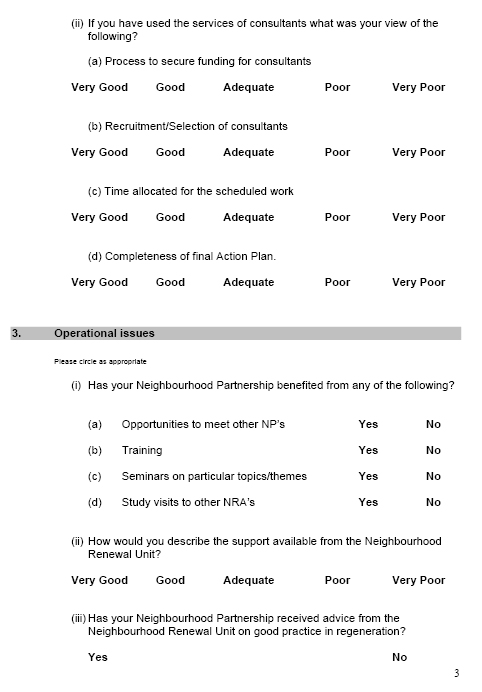




Appendix 4
Correspondence from
Antrim Borough Council
Our Ref: DMcC/MA
29 May 2008
By email to marie.austin@niassembly.gov.uk
Ms Marie Austin
Committee Clerk
Northern Ireland Assembly
Committee for Social Development
Room 412
Parliament Buildings
Belfast BT4 3XX
Dear Madam
Neighbourhood Renewal Strategy - People and Place
With reference to your letter dated 16 May 2008, general consultation about the transfer of functions and responsibilities to Local Government took place in the context of the RPA Taskforce and the workings of its Sub-Groups. These were necessarily broader principles through which a case was developed for a greater range of responsibilities to be transferred to Local Government.
Detailed work in terms of consultation would necessarily have waited until final decisions in respect of RPA which have only been achieved in recent months, ie numbers announced in March. Work therefore on further details consultation is only starting to develop at this time.
I would advise that Antrim Borough Council has developed a view which gives great importance to the roles and responsibilities pertaining to community planning and would be ambitious that Local Government should be in a position to more explicitly influence delivery of a range of public services.
I trust these comments will be given due consideration and should you require further information please feel free to contact me.
Yours faithfully
![]()
David McCammick
Chief Executive
Correspondence from
Ards Borough Council
From: Derek.McCallan@ards-council.gov.uk [mailto:Derek.McCallan@ards-council.gov.uk]
Sent: 29 May 2008 09:25
To: Austin, Marie
Cc: Leanne.McCready@ards-council.gov.uk; Jeanette.Wilson@ards-council.gov.uk; Jim.Murdockards-council.gov.uk; Geoffrey.Porter@ards-council.gov.uk; Councillor.Michelle.McIlveen@ards-council.gov.uk;David.Birch@ards-council.gov.uk
Subject: Neighbourhood Renewal Strategy - People and Place
I refer to your letter dated 16th May 2008, received 20th May 2008, in respect of the above, reference CSD/015/2008/JH.
Ards Borough Council ratified the comments, below, at it’s Full Council of 28th May 2008.
Following discussion and comment with key community development and good relations officials, Ards Borough Council would confirm that it has not had an opportunity to be formally consulted on the specific matter of “transfer of responsibility” and wishes to register concern in this regard.
It acknowledges that consultation has taken place in regard to other DSD policies and proposals but not this.
In view of the inextricable link with Neighbourhood Renewal, Community Planning and recent announcements in regard to the Review of Public Administration, the Council requests that a meeting is arranged with DSD officials and the Council’s Community Development Plan implementation team, headed by the undersigned, from the perspectives of common courtesy, practical resource planning and evidence based community initiatives in the neighbourhood renewal sphere.
The Council thanks the Committee for the opportunity to take this forward.
Derek McCallan
Director of Development
Correspondence from
Armagh City and District Council
29th May 2008
Ms Marie Austin
Committee Clerk
Room 412
Parliament Buildings
Belfast
BT4 3XX
Dear Ms Austin
Further to your correspondence dated 16th May 2008 I would advise the points raised therein have been considered, and I now reply accordingly on behalf of Armagh City and District Council.
In your correspondence views were requested on the following points:
1. What level of consultation there has been with local councils in relation the transfer of responsibility for the delivery of Neighbourhood Renewal.
2. Who consulted with the local councils on this particular issue; and
3. What impact your Council’s response to any consultation has had on the final outcome.
With regards to the level of consultation and by whom, in liaison with my Officers, I can confirm no consultation has been conducted with Armagh City and District Council in relation to the transfer of responsibility of the delivery of Neighbourhood Renewal.
Meetings of the Neighbourhood Renewal Partnership, co-ordinated and facilitated by the Council, are convened on a monthly basis. In attendance are DSD representatives, however we have not any discussions with regards to the transfer of responsibilities and what this process will entail. Consequently, views from Armagh City and District Council would not have been considered or impacted on the final outcome.
That said, we now welcome the opportunity to provide a response on the matter.
Armagh City & District Council has been integral in the establishment and development of the Neighbourhood Renewal Partnership, the Vision Framework and Action Plan for the Armagh area.
In terms of partnership working, maximum use was made of existing partnership structures between statutory agencies and community organisations, and as such the expertise of strategic model of the Local Strategy Partnership was harnessed and used to roll out the NR programme.
A wealth of experience is held by Council and Council Officers in terms of strategic and programme management, and delivery of funded programmes, which has been invaluable in the implementation of the Neighbourhood Renewal Initiative.
Local knowledge and established working relationships has been fundamental in the development of the NR Partnership, building capacity, trust and securing buy-in from the statutory agencies.
The NR Programme has not been without its’ challenges, and these have been on a number of levels. I understand a review on the Performance of the Department is currently underway and a number of completed questionnaires have been submitted by NR members for consideration, via this process. In addition, I am aware the Chairperson of the Armagh Neighbourhood Renewal Partnership has been invited to attend a consultation seminar (5th June 2008) to discuss a number of key areas, this includes a session to discuss the transfer of responsibility of NR to local Councils.
On reflection it may have been beneficial for an initial consultative forum with local councils to have been convened, or alternatively an invitation extended directly to the Councils for the event due to take place 5th June.
In conclusion, I can confirm Armagh City and District Council would welcome the opportunity for direct responsibility for the delivery of Neighbourhood Renewal and the opportunity for further discussions on the matter. Armagh City and District Council remain committed to the effective and efficient implementation of the long –term strategy to the area.
I trust you will find this reply comprehensive and satisfactory. Should you have any further queries please do not hesitate to contact me.
Yours sincerely
Mr John Briggs
Clerk and Chief Executive
Correspondence from
Ballymena Borough Council
Our Ref: RMcB/MM
Date: 9 July 2008
Ms Marie Austin
Committee Clerk
Committee for Social Development
Northern Ireland Assembly
Room 412
Parliament Buildings
Belfast BT4 3XX
Dear Ms Austin
I refer to your letter of 16th May 2008 regarding consultation with Councils in relation to Neighbourhood Renewal and apologise for the delay in replying.
Ballymena Borough Council has recently agreed to take over the running of the local Neighbourhood Renewal programme (copy minute attached). There was little consultation in advance of agreeing to act as lead partner.
Yours sincerely
Ronnie McBride
Ronnie McBride
Acting Town Clerk & Chief Executive
Correspondence from
Ballymena Borough Council
Minutes of Community Development
Sub-Committee Meeting
Held on Tuesday 11th March, 2008 at 4.05 p.m.
Neighbourhood Renewal
(Min. No. 36(c) – Monthly Meeting – 1/08)
Ms. O’Loughlin reminded Members that D.S.D. had the responsibility for the delivery of Neighbourhood Renewal in Ballymena and from 2006, Ballymena Local Strategy Partnership had been appointed as lead partner. However, as Ms. M. McAlister had since left L.S.P., D.S.D. was now enquiring if Council would assume this role with Council continuing to offer administrative support back up as required, and D.S.D. providing 75% of funding towards the employment of a dedicated officer, initially for a three year period.
She recommended that Council accedes to this request and takes lead partner responsibility with D.S.D. providing 75% funding towards the post.
Members noted that the remaining 25% funding for the officer post had been included in this year’s estimates, and that the worker would also have a dual-purpose role in that he/she would also be involved in the implementation of Council’s Community Development Strategy.
On the proposal of Cr. D. Tweed, seconded by Cr. Mrs. E. Adger, it was
Recommended: That Council accedes to the request from D.S.D. to assume the role of lead partner for the delivery of Neighbourhood Renewal in the Ballymena area, with D.S.D. funding 75% towards the post of a dedicated officer (initially for a three year period), and Council absorbing the remaining 25% of costs.
Correspondence from
Ballymoney Borough Council
5 June 2008
Our Ref: CE.129/2008
Your Ref: CSD/O15/2008/JH
Ms Marie Austin
Committee Clerk
Committee for Social Development
Northern Ireland Assembly
Room 412, Parliament Buildings
Belfast
BT4 3XX
Dear Ms Austin
I refer to your letter of 16 May 2008 and would confirm that there has been no direct consultation between the department for Social Development and Ballymoney Council on the issue you refer to.
In response to consultations in 2004 and 2005 on the Review of Public Administration proposals, my Council put forward responses arguing for strong local government and in relation to the Department for Social Development services, requested that urban regeneration powers be transferred to local government.
In November 2007 Council commented to the Department of the Environment on the Emerging Findings Report on RPA. In reference to the Department for Social Development, it stated that councils should be given a role in the provision of social housing (with ability to draw down funds) and should have transferred to them all aspects of unfit housing. The response also objected to the comments about local government not being “fit for purpose” and the proposal to treat the Department for Social development staff differently from other civil servants in any transfer of functions.
The Council has had no consultation with the Department for Social Development since the Department of the Environment Minister’s announcement in spring 2008.
I hope this is helpful.
Yours sincerely
John P Dempsey
Chief Executive
Correspondence from
Banbridge District Council
22 May 2008
Ms Marie Austin
Committee Clerk
Committee for Social Development
Northern Ireland Assembly
Room 412
Parliament Buildings
Belfast
BT4 3XX
Dear Ms Austin
I refer to your letter received on 20 May 2008 regarding consultation on the transfer of the Neighbourhood Renewal Programme to Councils.
The Council was consulted on the proposals to transfer these functions to Council and supported this proposal as part of the Review of Public Administration proposals. Indeed the Council, in response to the Interim Findings paper in October 2007, argued strongly for this transfer to enhance the role of Councils in Community Planning, Regeneration and Economic Development.
As stated above the consultation was addressed to the DOE as part of the Review of Public Administration proposals. However Councils, through the Northern Ireland Local Government Association (NILGA), met with the Minister for Social Development to discuss transfer proposals from the Department of Social Development.
While the Council would have preferred a greater transfer of functions it is satisfied that the transfer in respect of Neighbourhood Renewal is movement in the right direction.
I hope this is of assistance.
Yours sincerely
Liam Hannnaway
Chief Executive
Correspondence from
Belfast City Council
Ref: MCN99/05
3 June 2008
Ms M Austin
Northern Ireland Assembly
Committee for Social Development
Room 412
Parliament Buildings
BELFAST
BT4 3XX
Dear Ms Austin
Thank you for your correspondence of 16 May 2008.
In response to your three questions I can confirm that no formal consultation has been instigated by DSD in relation to the transfer of responsibility for the delivery of Neighbourhood Renewal. As part of the overall consultation process behind RPA, BCC made several formal responses which encompassed reference to neighbourhood renewal in the wider context of the transfer of urban regeneration functions.
I trust this answers your query. Should you wish to follow this up, I would be pleased to assist.
Yours sincerely,
SHIRLEY MCCAY (Ms.),
HEAD OF ECONOMIC INITIATIVES
CC Mr Peter McNaney, Chief Executive
Ms Marie-Therese McGivern, Director of Development
Correspondence from
Carrickfergus Borough Council
Joy,
I would refer to your recent letter to our Town Clerk and Chief Executive in regard to the transfer of responsibility to District Councils for the Neighbourhood Renewal Scheme and can confirm that there are NO negotiations with our Council at the present time, with any source, in regard to this matter. I also understand that in regard to RPA that this remains an objective of the NI Assembly.
Regards
George
Carrickfergus Borough Council
Museum & Civic Centre
11 Antrim Street
Carrickfergus
Co Antrim
BT38 7DG
Correspondence from
Craigavon Borough Council
Our Ref: NL/CDGen/tmcw
Your Ref: CSD/015/2008/JH
30th May 2008
Marie Austin
Committee Clerk
Northern Ireland Assembly
Committee for Social Development
Room 412, Parliament Buildings
Belfast
BT4 3XX
Dear Ms Austin
Neighbourhood Renewal
I refer to your correspondence of 16th May 2008 requesting a response regarding consultation with local Councils in relation to the transfer of responsibility for the delivery of Neighbourhood Renewal.
It is my understanding that apart from general responses forwarded to the consultation regarding the Review of Public Administration there has been no specific consultation with Councils about the future of Neighbourhood Renewal.
This is disappointing considering that the transfer of the responsibility for the delivery of Neighbourhood Renewal will require significant staffing and financial resources. There are three separate Neighbourhood Renewal Partnerships within Craigavon alone, and it is imperative that the implications of such a transfer be discussed with Councils at the earliest opportunity. This would allow time to ensure that the appropriate processes and procedures are established and that agreement is reached regarding the transfer of the necessary resources from central to local government or if indeed additional resources are required.
Craigavon Borough Council would welcome the opportunity to discuss this issue further with the Department along with other Councils and would urge the Department to arrange such a meeting at the earliest opportunity.
Yours sincerely
Olga Murtagh
Director of Development
Correspondence from
Derry City Council
Your Ref: CSD/015/2008/JH
Mr Gregory Campbell
Chairperson
Committee for Social Development
Room 412
Parliament Buildings
Belfast
BT4 3XX
29th May 2008
Dear Mr Campbell
Thank you for the opportunity to respond to the Committee’s query regarding the consultation on the transfer of responsibility for the delivery of Neighbourhood Renewal to local councils. Derry City Council welcomes the devolution of responsibility of the delivery of Neighbourhood Renewal to local councils.
As you are aware Neighbourhood Renewal is targeted at four areas within the Derry City Council area. Derry City Council has fully embraced the Neighbourhood Renewal Strategy – People and Place and has been playing an active role in the establishment and operation of the Neighbourhood Partnership Boards and has both elected member and officer representation on all four Boards. Furthermore Derry City Council is a member of the Neighbourhood Renewal Programme Group which has been established by the North West Development Office.
Regarding the specifics of your query I wish to provide the following comments:
- There has been no formal consultation between the Department for Social Development and Derry City Council in relation to the transfer of responsibility for the delivery of Neighbourhood Renewal to local councils. Officers from Council however have engaged with their counterparts in DSD regarding the possible arrangements for the transfer of responsibility. These discussions were very much informal in nature and sought to anticipate how evolving Neighbourhood Renewal Programmes could complement Council’s forward planning for Grant Aid and Council’s wider projects on Social and Economic Development. The outgoing Chief Executive, Mr Tony McGurk has, with other Chief Executives attended a meeting facilitated by SOLACE to consider broad RPA transfer implications. These discussions considered Neighbourhood Renewal transfer but not in a detailed fashion.
- Who consulted with councils?? – Consultation with Councils as advised above was informal and involved myself and Declan O’Hare and our subordinates speaking either in a group setting or on a one to one basis. There is a need however for the Department to formalise the consultation arrangements.
- I cannot anticipate Council’s response to any formal consultation. However without prejudice Council civically and corporately is very supported of Neighbourhood Renewal locally. Currently Council is developing a memorandum of understanding between Council and Triax Neighbourhood Partnership Board to create a greater understanding of each other’s roles in respect of Neighbourhood Renewal. This is a pilot and if successful will be implemented across the other three areas. This project exemplifies Council’s commitment to maximising the local impact of Neighbourhood Renewal in our disadvantaged communities.
Derry City Council looks forward to the formal consultation process and hopes that this can take place shortly so as to explore the most suitable mechanism for transfer. Council also believes that it is important that the delivery of Neighbourhood Renewal is phased to local Councils and the design of this phasing should be a priority for local councils and the Department for Social Development.
Please do not hesitate to contact me should you wish to discuss any aspect of this letter.
Yours sincerely
John Meehan
Director of Development
Correspondence from
Down District Council
22 May 2008
Your Ref: CSD/015/2008/JH
Ms. Marie Austin,
Committee Clerk,
NI Assembly,
Room 412,
Parliament Buildings,
Belfast.
BT4 3XX.
Dear Marie,
I refer to your letter of 16th May 2008 regarding consultation on the transfer of Neighbourhood Renewal to Local Government.
To the best of my knowledge there has been no consultation with Down District Council to-date. I have however been involved with the Strategic Leadership Board which is overseeing the transfer of functions to Local Government as envisaged in the RPA at which Mr. David Ferguson has been engaging with representatives of NILGA and SOLACE.
Yours sincerely,
John McGrillen
Clerk and Chief Executive
JMcG/CK
Correspondence from
Dungannon Borough Council
DIF/NP
21 May 2008
Ms Marie Austin
Committee Clerk
Committee for Social Development
Northern Ireland Assembly
Parliament Buildings
Belfast
BT4 3XX
Dear Marie
Ref CSD/015/2008/JH
Reference your correspondence of 16th May 2008 with regard to the Department for Social Development’s Neighbourhood Renewal Strategy, I have enquired of all relevant Council Officers who have dealt with this issue and there is no record of any consultation on the issue referred to in your letter.
Yours sincerely
Iain Frazer
Acting Chief Executive
Correspondence from
Fermanagh District Council
Our Ref: 1/cj
28 May 2008
Ms Marie Austin
Committee Clerk
Room 412
Parliament Buildings
Belfast
BT4 3XX
Dear Ms Austin
Thank you for your correspondence of 16 May 2008 in relation to the transfer of responsibility for the delivery of Neighbourhood Renewal to local councils.
I am not aware of any consultation with Fermanagh District Council on this matter. Indeed the only indication I have to date that this responsibility may eventually transfer to Council is in the context of the Review of Public Administration as it relates to local government.
Yours sincerely
Rodney Connor
Chief Executive
Correspondence from
Larne Borough Council
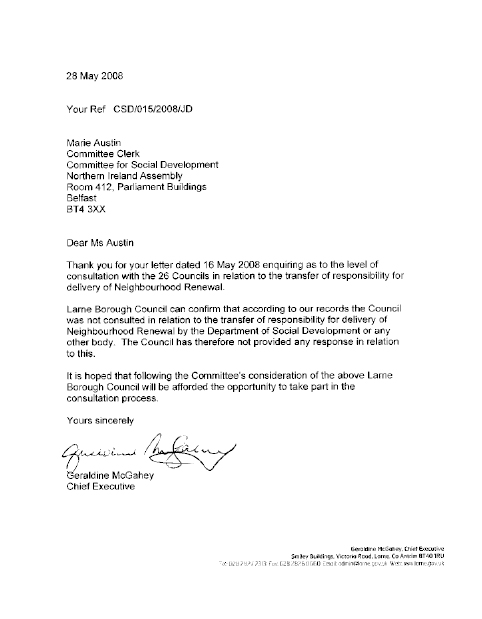
Correspondence from
Limavady Borough Council
22 May 2008
Ms M Austin
Northern Ireland Assembly
Committee for Social Development
Room 412, Parliament Buildings
Belfast
BT4 3XX
Dear Ms Austin
Thank you for your letter dated 16 May 2008 regarding the delivery of Neighbourhood Renewal.
With regard to the Committee’s questions I would respond as follows:
1. What level of consultation has there been with local councils in relation to the transfer of responsibility for the delivery of Neighbourhood Renewal?
There has been no formal or informal discussion with regard to this issue. Limavady Borough Council facilitates the Neighbourhood Renewal Partnership through the Development Services Department. This also includes the management of the area’s Neighbourhood Renewal Officer.
One concern that Council has had with the Neighbourhood Renewal process has been the lack of speed in which the Department has completed the administrative process to allow funding to be implemented. Often, projects have been waiting for many weeks and indeed, months, to complete the process leading up to letter of offer stage.
Our Development Services Department has already approached the Department representatives for the area on three occasions to offer assistance in completing this task, with specific regard to:
- processing of applications
- economic appraisal
- claims and audit process
However, this offer has not been taken up, and there has been no further discussion on the transfer of responsibility.
2. Who consulted with the local councils on this particular issue?
See above.
3. What impact had Council’s response to any final outcome?
As mentioned above, there have been no further discussions. However, Limavady Borough Council is willing to enter into discussions with the Department of Social Development to investigate ways of making this process more accountable, and locally-focussed. The Council has the expertise in-house to ensure that the process is implemented in a more timely fashion, and also has the contacts to ensure that funding is given to those who are best placed to deliver projects against local need.
Yours sincerely
Liam Flanigan
Chief Executive
Correspondence from
Lisburn City Council
From: colinm@lisburn.gov.uk [mailto:colinm@lisburn.gov.uk]
Sent: 04 June 2008 12:50
To: Austin, Marie
Subject: Neighbourhood Renewal - People and Place
Marie,
I refer to your letter dated 16th May 2008 regarding the above matter and following consultation with colleagues across the Council’s departments can advise you that in response to the three specific questions in your letter:-
1. we are not aware of any consultation with this Council in relation to the transfer of responsibility for delivery of neighbourhood renewal
2. as above
3. as above
I apologise for not responding earlier and hope that this information is of assistance to the Committee.
Yours sincerely,
Colin McClintock
Director of Environmental Services
Correspondence from
Newtownabbey Borough Council
From: Majella McAlister [mailto:mmcalister@newtownabbey.gov.uk]
Sent: 24 July 2008 16:29
To: Austin, Marie
Subject:
Hi Marie
I would like to offer my apologies for not responding to your letter dated the 16th May 2008 regarding the transfer of Neighbourhood Renewal to Councils. I have researched the queries raised in your correspondence and can advise that there was no formal consultation on this issue with any Council officers from what I can gather. Can you advise if we are in a similar position to other Councils and how the issue is now being advanced?
MAJELLA
MAJELLA Mc ALISTER
COMMUNITY DEVELOPMENT MANAGER
028 90 340053
07825 147682
Correspondence from Northern
Ireland Local Government Association
From: Heather Moorhead [mailto:h.moorhead@nilga.org]
Sent: 05 June 2008 16:59
To: Austin, Marie
Subject: FW: Neighbourhood Renewal
Marie, a colleague alerted me to the fact that the DSD committee are consulting with councils about the Neighbourhood Renewal Strategy. In your letter to councils you highlight three questions;
- What level of Consultation has their been with Councils in relation to the transfer of functions
- Who Consulted with Councils
- What impact had your council response
It may also be helpful for the committee to consider the work NILGA has undertaken on this issue.
In considering the transfer of functions NILGA made a formal submission to the RPA team in September 2005, after significant work across the sector. The relevant extract is detailed below. The full response can be viewed on the website.
‘Many local communities experience significant levels of deprivation including poor environmental conditions, high levels of crime, unemployment and poor health. It is recognised that these problems are extremely complex and that many agencies have a role to play. NILGA believes that neighbourhood renewal and a wider community development approach can only be adequately addressed at a local level. Councils should be afforded the power to develop local Neighbourhood Renewal Strategies with their partners as part of the wider community planning process, similar to councils in Great Britain and the Republic of Ireland.’
In addition senior DSD officials discussed the transfer of this function at two Strategic Leadership Board meetings when NILGA members reinforced the view expressed above. I am sure DOE would have a copy of the minutes if you require them.
Additionally, NILGA in concert with the sector, produced a Manifesto to influence the new NI Assembly deliberations when they revised the direct rule RPA decisions. In it local government again pressed the concept of local councils as ‘Place Shapers’ – a role which is entirely consistent with Neighbourhood renewal. The manifesto also sets out some principles which you may find helpful.
I have enclosed the Manifesto for your consideration.
I trust this is helpful.
Regards
Heather Moorhead.
Chief Executive
Northern Ireland Local Government Association
Correspondence from Northern
Ireland Local Government Association
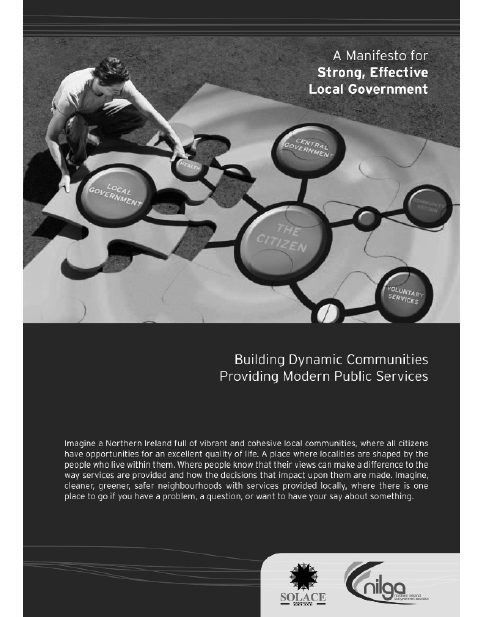


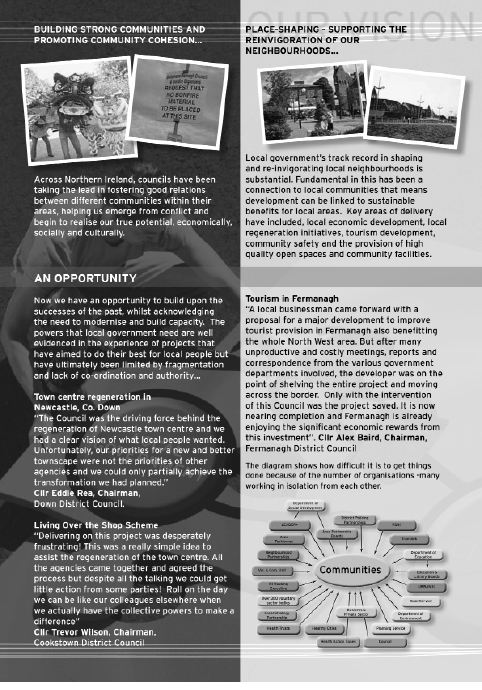
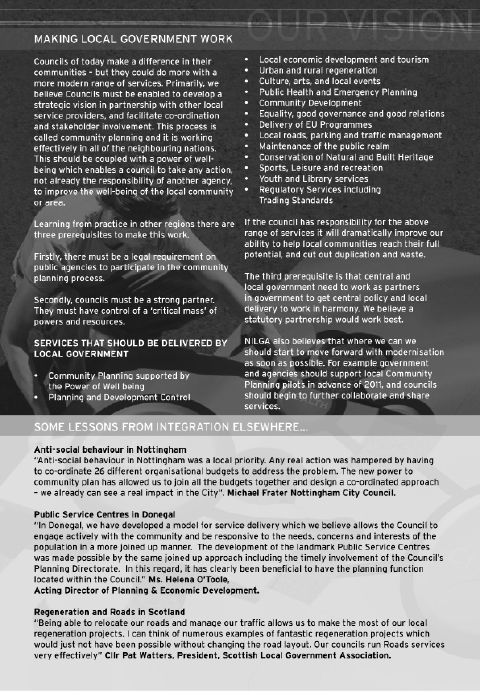

Correspondence from
Omagh District Council
ED/8 ID: ID: 3913
29 May 2008
Alison McCullagh
alison.mccullagh@omagh.gov.uk
Ms Marie Austin
Committee Clerk
Committee for Social Development
Room 412
Parliament Buildings
Belfast BT4 3XX
Dear Ms Austin
I refer to your correspondence of 16 May 2008 to the Chief Executive which has been forwarded to me for attention.
Omagh District Council has been greatly disappointed by the Department of Social Development’s performance in relation to its obligations under the Neighbourhood Renewal Strategy – People and Place. From the outset, in recognition of the powers which would transfer to local authorities following RPA, our Council has argued that this function should have been delivered through Councils.
In relation to the specific query raised in your correspondence; the Council was not consulted in relation to the transfer of responsibility for Neighbourhood Renewal, though, as noted above, such a transfer would be welcomed by Omagh District Council and fully consistent with the Council’s stated position on this matter.
It would be remiss of me not to highlight Omagh District Council’s extreme frustration with the Neighbourhood Renewal programme. Our experience has been that the Department has been totally inconsistent in its application of the strategy, uncertain even to the extent as projects which may or may not be eligible for consideration for support under the scheme. This experience has been in stark contrast to our previous work with the Department on a range of other projects, most notably the successful completion of a range of Urban Regeneration projects in Omagh.
The Council hopes to meet with the Minister in the near future to detail its concerns regarding Neighbourhood Renewal, and, if considered appropriate, could also give evidence to the Committee in this regard.
Yours sincerely
Alison McCullagh
Head of Development
Correspondence from
Strabane District Council
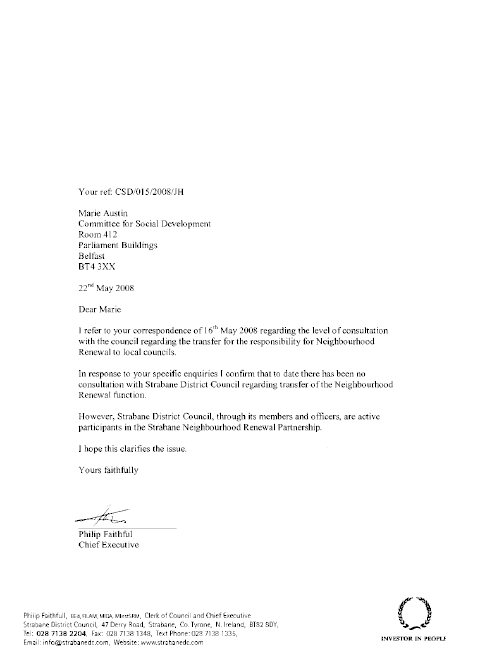
Appendix 5
Correspondence from the
Committee for Regional Development
 |
Committee for Regional Development Tel: +44 (0)28 9052 1970 |
|---|
From: Committee Office
Date: 24 June 2008
To: Marie Austin, Clerk to the Social Development Committee
Subject: Neighbourhood Renewal Strategy – People and Place
1. At its meeting of 11 June 2008, the Regional Development Committee noted receipt of your letter of 9 June 2008 requesting information on the work of the Regional Development Committee on its Departments contributions in relation to the Neighbourhood Renewal Strategy.
2. The Regional Development Committee wish to inform you that they have written to the Department for Regional Development requesting details of any work undertaken on this issue to date, and any that is planned for the future.
3. The Committee will return to consider this issue on receipt of this information from the Department, and will forward the Department’s response to the Social Development Committee when available.
4. Please accept our apologies for the late response to this request.
Correspondence from the
Committee for Culture, Arts and Leisure
 |
Mr David Simpson MP MLA Our Ref: C121/08 June 2008 |
|---|
Dear/A Chara
Neighbourhood Renewal Strategy
Thank you for the letter of 9 June 2008 from the then chairperson of the Committee for Social Development in relation to the role of Departmental Statutory Committee’s scrutiny of the Neighbourhood Renewal Strategy – People and Place.
The Committee for Culture, Arts and Leisure has not as yet undertaken scrutiny of the Department of Culture, Arts and Leisure’s contribution to this Strategy. The Committee has agreed to build this area of work into the Future Work Programme.
Yours sincerely/Is mise le meas
Mr Barry McElduff MLA
Chairperson
Committee for Culture, Arts and Leisure
Correspondence from the
Committee for the Environment
 |
Environment Committee Office Tel: 028 9052 1347 |
|---|
Gregory Campbell MP MLA
Chairperson
Committee for Social Development
Room 211
Parliament Buildings
Belfast
BT4 3XX
24 June 2008
Dear Gregory
Neighbourhood Renewal Strategy
Thank you for your letter dated 9 June 2008 regarding the Departmental responsibilities for the implementation of the Neighbourhood Renewal Strategy.
I can advise that the Committee for the Environment has not yet engaged with the Department of the Environment in relation to its contribution to the Neighbourhood Strategy and has no immediate plans to engage the Department on this matter.
Yours Sincerely
Patsy McGlone
Chairperson – Committee for the Environment
Correspondence from the Committee for Enterprise, Trade and Investment
 |
Mr David Simpson MP MLA June 2008 Your Ref: CSD/015/2008/JH |
|---|
Dear Mr Simpson
I refer to Gregory Campbell’s letter of 9 June to the Committee for Enterprise, Trade and Investment, regarding the Neighbourhood Renewal Strategy.
I can confirm that this Committee has not scrutinised the Department’s contribution to the Neighbourhood Renewal Strategy nor has it any plans to do so in the future.
Yours sincerely
Mark Durkan MP MLA
Chairperson
Correspondence from the
Committee for Finance and Personnel
 |
Committee For Finance And Personnel Tel No: 028 90521843 25 June 2008 |
|---|
David Simpson MP MLA
Chairperson
Committee for Social Development
Dear Mr Simpson
Neighbourhood Renewal Strategy
I refer to correspondence of 9 June 2008 from your predecessor in relation to the level of scrutiny by the Statutory Committees of the cross-cutting Neighbourhood Renewal Strategy.
The Committee has sought clarification from the Department of Finance and Personnel (DFP) on this matter and can confirm that DFP primarily provides services to the public sector. Its main public-facing work is to facilitate transactional services to the public. While it has been responsible for developing and implementing initiatives such as rating relief, which have a positive impact on individuals and households with lower incomes, these policies apply to the population of Northern Ireland as a whole and are not targeted specifically to Neighbourhood Renewal areas.
In addition, the Department has responsibility for EU funding, some of which has been allocated to Neighbourhood Renewal areas. The Committee for Finance and Personnel will bear this in mind in its continued scrutiny of EU funding.
I trust the above information addresses this matter.
Yours sincerely
Mitchel McLaughlin MLA
Chairperson
Committee for Finance and Personnel
cc: Norman Irwin, DFP
Correspondence from the
Committee for Health, Social Services
and Public Safety
 |
Iris Robinson MP MLA, Chairperson E-mail: committee.hssps@niassembly.gov.uk 23 June 2008 |
|---|
Mr David Simpson MP MLA
Chairman
Committee for Social Development
Room 211
Parliament Buildings
Belfast
BT4 3XX
Dear
Your predecessor Gregory Campbell wrote to me on 9 June 2008 regarding the performance of other departments in relation to the Neighbourhood Renewal Strategy – People and Place.
The Committee agreed that I should write to you confirming that the Committee has not undertaken any such scrutiny to date but is asking the Minister, Mr McGimpsey, to indicate what contribution the department is currently making to the Neighbourhood Renewal Strategy.
Yours sincerely
Iris Robinson MP MLA
Chairperson
Correspondence from the
Committee for the Office of the
First Minister and deputy First Minister
 |
The Committee for the Office of the Tel: (028) 9052 1677 Your ref CSD/015/2008/JH Date: 30 June 2008 |
|---|
Mr David Simpson MLA
Chairperson
Committee for Social Development
Room 211
Parliament Buildings
Dear David,
Neighbourhood Renewal Strategy
At the Committee meeting on 18 June 2008, Members considered correspondence from the Committee for Social Development regarding OFMDFM’s contribution to Neighbourhood Renewal and any plans the Committee may have for future scrutiny in this area.
The Committee has not specifically sought the views of OFMDFM on its contribution to Neighbourhood Renewal, but on the foot of the Committee’s letter we will now contact OFMDFM on this matter.
You will however be aware that the Committee inquired into child poverty and received evidence on the issue of neighbourhood renewal as part of its inquiry. The Committee’s report may be accessed at:
http://archive.niassembly.gov.uk/centre/2007mandate/reports/Report08_07_08r_vol1.htm
http://archive.niassembly.gov.uk/centre/2007mandate/reports/Report08_07_08r_vol2.htm
Danny Kennedy MLA
Chairperson
Committee for the Office of First Minister and Deputy First Minister
Correspondence from the Committee
for the Office of the First Minister
and deputy First Minister
 |
The Committee for the Office of the Tel: (028) 9052 1677 Date: 8 September 2008 |
|---|
Mr David Simpson
Chairperson
Committee for Social Development
Room 211
Parliament Buildings
Stormont
Dear David
Neighbourhood Renewal Strategy
Please find enclosed the response from the Office of the First Minister and Deputy First Minister regarding clarification on how OFMDFM contributes to the implementation of the Neighbourhood Renewal Strategy and its future plans in this regard.
Yours sincerely
Correspondence from the
Committee for Education
Northern Ireland
Assembly
Mr Mervyn Storey
Chairperson, Committee for Education
Mr David Simpson MP MLA
Chairperson
Committee for Social Development
Room 347
Parliament Buildings
BELFAST
BT4 3XX
Ref: 363/08/I/04 11 September 2008
Dear David
I am writing further to the request of 9 June 2008 by the previous Chairperson of the Committee for Social Development for information regarding the Committee’s scrutiny of the Department of Education’s contribution to the Neighbourhood Renewal Strategy.
I have attached a briefing paper from the Department of Education outlining its input to the Neighbourhood Renewal Strategy for your information and setting out in some detail the Department’s position that it has demonstrated its commitment to Neighbourhood Renewal. In addition, I can advise that the Committee for Education has considered and scrutinised a number of important policy areas which contribute to Neighbourhood Renewal, for example, as follows:
School Improvement
The Committee has received a number of briefings from senior Departmental officials on the draft policy proposals, Every School a Good School, and the revised Literacy and Numeracy Strategy. The Committee responded to the Department’s consultation on Every School a Good School in March 2008 – a copy of the response can be found at http://archive.niassembly.gov.uk/education/2007mandate/responses/school.htm . The Committee plans to continue its scrutiny of this important area during the Autumn session of the Assembly, with a further Departmental briefing scheduled for 1 October 2008, together with a briefing from the Literacy & Numeracy Taskforce with an independent Chair, Professor Sir Robert Salisbury.
Extended Schools Funding
The Committee recognises the importance of the Extended Schools programme/action plans and the role it can play, particularly in areas of social disadvantage. Committee members discussed their concerns with the reduced funding available for this programme for 2008-09 with Departmental officials and some individual Members raised this issue in the House. The Committee also highlighted the issue of the loss of some £43million from the Department of Education’s baseline Budget from the Children and Young Peoples’ Funding Package and the Integrated Development Fund and the impact this would have, especially for disadvantaged school children. The Committee noted these concerns in its response on the draft Budget to the Committee for Finance and Personnel (http://archive.niassembly.gov.uk/education/2007mandate/responses/draft_budget.htm ).
The Committee welcomes the bid for £5million of additional funding for Extended Schools that the Department of Education has indicated will be made in the September Monitoring round to enable the programme to continue at its current level (£10million per annum).
Primary School Funding
The Committee has examined the issue of the funding of primary schools in some considerable depth throughout the last year, taking evidence directly from principals’ groups as well as Departmental officials on this matter. The Committee has particular concerns with regard to the current level of primary school funding, the comparison with the level of funding for post-primary schools and the lower percentage of the Education Budget that is actually delegated to schools in Northern Ireland compared to, for example, the rest of the UK. Some Members considered, for example, that a ‘one-size-fits-all’ funding formula is not appropriate, and that some thought should be given to targeting funding to schools based on social and educational need.
The large number of earmarked funding streams and initiatives for schools and the ability of some schools to access such funding was also a cause for concern, particularly where such funding has and could be withdrawn after a period of time. For example, the Committee heard directly from North Belfast Principals’ Groups about the importance of Interface Funding and the impact of its withdrawal on pupils, teachers and neighbourhoods.
In view of its very serious concerns regarding primary school funding, the Committee tabled a motion which was debated and agreed in the Assembly on 1 July 2008. An Information Brief was published and circulated to all MLAs in advance of the debate – see http://archive.niassembly.gov.uk/education/2007mandate/CommitteeMotions/primary.htm . The Committee received an update briefing on primary school funding from Departmental officials at is meeting today, and has requested regular monthly updates to maintain focus on this important area.
Yours sincerely
Mr Mervyn Storey MLA
Chairperson, Committee for Education
Att
Correspondence from the Committee for Health, Social Services and Public Safety
Room 412
Parliament Buildings
BELFAST
BT4 3XX
E-mail: Hugh.Farren@niassembly.gov.uk
Tel: 028 9052 21360
Fax: 028 9052 1667
16th September 2008
Clerk of the Social Development Committee
Room 412
Parliament Buildings
BELFAST
BT4 3XX
Dear ,
At the Committee meeting on 11 September 2008, Members noted a response from Minister, Mr Michael McGimpsey about the Neighbourhood Renewal Strategy – People and Places. The Members agreed to forward this to the Social Development Committee.
Yours sincerely
Hugh Farren
Committee Clerk
Enc.
Correspondence from the
Committee for Employment and Learning
|
|
Committee for Employment and Learning |
Northern Ireland Assembly
To: Peter McCallion
Clerk to the Committee for Social Development
From: Peter Hall
Clerk to the Employment and Learning Committee
Date: 20th October 2008
Subject: Neighbour Renewal
Dear Peter,
On 9th June, the Chairperson of the Social Development Committee wrote to Sue Ramsey MLA in relation to the Neighbourhood Renewal Strategy. The same correspondence was also sent to the Chairpersons of the other Assembly Statutory Committees.
The correspondence was discussed at the Committee for Employment and Learning meeting on 18th June and Members agreed that Departmental officials should be asked to brief the committee on this issue.
The briefing took place on 17th September and I include a copy of the office note on the briefing session together with the paper that was distributed to Committee Members by the Departmental Officials.
Regards.
![]()
Peter Hall
Committee Clerk
Correspondence from the
Committee for Employment and Learning
Department for Employment and Learning
Neighbourhood Renewal (1400)
Greg McConnell – As you are aware Neighbourhood renewal was launched in June 2003 when a strategy for Neighbourhood Renewal called “People in Place” was published by the then Direct Rule Minister and was a DSD responsibility. It was quite clear that by the nature of it all Departments had to be involved and Ministers were and continue to be committed to it. Whilst Sir Reg has some reservations about the approach, he is committed, as is his Department, to tackling disadvantage. By the nature of our work where we have unemployed and other ways disadvantaged clients, they tend to be concentrated in Neighbourhood renewal arrears. A lot of our work is very closely aligned to what Neighbourhood Renewal is doing. We have been involved in Neighbourhood Renewal from the start. We attend the Ministerial group, the Belfast Strategy group and the equivalent group in the North West. Our regional and District managers in our Jobs and Benefits offices actively participate in partnerships and relevant sub group meetings when invited to do so and where we have a contribution to make. We believe that we have attended well and contributed well. We take account of what is said at partnership meetings.
In addition we have worked hard to ensure that everyone in the Department is up to speed on Neighbourhood Renewal and understands how our work Department fits in with it. We have received the action plans from the partnerships. So far there is a total of 36 action plans and we have responded to 15, we are working on it. We have issues arising from the action plans – more on essential skills, more local learning opportunities delivered by community organisations and better careers advice. How do we respond? Our range of programmes are designed to meet the needs of individuals across Northern Ireland. We don’t have programmes specifically directed at Neighbourhood Renewal area, we have programmes directed at unemployed people and those who need essential skills. They are available universally across NI but by the nature of disadvantage being concentrated in the Neighbourhood Renewal area, our delivery tends also to be concentrated here.
DEL does not core fund organisations. We go out to tender for contracts and people respond to our contracts. We run into difficulty in Neighbourhood Renewal, people expect DEL to provide funding for a particular individual. The way Sir Reg endorses the way we work, DEL cannot respond to that. We are across NI through the 35 Jobs and Benefits offices. Also, through the 6 regional colleges we are delivering a whole range of course opportunities, 49 campuses and 760 out-reach centres – the FE colleges are out there in the community.
In response to the inputs from the partnerships and elsewhere, we are always looking to refine and enhance our programmes. One thing we are doing is Learner Access and Engagement. The FE colleges and their 760 out-reach centres are out there in the community but there is a recognition from what we are getting from partnerships and elsewhere that the colleges can be seen to be foreboding and some individuals still find it difficult to enter a college even through the outreach centres in the local community. We introduced the Learner Access and Engagement programme which is about providing a community based interface for the FE colleges with the idea of providing help and support to encourage people to enter FE. Our new Careers Information, Advice and Guidance service will also be relevant and came up from the action plans. Also LEMIS (the Local Employment Intermediary Service) to provide an extra layer of support at community level, outside the Jobs and Benefits offices.
To summary, we are actively involved in tackling disadvantage, our objectives align with the objectives of Neighbourhood Renewal. We don’t believe it is practical for us to operate at the level of an individual Neighbourhood Renewal partnership area. We tailor programmes that meet the needs of disadvantaged people across NI. We believe that in the development and enhancement of our programmes we are responding to the message that is coming out of the partnerships.
Questions
Sue Ramsey – Thank you. Social Development Committee are looking information on our view on Neighbourhood Renewal. It seems to me personally that the whole Cross-Department component on Neighbourhood Renewal has not kicked in yet. On page 3 you say the key themes for DEL emerging from Neighbourhood Renewal action plans. Not to be flippant but this is a joke. More local learning opportunities/community based learning delivered by community organisations. We currently came out of a review of Training for Success and a key issue that came out of it was the impact on community local organisations and how they seem to be blocked by the Public Procurement Process. If there is a key theme coming from DEL that is supposed to make up a strategy for Neighbourhood Renewal, I do not think anyone would oppose community based learning, but I think that CPD are taking this control away. We will pas this to the Social Deveopment Committee.
Greg McConnell – The Department is putting over £200m per year into the FE colleges to deliver training right down to community level. We know that the FE colleges through the outreach centres and in many other ways have got a vast number of community contacts and are delivering community based learning at the local level within communities. If that is not working at community level, we don’t believe that the right thing for us to do is to core fund a number of other organisations to do it. It is up to us to ensure that the FE colleges do deliver what is required at the local level. That is why we put in the Learner Access and Engagement for that level. FE is a highly controlled environment, trainers all have to be qualified to a certain level and are subject to ETI inspections. We don’t say that we are responding exactly in line with Neighbourhood Renewal partnerships, but we are meeting the needs that they have identified.
Sue Ramsey – I don’t think you are. Lets go back one step. When you talk of Training for Success or Steps to Work, it is before people get to the stage of having the facility or confidence to go into FE colleges that is important. We need to deal with these issues and this is a commitment that the Department has given. I have no difficulty in saying that you do not have a duty to core fund organisations, but you do have a duty to ensure that organisations have an equal playing field. Yes, more local learning opportunities is a key theme, but then to go on to say that CPD awards the contracts, basically this will not even have an impact at community based level. We need to give people the tools and energy to crawl before they walk into the FE colleges.
Greg McConnell – We believe that the Neighbourhood Renewal partnerships are identifying a need and we believe we have in place programmes to satisfy that need. We are continually working on refining our programmes. We are not providing funding to individual community organisations to deliver the sorts of training that they believe are necessary. The Department has a different philosophy.
Sue Ramsey – I don’t believe that you are targeting social disadvantage and there is an issue of having a theme and then putting this theme into reality. I do not think the Neighbourhood Renewal action plan will deliver on the ground.
Robin Newton – The tools and energy to deliver. What work is being done to encourage, develop and qualify the community organisations so that instead of BMC or whoever delivering into the community, the community infrastructure can deliver the necessary qualifications. I know that in my own constituency there is a partnership approach by BMC and the East Belfast Community Development Group. It seems to me that that partnership is working in that instance. However, it is still one step removed from the aspiration of the community itself helping itself.
Greg McConnell – We don’t believe that it is part of the remit to develop the community organisations per se. We believe that the route you gave as an example (BMC working with the local organisation) is the route we are working through and is meeting our need, providing both the community interface and the framework that you get through the FE sector and our training providers that are all subject to ETI inspection. We can therefore ensure that what you get at all levels is quality service. There is no point doing training towards qualifications that are not recognised.
Jan Harvey – DEL has been proactive. We have developed along side BMC a course for governance and accountability for groups within community organisations. This comes under the commitments under positive steps.
Anna Lo – DSD is planning to give over the responsibility for Neighbourhood Renewal strategy to local councils. A lot of concern in local communities about how the Departments are going to work in with their action plans. You say that the FE colleges have the venues in the communities to help with education and training. If the strategy is handed to local authorities, how will the FE colleges work with the action plans in promoting the strategy.
Greg McConnell – A key part of the new set up with local government is the role of community planning and there will be a legal requirement on other bodies and other Departments to co-operate with Councils in community planning. In a sense there is statutory basis for this co-operation. I see no reason why the colleges would not be close to the new bigger councils. We would be altering our funding model to incentivise them to do so, we feel very strongly that they must be involved with local government in delivering these objectives.
Jan Harvey – A process in place that brings these groupings together is the Work force Development Forums, set up under the Skills Strategy. WDFs are chaired by the local college and councils sit on them.
Alex Attwood – I would like to emphasise community based learning delivered by community organisations. I do not think that the Departments funding approach for organisations is the best way to deliver that outcome. I think that the Department is in error in deciding that big lead Agencies are going to be the primary funding mechanism to deliver education or training in the community. There are issues around funding at BMC, which they have admitted. There will be further funding strains arising from the budget situation and the big organisations will protect the big centres first and be inclined not to protect the community outreach. The Chair is right in saying that we need to come back to this.
Greg McConnell – You have identified the Departments Policy approach delivering through big organisations and putting pressure on them to ensure that there is a good community interface at the bottom. That is a definite DEL policy approach that has developed over recent years, brought about by a number of concerns and pressures about what was being funded in other ways. Policy approach is a matter for the Minister and I am confident that Sir Reg is fully behind it.
Alex Attwood – We have been told that when it came to funding EGSA, the WEA and Ulster Peoples College the issue was one of legality, whether it was possible to core fund those organisations when there might have been similar organisations in the field.
Greg McConnell – For reasons of quality, the policy of the Department has evolved into this top down approach.
Alex Easton – Kilcooley Womens Education Group, a group within a Neighbourhood Renewal area, this particular group receives money from the Irish govt, why can DEL not do it?
Sue Ramsey – Under page 5, Developments relevant to Neighbourhood Renewal, under contract to the FE colleges, to provide mentoring and support for learners taking FE courses that will help them prepare for employment. £9million?
Jan Harvey – This is split between the six colleges evenly. Half a million per year for 3 years. They are in the process of contracting for the delivery of those services, the closing date for applications is the start of October. It will be a while before the outflow of that is known.
Correspondence from the Committee
for Employment and Learning
Briefing Paper to the Employment and Learning Committee
Neighbourhood Renewal – Department for Employment and Learning engagement
DEL’s Commitment to Neighbourhood Renewal
- The Committee will be aware that DEL is committed to tackling disadvantage whether in Neighbourhood Renewal areas or elsewhere. The primary focus for DEL is needs of the NI economy and ensuring individuals have access to the opportunity to maximise their potential.
- DEL is one of the Departments contributing to PSA 12 – Housing, Urban Regeneration and Community Development.
- From the outset, DEL has been an active participant in both the Ministerial – led Steering Group for Neighbourhood Renewal as well as the interdepartmental Implementation Group. DEL is also a member of the Belfast Strategy Group chaired by Belfast regeneration office and its equivalent in the North West, the Neighbourhood Renewal Programme Group, chaired by the North West Development Office.
DEL’s Arrangements for linkages with Partnerships
- There are 36 Neighbourhood Renewal Partnerships some of which represent areas that are at sub-ward level. DEL Regional and District Managers have actively participated in partnership and relevant sub-group meetings when invited to do so, and when the agenda requires it. In addition, individual Regional and District Managers have made presentations to Partnerships about the programmes and services that DEL already has in place to help individuals to enter or re-enter the labour market and encouraged Partnerships to commend them to individuals in their areas.
- Regional Operations staff have direct responsibility only for employment related issues, but as they are DEL’s primary representation at local level and already engage with local groups that may in themselves be integral to Neighbourhood Renewal Partnerships, they are best suited to the task of linking with Partnerships. However, issues that arise which are outside the remit of Regional and District staff have to be referred to HQ for attention. In order to facilitate this, DEL introduced a process by which Strategy and Equality Branch in HQ would act as liaison in relation to Neighbourhood Renewal. This Branch is the policy lead and links with DSD on all strategic matters, as well as facilitating response to any Neighbourhood Renewal issue that might arise.
- Neighbourhood Renewal has thus been accorded considerable effort within DEL. In addition to the linkages on the ground with partnerships, actions include.
- Briefing provided to all branches in regard to Neighbourhood Renewal and the network of partnerships.
- Summary paper on all DEL programmes and services made available to DSD Neighbourhood Renewal and Regional staff.
- Summary paper on DEL programmes and services made available to all partnerships, either by writing to them from HQ or in person at workshops organised by DSD.
- Strategy and Equality Branch attended some consultant facilitated stakeholder events in relation to action plans.
- Strategy and Equality Branch has also attempted to respond in detail to each action plan indicating where DEL programmes and services might already be available to meet articulated need. So far of the 36 action plans, DEL has issued 15 responses, 8 have been drafted but not yet issued, 4 further action plans awaiting consideration and 9 action plans have not as yet been received centrally.
Key Themes for DEL emerging from Neighbourhood Renewal Action Plans
- More Essential Skills
- More local learning opportunities/community based learning delivered by community organisations
- Better Careers advice
DEL’s Offer Relevant to Neighbourhood Renewal Areas (Summary paper attached at Annex A)
- DEL’s range of programmes and services are designed to address the needs of individuals are delivered across Northern Ireland. DEL’s clients – e.g. the unemployed – tend to be concentrated in Neighbourhood Renewal areas and, in this way, DEL programmes address the needs of the areas, but not to the exclusion of other individuals in need.
- DEL does not core fund organisations. Instead, contracts for the delivery of DEL programmes are let by means of the public procurement process to a range of delivery partners in various areas across NI. So, whilst programme policy might be centrally driven, its delivery is very much local facing and delivered by statutory and non statutory organisations.
- Thus, DEL already delivers at local level and in the interests of ensuring the best possible experience for the learner has invested heavily in a quality improvement programme designed to ensure that provision is quality assured and inspected.
- Individuals access DEL employment services via the network of Jobs and Benefit Offices and Jobcentres. The Department’s Regional and local District Managers know well the areas in which they operate and work closely with local groups and organisations to both promote the services available and to engage with all individuals that might benefit from DEL services.
- The 6 Regional Colleges offer a plethora of course opportunities, both on campus – and there are some 49 campuses across NI - but also in over 760 outreach venues throughout NI.
- There has also been considerable investment in ensuring that programmes and services are flexible and adaptable to need. For example
- The new Steps to Work provision is menu driven and thus more tailored to the specific needs of individuals.
- Essential Skills provision is available free to users via FE colleges.
- Pathways to Work provision and its associated Condition Management Programme operated in collaboration with DHSSPS is proving successful in helping those new claimants of Incapacity Benefit to find suitable work.
- All these programmes and services are demand led and where need is clearly established, the resources have been found to meet that need. The strategic planning and financial planning process in DEL is this heavily orientated towards individual need. Regrettably, it is impossible to demonstrate specifically at very local level uptake of DEL programmes, particularly in the case of some Neighbourhood Renewal areas that are at less than ward level, or might span more than one ward but not entirely.
Developments relevant to Neighbourhood Renewal Areas
- DEL has developed a programme of Learner Access and Engagement to enable local organisations, including voluntary and community groups in Neighbourhood Renewal and other areas to provide, under contract to FE Colleges, mentoring and support for learners taking FE courses that will help them prepare for employment. This represents considerable commitment to tackling disadvantage. The pilot involves investment of £9 million over a 3 year period starting with the 08/09 academic year, spread evenly across all 6 Regional Colleges. The Colleges are in process of selecting delivery partners following a public procurement process.
- The new all-age Careers Information Advice and Guidance Strategy that has been jointly developed with the Department for Education, and that is likely to be considered by the Executive in October, is expected to have a significant impact on the career decision making skills of individuals in NI, and in particular those living in areas of disadvantage.
Current Issues
- In March last the DSD Minister announced a reassessment of the funding that her Department provided for projects in Neighbourhood areas. The impact of this has been that projects that are consistent with identified Neighbourhood Renewal priorities, but seen to be in areas which are the responsibility of other Departments would receive funding to the end of March 2009. For those projects perceived to fall under the remit of other Departments, but not in keeping with Neighbourhood Renewal priorities, funding was withdrawn with effect from 31 August 2008. In each case the funding relates to core costs.
- DEL has been approached to intervene on behalf of some organisations. As indicated earlier in this paper, DEL itself has no remit to core fund organisations and has clarified this in a range of correspondence. The organisations do have the opportunity in the public procurement process to bid to deliver DEL programmes and services, or those funded by DEL via FE Colleges.

DEPARTMENT FOR EMPLOYMENT AND LEARNING
17 September 2008
Correspondence from the Committee for Employment and Learning

Adelaide House
39-49 Adelaide Street
Belfast BT2 8FD
Annex A
Department for Employment and Learning. (A summary of provision relevant to Neighbourhood Renewal Areas).
Introduction
The formal aim of the Department for Employment and Learning is to promote learning and skills, to prepare people for work and to support the economy. Its main unifying purpose is to improve access to skills and employment through education and training and to promote learning for social and personal development. This is designed to raise productivity, to help NI businesses to thrive in an increasingly globalised and high technology economic environment, and to play our part in creating an inclusive society by assisting individuals to access and retain sustainable employment, better wages and greater personal fulfilment.
The work of the Department is right at the centre of the Government’s wider economic, social and lifelong learning policies, assisting economic growth on the one hand, and social inclusion on the other.
The Department stands at the centre of a wide ranging training and education network, which it contracts with and funds, to which it seeks to give strategic direction and with which it works in partnership. That network involves NI’s universities, the Open University, Teacher Education Colleges, FE Colleges and training organisations, not to mention the network of Sector Skills Councils and the Non Departmental Public Bodies. The Department recognises that all these resources must be mobilised to work for the improvement of the economy and society and that this work often requires it to work in close collaboration with other Government Departments.
Many of the Department’s programmes/initiatives are delivered through the network of 35 Jobs and Benefits offices and JobCentres, located in towns and cities throughout Northern Ireland. These are as follows:
Employment Service, including work-focused service to benefit clients
New Deal
Pathways to Work
Employer Contact Managers
Progress to Work
Disablement Advisory Service
Steps to Work
Other initiatives managed from HQ locations in Belfast:
Training for Success
Local Employment Intermediary Service (LEMIS)
Workforce Development Forums
Essential Skills
Management and Leadership Development (MLDP)
Vocational Enhancement Programme
Education Maintenance Allowances
Migrant Workers
Widening Participation in Higher Education
Bridge to Employment
As described in the introduction, DEL also provides strategic direction and funds activities delivered by:
Higher Education Institutions – Universities and Teacher Education Colleges
Further Education Colleges
Employment Service/Job Brokerage
The Department helps employers fill their vacancies and assists jobseekers in finding employment. This particular service means that employers can have vacancies circulated to all offices and advertised on the internet.
The Department’s services are available to both employers and jobseekers at any location with internet access. The award winning www.employersonlineni.com and www.jobcentreonline.com (recently listed as one of the top 5 most visited government websites) provides access to information on vacancies in Northern Ireland, the Republic of Ireland and the European Union.
“Touch-screen” kiosks are available in JobCentres and Jobs and Benefits Offices and individuals can search for jobs by geographic area and/or sector. Personal Advisers are available to provide application forms and advice on their completion.
“Better-off Calculation”
There is a pilot running in GB which is based on a commitment by the Prime Minister that everyone who moves off benefit into work should be at least £25 per week better off. This new £25pw commitment is to be piloted from Autumn 2008 in some GB Districts. However, it is thought unlikely that an additional £25pw would be likely to encourage people to move into employment.
DEL already provides benefit recipients with a service which calculates (approximately) their income if they were in a particular job. In most cases, recipients would be ‘better off’ and in a significant number of cases the figure is by around £100 - £150 per week. This service is available in all 35 Jobs and Benefits Offices and JobCentres
Local Employment Partnerships
This national scheme initially secured the commitment of five major retailers to work in partnership with the Employment Service to help long-term benefit claimants into work.
Asda, B&Q, Marks & Spencer, Sainsbury’s and Tesco have expressed their commitment to working with the Employment Service in Northern Ireland in order to help long-term benefit claimants back into employment.
To demonstrate this commitment, the retailers agreed to encourage their managers to enter into Local Employment Partnerships with DEL’s Jobcentres/Jobs & Benefits offices to support their efforts in getting benefit claimants into work.
The Partnerships include some or all of the following measures:
- Offering 2-4 week Work Trials to a given number (determined by the employer) of local benefit claimants.
- Offering a target number of places for New Deal/Steps To Work participants on the Subsidised Employment option, or providing work experience or work placement.
- Working with DEL and the Retail Sector Skills Council on the design of pre-employment training to ensure that it is relevant to employers’ needs, and agree, when hiring, to guarantee interviews or jobs to local benefit claimants who complete this training.
- Encourage their employees to volunteer to provide one-to-one mentoring for long-term benefit claimants to help prepare them for work.
- Review their application processes to ensure that local benefit claimants are not inadvertently excluded by, for example, requirements for qualifications, or overly complicated procedures.
DEL has established a single point of contact in each District or Region (usually the District or Regional Manager) who will lead on the Local Employment Partnership. This lead contact will work with the companies’ managers to establish which measures might be appropriate for the area. He/she will also work with the Sector Skills Council, and other relevant partners to identify sources of funding for pre-employment training that partners considered necessary for meeting the needs of both the retailers and DEL.
Careers Service
Careers Services are delivered to young people and adults by Careers Advisers employed by the Department and located in Jobs and Benefits Offices/JobCentres and Careers Offices across Northern Ireland. The Careers Service is staffed by professionally qualified advisers who have excellent experience in helping young people and adults make informed decisions about opportunities in education, training and employment.
The Careers Service has a dedicated website at www.careersserviceni.com. The website provides a host of information, advice and contacts to help people of all ages make informed career decisions. It contains many interactive features and a number of multi-media resources that will enable users to explore fully the range of careers available, latest careers information, as well as interactive features, a course finder, a CV generator, and Parents Zone. It also provides details of all Careers Advisers throughout Northern Ireland.
On 22 October 2007 DEL and DE jointly launched a careers strategy consultation document entitled ‘Preparing for Success’. The strategy aims to support better informed decision-making, leading to more effective career planning and through this to increased participation in education, training and employment. This strategy forms part of the Government’s overarching Skills Strategy for Northern Ireland, ‘Success through Skills’. It is expected that the final document and implementation plan will be ready for publication in autumn 2008.
It is envisaged that the strategy will enhance the careers education offered to young people and adults and will also ensure that the mechanisms are in place to enable the strategy to be based on up to date labour market information. The proposals have been developed following detailed stakeholder involvement.
Steps to Work – A ‘Menu of Provision’
DEL has developed a more flexible, menu-based, modular approach to provision, better tailored to the individual’s needs and with a clear emphasis on increasing participants’ employability prospects. The intention is to be better equipped to assist the more job-ready to move into employment quicker and will also provide help in addressing the employability needs of those furthest from the labour market. Through this new initiative the Department has extended the availability of New Deal 18 to 24 year olds/New Deal 25+ provision to other groups not previously targeted. These groups include:
- Jobseeker’s Allowance (JSA) claimants who have been unemployed for at least 3 months
- Incapacity Benefit (IB) claimants
- Income Support (IS) claimants
- Those not in receipt of benefit who are looking for work.
The benefits are:
- Personalised advice and guidance to help make the right choices
- Free training which meets particular needs
- Voluntary participation
- Help to find and remain in work
- Re-training while remaining on benefit plus receive a weekly Training Premium
- Opportunity to gain recognised qualifications
- Opportunity to improve on existing skills
- Opportunities for work experience
- Immediate
The flexible menu-based approach is being piloted in 6 Jobs and Benefits offices. The Steps to Work programme will subsume the existing range of New Deal provision and it is planned to introduce it across NI from 29 September 2008.
NOTE: Steps to Work will replace New Deal from 29 September 2008. However, anyone who has already commenced a New Deal Programme will remain on it for the duration.
New Deal
All the New Deal programmes provide participants with a Personal Adviser based in their local JobCentre/Jobs & Benefits office.
Note: From 29 September 2008 the new flexible menu provision Steps to Work will subsume the existing New Deal for 18 to 24 year olds, New Deal 25 +, New Deal for Lone Parents (NDLP), New Deal for Partners (NDP), New Deal Self-Employment and New Deal for Musicians programmes.
New Deal for 18 to 24 year olds
Unemployed jobseekers within this age group are eligible for, and required to participate in New Deal when they have been claiming Jobseeker’s Allowance (JSA) for 6 months or more. After the initial ‘Gateway’ period (during which a New Deal Personal Adviser provides advice, guidance and assistance with jobsearch), jobseekers who have not found work enter one of four options offering work experience, training or subsidised employment. There is also provision for those interested in self-employment.
New Deal 25 +
Unemployed jobseekers aged 25 or over and on JSA for 18 months or more are required to participate in New Deal. After the initial ‘Gateway’ period (during which a New Deal Personal Adviser provides advice, guidance and assistance with jobsearch), jobseekers who have not found work participate in a Preparation for Employment Programme, which provides work experience, training and jobsearch, or enter subsidised employment. A self-employment route is also available within this New Deal.
New Deal for Lone Parents (NDLP)
The New Deal for Lone Parents (NDLP) is a voluntary programme designed specifically to help lone parents aged 16 or over who are not working, or who are working less than 16 hours per week, and who have sole responsibility for the care of a child(ren) under the age of 16. Opportunities available include advice and assistance with job-search or interview skills, writing CVs, pre-employment training courses, a self-employment route and access to any of the provision within the New Deal for 18 to 24 year olds and New Deal 25+ programmes.
New Deal for Partners (NDP)
A voluntary programme, aimed at helping partners of benefit claimants to find work or improve their employment prospects, including self-employment. Opportunities available mirror those available within the New Deal for Lone Parents.
Childcare Allowances
For eligible participants on New Deal for 18 to 24 year olds, New Deal 25+, New Deal for Lone Parents and New Deal for Partners allowances are available to assist with the provision of childcare. This is calculated on a daily basis and on the number of children involved:
Applications for assistance can be made by:
- A lone parent/partner participating on a sho tner is also on non-employed New Deal provision, or other Departmental training programme where Benefit Based Training Allowance is in payment or who is in receipt of one or more qualifying benefit. Details on request.
|
No of Children |
REGISTERED CHILDMINDER |
RELATIVE |
||
|---|---|---|---|---|
|
Full-Time Care |
Out of School Hours Care |
Full-Time Care |
Out of School Hours Care |
|
|
One Child |
£19 per day |
£11 per day |
£11 per day |
£7 per day |
|
Two or more children |
£28 per day |
£17 per day |
£17 per day |
£11 per day |
The maximum daily amount of childcare assistance payable is as shown in the table above and is subject to a maximum limit of £140 per week (£28 x 5 = £140) per family where care is provided by a registered childminder/nursery/creche or £85 per week (£17 x 5 = £85) per family where care is provided by a relative. The maximum amount of childcare assistance payable per family is subject to an overall limit of £140 per week where care is provided by a mixture of registered childminder/nursery/creche and relatives. The choice of childminder is the sole responsibility of the participant.
New Deal Self-Employment
The New Deal Self-employment programme offers participants the opportunity to develop a business idea and experience the realities and responsibilities of self-employment.
Participants receive advice and information on self-employment issues from a local Self-employment Provider. They also attend the Start A Business programme (SABp) which offers further one to one advice and a short course comprising a number of modules which cover areas such as Sales and Marketing, Finance Management, Legal and Statutory issues, General Business Practices and ICT support. The outcome of this stage is the development of a Business Plan.
On completion of the Business Plan, participants then have the opportunity to try out their business idea for a period of up to 26 weeks test trading with ongoing support and training from the self-employment provider. During this period of test trading participants receive a training allowance equivalent to their current rate of benefit and a top up payment of £15.38 per week.
New Deal for Musicians
This programme offers an open learning route for unemployed musicians who wish to pursue a career in the music industry. It is available to eligible participants through the New Deal for 18 to 24 year olds and New Deal 25+.
New Deal for Disabled People
This voluntary programme aims to assist people who are on health-related benefits to find and retain work. Individuals who are nearly job-ready undertake a range of job preparation activities with a contracted Job Broker to assist them to find and keep a job. The Job Broker will continue to provide support in the workplace for the first 26 weeks.
New Deal 50 plus
This is a voluntary programme, open to clients who are aged 50+ and who have been in receipt of certain benefits. The programme has elements that are of particular benefit to older people.
If the client moves into employment of 16+ hours per week, they can apply for the Working Tax Credit 50+ element (administered by HM Revenue and Customs) and an In-Work Training grant of up to £1500.
Pathways to Work
Pathways to Work is an innovative approach to help people with health conditions and disabilities to consider their options for returning to work. The initiative has now been extended and is available throughout Northern Ireland. Those eligible should be in receipt of:
- Incapacity Benefit (including credits only claimants)
- Income Support (because of incapacity)
This service is not about forcing people with health problems to take jobs – rather it is about promoting work as a positive, healthy and realistic option and supporting those who wish to actively pursue this goal. Given the obstacles to work faced by people on these benefits we aim to provide:
- Early, ongoing support to help people remain focused on capabilities and expectations before more chronic health problems develop
- Direct access to a comprehensive range of provision that can address key health and non health-related obstacles
- Clear financial incentives for more clients, particularly focused on supporting the initial steps back to work.
A comprehensive package of support measure to help sick and disabled clients consider work, at some stage include:
- Condition Management Programme - as its name suggests, is designed to help people with mild to moderate health conditions or disabilities. Healthcare Professionals will deliver short, work focused, cognitive educational interventions aimed to help clients to understand and manage their condition.
Financial Incentives
To assist the transition back to work a comprehensive package of financial incentives is available to customers in the Pathways to Work pilot areas. It includes the Return to Work Credit plus existing incentives available to all customers such as Adviser Discretion Fund and Job Grant.
Programme and Services for Clients with Disabilities
In June 2008 restructuring of the Disablement Advisory Service took place within the JBO and JobCentre network. This now means that Disablement Employment Advisers are now Pathways Team Leaders and they, along with Pathways Personal Advisers will assist people with disabilities to prepare for, obtain and retain jobs. Specific programmes available are:
Workable (NI)
This provides financial support to enable people with significant disabilities to become employed. It is operated through a number of provider organisations, contracted by the Department.
Access to Work (NI)
Access to Work is a flexible individually assessed programme providing financial assistance to help overcome some barriers faced by disabled people in accessing employment. Support can include Special Aids and Equipment, Adaptations, Support Worker and Travel to Work.
Job Introduction Scheme
The Job Introduction Scheme offers employers a weekly grant towards the cost of employing disabled people during their initial period of employment. This can last for up to 13 weeks. The scheme enables a disabled person and a potential employer to work together to consider if this or work in general is an appropriate way forward for that individual applies. The scheme is available to people with all types of disability.
Ulster Supported Employment Ltd (USEL)
USEL is a Non Departmental Public Body which provides sheltered employment for severely disabled people.
USEL has a manufacturing operation in North West Belfast where it produces beds and industrial sewing products, as well as providing other contract services such as packaging and CCTV security monitoring. USEL is also a contacted provider for a number of DEL programmes.
Pathways to Work for Lone Parents
From January 2007 DEL is piloting a new range of measures under the Pathways to Work for Lone Parents initiative in 4 offices (Shaftesbury Square [South Belfast], Knockbreda, Lisburn, Limavady). (In GB this is known as New Deal Plus for Lone Parents). These pilots have been established in the corresponding areas where the Department of Education (DE) has established Extended Schools provision.
New Deal for Lone Parents already has in place a range of measures to encourage the lone parent client group to take up further training or employment.
In pilot areas the Lone Parent receives the services of a dedicated Personal Adviser from the first work-focused contact, (including any subsequent compulsory or voluntary work focused interviews), through to accessing provision and receiving in-work support. The one to one contact will provide an opportunity for the Personal Adviser to develop an effective working relationship with the Lone Parent.
A new Work Preparation Programme for Lone Parents to help address issues that can contribute to exclusion from the labour market. This will be a voluntary modular programme designed to help those more distant from the labour market.
Modules include –
Personal Improvement – advice, guidance and activities designed to help participants improve their confidence and self-esteem, advice on stress management, creating work and life goals and establishing and protecting priorities.
Specific Advice on a range of topics that may be relevant to the client group, e.g. money and time management, childcare advice, bereavement and relationship. This module may involve sign-posting to, or securing specialist advice from, expert providers.
Work Related Advice – assistance with presentation and interviewing techniques, CV preparation and Job Search.
New Financial Incentives
- a work-related activity premium of £15.38 per week extra support for up to six months payable to lone parents who agree to actively and consistently look for work;
- a “Return to Work” credit of £40 per week (non- taxable) for a maximum of 52 weeks targeted at lone parents who move into paid employment( including self employment) of at least 16 hours a week; and
- an “in-work emergency” fund of up to £300 to assist lone parents meet unexpected costs during the first 60 days of their employment. Employment must be at least 16 hours per week, and prior to starting work the client must have been on NDLP or claiming benefits for 26 weeks or more.
Local Development Officers in the Jobs and Benefits Office network will have responsibility for research and liaison with regard to local childcare provision and availability in Extended Schools and the voluntary and private sectors as well as other facilities that may be available locally in the statutory, voluntary and private sectors.
NOTE
“Childcare” is not DEL’s responsibility. Department of Education (DE) has responsibility for early years provision with DHSSPS as the regulatory authority.
Work Preparation Programme for Lone Parents (WPPLP)
Unique to the four offices mentioned above is the Work Preparation Programme for Lone Parents which is an individually tailored programme for lone parents. It is aimed to increase their chance of finding employment by providing advice and guidance on how to find the right job, and the practical skills and experience to retain it. The course lasts up to 12 weeks (6 weeks in house and 6 weeks work experience) and clients attend for 20 hours per week, without their benefits being affected.
Employer Contact Managers
A team of eight Employer Contact Managers (ECMs) were introduced into the Department’s Regional Operations network in September 2006. This dedicated resource exists to proactively develop a closer business relationship with employers. The focus of their work to date has been with disengaged employers i.e. those who have not notified a vacancy to the Department’s Employment Service during the preceding 12 months. The ECMs’ primary role is to engage with and to encourage employers across Northern Ireland to offer sustainable job opportunities to the long-term unemployed and the economically inactive.
Local Employment Intermediary Service (LEMIS)
From April 2007 LEMIS has been operating in Belfast, Londonderry and Strabane to complement the work of the local statutory Employment Service by targeting the long-term unemployed and those in these areas considered to be economically inactive. The areas in question were chosen on the basis of their historically high levels of unemployment/low employment. LEMIS support is delivered under contract and provides tailored assistance to help voluntary clients overcome their personal barriers to employment.
The LEMIS providers are local organisations which have detailed knowledge of the issues facing the communities in which they operate and an understanding of the employment opportunities (existing and potential) in and around those communities. LEMIS providers work closely with other employability-focused organisations and the local Jobs and Benefits offices and JobCentres to offer an individual client-centred service to address identified barriers to employment. The LEMIS Providers offer an independent, confidential, flexible advice and mentoring service to those they engage with from the priority groups.
The providers are:
- Ashton Centre & North City Training – for North Belfast
- GEMS – for South Belfast
- Stepping Stones – for East Belfast
- Upper Springfield Development Trust – for West Belfast
- Impact – for Greater Shankill
- Derry Youth & Community Trust – for Cityside
- Derry Youth & Community Trust – for Waterside
- Customised Training Services (CTS) & Strabane Community Work Programme (CWP) – for Strabane
The Department has appointed local Stakeholders Forums (SHF) in Belfast, Londonderry and Strabane to support the LEMIS Providers. These forums, made up of locally-based community interests, provide advice and guidance to locally based providers of LEMIS services and assist DEL in monitoring local delivery.
PROGRESS2WORK (NI)
Progress2work is an initiative aimed at providing specialist employability support for people experiencing difficulty in accessing the labour market as a result of having a history of substance misuse, being homeless or who are ex-offenders or ex-prisoners. The service takes the form of one to one support provided by Support Workers who engage with participants to improve their employability by addressing e.g., disclosure of criminal convictions, residual addiction or accommodation issues in parallel with facilitating participants to undertake education, training and ultimately entry into mainstream provision or employment.
Education Maintenance Allowances (EMA)
The Education Maintenance Allowance (EMA) aims to help young people, aged 16 to 19, have the opportunity to fulfil their educational potential. EMA offers regular means tested payments of up to £30 per week to young people to encourage participation, retention and achievement, in post compulsory education, at either school or Further Education College. EMA was introduced for 16 year olds in 2004 and was extended to the entire 16 to 19 year old age group in the 2007/08 academic year.
From September 2008 young people who are undertaking unwaged training on the Training for Success or Jobskills training programmes will receive a non-means tested Training Educational Maintenance Allowance of £40 per week. The aim of this change is to direct more funding towards more vulnerable young people from families who are dependent upon means tested benefit.
Migrant Workers
In order to assist the growing migrant worker population, guidance for work-seekers has been made available in Portuguese, Polish, Lithuanian, Russian and Tetum.
DEL’s remit includes Employment Rights and we will shortly commence a public consultation on amendments to the Conduct Regulations and also on new and existing guidance associated with the recruitment sector. The main aim of the new proposals is to protect vulnerable workers, e.g. migrant workers and others from unscrupulous practices such as coercing drivers to work excessive hours. It would also cover issues like giving agency workers a right of withdrawal from paid-for additional services offered by employment agencies, such as accommodation, without suffering any detriment. In addition, it could cover providing guidance to work-seekers, living in NI, before they leave their home country. The guidance would include information on the cost of living, meaning they could assess their ability to pay off any loan provided to them by an employment agency.
Vocational Enhancement Programme (VEP)
DEL and DE are working together to enhance the profile of “vocational education”.
The VEP pilot aims to produce a framework that will support local collaboration between schools and FE Colleges to provide 14-19 year olds (of all abilities) with exposure to a range of learning experiences which includes both academic subjects and vocational education. Many of the modules/units/options offered by the VEP will provide coherent progression routes into higher education, further education, training or employment. The purpose is to widen the pathways provided by 14-19 education and training to ensure that young people are aware of all the career choices available to them.
2007/08 will be the last year in which support for the delivery of the Entitlement Framework will be separated into two strands (VEP and School/school collaboration). From 2008/09, support for collaborative arrangements between schools, and/or between schools and FE colleges will be provided through a single programme co-ordinated on an area basis.
This is also the final year that support for school/FE collaboration will be administered through DEL. From September 2008, the responsibility for the funding and administration of the replacement of the VEP will pass to DE and the schools.
Training for Success
Training for Success has replaced Jobskills and targets 16-24 years olds, allowing them to enter training at an appropriate level and progress to a stage where they can maximise their potential through the development of personal and employability skills and the achievement of qualifications and employment. Following a review of the provision the Department will be making a number of changes to the programme from September 2008 onwards.
Apprenticeships will be separated from pre-employment training, and will be branded separately as Apprenticeships NI. Those undertaking apprenticeships will be required to be in full-time employment from day one, and are able to undertake Apprenticeships at either Level 2 or Level 3. They will be open to people of all ages, and take 2-4 years to complete. However, unlike traditional apprenticeships, they are not time served. They are comprised of a series of planned on and off-the-job training and development which lead to an externally recognised National Vocational Qualification.
From September 2008, Training for Success will represent the Department’s only pre-employment training for young people (aged 16-18) who have not yet been able to find employment. This provision was formally known as JobReady, but will now be entirely separated from Apprenticeships. The provision is designed to enable participants to progress to higher level training, further education or employment by providing training to address personal and social development needs and, where necessary, including essential skills training.
It is delivered under 3 components:
(1) Personal Development/Skills for Your Life
To address the personal and development needs of young people who have disengaged from learning and/or have significant obstacles.
(2) Skills for Work
To help young people gain skills and a vocational related qualification at level1 to be able to gain employment or to progress to a pre-apprenticeship or apprenticeship provision.
(3) Pre-Apprenticeship
To ensure that those who have been assessed as being capable of achieving a vocational related qualification at level 2, but who have not secured employment, are prepared for future seamless progression to employment as an apprentice.
Participant Allowances
Participants in Training for Success will receive a Training Educational Maintenance Allowance (£40 per week). In certain circumstances, allowances in respect of lodging and/or a contribution to childcare costs may be paid.
Bridge to Employment
Bridge to Employment is a training programme that helps unemployed people (aged 18+) get jobs – whatever their experience of work. Training courses are customised and are run in response to employer demands, aiming to equip people with the skills necessary to compete for new employment opportunities on an equal basis with others. Courses are provided mainly by FE Colleges or delivered by the employers themselves on site.
Participants on “Bridge” training courses develop the skills necessary to meet the recruitment profile for employment opportunities provided by inward investment companies and expanding indigenous companies.
“Bridge” is advertised in newspapers, JobCentres, Community Groups etc and applicants can obtain an application form and information leaflet from JobCentres. The next stage is an interview and/or test. Once the training course is completed a job interview follows.
Participant Allowances
- Benefits will be paid while the training course is attended.
- Travel expenses, to and from training, are available.
- Lone parents or guardian may be eligible for childcare allowance whilst in training. Details can be provided on request.
“Bridge” has been extended and now includes “pre-Bridge” training courses for people who are ‘furthest removed’ from the job market, in the Contact Centre, Construction and Retail Sectors.
Essential Skills
The International Adult Literacy Survey (IALS) showed that almost 25% of adults in Northern Ireland perform at the lowest levels of literacy competence. Essential Skills support is designed to enable them to improve their overall quality of life, their personal development, and their employment opportunities. Most of the provision is delivered through FE Colleges, at no cost to the individual. Applicants should apply directly to their local College or contact the free helpline on 0800 66 0800 for further support.
A range of qualifications are in place for Essential Skills from Entry Level 3 up to Level 2. The Department is also carrying out a pilot programme to consider the implications of introducing ICT as a third Essential Skill.
DEL’s Essential Skills Strategy is now entering a new phase which will focus on engaging employers and those people already in employment as well as targeting the hardest to reach groups in society.
MANAGEMENT AND LEADERSHIP DEVELOPMENT PROGRAMME (MLDP)
There are a number of initiatives to help improve managerial and leadership competence in Northern Ireland. This is done by providing appropriate support for a number of executive leadership programmes for existing managers, and for the development of future managers and leaders.
The MLDP has been designed to help employers and managers - at all levels - to optimise every opportunity for growth and prosperity, by helping them meet their management and leadership needs.
MLDP is a portfolio containing a range of management development activities, each of which attracts bursary support from the Department. These activities offer managers and leaders in the private, voluntary and community sectors the opportunity to acquire skills, knowledge, understanding, competencies and attributes that can only be developed through carefully targeted development and guidance. The Programmes range from first line management skills through to strategic leadership. All the Programmes are provided by recognised management and leadership development suppliers.
Financial Support
Bursary support is available to those organisations participating in the Programme and the value of these bursaries will vary according to the size of the participant’s organisation as follows:
|
250 employees or less |
More than 250 employees |
|---|---|
|
50% |
25% |
Bursaries are payable on completion of training. The bursary percentage level will be applied to costs of no more than £3,000 per activity. Any cost beyond this maximum will be ineligible for Programme support.
Intro
INTRO is an Entry to Management initiative, designed to improve the key management and leadership skills of young managers and thereby enhance their managerial competencies and sustain quality graduate level employment, providing enhanced levels of business performance and improved competitiveness.
INTRO provides quality management training for 100 degree/HND graduates each year and shapes managers for the future by giving graduates a broad perspective on business and management whilst providing value and a measurable return on investment for the employers. The Department provides bursary support towards the training costs of up to £2,500 for each participant.
The programme will follow a 24 weeks period, including an initial 4 weeks off-the-job classroom training, and a 20 weeks Business Improvement project/PDP and the opportunity to complete a professional management diploma.
Management: Analysis and Planning (MAP)
The Management: Analysis and Planning initiative – MAP utilises the latest on-line diagnostic technology and the services of a professional consultant to help an organisation better understand what they are doing well and where there are areas for improving the effectiveness of its current Management and Leadership practices.
Targeted exclusively at Northern Ireland small businesses in the 10 to 250 staff bracket this fully subsidised service provides a series of customised business reports designed to encourage organisations to commit to the process of continued development through improved management standards. This initiative has the in–built flexibility to work around a company’s busy business demands and also provides financial assistance of 40% of eligible costs to implement the recommendations contained in the report’s Training and Development Plan.
Leaders for Tomorrow
DEL annually funds up to 10 participants from the Private Sector in Northern Ireland to take part in the prestigious Leaders For Tomorrow programme. Participants, (middle to senior managers,) spend three weeks in Boston USA, undertaking two weeks of academic study at Harvard University and one week of seminars and visits in the Boston area.
Private Sector managers need to possess vision and strategic leadership capability to enable them to operate effectively beyond local boundaries. ‘Leaders for Tomorrow’ addresses this requirement in an intensive, highly participative three week programme. Harvard’s Kennedy School of Government provides the setting for the academic content of the programme.
Leaders for Tomorrow:
- provides middle to senior managers with a unique opportunity to enhance their leadership and management skills in an American context
- develops professional relationships, share ideas and find innovative solutions to common problems
Common Purpose - TheKNOW Programme
TheKnow programme, delivered by Common Purpose, enables participants from a range of sectors, to explore and work through real life leadership challenges. This takes the form of observation and interaction with different and varied organisations in Northern Ireland. DEL now provides support for Senior Manager participants from Small Medium Enterprises in Northern Ireland.
TheKNOW participants commit to three days, at the beginning, midpoint and end of the programme. During these days, participants work as a group. In between, participants work in smaller, specially crafted learning groups, at times and in ways that suit the participants’ schedules. Organisational visits provide varied experience, designed to help them find inspiration outside their usual sphere of experience.
Participants will:
- understand the role and linkages of different sectors and the drivers of future change
- build relationships with other senior leaders
- practice leading in different contexts
- become more adept at spotting opportunities and threats
- build capacity to lead change.
Workforce Development Forums
The Department has been working with Employers, District Councils and Further Education representatives in each of the new FE college areas to establish local Workforce Development Forums (WDF). These six WDF will bring together the supply and demand sides of the skills issue at sub-regional levels to identify local skills training needs and to articulate a strategic response to those needs from within existing resources. The WDF can all be contacted through the new FE Colleges’ Chief Executives/Directors.
The new College groupings are:
- Belfast Metropolitan College – Tel 028 90265453
(Belfast Institute of Further and Higher Education and Castlereagh College of Further and Higher Education) - North West Regional College - Tel 028 7127 6508
(North West Institute of Further and Higher Education and Limavady College of Further and Higher Education) - Northern Regional College – Tel 028 94488649
(Causeway Institute of Further and Higher Education, North East Institute of Further and Higher Education and East Antrim Institute of Further and Higher Education) - South Eastern Regional College - Tel: 028 91276629
(East Down Institute of Further and Higher Education, Lisburn Institute of Further and Higher Education and North Down and Ards Institute of Further and Higher Education) - South West College – Tel 028 82245433
(East Tyrone College of Further and Higher Education, Fermanagh College and Omagh College) - Southern Regional College – Tel 028 30259600
(Armagh College of Further and Higher Education, Newry and Kilkeel Institute of Further and Higher Education and Upper Bann Institute of Further and Higher Education)
Further Education Sector (FE)
FE colleges offer vocational courses and qualifications in a wide range of subject areas leading to recognised professional and technical qualifications. For individuals who complete their college training, the acquisition of new skills and qualifications increases both their employability and their potential earnings.
DEL’s strategy document “’FE Means Business” sets out the Department’s strategic intention of enhancing collaboration between the FE sector and other providers, and in so doing, making best use of resources and expertise to increase levels of learner participation. Under the banner of FE Means Business the Department has recently published, for consultation, policy proposals for Curriculum Provision in FE to Support the Economy, to Support Social Inclusion and also for 16-19 Year old Learners. The document can be obtained at www.delni.gov.uk/femeansbussinesspolicyproposals.pdf. The consultation will inform provision in Colleges from the 2008/09 academic year onwards.
Colleges, as autonomous organisations, are the primary interface at a local level when it comes to local delivery of courses - whether this is on campus or on an outreach basis. It is recommended that Partnerships establish direct dialogue with their local college on this.
In line with “FE Means Business” FE Colleges are seeking to improve their engagement with the ‘hardest to reach’ at community level by tendering with third party organisations (mainly, but not necessarily, voluntary and community groups) to provide Learner Support. Under the pilot programme, commencing in October 2008, local community based organisations, under contract to FE colleges, will advise and support unemployed, unqualified adults, who are experiencing multiple barriers to learning and who are willing to undertake suitable further education to help prepare them for employment or further educational progression. A budget of £3m per annum will be available to fund the programme, amounting to £500k per College for each academic year (2008/09 – 2010/11).
The colleges also play a pivotal role in relation to Workforce Development Forums mentioned above.
The “Care to Learn” scheme will be of interest to many individuals as it aims to address the need to provide childcare support to parents aged 16-20 in Further Education provision. The scheme provides childcare for 16-20 yr olds parents. To be eligible a student must, either be or become a parent, be at least 16 years old and under 20 years of age at the start of their course and reside in Northern Ireland. A student who is expecting to become a parent during their course of study may apply in advance to establish their eligibility for assistance. Further information can be obtained through the local Colleges.
Local Learning Opportunities
Information on the availability of courses in particular localities and in specific subject areas will be of particular use in NR areas. Partnerships will wish to note that DEL commissions an external organisation to compile a database of all education and training provision in NI that is accessible via the “find a course” section on both the Careers Service website - www.careersserviceni.com and the learndirect website, www.learndirect-advice.co.uk ; also by telephone from the 0800 100 900 “National Learning Advice line”. Callers from NI are dealt with by learning advisers in NI.
Higher Education (HE)
Completing a course of study within higher education brings benefits on many levels. In terms of future jobs, a degree can lead to increased earning potential, greater opportunities and a more rewarding career.
For those already pursuing their careers, a higher education course can increase an individual’s employment prospects and many employers understand the value of ongoing lifelong learning programmes for their staff.
Higher Education in Northern Ireland is delivered through:
- three universities: The Queen’s University of Belfast (QUB), the University of Ulster (UU) and the Open University (OU) in Ireland;
- two teacher training colleges: St Mary’s University College and Stranmillis University College ; and
- 6 Regional Further and Higher Education Colleges
Both QUB and UU have established HE outreach centres throughout Northern Ireland. These offer wider local academic opportunities by providing a more flexible form of third level education provision.
Widening Participation in Higher Education
Widening participation in higher education by students from groups who are currently under-represented is one of DEL’s key strategic goals in particularly for students from disadvantaged backgrounds, and those with disabilities and learning difficulties. The Department has been addressing this issue through a number of policy initiatives and a range of specific funding mechanisms. These include a widening participation premium which is paid to the universities for students from disadvantaged backgrounds and a premium for students with learning difficulties and disabilities. Student Support measures include HE bursaries and maintenance grants.
The Department also provides funding for the University of Ulster’s Step-Up programme. The aim of the programme is to provide an opportunity for disadvantaged pupils, who have low attainment levels and relatively low expectations, to improve their academic performance, self-esteem and motivation. It is hoped that, in turn, they will progress to gain entry to, and complete programmes of study, in higher education. A number of schools from Neighbourhood Renewal areas in Belfast and Londonderry currently participate in the scheme.
Further information available from: www.delni.gov.uk or by contacting Strategy and Equality Branch on Tel 028 90257971.
Updated at 15 September 2008
Appendix 6
Correspondence from the Department for
Social Development
Correspondence from DSD – 22 August 2007
Correspondence from DSD – 25 September 2007
Correspondence from DSD – 25 September 2007
Statement by Minister Ritchie – 10 March 2008
Correspondence from DSD to Ms Hilary McClintock – 20 March 2008
Correspondence from DSD – 26 March 2008
Correspondence from DSD – 7 April 2008
Correspondence from DSD – 10 April 2008
Correspondence from DSD – 28 April 2008
Correspondence from DSD – 30 April 2008
Correspondence from DSD – 22 June 2008
Correspondence from DSD to DENI, DHSSPS and DEL – 3 July 2008
Correspondence from DSD to Andersonstown
Traditional and Contemporary Music School – 10 July 2008
Correspondence from DEL to DSD – 26 July 2008
Correspondence from DHSSPS to DSD – 6 August 2008
Correspondence from DENI to DSD – 14 August 2008
Correspondence from DSD – 1 September 2008
Correspondence from DSD – 10 October 2008
Correspondence from DSD – 30 October 2008
Correspondence from DSD – 3 November 2008
Correspondence from DSD to DENI – 6 November 2008
Correspondence from DSD – 6 November 2008
Correspondence from DSD – December 2008
Correspondence from DSD
22 August 2007
From: John McGrath
Deputy Secretary
URCDG
To: Marie Austin
Clerk to the Social Development Committee
Date: 22 August 2007
Social Development Committee – request for Neighbourhood Renewal information.
Linda MacHugh, Angela Clarke and I attended the Social Development Committee recently to discuss the Neighbourhood Renewal strategy.
A number of questions were raised by Members around the commitment of Government Departments to Neighbourhood Renewal. The Committee requested that we seek information from individual Departments demonstrating how they determine budgets to take account of socio-economic needs.
I had indicated that it would take a number of weeks to obtain this information. I am now in a position to provide the information received from Departments. This highlights that Department’s deployment of budgets reflect socio economic need.
Departmental information is attached as follows:
DETI / Invest NI Appendix 1
OFMDFM Appendix 2
DHSSPS Appendix 3
DCAL Appendix 4
DE Appendix 5
DEL Appendix 6
DRD Appendix 7
NIO (Community Safety) Appendix 8
Other Departments services (DOE, DARD, and DFP) are generic across all areas, not applicable to urban areas or are not service providers (DFP).
John McGrath
Appendix 1
DETI / INVEST NI
Invest NI’s strategic approach contributes to strengthening the Northern Ireland economy through assisting companies in manufacturing and tradeable services to compete by improving their productivity, increasing value-added, new product development and by developing new markets, leading to greater wealth creation and better employment opportunities for all.
A core element of this approach is Invest NI’s work to attract new Foreign Direct Investment (FDI) to locate in Northern Ireland, for which it has established a target of 75% of all first-time FDI projects to NI locating in new Targeting Social Need (nTSN) areas. This aims to maximise the contribution this form of investment can make within areas of acknowledged social disadvantage.
Over the five years, 2002/03 – 2006/07, 74% of the 69 first time FDI projects were located within nTSN areas, against this 75% target. In the most recent year, 2006/07, 13 of the 17 first time FDI projects secured (76%) were located in nTSN areas. However, almost 78% of assistance offered by Invest NI towards first time inward investment, equating to around £84 million, relates to projects locating in nTSN areas.
In addition, averaged over the five year period, 50% of all Invest NI assistance offered was directed towards businesses in nTSN areas, with this percentage rising to 58% in 2006/07.
Invest NI is actively involved in supporting economic renewal within the identified Neighbourhood Renewal areas. This includes providing assistance and advice to businesses through the Start a Business Programme; Social Entrepreneurship Programme, Export Start scheme and Growth schemes for existing client businesses. Invest NI support has resulted in the development of a number of workspace units, social economy and regeneration projects. The regional office network is represented in a number of local strategic partnerships to ensure that enterprise support is coordinated at local level.
Invest NI is also working with Neighbourhood Renewal Partnerships who have been engaging key stakeholders in the development of local level action plans and enterprise is a theme emerging in all plans. Invest NI is ensuring that the Neighbourhood Renewal Partnerships have access to appropriate advice to support enterprise development in their areas and has brokered in a number of third sector partner organisations to work alongside partnerships including Enterprise Northern Ireland, representing the local enterprise agencies (LEA’s) throughout Northern Ireland. The branding of LEAs as Go for It business advice centres under the Points of Presence initiative will also enhance their accessibility in neighbourhood renewal areas.
It should also be noted that in Renewing Communities areas (North, South, East Belfast, Shankill and Rathcoole) a number of initiatives have commenced that make a contribution to Neighbourhood Renewal action plans, particularly in relation to youth entrepreneurship, social entrepreneurship and general enterprise awareness work.
Specific Invest NI ‘Renewing Communities’ Initiatives
A budget of £1.69m has been allocated and the following projects have commenced:
Extension of Young Enterprise Northern Ireland (YENI) activity in all primary and post primary schools in North Belfast/Shankill
This programme will support the roll out of a range of programmes and initiatives that promote and improve young peoples’ life prospects. YENI’s programmes are based around some of the following key principles:
A principal focus on children age 4-18 years from identified areas of disadvantage as per the Noble Indicators.
Delivery of a number of programmes in partnership with local businesses providing role models to local school children
A focus on practical learning leading to an enterprising spirit, and a change in behaviours, attitudes, self-esteem and confidence.
Over this period, a total of 4,255 achievers will participate on various programmes.
Funding: £200,000
Enterprise Challenge for marginalised pupils in alternative education
The “New Start” programme will be delivered by YENI with the aim of encouraging disengaged and marginalised young people to consider returning to education and developing an interest in enterprise. This is a 12 month programme delivered to 120 14-16 year olds with modules concentrating on:
- personal development
- motivation and confidence building
- exploration of possible careers
- education and training
- strategic focus on the concepts and benefits of team participation and leadership
- work placements and interview techniques
Two one-off enterprise awareness events will also take place for 11-14 year olds in alternative education with the aim of introducing young people to the idea of enterprise as early as possible.
Funding: £249,500
Exploring Enterprise
This is a comprehensive package of pre-start support and advice aimed at encouraging people to progress through the ‘think’ ‘do’ and ‘achieve’ stages leading to a greater awareness of and participation in enterprise.
There are two dimensions to this programme:
General Exploring Enterprise Programme, offering individuals an opportunity to explore the concept of starting a business. Modules include: Introduction to enterprise, what is an entrepreneur, ideas generation + mentoring. This is delivered by the Local Enterprise Agency Network in partnership with the DSD sponsored Partnership Board throughout the five areas.
A more targeted range of programmes for specific under-represented groups in the community delivered by a number of enterprise partner organisations.
Over 50s - PRIME
PRIME which has been active in England and Wales is the only national organisation promoting and supporting self-employment and enterprise amongst individuals over 50 within the UK. PRIME has commenced a 2 year pilot programme in Northern Ireland to deliver Enterprise Awareness and Personal Mentoring programmes under the Renewing Communities Action Plan, specifically to people aged over 50 who don’t consider enterprise as one of their options and who fail to engage with mainstream provision. The primary driver for the project is the low rate of enterprise and entrepreneurship exhibited in Northern Ireland, particularly amongst older people and within the Renewing Community areas.
Funding: £249,978
Young People Aged 16-30 - Advantage NI Enterprise Bootcamp
Advantage NI (formally Shell LiveWire) are delivering an Enterprise Boot Camp programme which aims to promote enterprise among young people in the designated Renewing Community areas and spread the message that ‘starting a business is a viable and realistic career option.’ The programme will operate in three unique and distinct phases:
Outreach activity – 100 young people attending Impact Days
Leading to 4 Business Development Workshops
Leading to an intensive Enterprise Boot Camp in Canada for 12 participants
Funding: £151,420
Women – East Belfast Enterprise Agency
The objectives of this pilot programme are to make women aware of the opportunities that entrepreneurship can provide and to develop their interest in enterprise. The enterprise awareness programme will work alongside existing community initiatives or where this is not possible, ‘stand-alone’ enterprise awareness sessions will be delivered and implemented in partnership with existing women’s groups. This programme will be delivered by East Belfast Enterprise Agency.
Social Economy Awareness Programme
The Programme objectives will be to strengthen community leadership, raise awareness of the social economy in the identified Renewing Communities areas and provide groups with a clear progression path to both Invest NI’s own Social Entrepreneurship Programme and other available means of support. The Programme aims to extend inclusion and build capacity within communities that have not engaged to date in mainstream economic development activity. The programme will encourage more local community groups to think seriously about social entrepreneurship, and in doing so, will therefore contribute to Invest NI’s corporate objective of “being entrepreneurial.” This will be delivered by the Work West Enterprise Agency.
The Social Economy Fund (SEF)
This was one of 17 projects included in the West Belfast and Greater Shankill (WBGS) bid to the Integrated Development Fund (IDF) in 2004. OFMDFM allocated, in principle, £1m of IDF funding to the SEF, subject to further development of the initial concept and a positive economic appraisal outcome. It has been established that the SEF will operate most effectively as an additional resource for WBGS although ‘anchored’ to Invest NI’s Social Entrepreneurship Programme (SEP) (the mainstream provision for start-up support for social economy enterprises). The SEF pilot programme seeks to provide employment opportunities to a minimum of 25 long term unemployed through employment placement (for up to two years) in social enterprises supported within Invest NI’s Social Entrepreneurship Programme. The Social Economy Fund is specifically aimed at supporting the creation of social enterprises which would provide substantial sustainable employment opportunities for traditionally hard to reach groups.
Appendix 2
OFMDFM
Good Relations and Reconciliation Division
Community Relations Unit
Good relations funding from OFMDFM for activity at a local level is provided to (and through) District Councils and, to (and through) the Community Relations Council. The total Programme budget for this direct activity is approximately £4.27m.
The basis for District Council funding and the amount provided is determined by Good Relations action plans produced by each Council. These plans are based on local audits to determine the nature, scale and priority of good relations issues in the Councils’ areas. Whilst not designed to reflect socio-economic need specifically, it is widely recognised that those areas with the most evident good relations needs (both community and race relations) are also most likely to demonstrate the highest level of deprivation.
Whilst funding decisions are not ‘bent’ to reflect Noble areas the process explained above effectively produces an outcome of that nature. Of a total annual budget of £1.977m to support District Council action plans, £1.278m (64.7%) is allocated to the 15 Councils which have Neighbourhood Renewal Areas in their Council area. Of those 15 Councils, OFMDFM has approved funding, at the Council’s request, to have additional Good Relations Officer posts to enable action plans to be effectively delivered.
Programme funding to the Community Relations Council amounts to £2.3m annually with direct support to on-the-ground measures accounting for the greater balance of this spend. This £2.27m is almost totally made available to projects and groups in Neighbourhood Renewal District Council Areas and the same good relations social and economic needs relationship would apply to this funding area.
Of an overall relevant annual programme budget of £4.27m, it is estimated that £3.54m (82.9%) is awarded to Noble Areas which, by addressing good relations needs, contribute to remedying social and economic needs.
Race Equality Unit
OFMDFM’s Development Fund for Minority Ethnic Communities has a budget of £635,000 per annum for the period 2005-08. The Fund is designed to support work that contributes to the promotion of good relations between people of different ethnic backgrounds.
When it comes to allocation of resources, in most cases no explicit account is taken of geographical location. The fund is primarily focused on minority ethnic organisations, and the majority of funding has gone to minority-ethnic run organisations which have a Northern Ireland-wide remit. However, certain sub-regional organisations have received funding: most notably Traveller Support Groups. The criteria employed in allocating funding concern the number of minority ethnic people within the catchment area of a particular organisation, rather than Noble Indices for example, STEP in Dungannon & Ballymena Community Forum.
The one exception is South Belfast, where funding (£65,000 over the three year period) of the South Belfast Round-Table (which covers inner-city South Belfast and the South Belfast Neighbourhood Renewal areas) has been allocated in response to the high levels of racist violence in the area. The racist violence may have some relation to deprivation in the area (or the deprivation may have some relation to the presence of higher than average numbers of minority ethnic people - because of cheap house prices/rents), but it is the level of attacks that led to the funding.
Victims Unit
The Victims Unit in OFMDFM provides funding for a range of initiatives in support of work with victims and survivors. In 2007/08 of the £5.3 million available, £3.2 million has been allocated to victims groups working in the voluntary and community sector. This funding is aimed at supporting groups which are working to help individual victims and survivors deal with a range of issues arising as a result of the conflict here. The remaining £2.1 million will support the work of Trauma Advisory panels, the Northern Ireland memorial Fund and the NI Centre for trauma and Transformation.
Socio-economic factors are not a consideration in the distribution of funding, however groups in receipt of funding tend to be located in areas most affected by the conflict, such as border areas in West Tyrone, South Armagh, South East Fermanagh and in urban areas such as North and West Belfast.
Appendix 3
DHSSPS
The Department of Health, Social Services and Public Safety uses a sophisticated research based formula to skew resources towards areas of need. This capitation formula is used to calculate the target fair shares for the Health and Social Services (HSS) Boards each year. Resources are then allocated to move HSS Boards onto their target fair shares as quickly as possible without destabilizing existing services. HSS Boards also make use of the formula in allocating resources to local areas.
The formula takes account of a number of factors driving the need for resources i.e. population size and age profile, additional (usually deprivation-related) need, and unavoidable costs such as the higher cost of delivering services in rural areas.
The formula is regularly reviewed to refine or update some of the individual Programme formulae, of which there are 9. The fourth Capitation Formula Review Group report was published in August 2004 incorporating improvements to the Family & Child care, Physical and Sensory Disability, and Learning Disability Programmes of Care (PoCs). A locality model was also developed to inform HSS Boards’ locality equity strategies. The Acute and Elderly formulae are currently being reviewed and results will be published in Autumn 2007. This research, which is part of a rolling programme of development, will lead to formulae that more accurately target resources.
Results are built up from Electoral Wards or combinations of these, generally relating to populations of between 3500 and 5000. This means that the formula can be readily adapted to work for any new commissioning area set up as a result of the Review of Public Administration.
The latest available information regarding the redistribution of resources at small-area level shows that £272 million is redistributed overall due to the formula with £108 million of this relating to age-gender and £164 million due to additional (largely deprivation related) need.
The results show that the impact of deprivation is stronger than age-gender but the outcome depends on differences between areas and how these relate to resource requirements. There is no artificial limit imposed by the formula on how much money could be targeted towards need. It should be noted however that the formula can only allocate equitably the resources that are available; it cannot ensure that all needs are met.
The graph below shows how the deprivation related element of the formula compares to the rank given to each small area using the Noble Multiple Deprivation measure. There is a clear relationship between deprivation and the resources assigned through the formula. This is particularly marked for areas with the highest levels of deprivation.
Figure: Additional Need Index (all POCs) vs Noble Multiple Deprivation Measure ranking (1=most deprived)
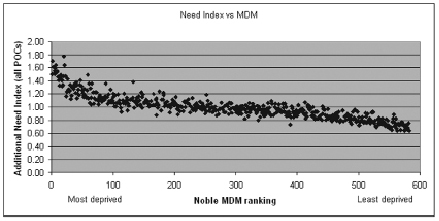
Appendix 4
DCAL
Libraries allocate resources to the Education and Library Boards based on the funding formula outlined in the ‘Northern Ireland Libraries: A Framework for Change’. The formula includes a Targeting Social Need (TSN) adjustment of 10% in recognition of the additional costs involved in outreach work to socially deprived or rural communities.
Sport NI operates scoring matrices when allocating funds to grant recipients under the community sport programmes. The scoring matrix takes into consideration the Noble Multiple Deprivation Index and targets those in the top 25%. Projects scoring highly will be allocated funds up to the budget available from DCAL/DCMS.
NI Events Co does not use any established social economic data when determining budgets but strives to deliver a positive impact on social cohesion within Northern Ireland through mixed community volunteer programmes etc. In relation to delivering economic benefit to NI this impacts on all of NI, therefore including deprived areas. NIEC ensures the benefits associated with hosting major events are spread throughout NI. If an event is delivering benefits within a deprived area it will be favourably looked upon during the assessment but would not be an essential criteria. Other initiatives such as master classes during the events are held where the emphasis is on involving children from deprived areas which is part of the objective for each major event.
Inland Waterways and Inland Fisheries has completed administering a Water Based Tourism Measure under the EU Programme for Peace and Reconciliation. A total of 62 province wide projects were funded involving grant aid of 4.64m. Targeting Social Need was one of the eligibility criteria to be addressed by applicants.
Appendix 5
DE
The Department of Education recognises the relationship between social deprivation and educational outcomes. It strives to enhance achievement in order to provide a pathway out of the cycle of deprivation, improve levels of literacy and numeracy and benefit the economy and society as a whole.
The Department targets funding towards pupils from socially deprived backgrounds and those that underachieve in a variety of ways. For example:
- the Local Management of Schools Common Funding Formula contains two factors to target social need, which use free school meal entitlement and levels of educational achievement to target resources;
- a similar approach is reflected in the budget determination for the Education and Library Boards;
- funding is provided for young people in West Belfast and Greater Shankill (WBGS) (encompassing parts of the Belfast and South Eastern Education and Library Board areas) through the WBGS Taskforce Education Initiative. The Department also provides some additional funding to schools in interface areas in Belfast;
- funding is targeted to provide free school meals to pupils from deprived backgrounds.
In addition, funding for Extended Schools, provided through the Children and Young People Fund, is specifically targeted using Noble indicators and provides additional facilities such as breakfast and after school clubs for pupils from deprived areas. Post-primary schools were selected for funding if they drew 51% or more of their enrolment from neighbourhood renewal areas and/or the 30% most deprived wards in the education domain, or had a free school meal entitlement percentage greater than 37% of its enrolment. In the case of nursery, primary and special schools, as the Department does not have postcodes for individual pupils, schools were selected if they were located in neighbourhood renewal areas or in the 30% lowest ranking wards or Super Output Areas in the education domain – as a general rule, pupils attend their nearest primary school – or if they had a free school meal entitlement percentage greater than 37% of their enrolment or, in the case of nursery schools, the percentage of pupils whose parents were on income based Job Seekers Allowance was greater than 37% of the enrolment.
As far as the Youth Service is concerned, organisations from all sections of the community are registered if they fulfil the general registration criteria. In recent years there has been a move towards allocating resources to target socio-economic need by focusing on marginalised and excluded young people, while at the same time still maintaining a general service throughout the sector.
Appendix 6
DEL
Preparation for Work Division (PfW)
The majority of employment and training provision for which PfW has responsibility is available across NI, i.e. provision is available to all eligible clients, regardless of where they live. Clients are almost exclusively either unemployed or economically inactive and number among the most disadvantaged in our society. PfW is thus targeting disadvantage through its main programmes and provision.
PfW has also developed provision which targets those areas of highest unemployment within NI – Belfast, Derry and Strabane. A new programme, ‘Local Employment Intermediary Service’ began on 2 April in these areas. The programme, delivered by and in the communities, aims to outreach to those with significant barriers to work and assist them to move towards and into work. The programme operates alongside, and is complementary to, our existing programmes.
In considering approaches to tackling economic inactivity and specifically the high level of incapacity benefit claimants in NI, ‘Pathways to Work’ was piloted in a number of areas which included some Neighbourhood Renewal Areas. Preliminary results show that the programme is being successful in assisting Incapacity Benefit claimants to move towards and into work. As a result of this, an in preparation for the introduction of the Employment and Support Allowance, Pathways to Work will now be rolled out across NI.
Further Education Division (FE)
The main source of funding for the FE Sector is the FE Recurrent Grant, which is distributed each year using an agreed formula, which incorporates a socio-economic weighting. The current Student Powered Unit of Resource allocated the funding at a student level. This latest available data for the 2005/06 Academic Year indicates that 14,140 fundable enrolments were identified as meeting TSN criteria, and these generated funding for the colleges totalling £1.1m.
A new funding formula will operate from the 2007/08 Academic Year onwards, as part of the implementation of FE Means Business. An extensive analysis of the data underpinning student enrolments including socio-economic origin, previous enrolments by super output areas (SoAs) by deprivation, as detailed in the 2005 Noble Indicators, and correlation of the SoAs to the six new area based colleges was undertaken and concluded that, in the new formula, the socio-economic weighting should be applied at a college level. This recommendation was based upon an empirical analysis of the percentage of students in each college’s catchment area identified as originating from the SoAs.
In addition, the incorporation of the Essential Skills budget within the new funding formula, from the forthcoming Academic Year, will further reinforce the Department’s commitment to addressing socio-economic need. For the first time, all Essential Skills enrolments within the colleges will receive the appropriate socio-economic weighting pertaining to the college.
Appendix 7
DRD
It has proved difficult to relate expenditure on neighbourhood renewal areas on a socio economic basis.
DRD does fund transport services under the Rural Transport Fund that seeks to reduce social exclusion but would not directly impact on neighbourhood renewal areas as they are urban. Other urban specialist transport schemes are aimed at distinct groups such as disabled people but not based on neighbourhood renewal areas.
In relation to road schemes socio economic benefits are considered as part of an economic appraisal to help justify a scheme’s progress in the programme but it would not be the deciding factor on budget allocation. The resources for road maintenance are allocated on the basis of need using a range of weighted indicators tailored to each maintenance activity.
Appendix 8
NIO
Block funding of Community Safety Partnerships was based on a formula which was weighted according to four factors:
- 40% was related to the levels of recorded crime,
- 30% to the population of the District,
- 20% was a straight split across all 26 CSPs,
- 10% was based on the noble indicators of deprivation.
Community Safety Unit have invested £3.75m over 2005/6 and 2006/7.
Correspondence from DSD
25 September 2007
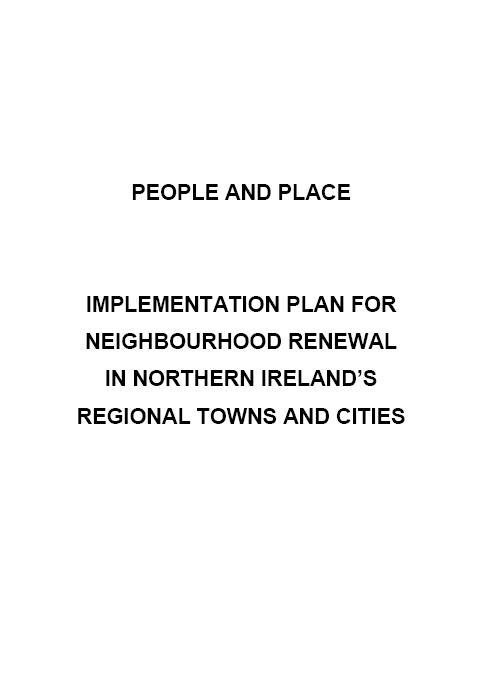
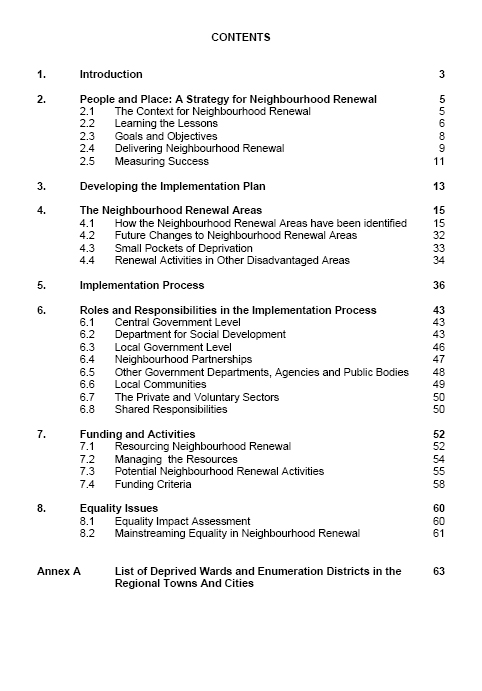
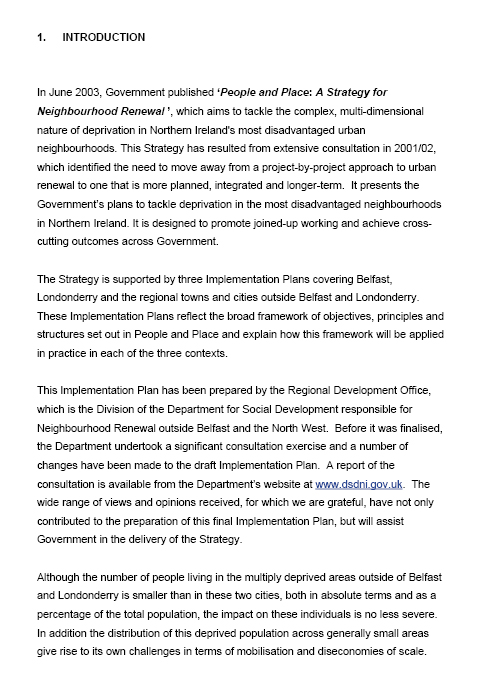
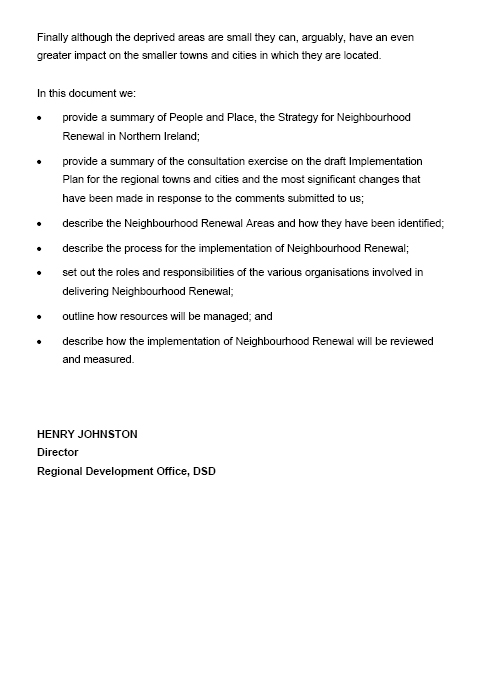
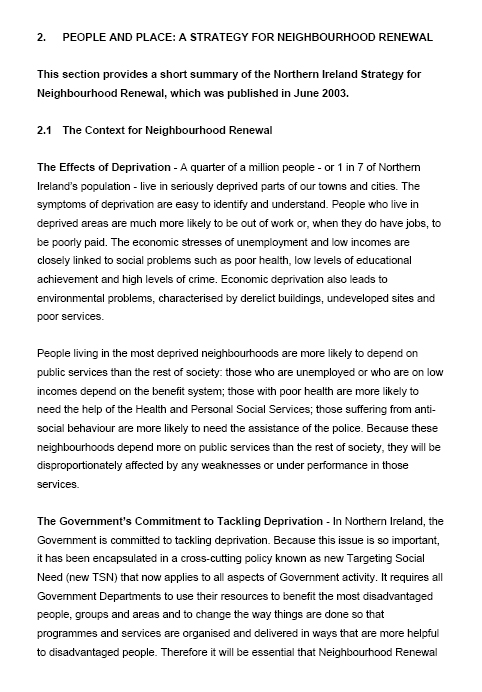
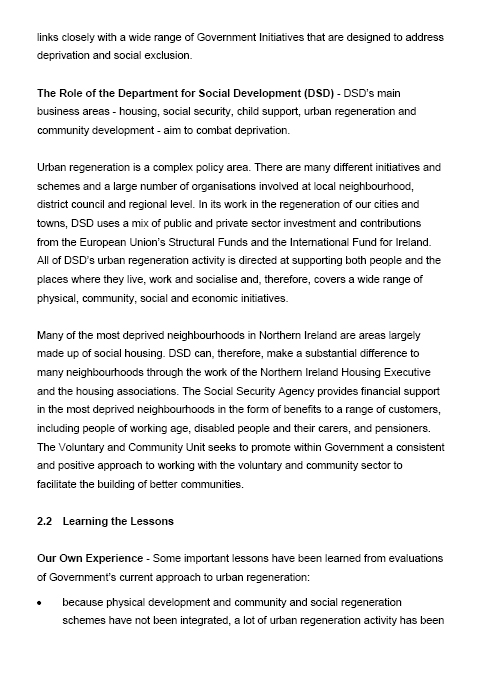
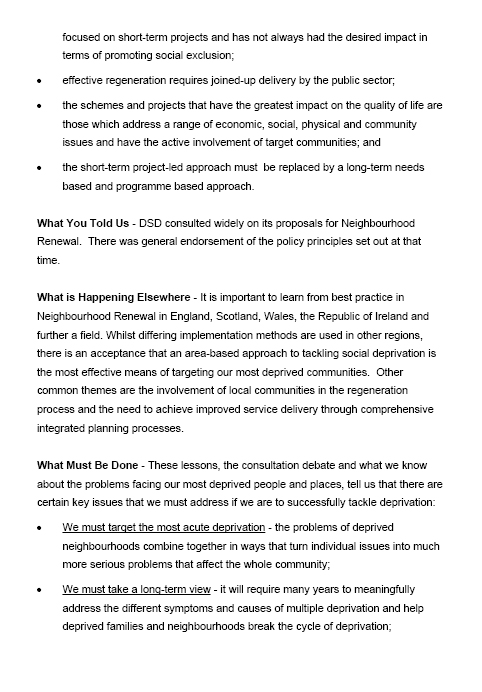
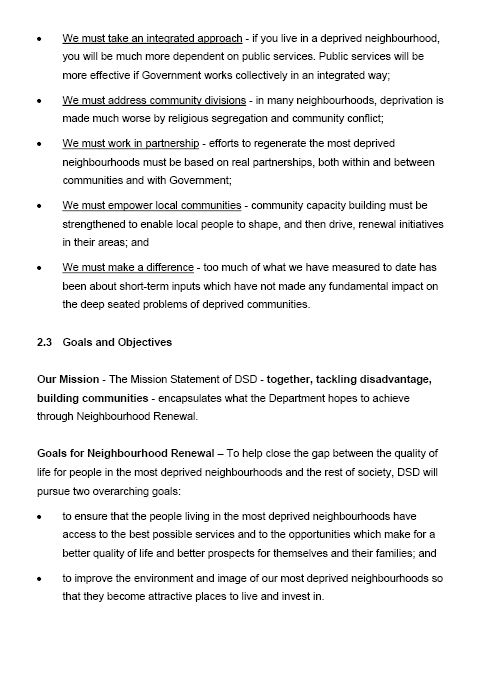

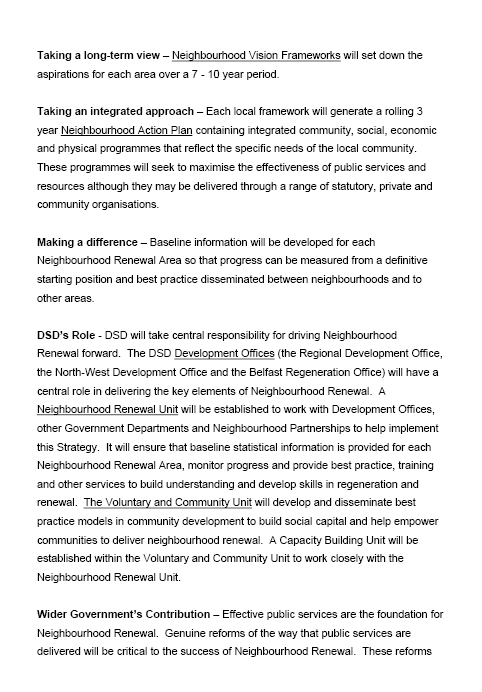
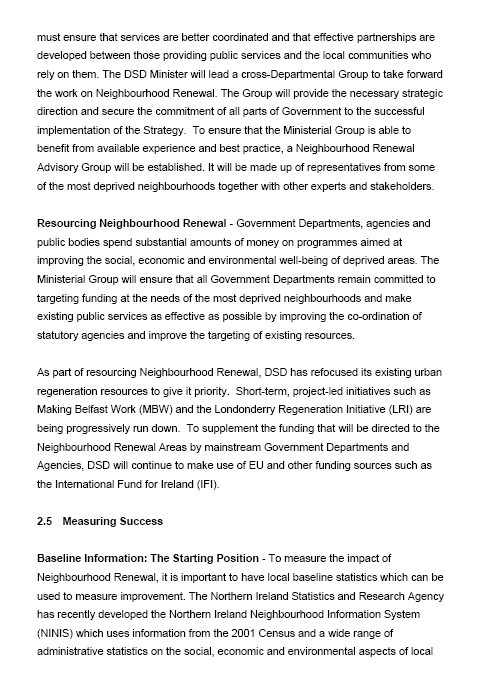
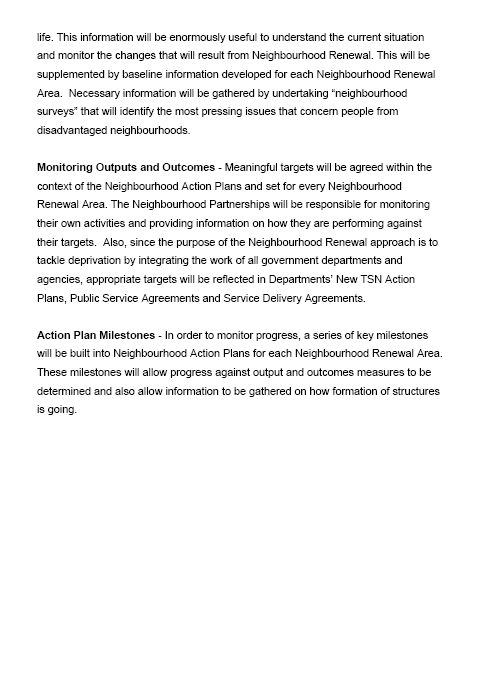
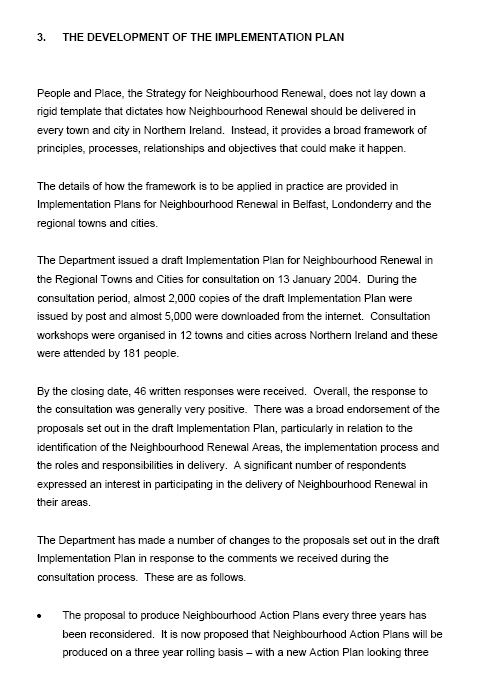
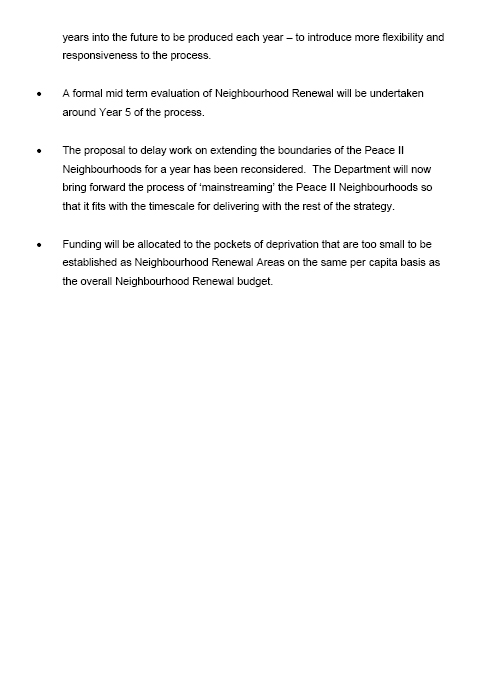
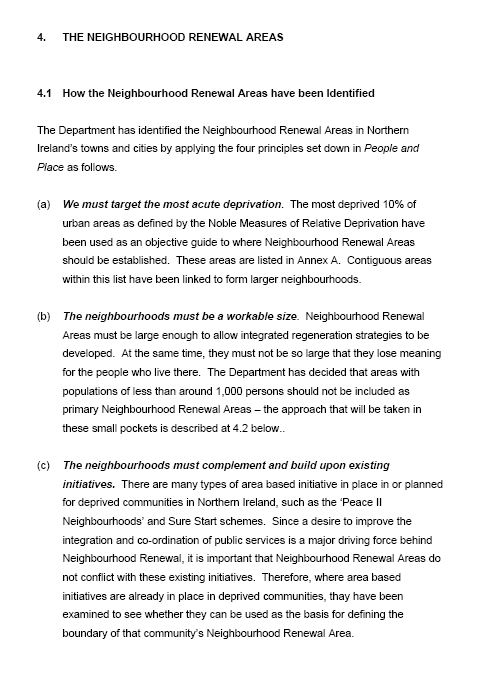
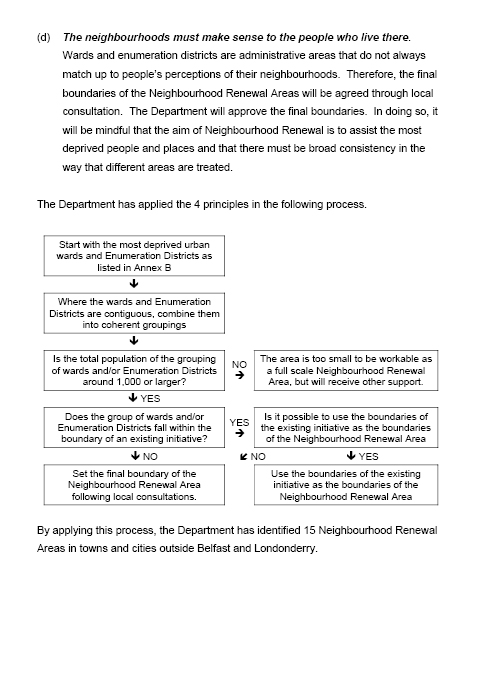
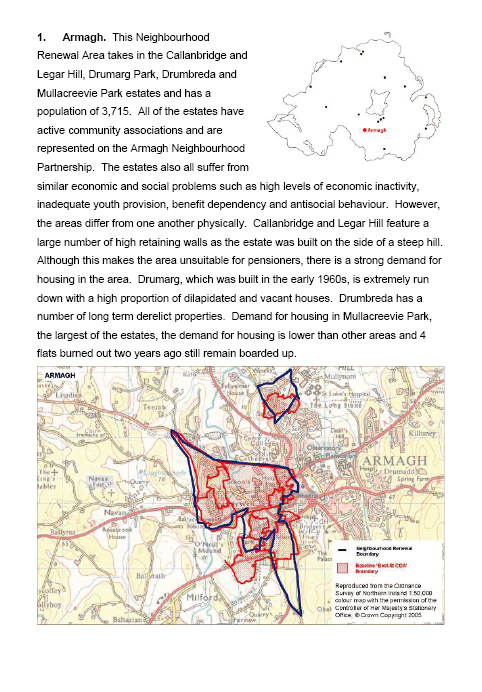
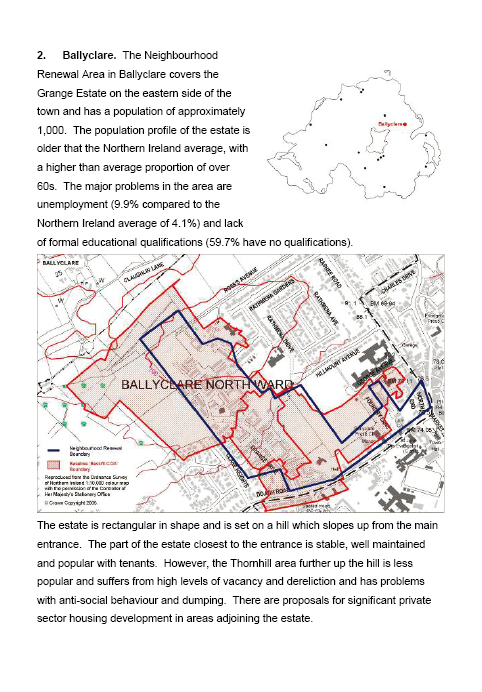
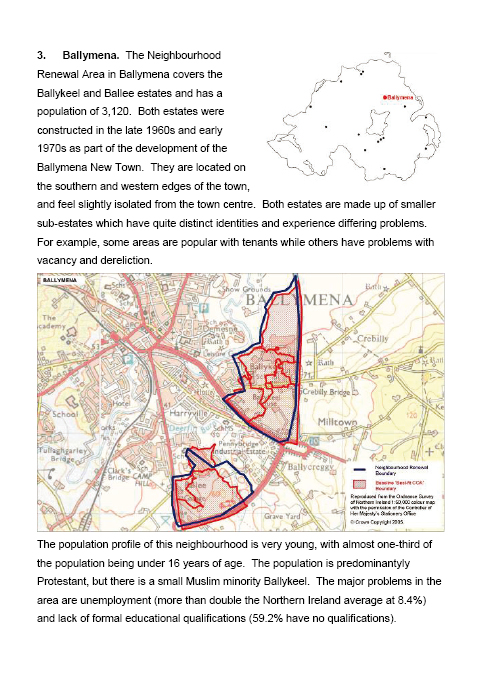
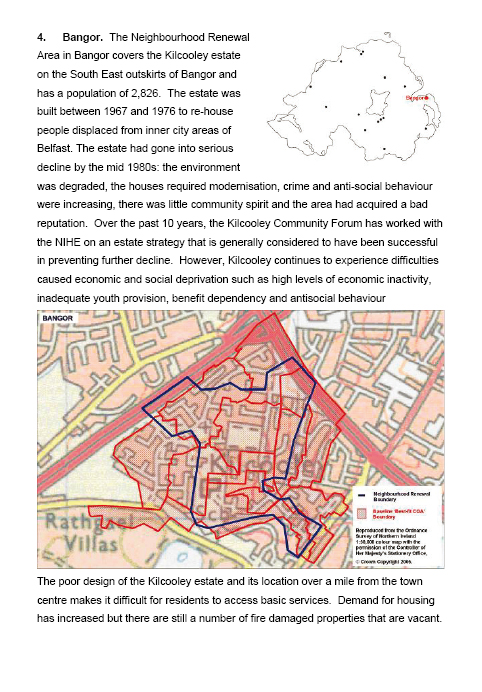
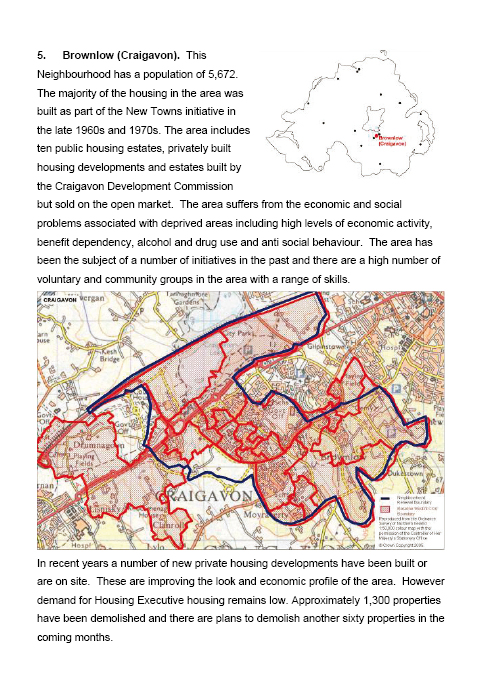
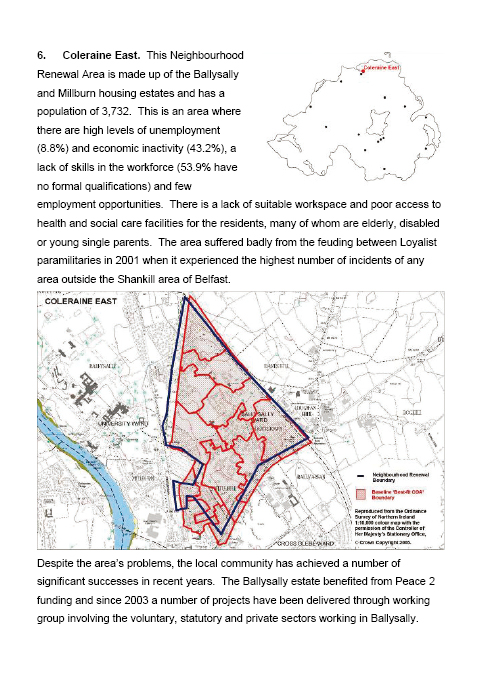
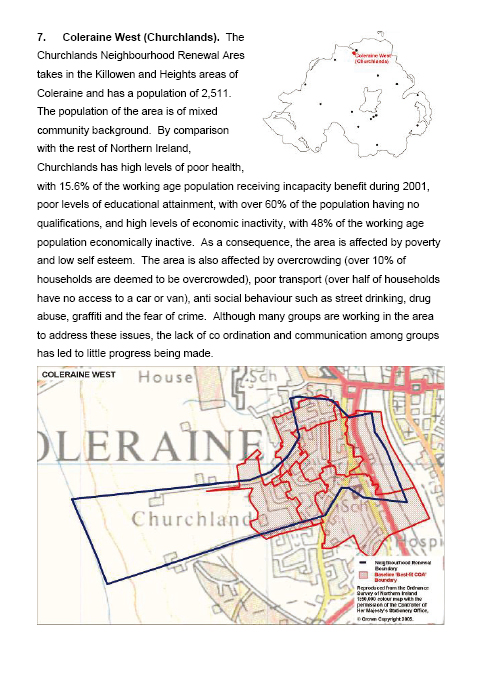
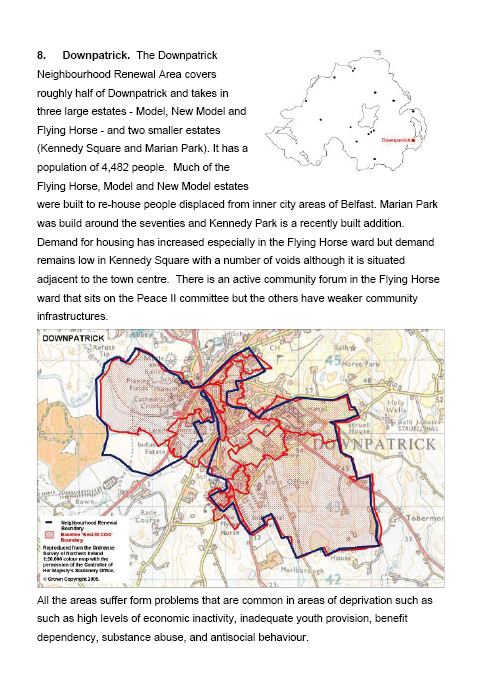
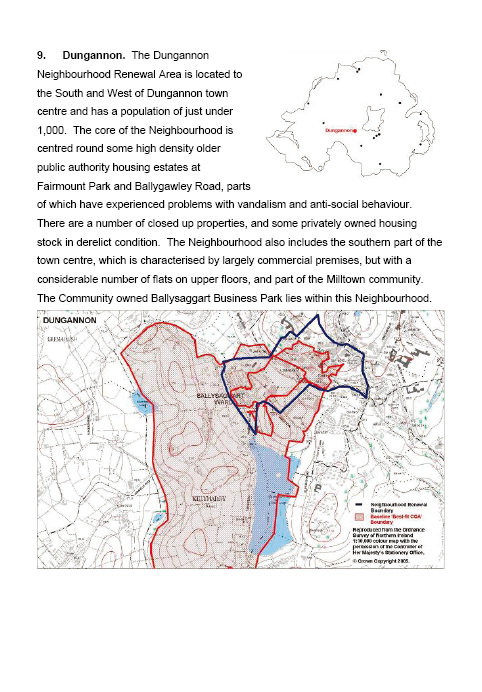
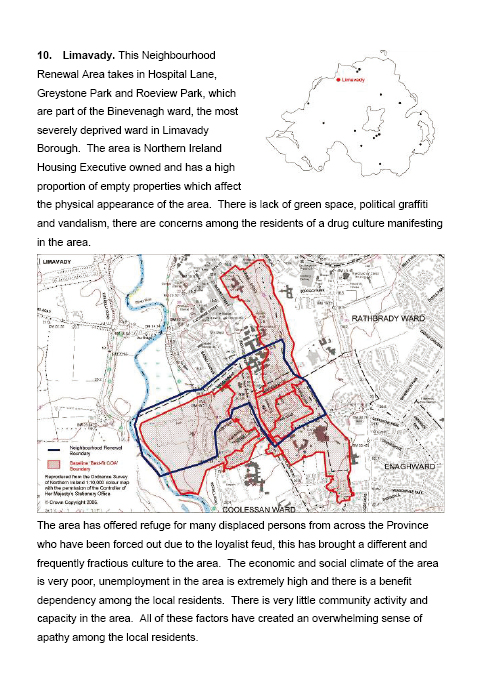
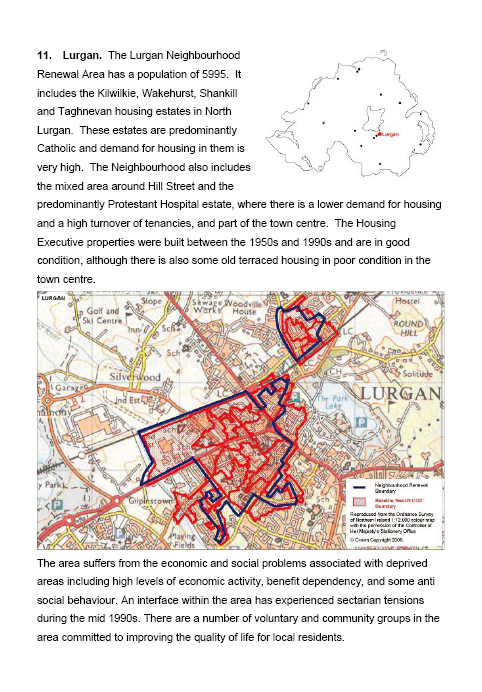
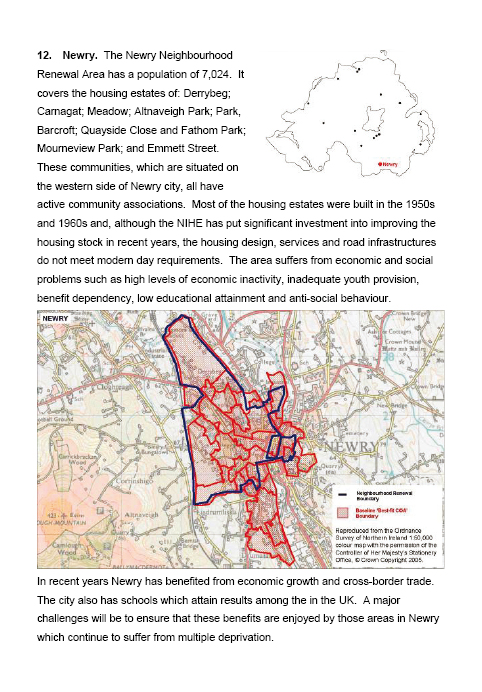
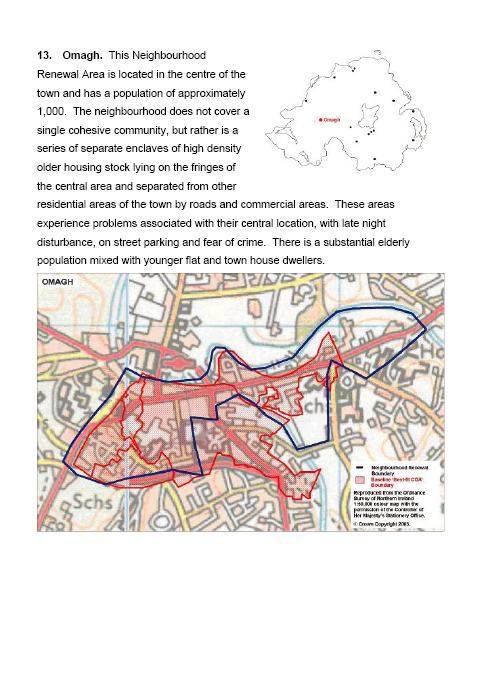
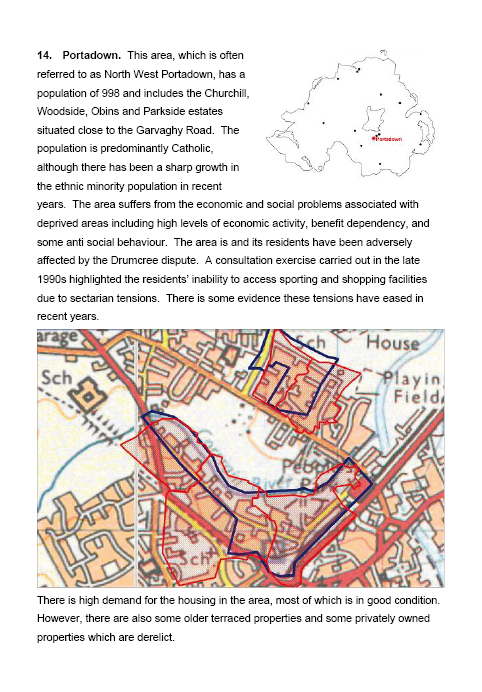
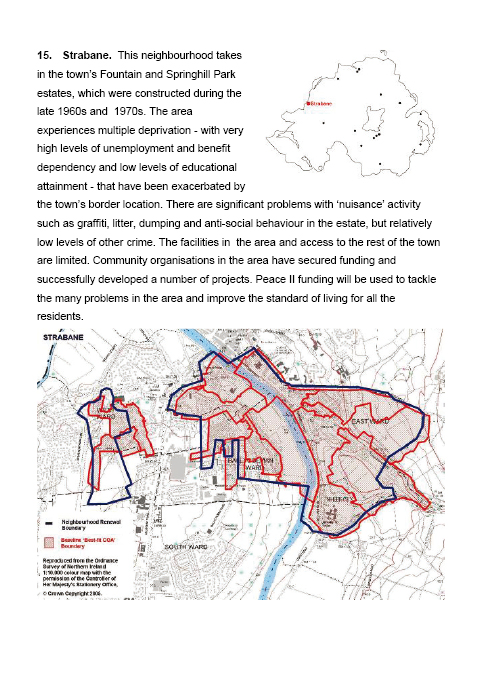
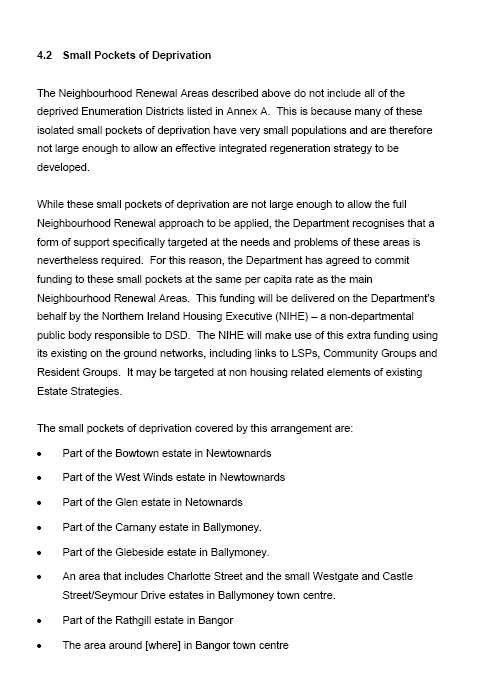
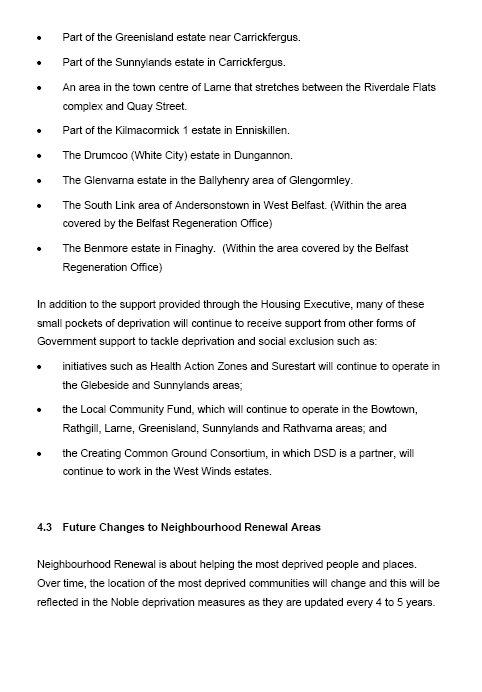
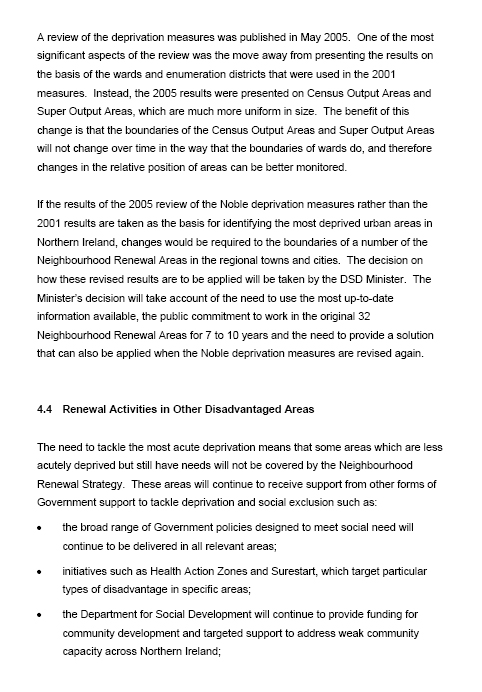
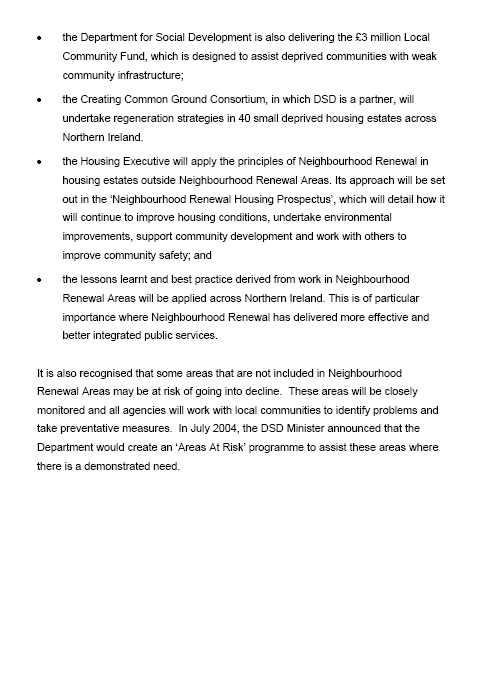
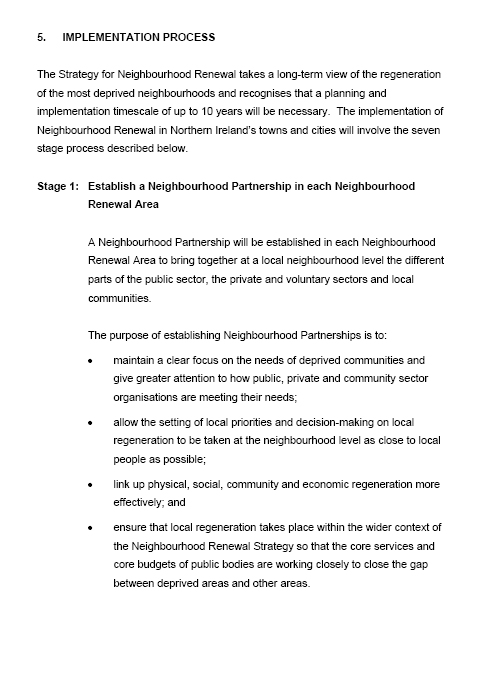
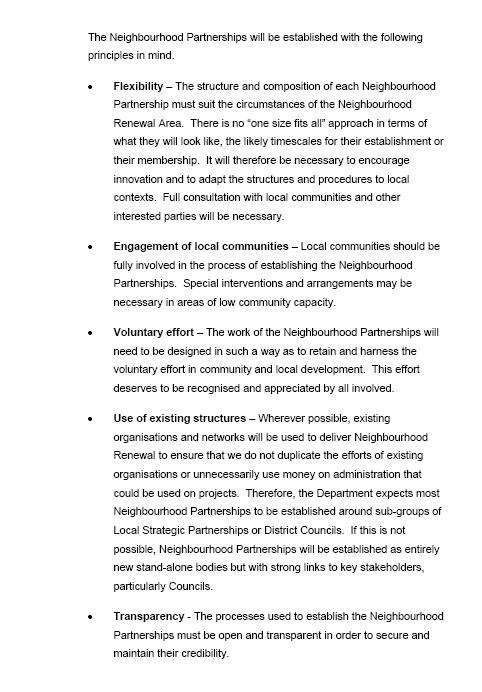
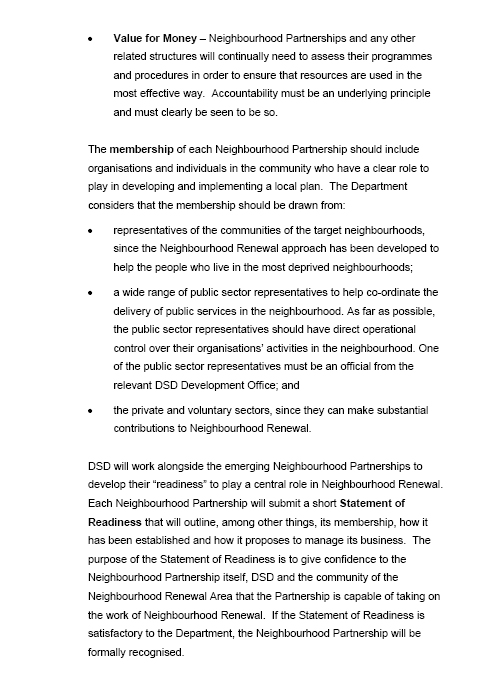
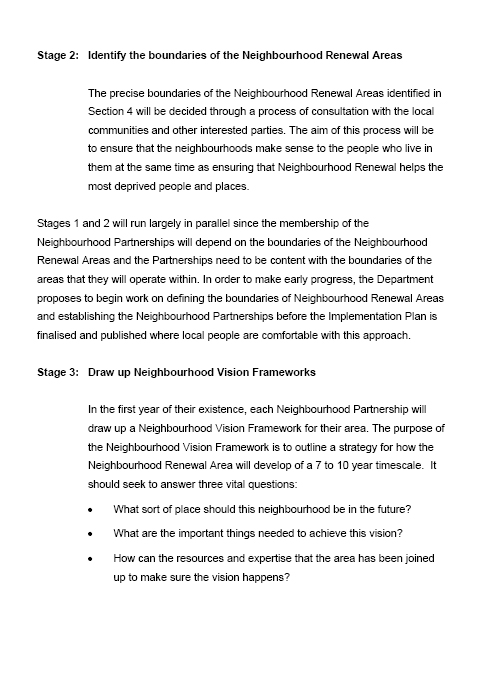
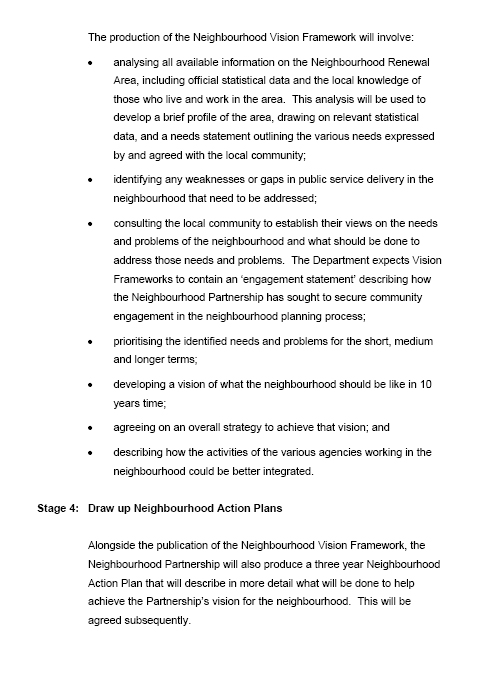
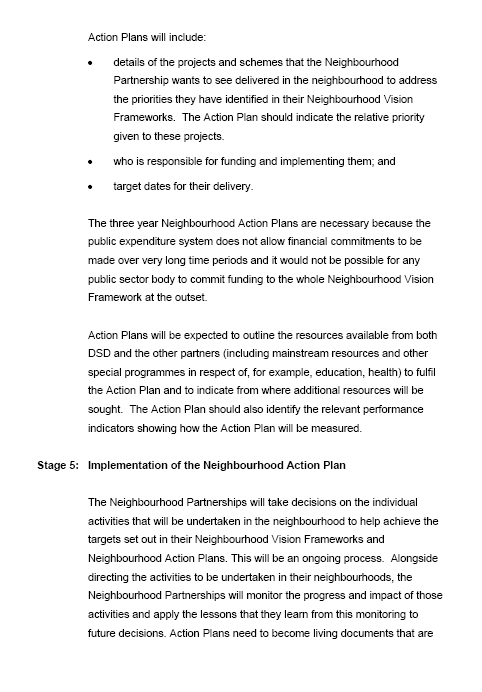
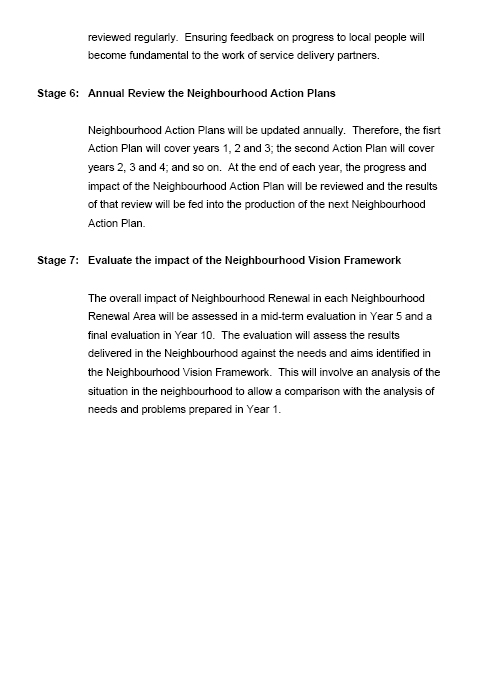
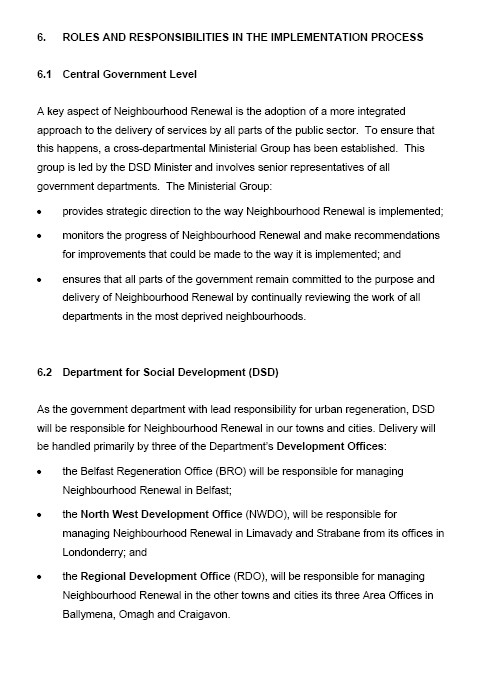
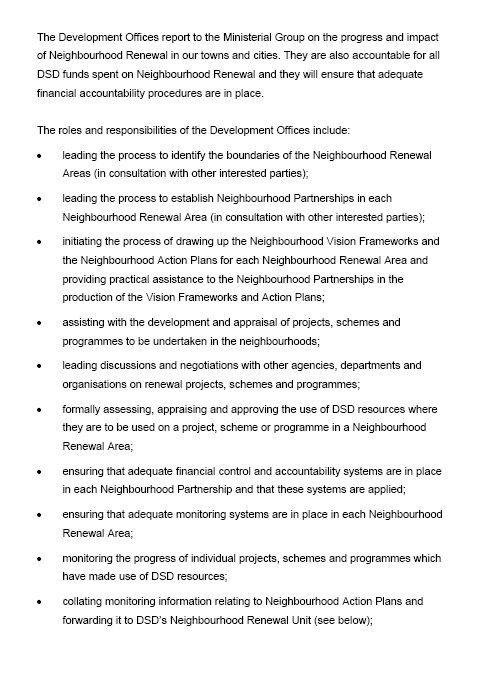
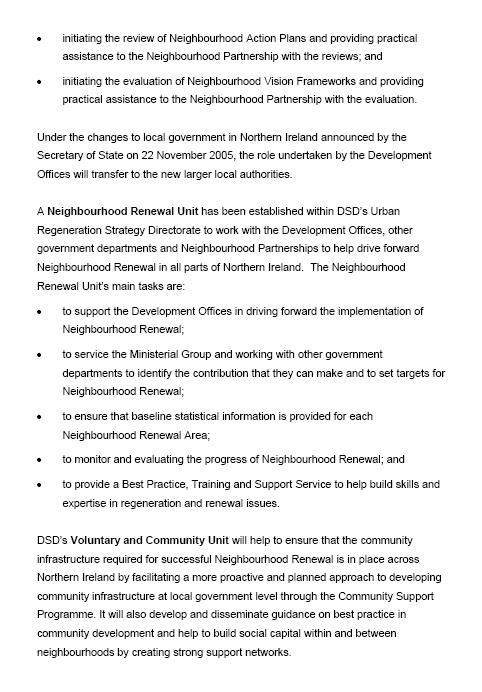
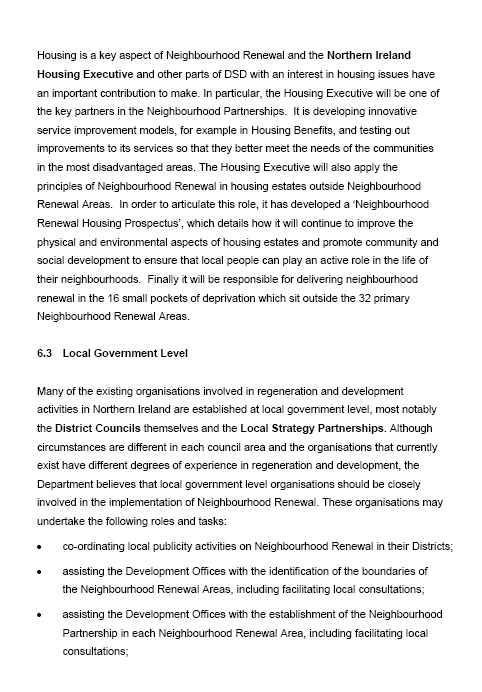
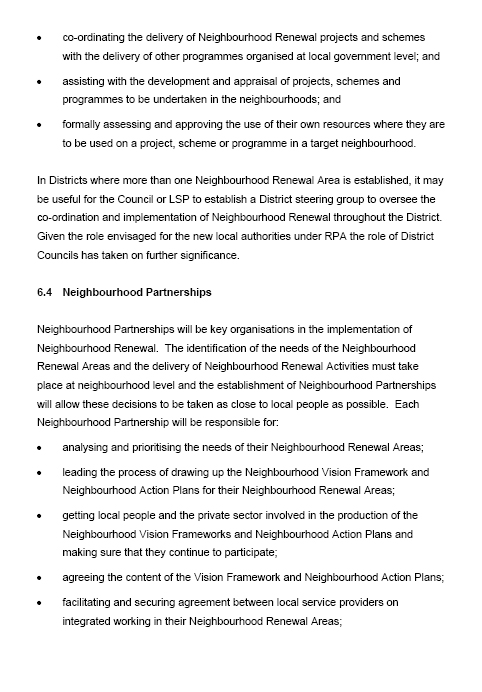
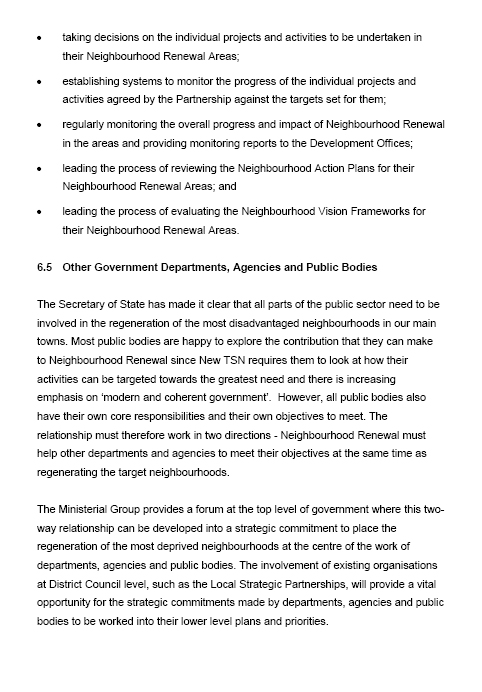
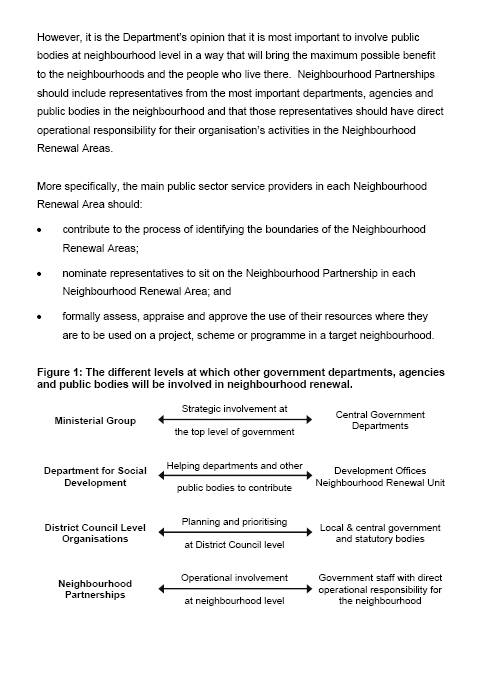
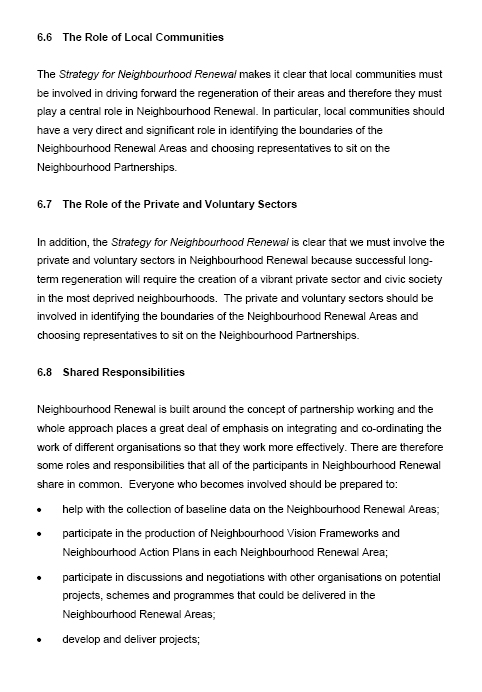

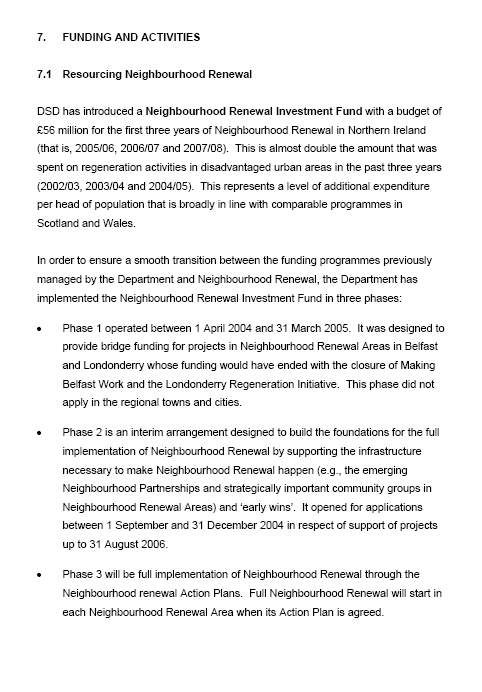
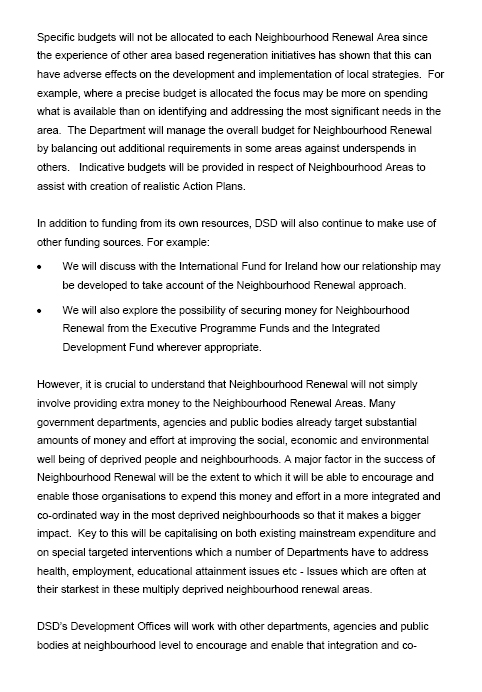
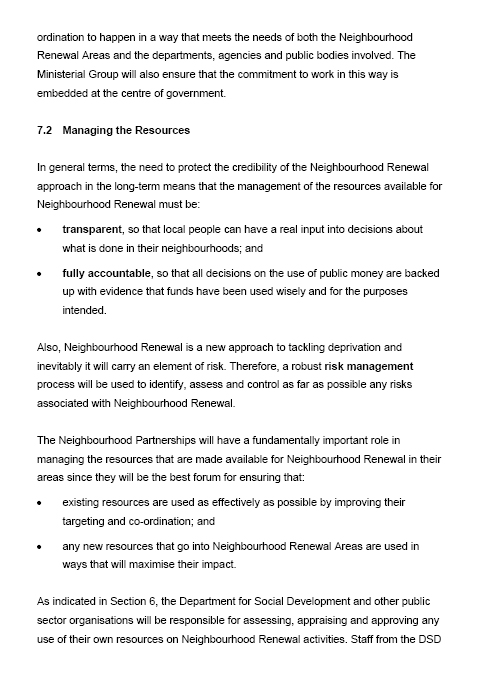
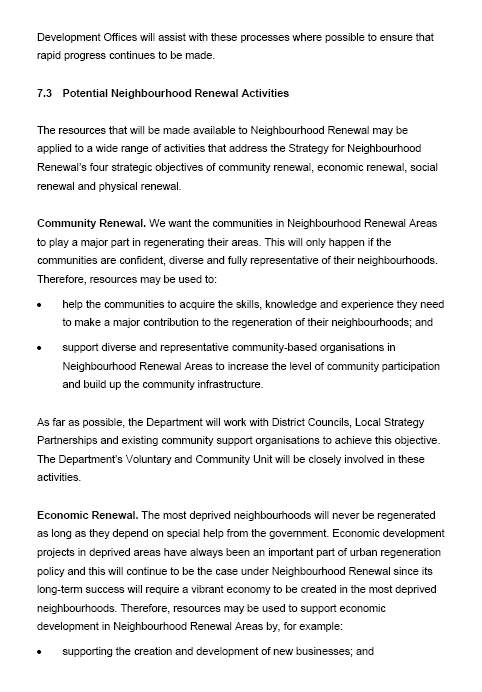
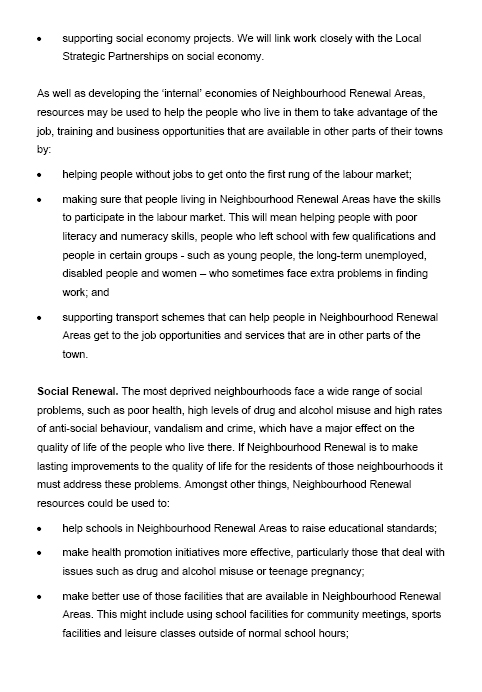
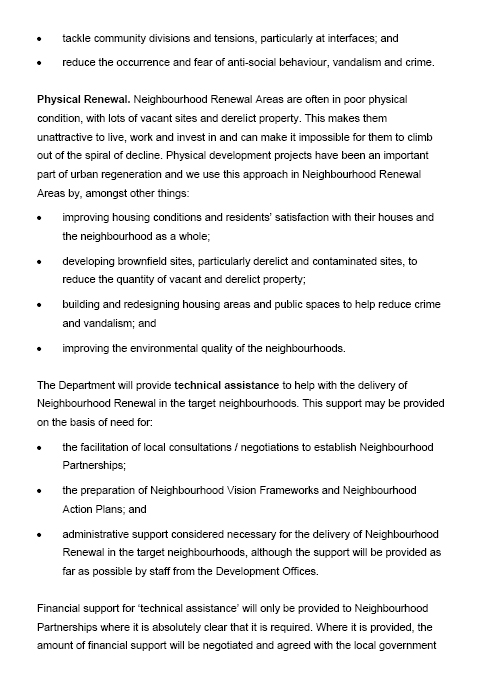
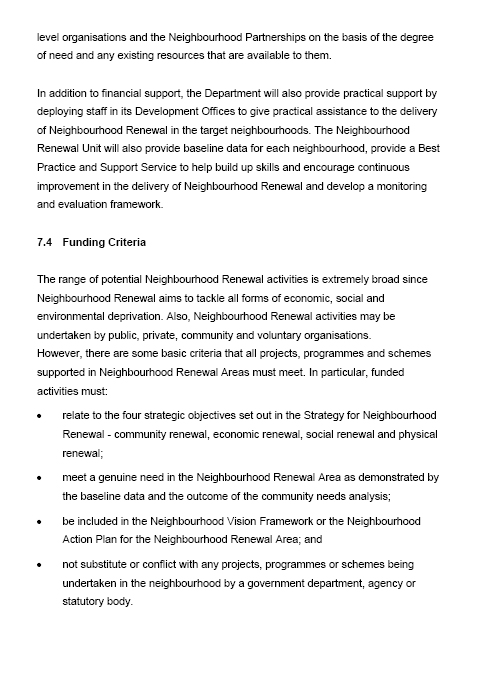

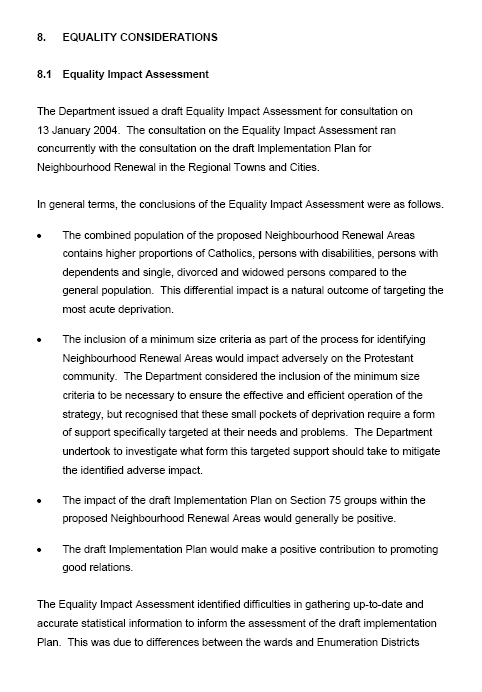
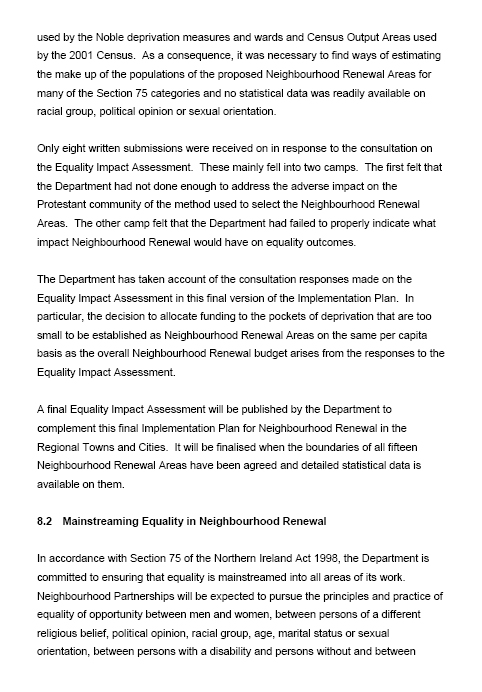

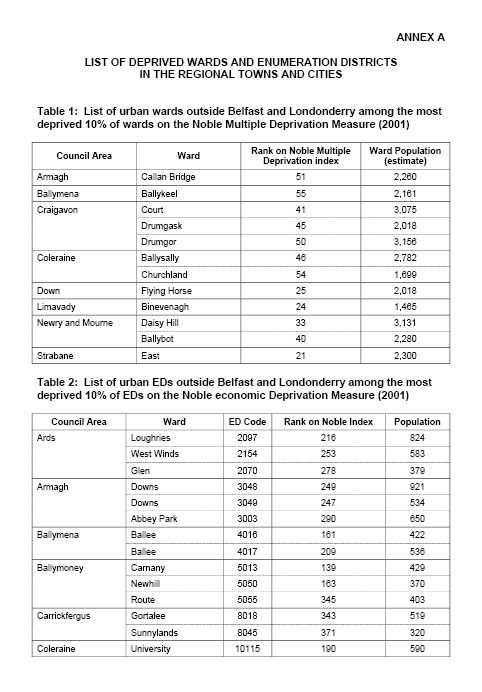
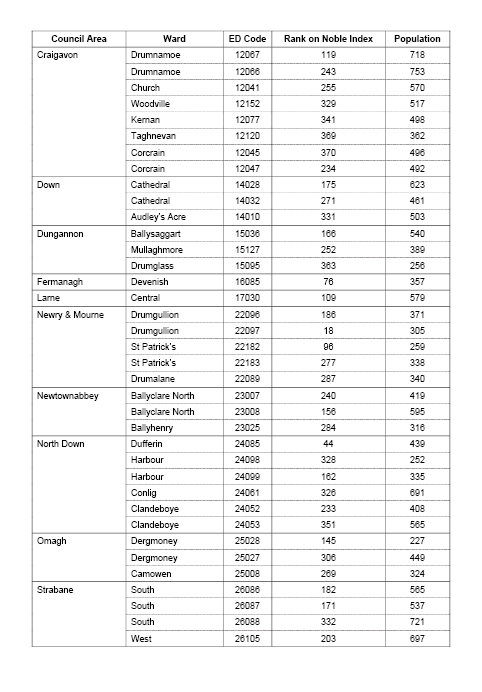
Correspondence from DSD
25 September 2007
![]()
From: Angela Clarke
Neighbourhood Renewal Unit
Date: 25 September 2007
To: Marie Austin
Clerk to the Social Development Committee
Social Development Committee – request for Information from DHSSPS.
Your letter dated 12 September 2007 to David Malcolm, on behalf of the Social Development Committee, sought further information from the Department of Health, Social Services and Public Safety in relation to the distribution of the £164 million for deprivation related need. The relevant information has now been secured from that Department.
Attached at Appendix A is a table showing how the money for deprivation related need (ignoring age effect) is distributed. £175m is removed from more affluent areas and is added to more deprived areas, this figure represents an update from the previously supplied figure of £164 due to annual updates. The needs index shows the relative position of each electoral ward in terms of need, around an NI average of 1.0.
Additional information about restrictions on the use of such data is set out in Appendix B. The Department emphasize that although the data are calculated at electoral ward level, and can be used to inform the distribution of resources, budgets are only allocated to much larger populations so that the natural variation in need for health and social care of small populations can be balanced out across a greater number of people.
The original note about the capitation formula used by the Department of Health, Social Services and Public Health to inform the allocation of resources across Health and Social Services (HSS) Boards is provided for convenience at Appendix C.
Angela Clarke
Appendix A
Distribution of resources for Deprivation related Need and the corresponding Needs Index for each Electoral Ward
|
Wardname |
Lgd |
Board |
Need index |
Redistribution |
|---|---|---|---|---|
|
Shantallow East |
Derry |
Western |
2.28 |
£ 4,484 |
|
Collin_glen |
Lisburn |
Eastern |
1.74 |
£ 8,840 |
|
Upper_springfield |
Belfast |
Eastern |
1.63 |
£ 4,209 |
|
St Peters |
Derry |
Western |
1.59 |
£ 1,529 |
|
Ardoyne |
Belfast |
Eastern |
1.50 |
£ 4,483 |
|
Whiterock |
Belfast |
Eastern |
1.48 |
£ 3,488 |
|
Falls |
Belfast |
Eastern |
1.47 |
£ 3,311 |
|
Ballymacarrett |
Belfast |
Eastern |
1.46 |
£ 3,418 |
|
Creggan_Central |
Derry |
Western |
1.46 |
£ 1,249 |
|
Brandywell |
Derry |
Western |
1.45 |
£ 1,355 |
|
Creggan_south |
Derry |
Western |
1.43 |
£ 897 |
|
Drumgask |
Craigavon |
Southern |
1.41 |
£ 755 |
|
Carnhill |
Derry |
Western |
1.41 |
£ 1,517 |
|
Water_Works |
Belfast |
Eastern |
1.41 |
£ 2,922 |
|
Kilwee |
Lisburn |
Eastern |
1.40 |
£ 1,889 |
|
St._Annes |
Belfast |
Eastern |
1.40 |
£ 2,091 |
|
East |
Strabane |
Western |
1.39 |
£ 815 |
|
Corcrain |
Craigavon |
Southern |
1.38 |
£ 1,174 |
|
Shantallow West |
Derry |
Western |
1.37 |
£ 2,546 |
|
Coalisland_South |
Dungannon |
Southern |
1.37 |
£ 1,922 |
|
Crumlin |
Belfast |
Eastern |
1.35 |
£ 1,908 |
|
Daisy_Hill |
Newry and Mourne |
Southern |
1.35 |
£ 1,183 |
|
New Lodge |
Belfast |
Eastern |
1.35 |
£ 2,846 |
|
Twinbrook |
Lisburn |
Eastern |
1.34 |
£ 1,980 |
|
Callan_Bridge |
Armagh |
Southern |
1.34 |
£ 1,065 |
|
Clonard |
Belfast |
Eastern |
1.34 |
£ 2,166 |
|
Drumgor |
Craigavon |
Southern |
1.33 |
£ 1,067 |
|
Glencolin |
Belfast |
Eastern |
1.33 |
£ 3,143 |
|
Spelga |
Newry and Mourne |
Southern |
1.33 |
£ 1,263 |
|
The_Diamond |
Derry |
Western |
1.33 |
£ 1,403 |
|
Ballysally |
Coleraine |
Northern |
1.32 |
£ 1,437 |
|
Lisanelly |
Omagh |
Western |
1.31 |
£ 994 |
|
Duncairn |
Belfast |
Eastern |
1.31 |
£ 1,573 |
|
Beechwood |
Derry |
Western |
1.30 |
£ 982 |
|
Ballysaggart |
Dungannon |
Southern |
1.30 |
£ 965 |
|
Flying_Horse |
Down |
Eastern |
1.30 |
£ 1,113 |
|
Island |
Belfast |
Eastern |
1.30 |
£ 1,969 |
|
Fountain_Hill |
Antrim |
Northern |
1.29 |
£ 544 |
|
Ballybot |
Newry and Mourne |
Southern |
1.29 |
£ 1,406 |
|
The_Mount |
Belfast |
Eastern |
1.29 |
£ 1,642 |
|
Shaftesbury |
Belfast |
Eastern |
1.28 |
£ 2,673 |
|
Binevenagh & Coolessan |
Limavady |
Western |
1.27 |
£ 1,399 |
|
Westland |
Derry |
Western |
1.26 |
£ 892 |
|
Coalisland_North |
Dungannon |
Southern |
1.26 |
£ 652 |
|
Crevagh_and_Springtown |
Derry |
Western |
1.26 |
£ 3,387 |
|
Victoria |
Derry |
Western |
1.25 |
£ 490 |
|
Forkhill |
Newry and Mourne |
Southern |
1.24 |
£ 860 |
|
Strand |
Derry |
Western |
1.24 |
£ 821 |
|
Glen Road |
Belfast |
Eastern |
1.23 |
£ 1,954 |
|
Beechmount |
Belfast |
Eastern |
1.23 |
£ 1,574 |
|
Tullygally |
Craigavon |
Southern |
1.23 |
£ 715 |
|
Drumnamoe |
Craigavon |
Southern |
1.23 |
£ 1,040 |
|
Culmore |
Derry |
Western |
1.22 |
£ 1,624 |
|
Woodvale |
Belfast |
Eastern |
1.22 |
£ 1,363 |
|
West_Winds |
Ards |
Eastern |
1.21 |
£ 818 |
|
Tullycarnet |
Castlereagh |
Eastern |
1.20 |
£ 742 |
|
Shankill |
Belfast |
Eastern |
1.20 |
£ 1,556 |
|
West |
Strabane |
Western |
1.20 |
£ 1,568 |
|
Old_Warren |
Lisburn |
Eastern |
1.20 |
£ 535 |
|
Tonagh |
Lisburn |
Eastern |
1.19 |
£ 1,041 |
|
Botanic |
Belfast |
Eastern |
1.18 |
£ 1,561 |
|
Bradan |
Newtownabbey |
Northern |
1.18 |
£ 656 |
|
Highfield |
Belfast |
Eastern |
1.18 |
£ 1,454 |
|
Rathenraw & Steeple |
Antrim |
Northern |
1.17 |
£ 667 |
|
Woodstock |
Belfast |
Eastern |
1.17 |
£ 1,633 |
|
Blackstaff |
Belfast |
Eastern |
1.17 |
£ 1,239 |
|
Ballykeel |
Ballymena |
Northern |
1.17 |
£ 327 |
|
Clipperstown & Northland |
Carrickfergus |
Northern |
1.17 |
£ 832 |
|
Silver Bridge |
Newry and Mourne |
Southern |
1.17 |
£ 772 |
|
Cathedral |
Down |
Eastern |
1.17 |
£ 694 |
|
Ballyoran |
Craigavon |
Southern |
1.17 |
£ 671 |
|
Rosemount |
Derry |
Western |
1.17 |
£ 885 |
|
Crossmaglen |
Newry and Mourne |
Southern |
1.17 |
£ 553 |
|
Church & Court |
Craigavon |
Southern |
1.17 |
£ 1,515 |
|
Tavanagh |
Craigavon |
Southern |
1.17 |
£ 676 |
|
Carrowreagh |
Castlereagh |
Eastern |
1.16 |
£ 577 |
|
Cliftonville |
Belfast |
Eastern |
1.16 |
£ 1,420 |
|
Clandeboye |
North Down |
Eastern |
1.16 |
£ 945 |
|
Ballynashallog |
Derry |
Western |
1.16 |
£ 1,039 |
|
Dunclug |
Ballymena |
Northern |
1.16 |
£ 716 |
|
Enagh |
Limavady |
Western |
1.16 |
£ 938 |
|
Ladybrook |
Belfast |
Eastern |
1.16 |
£ 1,762 |
|
Maghera |
Magherafelt |
Northern |
1.16 |
£ 526 |
|
Taghnevan |
Craigavon |
Southern |
1.16 |
£ 585 |
|
Devenish & Erne |
Fermanagh |
Western |
1.15 |
£ 866 |
|
Ballee |
Ballymena |
Northern |
1.15 |
£ 495 |
|
Monkstown |
Newtownabbey |
Northern |
1.15 |
£ 479 |
|
Falls_Park |
Belfast |
Eastern |
1.15 |
£ 1,506 |
|
Dungiven |
Limavady |
Western |
1.15 |
£ 424 |
|
Glen |
Derry |
Western |
1.15 |
£ 470 |
|
Ebrington |
Derry |
Western |
1.15 |
£ 606 |
|
Castle_Demesne & Moat |
Ballymena |
Northern |
1.15 |
£ 1,039 |
|
Dromore |
Omagh |
Western |
1.14 |
£ 497 |
|
Woodville |
Craigavon |
Southern |
1.14 |
£ 959 |
|
South |
Strabane |
Western |
1.14 |
£ 689 |
|
Castlederg |
Strabane |
Western |
1.14 |
£ 671 |
|
Keady |
Armagh |
Southern |
1.14 |
£ 533 |
|
Ballycraigy & Newpark |
Antrim |
Northern |
1.13 |
£ 722 |
|
Edenderry |
Banbridge |
Southern |
1.13 |
£ 496 |
|
Dunanney |
Newtownabbey |
Northern |
1.13 |
£ 296 |
|
Enagh |
Derry |
Western |
1.13 |
£ 409 |
|
Claudy |
Derry |
Western |
1.13 |
£ 553 |
|
Derrymore |
Newry and Mourne |
Southern |
1.13 |
£ 524 |
|
Antiville & Craigy_Hill |
Larne |
Northern |
1.13 |
£ 673 |
|
Fintona |
Omagh |
Western |
1.12 |
£ 428 |
|
Love_Lane & Sunnylands |
Carrickfergus |
Northern |
1.12 |
£ 917 |
|
Drumalane |
Newry and Mourne |
Southern |
1.12 |
£ 624 |
|
The_Mall |
Armagh |
Southern |
1.12 |
£ 357 |
|
Caw |
Derry |
Western |
1.12 |
£ 867 |
|
Dergmoney |
Omagh |
Western |
1.11 |
£ 377 |
|
Ballybay |
Craigavon |
Southern |
1.11 |
£ 463 |
|
Ballynafeigh |
Belfast |
Eastern |
1.11 |
£ 822 |
|
Altmore |
Dungannon |
Southern |
1.11 |
£ 291 |
|
Drumgullion |
Newry and Mourne |
Southern |
1.10 |
£ 321 |
|
Downs |
Armagh |
Southern |
1.10 |
£ 482 |
|
Owenkillew |
Omagh |
Western |
1.10 |
£ 319 |
|
Newtownstewart |
Strabane |
Western |
1.10 |
£ 344 |
|
Fair_Green |
Ballymena |
Northern |
1.10 |
£ 231 |
|
Town_Parks_East |
Magherafelt |
Northern |
1.10 |
£ 519 |
|
Corrody |
Derry |
Western |
1.09 |
£ 442 |
|
Valley |
Newtownabbey |
Northern |
1.09 |
£ 318 |
|
Bloomfield |
Belfast |
Eastern |
1.09 |
£ 815 |
|
Lagan_Valley |
Lisburn |
Eastern |
1.09 |
£ 514 |
|
Legoniel |
Belfast |
Eastern |
1.09 |
£ 779 |
|
Finn & Sion_Mills |
Strabane |
Western |
1.09 |
£ 604 |
|
Gortrush |
Omagh |
Western |
1.09 |
£ 341 |
|
Conlig |
North Down |
Eastern |
1.09 |
£ 587 |
|
Macosquin |
Coleraine |
Northern |
1.09 |
£ 295 |
|
Newtownhamilton |
Newry and Mourne |
Southern |
1.09 |
£ 325 |
|
Ardglass |
Down |
Eastern |
1.09 |
£ 376 |
|
Slievekirk |
Strabane |
Western |
1.08 |
£ 256 |
|
Andersonstown |
Belfast |
Eastern |
1.08 |
£ 718 |
|
Coalisland_West_and_Newmills |
Dungannon |
Southern |
1.08 |
£ 194 |
|
Springfarm |
Antrim |
Northern |
1.08 |
£ 441 |
|
Lisnaskea |
Fermanagh |
Western |
1.08 |
£ 376 |
|
Drumglass & Mullaghmore |
Dungannon |
Southern |
1.08 |
£ 410 |
|
Coole & Whitehouse |
Newtownabbey |
Northern |
1.08 |
£ 616 |
|
Bessbrook |
Newry and Mourne |
Southern |
1.08 |
£ 291 |
|
Strangford |
Down |
Eastern |
1.08 |
£ 214 |
|
Camlough |
Newry and Mourne |
Southern |
1.07 |
£ 264 |
|
Killyleagh |
Down |
Eastern |
1.07 |
£ 323 |
|
Killyclogher |
Omagh |
Western |
1.07 |
£ 459 |
|
Loughries |
Ards |
Eastern |
1.06 |
£ 572 |
|
St Marys |
Newry and Mourne |
Southern |
1.06 |
£ 250 |
|
Ballymacoss |
Lisburn |
Eastern |
1.06 |
£ 559 |
|
Enler & Grahams_Bridge |
Castlereagh |
Eastern |
1.06 |
£ 537 |
|
St Patricks |
Newry and Mourne |
Southern |
1.06 |
£ 290 |
|
Gortalowry |
Cookstown |
Northern |
1.06 |
£ 211 |
|
Ballynahinch_East |
Down |
Eastern |
1.06 |
£ 256 |
|
Victoria_Bridge |
Strabane |
Western |
1.06 |
£ 162 |
|
Fathom |
Newry and Mourne |
Southern |
1.05 |
£ 224 |
|
Chichester_Park |
Belfast |
Eastern |
1.05 |
£ 553 |
|
Dunnamore & Pomery |
Cookstown |
Northern |
1.05 |
£ 335 |
|
Armoy & Glendun & Glenshesk |
Moyle |
Northern |
1.05 |
£ 266 |
|
Knockmore |
Lisburn |
Eastern |
1.05 |
£ 202 |
|
Whitehill |
North Down |
Eastern |
1.05 |
£ 214 |
|
Newtownbutler |
Fermanagh |
Western |
1.05 |
£ 146 |
|
Ballyloran |
Larne |
Northern |
1.05 |
£ 182 |
|
Abbey_Park |
Armagh |
Southern |
1.05 |
£ 128 |
|
Belleek_and_Boa |
Fermanagh |
Western |
1.05 |
£ 187 |
|
Ballysillan |
Belfast |
Eastern |
1.05 |
£ 413 |
|
Glencairn |
Belfast |
Eastern |
1.05 |
£ 307 |
|
Central & University |
Coleraine |
Northern |
1.05 |
£ 333 |
|
Ballycrossan |
Newry and Mourne |
Southern |
1.05 |
£ 198 |
|
Donaghmore |
Dungannon |
Southern |
1.05 |
£ 132 |
|
Dundrum |
Down |
Eastern |
1.04 |
£ 144 |
|
Dufferin |
North Down |
Eastern |
1.04 |
£ 181 |
|
Charlemont |
Armagh |
Southern |
1.04 |
£ 140 |
|
Fortwilliam |
Belfast |
Eastern |
1.04 |
£ 404 |
|
Dunnamanagh & Plumbridge |
Strabane |
Western |
1.04 |
£ 278 |
|
Clondermot |
Derry |
Western |
1.04 |
£ 272 |
|
Markethill |
Armagh |
Southern |
1.04 |
£ 160 |
|
Gilford & Lawrencetown |
Banbridge |
Southern |
1.04 |
£ 283 |
|
Churchland & The_Cuts |
Coleraine |
Northern |
1.04 |
£ 368 |
|
Crumlin |
Antrim |
Northern |
1.04 |
£ 286 |
|
Washing_Bay |
Dungannon |
Southern |
1.04 |
£ 125 |
|
Clare |
Strabane |
Western |
1.03 |
£ 149 |
|
Hillhall |
Lisburn |
Eastern |
1.03 |
£ 171 |
|
Carnany & Newhill |
Ballymoney |
Northern |
1.03 |
£ 193 |
|
Ballygawley |
Dungannon |
Southern |
1.03 |
£ 130 |
|
Annagh |
Craigavon |
Southern |
1.03 |
£ 123 |
|
Rathfriland |
Newry and Mourne |
Southern |
1.03 |
£ 122 |
|
Banagher |
Derry |
Western |
1.03 |
£ 128 |
|
Ardboe |
Cookstown |
Northern |
1.03 |
£ 89 |
|
Ballyclare_North |
Newtownabbey |
Northern |
1.03 |
£ 217 |
|
Carrigatuke |
Armagh |
Southern |
1.03 |
£ 103 |
|
Augher |
Dungannon |
Southern |
1.03 |
£ 101 |
|
Agivey & Ringsend |
Coleraine |
Northern |
1.03 |
£ 161 |
|
Killycolpy |
Cookstown |
Northern |
1.03 |
£ 101 |
|
Kilkeel_South |
Newry and Mourne |
Southern |
1.03 |
£ 93 |
|
Newbuildings & Oldtown |
Cookstown |
Northern |
1.03 |
£ 155 |
|
Castledawson |
Magherafelt |
Northern |
1.03 |
£ 120 |
|
Drumquin & Fairy_Water |
Omagh |
Western |
1.02 |
£ 159 |
|
Bloomfield |
North Down |
Eastern |
1.02 |
£ 122 |
|
Creggan |
Newry and Mourne |
Southern |
1.02 |
£ 80 |
|
Moy |
Dungannon |
Southern |
1.02 |
£ 86 |
|
Sydenham |
Belfast |
Eastern |
1.02 |
£ 217 |
|
Castlecoole |
Fermanagh |
Western |
1.02 |
£ 137 |
|
Glenaan & Glenariff |
Moyle |
Northern |
1.01 |
£ 74 |
|
Island |
Fermanagh |
Western |
1.01 |
£ 58 |
|
Castlewellan |
Down |
Eastern |
1.01 |
£ 97 |
|
Ballykelly & Glack |
Limavady |
Western |
1.01 |
£ 63 |
|
Hilden |
Lisburn |
Eastern |
1.01 |
£ 45 |
|
Victoria |
Carrickfergus |
Northern |
1.01 |
£ 60 |
|
Gresteel |
Limavady |
Western |
1.01 |
£ 57 |
|
Feeny & Upper_Glenshane |
Limavady |
Western |
1.01 |
£ 59 |
|
Bellaghy |
Magherafelt |
Northern |
1.01 |
£ 44 |
|
Lisnacree |
Newry and Mourne |
Southern |
1.01 |
£ 45 |
|
Kilkeel_Central |
Newry and Mourne |
Southern |
1.01 |
£ 57 |
|
Killough |
Down |
Eastern |
1.01 |
£ 51 |
|
Glenderg |
Strabane |
Western |
1.01 |
£ 33 |
|
Balloo & Masserene |
Antrim |
Northern |
1.01 |
£ 63 |
|
Strule |
Omagh |
Western |
1.00 |
£ 23 |
|
Rosslea |
Fermanagh |
Western |
1.00 |
£ 29 |
|
Killymeal |
Dungannon |
Southern |
1.00 |
£ 17 |
|
Castleview |
Belfast |
Eastern |
1.00 |
£ 55 |
|
Carnlough & Glenarm |
Larne |
Northern |
1.00 |
£ 41 |
|
Central & Harbour |
Larne |
Northern |
1.00 |
£ 38 |
|
Pennyburn |
Derry |
Western |
1.00 |
£ 25 |
|
Blackcave & Carncastle |
Larne |
Northern |
1.00 |
£ 24 |
|
Aghagallon |
Craigavon |
Southern |
1.00 |
£ 23 |
|
New_Buildings |
Derry |
Western |
1.00 |
£ 14 |
|
Portaferry |
Ards |
Eastern |
1.00 |
£ 17 |
|
Donagh |
Fermanagh |
Western |
1.00 |
£ 7 |
|
Milebush |
Carrickfergus |
Northern |
1.00 |
£ 3 |
|
Killeen |
Armagh |
Southern |
1.00 |
£ 2 |
|
Faughan |
Derry |
Western |
1.00 |
£ 1 |
|
Cross_Glebe |
Coleraine |
Northern |
1.00 |
£ 0 |
|
Quoile |
Down |
Eastern |
0.99 |
-£ 4 |
|
Harryville |
Ballymena |
Northern |
0.99 |
-£ 7 |
|
Drumaness |
Down |
Eastern |
0.99 |
-£ 13 |
|
Coolhill & Moygashel |
Dungannon |
Southern |
0.99 |
-£ 21 |
|
Ederny_and_Lack & Irvingstown |
Fermanagh |
Western |
0.99 |
-£ 25 |
|
Glen |
Ards |
Eastern |
0.99 |
-£ 19 |
|
Clogher & Fivemiletown |
Dungannon |
Southern |
0.99 |
-£ 35 |
|
Killylea |
Armagh |
Southern |
0.99 |
-£ 20 |
|
Dunseverick & Kinbane & Moss-Side_and_Moyarget |
Moyle |
Northern |
0.99 |
-£ 23 |
|
Derrygonnelly |
Fermanagh |
Western |
0.99 |
-£ 34 |
|
Toome |
Antrim |
Northern |
0.99 |
-£ 24 |
|
Milford |
Armagh |
Southern |
0.99 |
-£ 24 |
|
Dromore_North |
Banbridge |
Southern |
0.99 |
-£ 42 |
|
Ballylough & Bushmills & Carnmoon |
Moyle |
Northern |
0.99 |
-£ 46 |
|
Artigarvan |
Strabane |
Western |
0.98 |
-£ 35 |
|
Kircubbin |
Ards |
Eastern |
0.98 |
-£ 60 |
|
Town_Parks_West |
Magherafelt |
Northern |
0.98 |
-£ 59 |
|
Forest & The_Highlands |
Limavady |
Western |
0.98 |
-£ 66 |
|
Mossley |
Newtownabbey |
Northern |
0.98 |
-£ 52 |
|
Magheralin |
Craigavon |
Southern |
0.98 |
-£ 90 |
|
Ballymartrim |
Armagh |
Southern |
0.98 |
-£ 46 |
|
North |
Strabane |
Western |
0.98 |
-£ 54 |
|
Tempo |
Fermanagh |
Western |
0.98 |
-£ 64 |
|
Central |
Ards |
Eastern |
0.98 |
-£ 52 |
|
Drumnakilly |
Omagh |
Western |
0.98 |
-£ 51 |
|
Loughview |
North Down |
Eastern |
0.98 |
-£ 114 |
|
Mourneview |
Craigavon |
Southern |
0.98 |
-£ 37 |
|
Silverstream |
North Down |
Eastern |
0.97 |
-£ 105 |
|
Clonallan |
Newry and Mourne |
Southern |
0.97 |
-£ 131 |
|
Banbridge_West |
Banbridge |
Southern |
0.97 |
-£ 160 |
|
Glengormley |
Newtownabbey |
Northern |
0.97 |
-£ 126 |
|
Beechill |
Castlereagh |
Eastern |
0.97 |
-£ 188 |
|
Bellevue |
Belfast |
Eastern |
0.97 |
-£ 218 |
|
Draperstown |
Magherafelt |
Northern |
0.97 |
-£ 110 |
|
Coolnagard |
Omagh |
Western |
0.97 |
-£ 124 |
|
Minnowburn |
Castlereagh |
Eastern |
0.97 |
-£ 110 |
|
Bonamargy_and_Rathlin & Dalriada & Glentaisie & Knocklayd |
Moyle |
Northern |
0.97 |
-£ 216 |
|
Lower_Braniel |
Castlereagh |
Eastern |
0.97 |
-£ 130 |
|
Aughnacloy & Caledon |
Dungannon |
Southern |
0.97 |
-£ 149 |
|
Newtownsaville |
Omagh |
Western |
0.97 |
-£ 89 |
|
Royal_Portrush |
Coleraine |
Northern |
0.97 |
-£ 87 |
|
Sixmilecross & Termon |
Omagh |
Western |
0.97 |
-£ 183 |
|
Ballymaguigan |
Magherafelt |
Northern |
0.97 |
-£ 93 |
|
Kilrea |
Coleraine |
Northern |
0.96 |
-£ 113 |
|
Abbey |
Newtownabbey |
Northern |
0.96 |
-£ 125 |
|
Benburb |
Dungannon |
Southern |
0.96 |
-£ 116 |
|
Coagh & Stewartstown |
Cookstown |
Northern |
0.96 |
-£ 180 |
|
Greenisland & Killycrot |
Carrickfergus |
Northern |
0.96 |
-£ 253 |
|
Castlecaulfield |
Dungannon |
Southern |
0.96 |
-£ 134 |
|
Fairhill & Glebe & Route |
Ballymoney |
Northern |
0.96 |
-£ 304 |
|
Mayobridge |
Newry and Mourne |
Southern |
0.96 |
-£ 122 |
|
Tandragee |
Armagh |
Southern |
0.96 |
-£ 182 |
|
Tullagh |
Cookstown |
Northern |
0.96 |
-£ 136 |
|
Cregagh |
Castlereagh |
Eastern |
0.96 |
-£ 162 |
|
Florence_Court_and_Kilawley |
Fermanagh |
Western |
0.96 |
-£ 174 |
|
Beragh |
Omagh |
Western |
0.95 |
-£ 109 |
|
Killymoon |
Cookstown |
Northern |
0.95 |
-£ 110 |
|
Lambeg |
Lisburn |
Eastern |
0.95 |
-£ 85 |
|
Gortalee & Knockagh |
Carrickfergus |
Northern |
0.95 |
-£ 268 |
|
Kernan |
Craigavon |
Southern |
0.95 |
-£ 250 |
|
Stiles |
Antrim |
Northern |
0.95 |
-£ 155 |
|
Wynchurch |
Castlereagh |
Eastern |
0.95 |
-£ 209 |
|
Clough_Mills & Dunloy |
Ballymoney |
Northern |
0.94 |
-£ 263 |
|
Lisnasharragh |
Castlereagh |
Eastern |
0.94 |
-£ 167 |
|
Murlough |
Down |
Eastern |
0.94 |
-£ 142 |
|
Camowen & Drumragh |
Omagh |
Western |
0.94 |
-£ 211 |
|
Castlerock |
Coleraine |
Northern |
0.94 |
-£ 236 |
|
Benvardin & Seacon |
Ballymoney |
Northern |
0.94 |
-£ 252 |
|
Ballymaglave |
Down |
Eastern |
0.94 |
-£ 259 |
|
Trillick |
Omagh |
Western |
0.94 |
-£ 179 |
|
Killoquin_Lower & Killoquin_Upper & The_Vow |
Ballymoney |
Northern |
0.94 |
-£ 398 |
|
Lissan & Oaklands |
Cookstown |
Northern |
0.94 |
-£ 301 |
|
Loughgall |
Armagh |
Southern |
0.94 |
-£ 169 |
|
Ballyhoe_and_Corkey & Knockaholet |
Ballymoney |
Northern |
0.94 |
-£ 268 |
|
Comber_North |
Ards |
Eastern |
0.94 |
-£ 189 |
|
Ballywalter |
Ards |
Eastern |
0.94 |
-£ 349 |
|
Boho_Cleenish_and_Letterbeen |
Fermanagh |
Western |
0.94 |
-£ 181 |
|
Ballydown |
Banbridge |
Southern |
0.93 |
-£ 362 |
|
Lower_Glenshane & Tobermore |
Magherafelt |
Northern |
0.93 |
-£ 425 |
|
Moneymore & Sandholes |
Cookstown |
Northern |
0.93 |
-£ 360 |
|
Glenravel |
Ballymena |
Northern |
0.93 |
-£ 224 |
|
Donaghmore |
Newry and Mourne |
Southern |
0.93 |
-£ 326 |
|
Drumanaway |
Antrim |
Northern |
0.93 |
-£ 243 |
|
Cranfield |
Antrim |
Northern |
0.93 |
-£ 280 |
|
Scrabo |
Ards |
Eastern |
0.93 |
-£ 314 |
|
Shimna |
Down |
Eastern |
0.93 |
-£ 331 |
|
Garvagh |
Coleraine |
Northern |
0.93 |
-£ 289 |
|
Harbour |
North Down |
Eastern |
0.93 |
-£ 344 |
|
Derryagh |
Lisburn |
Eastern |
0.93 |
-£ 290 |
|
Aghanloo & Magillian |
Limavady |
Western |
0.92 |
-£ 362 |
|
Donaghadee_South |
Ards |
Eastern |
0.92 |
-£ 542 |
|
Brookeborough |
Fermanagh |
Western |
0.92 |
-£ 238 |
|
Seymour_Hill |
Lisburn |
Eastern |
0.92 |
-£ 344 |
|
Eglinton |
Derry |
Western |
0.92 |
-£ 519 |
|
Kinnegoe |
Craigavon |
Southern |
0.92 |
-£ 467 |
|
Kells |
Ballymena |
Northern |
0.92 |
-£ 342 |
|
Gortin |
Omagh |
Western |
0.92 |
-£ 247 |
|
Altnagelvin |
Derry |
Western |
0.92 |
-£ 625 |
|
Windsor |
Belfast |
Eastern |
0.92 |
-£ 691 |
|
Kilwaughter |
Larne |
Northern |
0.92 |
-£ 282 |
|
Poyntz_Pass |
Armagh |
Southern |
0.91 |
-£ 288 |
|
Carnmoney |
Newtownabbey |
Northern |
0.91 |
-£ 361 |
|
Tollymore |
Down |
Eastern |
0.91 |
-£ 295 |
|
The_Loop |
Cookstown |
Northern |
0.91 |
-£ 277 |
|
Hockley |
Armagh |
Southern |
0.91 |
-£ 375 |
|
Randalstown |
Antrim |
Northern |
0.91 |
-£ 281 |
|
Downshire |
Castlereagh |
Eastern |
0.91 |
-£ 466 |
|
Windsor_Hill |
Newry and Mourne |
Southern |
0.91 |
-£ 414 |
|
Greystone |
Antrim |
Northern |
0.91 |
-£ 273 |
|
Kesh_and_Lisnarrick |
Fermanagh |
Western |
0.91 |
-£ 358 |
|
Maguires_Bridge |
Fermanagh |
Western |
0.91 |
-£ 323 |
|
Demesne |
Armagh |
Southern |
0.91 |
-£ 379 |
|
Brownstown |
Craigavon |
Southern |
0.91 |
-£ 504 |
|
Gulladuff |
Magherafelt |
Northern |
0.91 |
-£ 297 |
|
Portglenon |
Ballymena |
Northern |
0.91 |
-£ 399 |
|
Laurelvale |
Armagh |
Southern |
0.91 |
-£ 280 |
|
Tullyhappy |
Newry and Mourne |
Southern |
0.90 |
-£ 283 |
|
Cullybackey |
Ballymena |
Northern |
0.90 |
-£ 370 |
|
Belcoo_and_Garrison |
Fermanagh |
Western |
0.90 |
-£ 391 |
|
Derrynoose |
Armagh |
Southern |
0.90 |
-£ 286 |
|
Magheragall |
Lisburn |
Eastern |
0.90 |
-£ 685 |
|
Valley |
Magherafelt |
Northern |
0.90 |
-£ 344 |
|
Annalong |
Newry and Mourne |
Southern |
0.90 |
-£ 451 |
|
Killyman |
Dungannon |
Southern |
0.90 |
-£ 306 |
|
Glebe |
Newtownabbey |
Northern |
0.90 |
-£ 431 |
|
Lecumpher |
Magherafelt |
Northern |
0.90 |
-£ 289 |
|
Observatory |
Armagh |
Southern |
0.90 |
-£ 466 |
|
Edenderry |
Craigavon |
Southern |
0.90 |
-£ 571 |
|
Dunmurry |
Lisburn |
Eastern |
0.89 |
-£ 808 |
|
Portavogie |
Ards |
Eastern |
0.89 |
-£ 629 |
|
Dromore_South |
Banbridge |
Southern |
0.89 |
-£ 603 |
|
Hopefield |
Coleraine |
Northern |
0.89 |
-£ 591 |
|
Crossgar |
Down |
Eastern |
0.89 |
-£ 495 |
|
Audleys_Acre |
Down |
Eastern |
0.89 |
-£ 511 |
|
Derrylin |
Fermanagh |
Western |
0.89 |
-£ 353 |
|
Binnian |
Newry and Mourne |
Southern |
0.89 |
-£ 543 |
|
Island_Magee |
Larne |
Northern |
0.89 |
-£ 360 |
|
Portstewart |
Coleraine |
Northern |
0.89 |
-£ 488 |
|
Seaview |
Newry and Mourne |
Southern |
0.89 |
-£ 510 |
|
Ballyclare_South |
Newtownabbey |
Northern |
0.89 |
-£ 564 |
|
Ballyhackamore |
Belfast |
Eastern |
0.89 |
-£ 1,022 |
|
Ravenhill |
Belfast |
Eastern |
0.89 |
-£ 897 |
|
Holywood_Priory |
North Down |
Eastern |
0.88 |
-£ 407 |
|
Ballyhenry |
Newtownabbey |
Northern |
0.88 |
-£ 550 |
|
Lisbellaw |
Fermanagh |
Western |
0.88 |
-£ 471 |
|
Lisnagelvin |
Derry |
Western |
0.88 |
-£ 474 |
|
Dervock & Stranocum |
Ballymoney |
Northern |
0.88 |
-£ 516 |
|
Summerfield |
Ballymena |
Northern |
0.88 |
-£ 372 |
|
Comber_West |
Ards |
Eastern |
0.88 |
-£ 769 |
|
Movilla |
Ards |
Eastern |
0.88 |
-£ 905 |
|
Ballinamallard |
Fermanagh |
Western |
0.88 |
-£ 397 |
|
Millisle |
Ards |
Eastern |
0.88 |
-£ 635 |
|
Atlantic |
Coleraine |
Northern |
0.87 |
-£ 655 |
|
The_Birches |
Craigavon |
Southern |
0.87 |
-£ 532 |
|
Garran & Katesbridge |
Banbridge |
Southern |
0.87 |
-£ 790 |
|
Parklake |
Craigavon |
Southern |
0.87 |
-£ 462 |
|
Belmount |
Belfast |
Eastern |
0.87 |
-£ 1,529 |
|
Rathbrady & Roeside |
Limavady |
Western |
0.87 |
-£ 705 |
|
Carryduff |
Castlereagh |
Eastern |
0.86 |
-£ 1,201 |
|
Magheralave |
Lisburn |
Eastern |
0.86 |
-£ 627 |
|
Hamiltonsbawn |
Armagh |
Southern |
0.86 |
-£ 452 |
|
Loughbrickland |
Banbridge |
Southern |
0.85 |
-£ 464 |
|
Comber_south |
Ards |
Eastern |
0.85 |
-£ 800 |
|
Glenavy |
Lisburn |
Eastern |
0.85 |
-£ 849 |
|
Swatragh & Upperlands |
Magherafelt |
Northern |
0.85 |
-£ 858 |
|
Broughshane |
Ballymena |
Northern |
0.85 |
-£ 819 |
|
Maze |
Lisburn |
Eastern |
0.85 |
-£ 771 |
|
Waringstown |
Craigavon |
Southern |
0.85 |
-£ 749 |
|
Croob |
Banbridge |
Southern |
0.85 |
-£ 581 |
|
Blackhead & Whitehead |
Carrickfergus |
Northern |
0.84 |
-£ 1,129 |
|
Craigywarren |
Ballymena |
Northern |
0.84 |
-£ 446 |
|
Hightown |
Newtownabbey |
Northern |
0.84 |
-£ 614 |
|
Holywood_Demesne |
North Down |
Eastern |
0.84 |
-£ 765 |
|
Donard |
Down |
Eastern |
0.84 |
-£ 780 |
|
Malone |
Belfast |
Eastern |
0.84 |
-£ 1,997 |
|
Eden |
Carrickfergus |
Northern |
0.84 |
-£ 652 |
|
Dunluce & Knockantern |
Coleraine |
Northern |
0.84 |
-£ 1,054 |
|
Seaforde |
Down |
Eastern |
0.84 |
-£ 512 |
|
Clanabogan |
Omagh |
Western |
0.84 |
-£ 558 |
|
Park |
Ballymena |
Northern |
0.84 |
-£ 650 |
|
Fort |
Banbridge |
Southern |
0.83 |
-£ 542 |
|
Finaghy |
Belfast |
Eastern |
0.83 |
-£ 1,386 |
|
Rathgael |
North Down |
Eastern |
0.83 |
-£ 646 |
|
Ballygowan |
Ards |
Eastern |
0.83 |
-£ 964 |
|
Bangor_castle |
North Down |
Eastern |
0.83 |
-£ 763 |
|
Rossorry |
Fermanagh |
Western |
0.83 |
-£ 949 |
|
Gardenmore & Town_Parks |
Larne |
Northern |
0.83 |
-£ 1,088 |
|
Knock |
Belfast |
Eastern |
0.83 |
-£ 1,249 |
|
Churchill |
North Down |
Eastern |
0.83 |
-£ 970 |
|
Orangefield |
Belfast |
Eastern |
0.83 |
-£ 1,599 |
|
Rosetta |
Belfast |
Eastern |
0.83 |
-£ 1,693 |
|
Bleary |
Craigavon |
Southern |
0.83 |
-£ 1,128 |
|
Derryboy |
Down |
Eastern |
0.83 |
-£ 508 |
|
Bradshaws_Brae |
Ards |
Eastern |
0.83 |
-£ 952 |
|
Templepatrick |
Antrim |
Northern |
0.82 |
-£ 847 |
|
Ahoghill |
Ballymena |
Northern |
0.82 |
-£ 955 |
|
Killycomain |
Craigavon |
Southern |
0.82 |
-£ 837 |
|
Ballyduff |
Newtownabbey |
Northern |
0.82 |
-£ 735 |
|
Aldergrove |
Antrim |
Northern |
0.82 |
-£ 1,010 |
|
Moira |
Lisburn |
Eastern |
0.82 |
-£ 1,392 |
|
Rich_Hill |
Armagh |
Southern |
0.82 |
-£ 770 |
|
Quilly |
Banbridge |
Southern |
0.82 |
-£ 538 |
|
Grange |
Ballymena |
Northern |
0.82 |
-£ 593 |
|
Newtownbreda |
Castlereagh |
Eastern |
0.81 |
-£ 768 |
|
Strand |
Coleraine |
Northern |
0.81 |
-£ 1,081 |
|
Waterside |
Coleraine |
Northern |
0.81 |
-£ 739 |
|
Harmony_Hill |
Lisburn |
Eastern |
0.81 |
-£ 1,125 |
|
Doagh |
Newtownabbey |
Northern |
0.81 |
-£ 1,278 |
|
Knocknashane |
Craigavon |
Southern |
0.81 |
-£ 977 |
|
Dundonald |
Castlereagh |
Eastern |
0.81 |
-£ 1,099 |
|
Woodburn |
Carrickfergus |
Northern |
0.81 |
-£ 1,222 |
|
Mount_Sandel |
Coleraine |
Northern |
0.81 |
-£ 1,135 |
|
Glenwhirry & Slemish |
Ballymena |
Northern |
0.81 |
-£ 1,112 |
|
Lisnagarvy |
Lisburn |
Eastern |
0.81 |
-£ 888 |
|
Rostulla |
Newtownabbey |
Northern |
0.80 |
-£ 1,195 |
|
Upper_Braniel |
Castlereagh |
Eastern |
0.80 |
-£ 748 |
|
Jordanstown |
Newtownabbey |
Northern |
0.80 |
-£ 1,478 |
|
Saintfield |
Down |
Eastern |
0.80 |
-£ 1,226 |
|
Rostrevor |
Newry and Mourne |
Southern |
0.80 |
-£ 982 |
|
Blaris |
Lisburn |
Eastern |
0.79 |
-£ 793 |
|
Cherryvalley |
Belfast |
Eastern |
0.79 |
-£ 2,503 |
|
Dunmore |
Down |
Eastern |
0.79 |
-£ 682 |
|
Hawthorne |
Newtownabbey |
Northern |
0.79 |
-£ 1,001 |
|
Seapatrick |
Banbridge |
Southern |
0.79 |
-£ 877 |
|
Dromara |
Lisburn |
Eastern |
0.79 |
-£ 1,314 |
|
Collinbridge |
Newtownabbey |
Northern |
0.79 |
-£ 1,019 |
|
Moneyreagh |
Castlereagh |
Eastern |
0.79 |
-£ 911 |
|
Clady |
Antrim |
Northern |
0.78 |
-£ 590 |
|
Knockcloghrim |
Magherafelt |
Northern |
0.78 |
-£ 815 |
|
Dunminning |
Ballymena |
Northern |
0.78 |
-£ 746 |
|
Killinchy |
Ards |
Eastern |
0.78 |
-£ 1,299 |
|
Upper_Malone |
Belfast |
Eastern |
0.78 |
-£ 2,481 |
|
Crawfordsburn |
North Down |
Eastern |
0.78 |
-£ 1,133 |
|
Ballymagee |
North Down |
Eastern |
0.78 |
-£ 2,430 |
|
Ballyholme |
North Down |
Eastern |
0.77 |
-£ 998 |
|
Knockbrack |
Castlereagh |
Eastern |
0.77 |
-£ 2,415 |
|
Bannside |
Banbridge |
Southern |
0.77 |
-£ 674 |
|
Cavehill |
Belfast |
Eastern |
0.77 |
-£ 1,904 |
|
Ballycarry & Glynn |
Larne |
Northern |
0.76 |
-£ 1,660 |
|
Mallusk |
Newtownabbey |
Northern |
0.76 |
-£ 1,997 |
|
Donaghadee_North |
Ards |
Eastern |
0.76 |
-£ 1,070 |
|
Ballyhanwood |
Castlereagh |
Eastern |
0.76 |
-£ 1,281 |
|
Ballymacash |
Lisburn |
Eastern |
0.75 |
-£ 1,717 |
|
Drumbo |
Lisburn |
Eastern |
0.75 |
-£ 1,168 |
|
Kilmore |
Down |
Eastern |
0.74 |
-£ 968 |
|
Ballynure |
Newtownabbey |
Northern |
0.74 |
-£ 1,224 |
|
Stranmillis |
Belfast |
Eastern |
0.74 |
-£ 2,695 |
|
Ballymacbrennan |
Lisburn |
Eastern |
0.74 |
-£ 785 |
|
Bryansburn |
North Down |
Eastern |
0.74 |
-£ 1,245 |
|
Galgorm |
Ballymena |
Northern |
0.73 |
-£ 1,032 |
|
Hillsborough |
Lisburn |
Eastern |
0.73 |
-£ 1,709 |
|
Cloughfern |
Newtownabbey |
Northern |
0.73 |
-£ 1,265 |
|
Spring_Hill |
North Down |
Eastern |
0.73 |
-£ 2,072 |
|
Groomsport |
North Down |
Eastern |
0.72 |
-£ 1,262 |
|
Stormont |
Belfast |
Eastern |
0.72 |
-£ 2,522 |
|
Burnthill |
Newtownabbey |
Northern |
0.72 |
-£ 1,016 |
|
Ballyloughan |
Ballymena |
Northern |
0.72 |
-£ 1,487 |
|
Ardeevin |
Ballymena |
Northern |
0.72 |
-£ 1,631 |
|
Craigavad |
North Down |
Eastern |
0.71 |
-£ 1,133 |
|
Whitespots |
Ards |
Eastern |
0.71 |
-£ 1,580 |
|
Ballymaconnell |
North Down |
Eastern |
0.71 |
-£ 1,176 |
|
Four_Winds |
Castlereagh |
Eastern |
0.70 |
-£ 1,424 |
|
Tardree |
Antrim |
Northern |
0.70 |
-£ 929 |
|
Princetown |
North Down |
Eastern |
0.69 |
-£ 1,008 |
|
Boneybefore |
Carrickfergus |
Northern |
0.68 |
-£ 1,538 |
|
Hillfoot |
Castlereagh |
Eastern |
0.68 |
-£ 1,203 |
|
Gilnahirk |
Castlereagh |
Eastern |
0.67 |
-£ 1,323 |
|
Wallace_park |
Lisburn |
Eastern |
0.66 |
-£ 1,864 |
|
Cultra |
North Down |
Eastern |
0.65 |
-£ 1,792 |
|
Broadway |
North Down |
Eastern |
0.64 |
-£ 2,116 |
Note: The amount of money redistributed depends not only on the needs inex but also on the size of the popuation living in te
electoal ward
Appendix B
Restrictions on Use of Results at Electoral Ward Level
The aim of the capitation formula is to allocate resources fairly between the four HSS Boards and the statistical modeling approach is very reliable for populations of over 250,000. Boards then use the information at locality level to inform their allocations to populations of 60,000+. The process is still very usable at this level but when populations get below 10,000 then a budget for one year could be over 10% out. There are ways of coping with this in that budgets can be held at a higher level and distributed more flexibly below this, or if the budget can be given for a number of years then this has the same effect as having a one-year budget for a larger population. The value of having the small area budgets is that it provides information on where the areas of need are located, and when boundaries change the approach is very flexible and allocations can be built up for any new area.
The reason for this concern about setting fixed budgets for small areas is that the health and social care needs of a population very from year to year naturally. In a bad year you might need 10% extra resources whereas in another year the area could cope with 10% less. As the populations get larger this variation tends to balance itself out and be more stable year-on-year.
It should be pointed out that the relationship between deprivation related need and resource requirements for health and social care is developed specifically for that programme. Within the overall formula the relationship varies depending on the type of service with, for example, social care for children being more strongly related to deprivation than elective admissions to hospital. The relationship with deprivation would get stronger or weaker depending on the type of service being considered.
It should also be noted that while services may be designed in the light of needs assessment, it is not always appropriate to allocate resources to local areas. For example Boards will fund Acute hospital Trusts to treat those referred to it, in order of clinical need and taking account of waiting list targets.
Equity is monitored when the spending plans for an area are compared to the target fair share calculated by the formula at locality level (i.e. populations of 60,000+).
The needs index in the table at Appendix A is useful to judge the relative position of different areas. A value of 1.20 means that the area needs 20% more resource for health and social care than the NI average and an index of 0.80 means that the area requires 20% less than the NI average.
The results are based on the current formula but an updated version is expected to go out to consultation in late autumn. As new treatments become available or policy changes then the relationship between need and resource requirements can change. The formula is therefore reviewed continuously with each programme being looked at every 5-10 years.
In summary, the capitation formula is a powerful tool for determining where health and social care resources should be spent. However, fixed annual budgets require a reasonably large population to be stable, and flexibility has to be built in for smaller areas.
Appendix C
Skewing of Resources According to Need – the Capitation Formula used by the Department of Health, Social Services and Public Safety [Figures changed since original paper to reflect annual update of formula.]
The Department of Health, Social Services and Public Safety uses a sophisticated research based formula to skew resources towards areas of need. This capitation formula is used to calculate the target fair shares for the Health and Social Services (HSS) Boards each year. Resources are then allocated to move HSS Boards onto their target fair shares as quickly as possible without destabilizing existing services. HSS Boards also make use of the formula in allocating resources to local areas.
The formula takes account of a number of factors driving the need for resources i.e. population size and age profile, additional (usually deprivation-related) need, and unavoidable costs such as the higher cost of delivering services in rural areas.
The formula is regularly reviewed to refine or update some of the individual Programme formulae, of which there are 9. The fourth Capitation Formula Review Group report was published in August 2004 incorporating improvements to the Family & Child care, Physical and Sensory Disability, and Learning Disability Programmes of Care (PoCs). A locality model was also developed to inform HSS Boards’ locality equity strategies. The Acute and Elderly formulae are currently being reviewed and results will be published in Autumn 2007. This research, which is part of a rolling programme of development, will lead to formulae that more accurately target resources.
Results are built up from Electoral Wards or combinations of these, generally relating to populations of between 3500 and 5000. This means that the formula can be readily adapted to work for any new commissioning area set up as a result of the Review of Public Administration.
The latest available information regarding the redistribution of resources at small-area level shows that £291 million is redistributed overall due to the formula with £115 million of this relating to age-gender and £175 million due to additional (largely deprivation related) need. [Figures don’t add to the total due to rounding.] It should be noted that many of the areas that gain because of deprivation-related need tend to be younger and consequently lose on the age effect and vice versa.
The results show that the impact of deprivation is stronger than age-gender but the outcome depends on differences between areas and how these relate to resource requirements. There is no artificial limit imposed by the formula on how much money could be targeted towards need. It should be noted however that the formula can only allocate equitably the resources that are available; it cannot ensure that all needs are met.
The graph below shows how the deprivation related element of the formula compares to the rank given to each small area using the Noble Multiple Deprivation measure. There is a clear relationship between deprivation and the resources assigned through the formula. This is particularly marked for areas with the highest levels of deprivation.
Figure: Additional Need Index (all POCs) vs Noble Multiple Deprivation Measure ranking (1=most deprived)
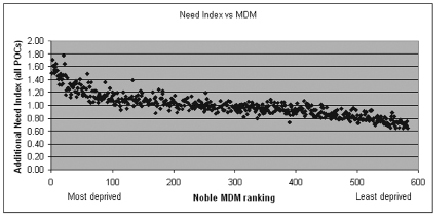
Statement by Minister Ritchie
10 March 2008
10 March 2008 - Time for Neighbourhood Renewal to deliver
The Minister for Social Development, Margaret Ritchie, today announced the next steps in tackling deprivation in Northern Ireland’s 36 most disadvantaged communities.
Under the Neighbourhood Renewal Strategy, the Minister has committed some £60million over the next three years to addressing the very real needs of people living in these communities. This will tackle multiple deprivation in specific areas by focusing on local needs as identified by the communities themselves.
The Minister said: “It is simply unacceptable that the life chances of some people in our society are determined by where they live. People who live in Neighbourhood Renewal areas are more likely to have fewer educational or vocational qualifications. They are less likely to be in work and more likely to get their income from benefits and tax credits. Life expectancy is also more likely to be lower. I am determined to focus funds on actions that will tackle the causes as well as the symptoms.
“Over the last two years, my Department has established Partnerships in each Neighbourhood Renewal area which are representative of the community and include local politicians, as well as statutory bodies working in the area. The Partnerships have put a lot of hard work into producing long-term Action Plans for each area.
“To date, funding for disadvantaged areas has been short term and, at times, piecemeal. It is now my wish to direct resources at the priorities identified by local people in the Action Plans and to make those resources available for a longer period.
“For many hard working community groups and service providers this will offer much welcome financial certainty. For those groups directly delivering on Neighbourhood Renewal priorities, I will be offering three-year service contracts, subject to normal appraisal requirements.
“But this isn’t just about direct funding from my Department. As I have said before, Neighbourhood Renewal requires that all Departments support renewed efforts to improve the delivery of better services in disadvantaged neighbourhoods, including health, education and training.
“My Department will continue to work closely with other Departments to reach agreement on funding for those Neighbourhood Renewal activities which fall under their statutory responsibility. Whilst discussions continue, my Department will continue to resource groups delivering relevant services for up to a year.
“Inevitably, as we focus funding on priority needs, funding for a small number of groups will cease. However, I have agreed to continue to support these groups for a period of up to five months to allow them to make alternative arrangements for their future.
“My overriding objective is to ensure that we concentrate scarce resources where they will have maximum impact on the ground. For a small minority of groups this may be uncomfortable. For the vast majority, however, the approach will be welcomed. For the wider public, it will demonstrate that devolution does make a difference.”
The Minister also indicated plans to move Neighbourhood Renewal closer to local government. Margaret Ritchie said: “It is my intention to transfer responsibility for Neighbourhood Renewal to local Councils as part of the new vision for local government in Northern Ireland. We already work with local government in this area. I want to build on that relationship and to use partnering arrangements on particular projects to test the feasibility of transferring some functions in advance of the new Councils being established.”
Correspondence from DSD
20 March 2008
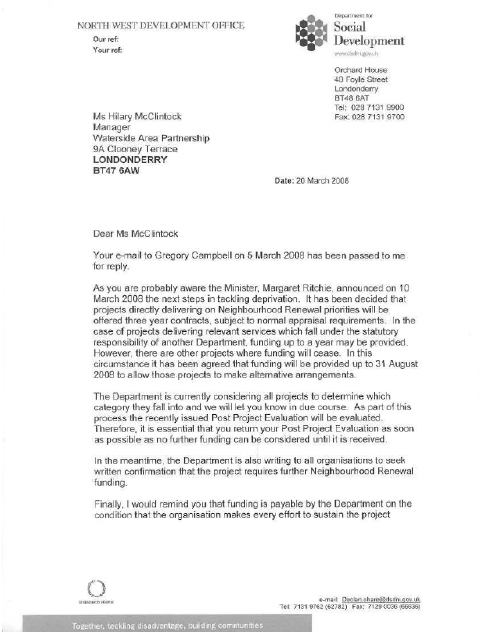

Correspondence from DSD
26 March 2008
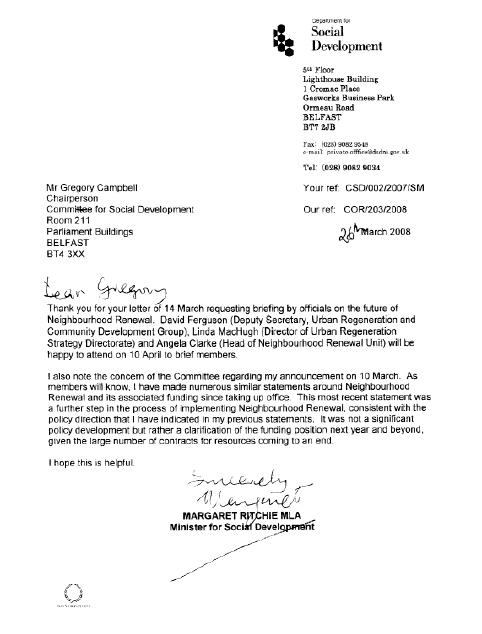
Correspondence from DSD
7 April 2008

From: Angela Clarke
Head of Neighbourhood Renewal Unit
Date: 7 April 2008
To: Marie Austin
Clerk Social Development Committee
Neighbourhood Renewal:
Brief for The Social Development Committee Meeting - 10 April 2008.
Officials are attending the Social Development Committee meeting on 10 April to brief the Committee on Minister Ritchie’s statement of 10 March 2008 in which she outlined the next stage in the Neighbourhood Renewal process.
A summary of the main points which officials will be covering at this meeting is attached as requested.
Angela Clarke
Ext. 38434
cc: David Ferguson
Linda MacHugh
John Ball
Neighbourhood Renewal – The Way Forward
- On 10 March, Minister Ritchie announced the next steps in implementing Neighbourhood Renewal, the strategy to tackle deprivation in Northern Ireland’s 36 most disadvantaged communities.
- This announcement committed £60 million over the next three years for Neighbourhood Renewal.
- The Minister’s decision builds upon earlier statements and signals the start of the next stage in the implementation of the strategy. The Minister’s overriding aim continues to be focussed on addressing the very real needs of people in the Neighbourhood Renewal areas by directing limited funds towards actions that tackle the causes as well as the symptoms of deprivation.
- This will allow a move to longer term funding for those community groups whose activities are effectively delivering on the priorities identified in Action Plans, subject to the normal appraisal arrangements.
- Community groups who provide services which contribute to Action Plans priorities but which are the core responsibility of other statutory bodies may continue to receive support up to a further year. This will allow DSD officials to work closely with colleagues in other Departments to reach agreement on how these activities can be taken forward.
- Limited resources are available and the Department must concentrate funds on those groups capable of making the greatest contribution to make the maximum impact on the ground. Inevitably this will mean funding for a small number of groups will cease.
- To alleviate the impact of this, support for these groups will continue until August 2008.
- Steps are being taken to ensure that the Minister’s decisions on the next stage for Neighbourhood Renewal are effectively communicated to all the groups concerned.
- DSD officials are also working closely with Neighbourhood Partnerships and other Government Departments on implementation.
- The announcement also indicated Minister’s intention to move Neighbourhood Renewal closer to local Government.
- It is planned that responsibility for the delivery of Neighbourhood Renewal, along with other urban regeneration and community development activity, will move to Councils as part of the Review of Public Administration in 2011. This is in keeping with the cross-party support for strong local government and fits well with the concept of Community Planning.
- Local Councils already work very closely with the Department in the delivery of Neighbourhood Renewal. The Minister’s announcement paves the way to enable the Department to explore how the already established Partnership working with Councils can be strengthened through pilot projects in the run up to the full transfer of functions.
Correspondence from DSD
10 April 2008

From: Angela Clarke
Neighbourhood Renewal Unit
To: Marie Austin
Clerk to the Social Development Committee
Date: 10 April 2008
Social Development Committee – request for Neighbourhood Renewal information.
The Social Development Committee has requested an update on the information provided by Departments on how they determine budgets to take account of socio-economic need. This information was provided to the Committee in August 2007. Updates provided by Departments are attached as annex 1. This information was requested by 10 April and I apologise for the delay in forwarding this.
As previously, an update is not provided by DOE, DARD, and DFP as their services are generic across all areas, not applicable to urban areas or are not service providers (DFP).
Angela Clarke
Annex 1
Departmental Updates
1. Northern Ireland Office
For the period 2008-11, our allocations to Community Safety Partnerships are based on a formula which is weighted according to four factors;
Basic Standard Amount: 25%
Population: 25%
Deprivation (Noble): 10%
Crime: 40%
The amount of money available in each year is £2.0m, £2.0m and £2.175m.
Additionally, NIO cover basic salary and administrative costs for 28 community safety co-ordinators which amounts to £3.45m over the 3 years.
2. Invest NI (Please note update to information provided in August highlighted in red)
2.1 Invest NI’s strategic approach contributes to strengthening the Northern Ireland economy through assisting companies in manufacturing and tradeable services to compete by improving their productivity, increasing value-added, new product development and by developing new markets, leading to greater wealth creation and better employment opportunities for all.
2.2 A core element of this approach is Invest NI’s work to attract new Foreign Direct Investment (FDI) to locate in Northern Ireland, for which it has established a target of 75% of all first-time FDI projects to NI locating in nTSN areas. This aims to maximise the contribution this form of investment can make within areas of acknowledged social disadvantage.
2.3 Over the five years, 2002/03 – 2006/07, 74% of the 69 first time FDI projects located within nTSN areas, against this 75% target. In the most recent year, 2006/07, 13 of the 17 first time FDI projects secured (76%) were located in nTSN areas. However, almost 78% of assistance offered by Invest NI towards first time inward investment, equating to around £84 million, relates to projects locating in nTSN areas. 2007/08 Figures are still to be finalised but early indications suggest that we are well on course to exceed the 75% target of first time inward investment within nTSN areas.
2.4. In addition, averaged over the five year period, 50% of all Invest NI assistance offered was directed towards businesses in nTSN areas, with this percentage rising to 58% in 2006/07. Provisional figures up to the end of Feb 08 indicate that 53% of Invest NI assistance offered was directed towards businesses in nTSN areas. Final figures for 2007/08 will be available at the end of May 08.
2.5. Invest NI is actively involved in supporting economic renewal within the identified Neighbourhood Renewal areas. This includes providing assistance and advice to businesses through the Start a Business Programme; Social Entrepreneurship Programme, Export Start scheme and Growth schemes for existing client businesses. Invest NI support has resulted in the development of a number of workspace units, social economy and regeneration projects. The regional office network is represented in a number of local strategic partnerships to ensure that enterprise support is coordinated at local level.
2.6. Invest NI is also working with Neighbourhood Renewal Partnerships who have been engaging key stakeholders in the development of local level action plans and enterprise is a theme emerging in all plans. Invest NI is ensuring that the Neighbourhood Renewal Partnerships have access to appropriate advice to support enterprise development in their areas and has brokered in a number of third sector partner organisations to work alongside partnerships including Enterprise Northern Ireland, representing the local enterprise agencies (LEA’s) throughout Northern Ireland. The branding of LEA’s as Go for It business advice centres under the Points of Presence initiative will also enhance their accessibility in neighbourhood renewal areas.
2.7. It should also be noted that in Renewing Communities areas (North, South, East Belfast, Shankill and Rathcoole) a number of initiatives have commenced that make a contribution to Neighbourhood Renewal action plans, particularly in relation to youth entrepreneurship, social entrepreneurship and general enterprise awareness work.
Specific Invest NI ‘Renewing Communities’ Initiatives
2.8. A budget of £1.69m has been allocated and the following projects have commenced:
2.8.1 Extension of Young Enterprise Northern Ireland (YENI) activity in all primary and post primary schools in North Belfast/Shankill
This programme will support the roll out of a range of programmes and initiatives that promote and improve young peoples’ life prospects. YENI’s programmes are based around some of the following key principles:
- A principal focus on children age 4-18 years from identified areas of disadvantage as per the Noble Indicators.
- Delivery of a number of programmes in partnership with local businesses providing role models to local school children
- A focus on practical learning leading to an enterprising spirit, and a change in behaviours, attitudes, self-esteem and confidence.
Over this period, a total of 4,255 achievers will participate on various programmes.
Funding: £200,000
2.8.2 Enterprise Challenge for marginalised pupils in alternative education
The “New Start” programme will be delivered by YENI with the aim of encouraging disengaged and marginalised young people to consider returning to education and developing an interest in enterprise. This is a 12 month programme delivered to 120 14-16 year olds with modules concentrating on:
- personal development
- motivation and confidence building
- exploration of possible careers
- education and training
- strategic focus on the concepts and benefits of team participation and leadership
- work placements and interview techniques
Two one-off enterprise awareness events will also take place for 11-14 year olds in alternative education with the aim of introducing young people to the idea of enterprise as early as possible.
Funding: £249,500
2.8.3 Exploring Enterprise
This is a comprehensive package of pre-start support and advice aimed at encouraging people to progress through the ‘think’ ‘do’ and ‘achieve’ stages leading to a greater awareness of and participation in enterprise.
There are two dimensions to this programme:
(i) General Exploring Enterprise Programme, offering individuals an opportunity to explore the concept of starting a business. Modules include: Introduction to enterprise, what is an entrepreneur, ideas generation + mentoring. This is delivered by the Local Enterprise Agency Network in partnership with the DSD sponsored Partnership Board throughout the five areas.
(ii) A more targeted range of programmes for specific under-represented groups in the community delivered by a number of enterprise partner organisations.
2.8.4 Over 50s - PRIME
PRIME which has been active in England and Wales is the only national organisation promoting and supporting self-employment and enterprise amongst individuals over 50 within the UK. PRIME has commenced a 2 year pilot programme in Northern Ireland to deliver Enterprise Awareness and Personal Mentoring programmes under the Renewing Communities Action Plan, specifically to people aged over 50 who don’t consider enterprise as one of their options and who fail to engage with mainstream provision. The primary driver for the project is the low rate of enterprise and entrepreneurship exhibited in Northern Ireland, particularly amongst older people and within the Renewing Community areas.
Funding: £249,978
2.8.5 Young People Aged 16-30 - Advantage NI Enterprise Bootcamp
Advantage NI (formally Shell LiveWire) are delivering an Enterprise Boot Camp programme which aims to promote enterprise among young people in the designated Renewing Community areas and spread the message that ‘starting a business is a viable and realistic career option.’ The programme will operate in three unique and distinct phases:
1. Outreach activity – 100 young people attending Impact Days
2. Leading to 4 Business Development Workshops
3. Leading to an intensive Enterprise Boot Camp in Canada for 12 participants
Funding: £151,420
2.8.6 Women – East Belfast Enterprise Agency
The objectives of this pilot programme are to make women aware of the opportunities that entrepreneurship can provide and to develop their interest in enterprise. The enterprise awareness programme will work alongside existing community initiatives or where this is not possible, ‘stand-alone’ enterprise awareness sessions will be delivered and implemented in partnership with existing women’s groups. This programme will be delivered by East Belfast Enterprise Agency.
2.9. Social Economy Awareness Programme
The Programme objectives will be to strengthen community leadership, raise awareness of the social economy in the identified Renewing Communities areas and provide groups with a clear progression path to both Invest NI’s own Social Entrepreneurship Programme and other available means of support. The Programme aims to extend inclusion and build capacity within communities that have not engaged to date in mainstream economic development activity. The programme will encourage more local community groups to think seriously about social entrepreneurship, and in doing so, will therefore contribute to Invest NI’s corporate objective of “being entrepreneurial.” This will be delivered by the Work West Enterprise Agency.
2.10. The Social Economy Fund (SEF)
This was one of 17 projects included in the West Belfast and Greater Shankill (WBGS) bid to the Integrated Development Fund (IDF) in 2004. OFMDFM allocated, in principle, £1m of IDF funding to the SEF, subject to further development of the initial concept and a positive economic appraisal outcome. It has been established that the SEF will operate most effectively as an additional resource for WBGS although ‘anchored’ to Invest NI’s Social Entrepreneurship Programme (SEP) (the mainstream provision for start-up support for social economy enterprises). The SEF pilot programme seeks to provide employment opportunities to a minimum of 25 long term unemployed through employment placement (for up to two years) in social enterprises supported within Invest NI’s Social Entrepreneurship Programme. The Social Economy Fund is specifically aimed at supporting the creation of social enterprises which would provide substantial sustainable employment opportunities for traditionally hard to reach groups.
2.11. Non National/Ethnic Minorities
Programmes in this area currently await development.
3. Department for Regional Development
Roads Service
With regard to Road Service, no other resources, in addition to its mainstream responsibilities, were allocated to Neighbourhood Renewal Areas (NRAs) in 2006. In 2007/08 Roads Service will contribute £30,000 to a scheme in Coalisland NRA and £40,000 to a NRA scheme in O’Kane Park, Omagh.
These works, being carried out this year in Coalisland and Omagh, resulted from approaches made by DSD proposing schemes not previously planned by Roads Service. They were advanced on the basis that DSD provided approximately 50% of the estimated costs. Footways and some Street Lighting are being upgraded.
4. Office of the First Minister/deputy First Minister
The overall context for the information provided previously currently remains unchanged. We are currently working with Advisers on the detail of a Programme for Cohesion, Sharing & Integration which will set a new strategic direction for good relations (including Race relations) policy for the incoming 3 year period. This should see increased funding for this area of work at local level but it is not possible at this stage to quantify this against Neighbourhood Renewal & Noble areas.
5. Department for Education
The Department of Education recognises the relationship between social deprivation and educational outcomes and that enhancing achievement can provide a pathway out of the cycle of deprivation and improve levels of literacy and Numeracy and benefit the economy and society as a whole.
The Department targets funding towards pupils from socially deprived backgrounds and those that underachieve in a variety of ways. For example:
- the Local Management of Schools Common Funding Formula contains two factors to target social need, which use free school meal entitlement and levels of educational achievement to target resources;
- a similar approach is reflected in the budget determination for the Education and Library Boards;
- funding is provided for young people in West Belfast and Greater Shankill (WBGS) (encompassing parts of the Belfast and South Eastern Education and Library Board areas) through the WBGS Taskforce Education Initiative. The Department also provides some additional funding to schools in interface areas in Belfast;
- funding is targeted to provide free school meals to pupils from deprived backgrounds.
In addition, funding for Extended Schools is specifically targeted using Noble indicators and provides additional facilities such as breakfast and after school clubs for pupils from deprived areas.
As far as the Youth Service is concerned, organisations from all sections of the community are registered if they fulfil the general registration criteria. In recent years there has been a move towards allocating resources to target socio-economic need by focusing on marginalised and excluded young people, while at the same time still maintaining a general service throughout the sector.
6. Department for Employment & Learning
6.1 Preparation for Work Division (PfW)
- The majority of employment and training provision for which PfW has responsibility is available across NI ie provision is available to all eligible clients, regardless of where they live. Clients are almost exclusively either unemployed or economically inactive and number among the most disadvantaged in our society. Specific provision is also available for people with disabilities. PfW is thus targeting disadvantage through its main programmes and provision.
- PfW has also developed provision which targets those areas of highest unemployment within NI – Belfast, Derry and Strabane. A new programme, ‘Local Employment Intermediary Service’ began on 2 April in these areas. The programme, delivered by and in the communities, aims to outreach to those with significant barriers to work and assist them to move towards and into work. The programme operates alongside, and is complementary to, our existing programmes.
- In considering approaches to tackling economic inactivity and specifically the high level of incapacity benefit claimants in NI, ‘Pathways to Work’ was piloted in a number of areas which included Neighbourhood Renewal Areas. Preliminary results show that the programme is being successful in assisting IB claimants to move towards and into work. As a result of this, an in preparation for the introduction of the Employment and Support Allowance, resources were secured in the Comprehensive Spending Review to enable Pathways to Work to be rolled out across NI by the end of April 2008.
6.2. Further Education Division (FE)
- The main source of funding for the FE Sector is the FE Recurrent Grant, which is distributed each year using an agreed funding formula, and which incorporates a socio-economic (disadvantage) weighting.
- A new funding formula to distribute the FE Recurrent Grant was used for the first time in the current (2007/08) Academic Year. This new funding formula, which will be used in future years, is part of the implementation of “FE Means Business”, the Further Education strategy for Northern Ireland. As part of the development of the new formula, an extensive analysis of the data underpinning the socio-economic dimension of student enrolments was undertaken. This included previous enrolments by super output areas (SoAs), by deprivation as detailed in the 2005 Noble Indicators, and by correlation of the SoAs to the six new area based colleges. This analysis concluded that, in the new formula, the socio-economic (disadvantage) weighting should be applied at a college level. This recommendation was based upon an empirical analysis of the percentage of students in each college’s catchment area identified as originating from the SoAs.
- Through the funding formula, the Department will continue to provide weighted funding to colleges to reflect the extent of deprivation in the areas they serve, as identified by the Noble Indicators of deprivation. For 2007/08 academic, year approximately £1.2 million has been included in college allocations for this purpose.”
- In addition to the main funding formula, there is also an “ear marked fund” - Support Funds (Discretionary) - which is available to provide help for students who have financial difficulties, which would prevent them from entering or continuing a course of study. For 2007/08 the allocation under Support Funds was £2.5 million.
- In addition, the incorporation of the Essential Skills budget within the new funding formula, from the 2007/08 Academic Year, further reinforces the Department’s commitment to addressing socio-economic need. For the first time, all Essential Skills enrolments within the colleges will receive the appropriate socio-economic weighting pertaining to the college.
6.3. Skills and Industry Division
- Training for Success (TfS), the Department’s professional and technical training provision, is available to all eligible clients regardless of where they live. The provision’s Job-Ready strand includes participants amongst the most disadvantaged in society, often school leavers with numerous barriers to employment and behavioural problems. The Department also funds specialist support provision for participants with disabilities. Skills and Industry Division is therefore targeting disadvantage through its TfS provision.
7. Department for Health, Social Services and Public Safety
The Regional Capitation Formula – Method for Targeting Resources Utilised by the Department of Health, Social Services and Public Safety.
The Regional Capitation Formula attempts to match resources to the need for health and social care by taking into account the age/gender profile of populations and the socio economic conditions prevailing in that area. Analysis is carried out at a small area level because variations can be hidden at commissioner level which are made up of both affluent and deprived areas
At a small area level £402m is redistributed overall due to the formula with £345m of this relating to age-gender and £357m due to additional need (largely deprivation related).
Age-gender weightings take into account the costs of providing services to differing population mix in small areas. Some areas will have predominantly young populations and therefore not require as much funds to meet their health needs. In contrast, areas with high levels of elderly populations will have a far greater need for resources as the cost of care rises significantly for those aged 65+.
The “additional needs” weightings are also developed at a small area level and are produced using a number of socio economic indicators such as social security benefit statistics. More money is distributed due to the additional need element alone because lifestyle and environment in more deprived areas is found to directly impact upon health needs.
However in many areas the redistributions work in opposing directions with, for example, deprived areas with younger populations needing relatively less resources because of age factors but relatively more resources due to living conditions. As such the overall redistributive effect of age/gender and additional needs combined is less than the sum of the separate age/gender and additional needs effects.
As highlighted previously the formula measures need for resources at a small area level and is therefore flexible to cater for any organisational changes that occur from the Review of Public Administration.
8. Department of Culture Arts and Leisure
The information below sets out how DCAL Branches determine budgets to take account of socio-economic need and this includes reference to Arts which previously was not included. Please also note that DCAL has taken over the activities of the former NIEC from 1 April 2008 until its anticipated transfer to the Northern Ireland Tourist Board (DETI) which is scheduled for 1 April 2009. In the interim DCAL has launched a grant funding programme and will administer this programme in line with the same evaluation criterion as previously employed by the NIEC.
Libraries allocate resources to the Education and Library Boards based on the funding formula outlined in the ‘Northern Ireland Libraries: A Framework for Change’. The formula includes a Targeting Social Need (TSN) adjustment of 10% in recognition of the additional costs involved in outreach work to socially deprived or rural communities. (no change)
Sport NI operates scoring matrices when allocating funds to grant recipients under the community sport programmes. The scoring matrix takes into consideration the Noble Multiple Deprivation Index and targets those in the top 25%. It also takes into consideration the 40 most disadvantaged communities under Creating Common Ground. Projects scoring highly will be allocated funds up to the budget available from DCAL/DCMS. (Sport no change).
Events: DCAL has launched a grant funding programme administered through DCAL Events Unit. Although the Unit does not use any established social economic data when determining budgets it does strive to deliver a positive impact on social cohesion within Northern Ireland through its grant funding programme including Events Growth Fund and the Major Events Fund.
For example, the benefits associated with hosting major events are spread throughout Northern Ireland. If an event is delivering benefits within a deprived area it will be favourably looked upon during the assessment process but would not be an essential criteria.
The Community Festivals Fund was administered by NIEC on behalf of DCAL, but the delivery of this has been transferred to local councils with effect from 1 April 2008. The budget allocation for each local council was determined on the basis of population distribution, with a 10% weighting applied for deprivation as measured by the Noble Multiple Deprivation Measure. While local councils will be able to develop their own criteria, there are a number of broad assessment criteria that must be demonstrated such as promoting social inclusion, improving community relations, contributing to community regeneration and attracting visitors to the area.
Arts: The Department’s funding for the arts is disbursed through the Arts Council of Northern Ireland. The Arts Council is committed to ensuring that policies are targeted on areas, groups and people in greatest need.
Applicants who can demonstrate that they deliver a significant proportion of their services within, or draw their audiences/readership/ participants from, the top 10% of the areas identified within the multiple deprivation index, will receive additional marks under the scoring system for the Arts Council’s Annual Support for Organisations Programme.
Inland Waterways and Inland Fisheries has completed administering a Water Based Tourism Measure under the EU Programme for Peace and Reconciliation. A total of 62 province wide projects were funded involving grant aid of 4.64m. Targeting Social Need was one of the eligibility criteria to be addressed by applicants but DCAL’s database does not detail specific projects within the Noble area parameters.
Correspondence from DSD
28 April 2008
![]()
Marie Austin
Clerk to the Social Development Committee
Room 412
Parliament Buildings
Belfast
BT4 3XX
Your Ref: CSD/002/2007/MA 28 April 2008
Dear Marie
Neighbourhood Renewal Funding
Your recent request for information refers. The Committee has asked for an update on the position regarding Neighbourhood Partnerships where funding ended on 31 March 2008.
Minister Ritchie’s recent decision on the way forward for Neighbourhood Renewal, post March 2008, determined that those services, identified by Development Offices, as delivering on the priorities identified in Action Plans, should attract longer term funding through to March 2011.
The work of Neighbourhood Partnerships is important to the effective delivery of Action Plan priorities and to the continued implementation of Neighbourhood Renewal. The level of financial support will vary from Partnership to Partnership depending on need and local circumstances and will of course be subject to the appropriate appraisal process.
Following the Minister’s decision, work is underway to ensure that where necessary, new contracts to provide Neighbourhood Partnerships with the support they need are put in place as quickly as possible.
Angela Clarke
Head of Neighbourhood Renewal Unit
c.c. John Ball
Correspondence from DSD
30 April 2008
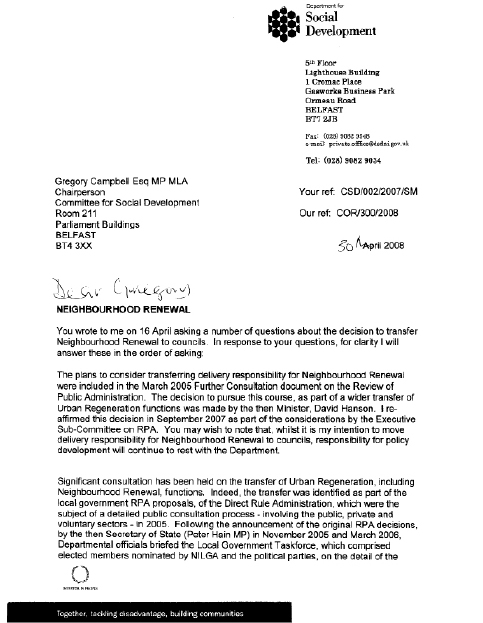
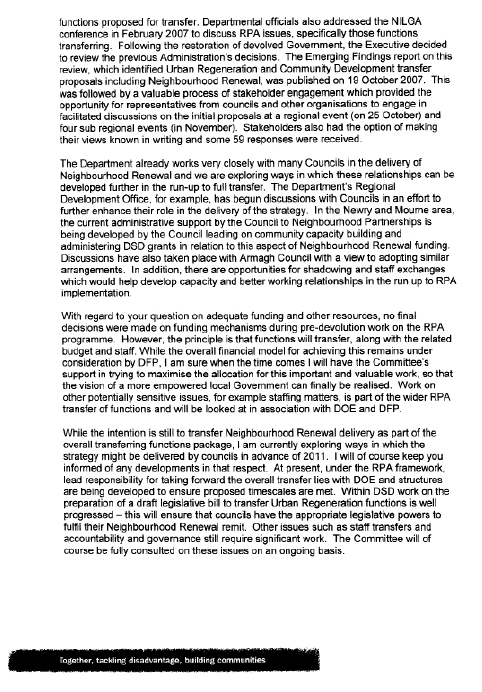

Correspondence from DSD
22 June 2008
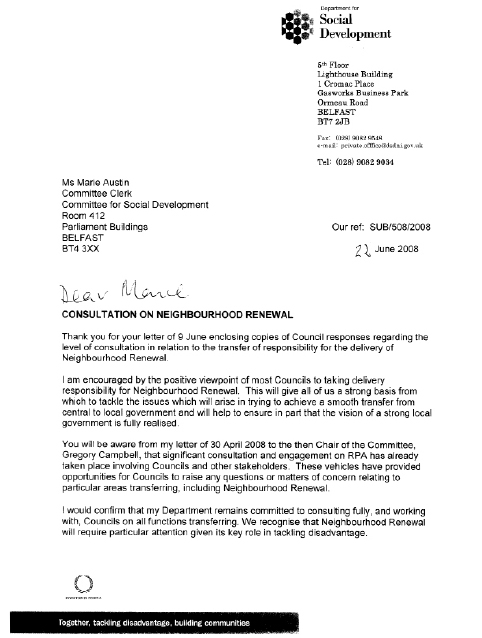
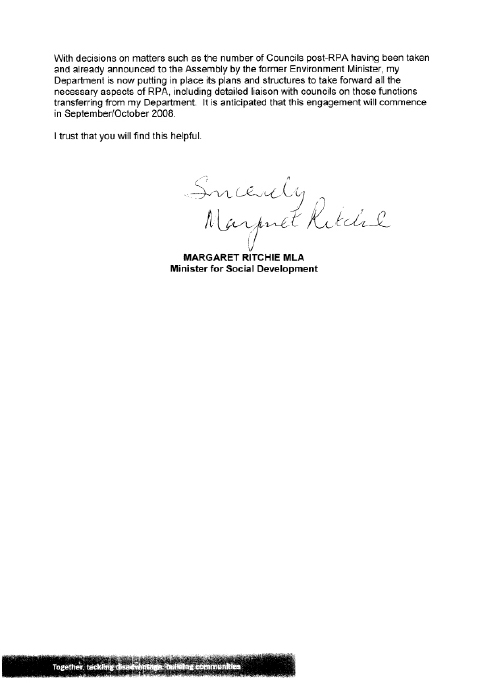
Correspondence from DSD to DENI, DHSSPS and DEL 3 July 2008


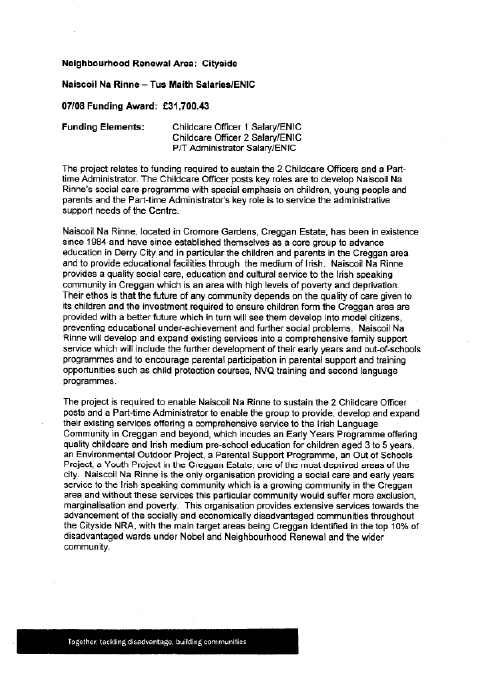
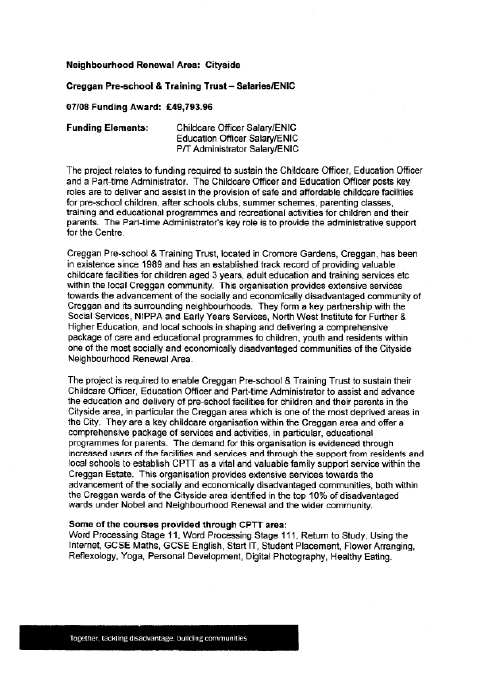
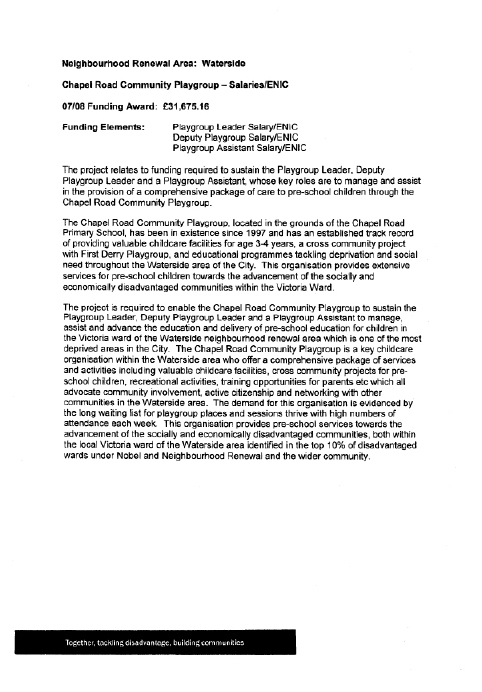
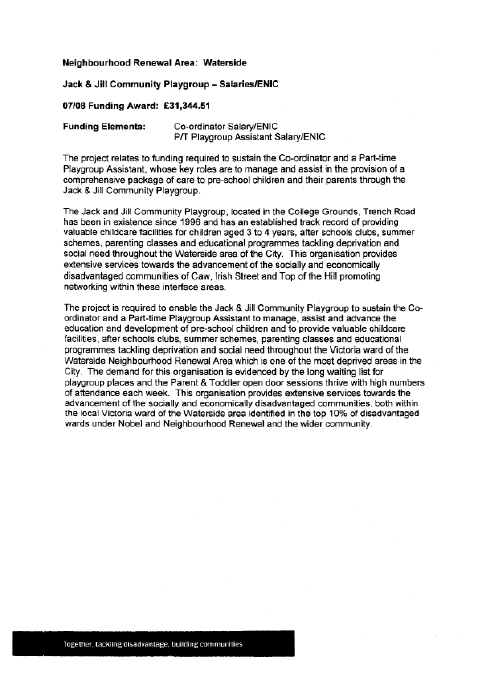
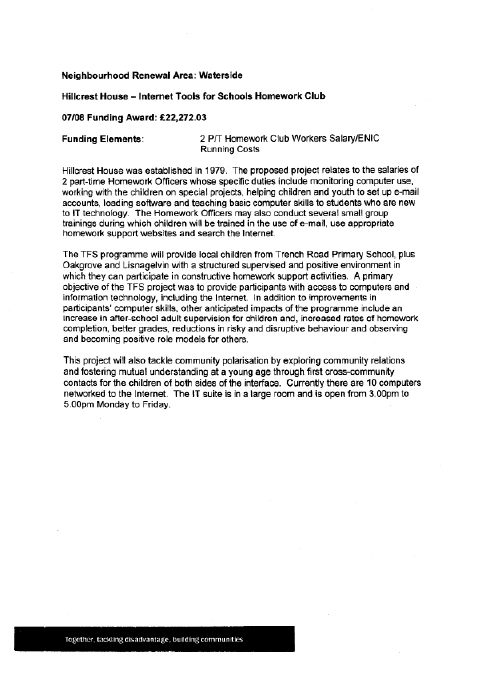
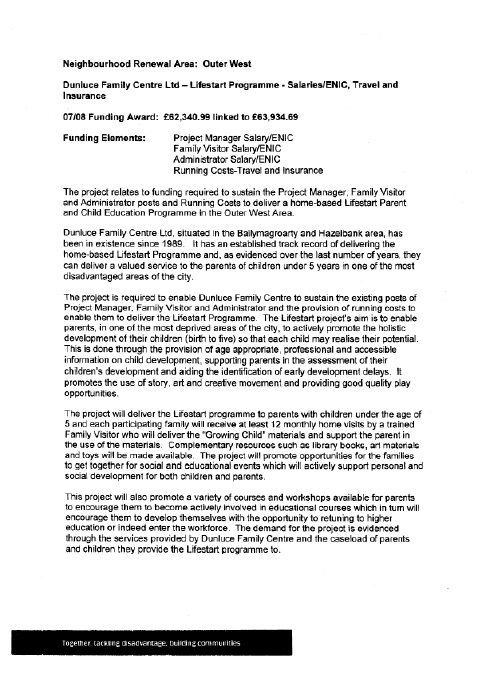


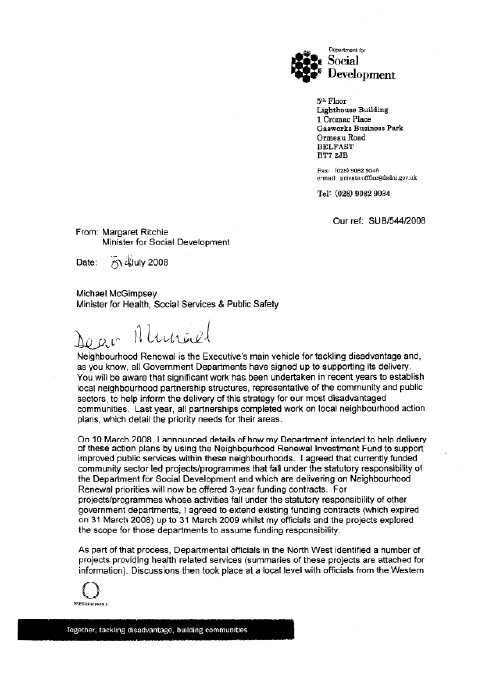

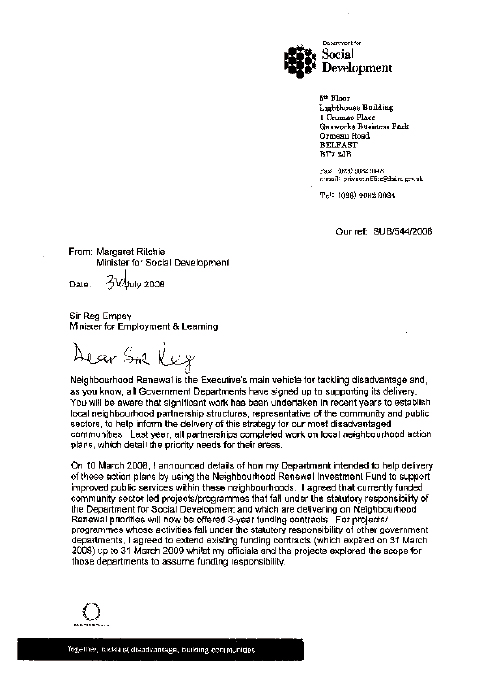

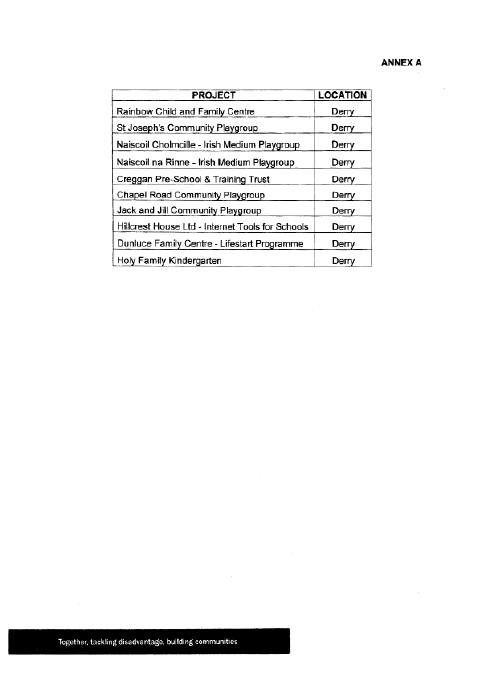
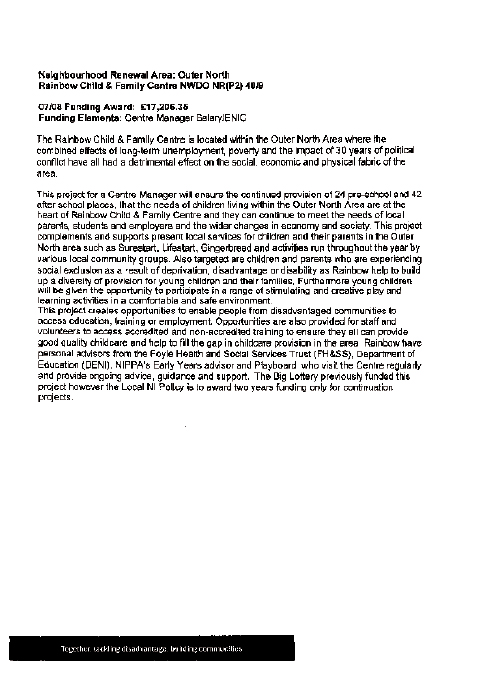

Correspondence from DSD to
Andersonstown Traditional and Contemporary Music School
10 July 2008
![]()
|
Ms Olive Benson |
Belfast Regeneration Office |
10 July 2008
Dear Olive
Neighbourhood Renewal Funding
Name of Organisation: Andersonstown Traditional and Contemporary Music School
Name of Project: - Salary - Class Coordinator/Administrator
As you are aware, the Minister for Social Development, Margaret Ritchie, issued a statement on 10 March 2008 outlining her plans for implementation of the Neighbourhood Renewal Strategy over the next three years.
Further to the Minister’s announcement, you were recently informed of the outcome of the analysis of your project. A summary of that analysis is detailed in the table below.
|
Description |
Category (1 or 2) |
Period of consideration |
|---|---|---|
|
Class Coordinator/ Administrator |
2 |
01/09/08 – 31/03/09 |
In order to begin the appraisal process, you are required to complete a Support for Implementation of Neighbourhood Action Plans form (copy attached) for the elements detailed above. The form should be returned to this office (address above) as soon as possible but no later than 4th August 2008.
An electronic copy of the form will also be sent to the following e-mail addresses: admin@atcms.freeserve.co.uk . If you wish to complete the form electronically, please ensure that you forward a signed hard copy of the form to this office as soon as possible but no later than 4th August 2008.
Should you require assistance to complete the form, please contact Brenda Richards or Carl Von Ohsen on 028 90 244535
Yours sincerely
Martin McDermott
Deputy Director



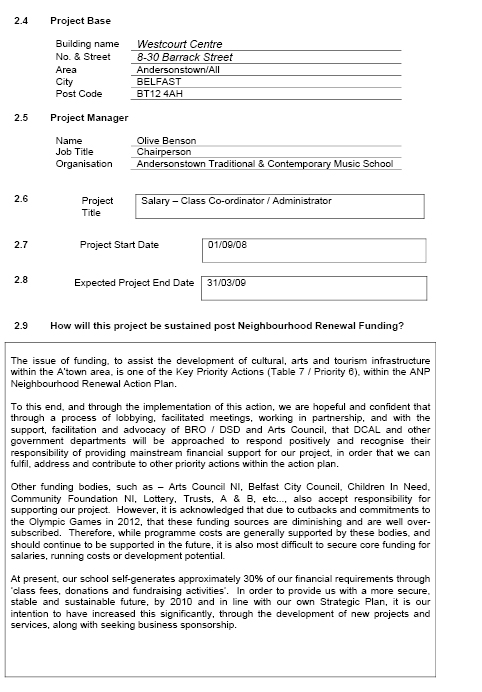

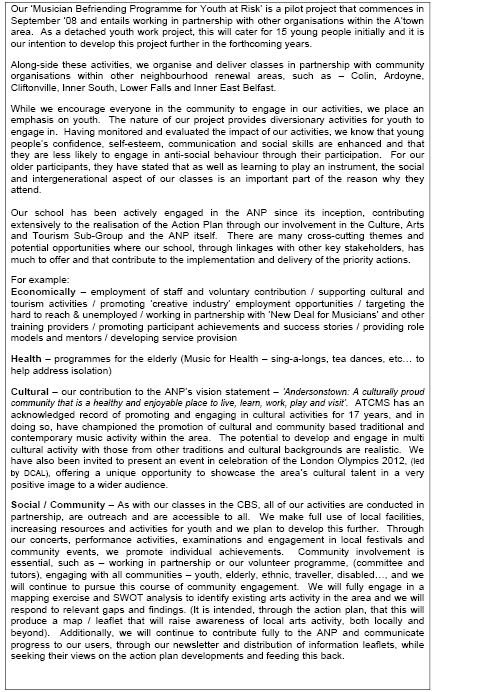
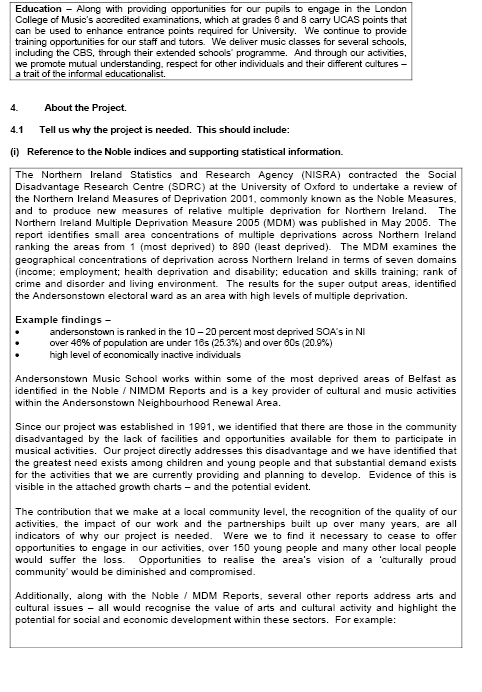

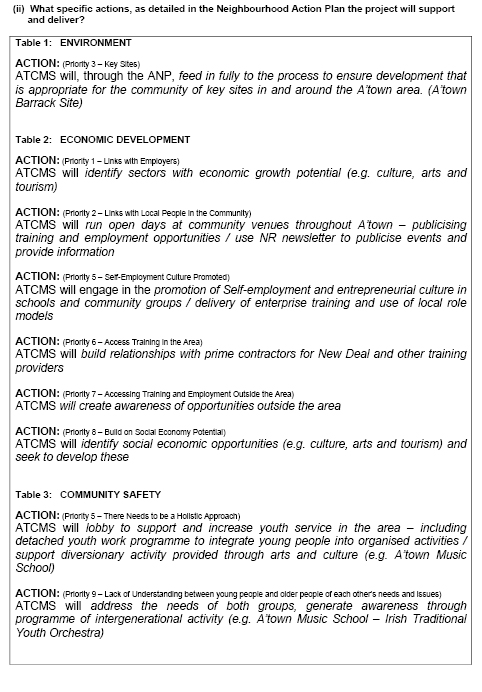
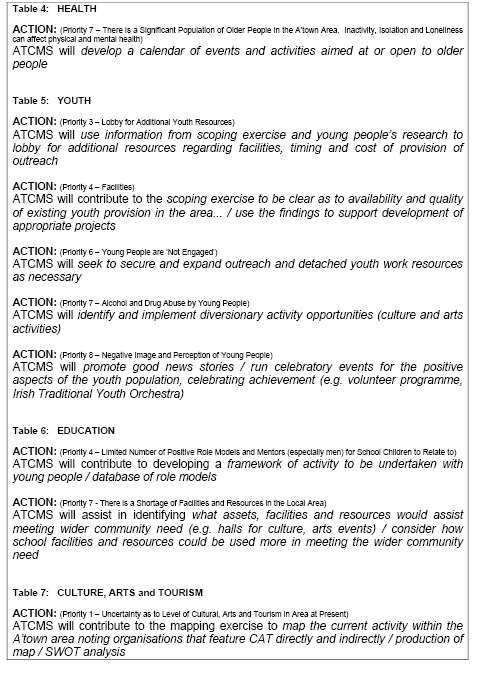

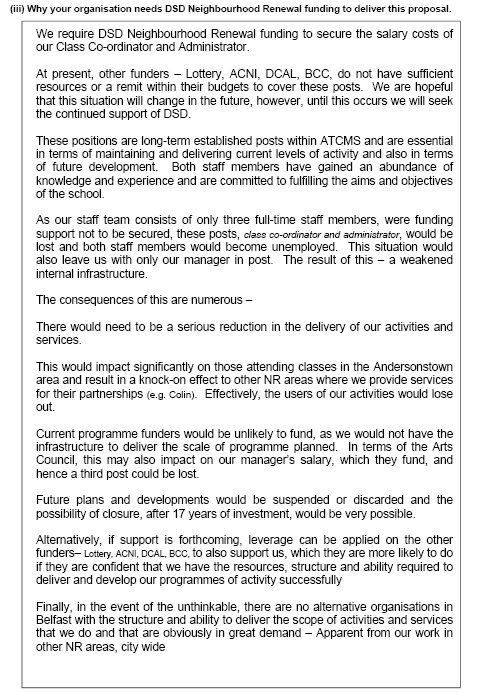
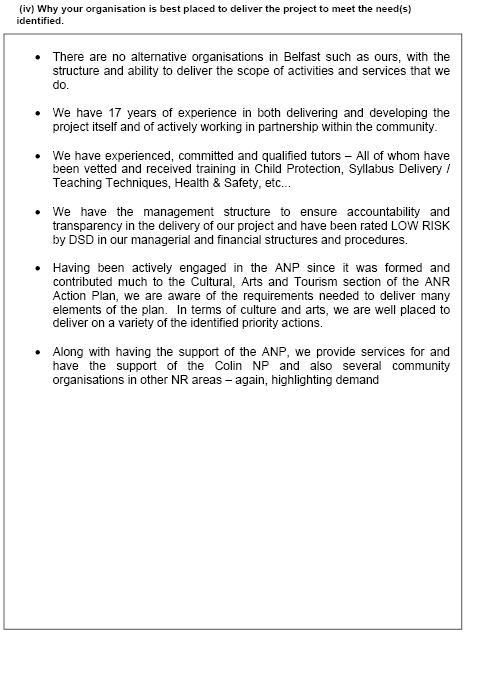

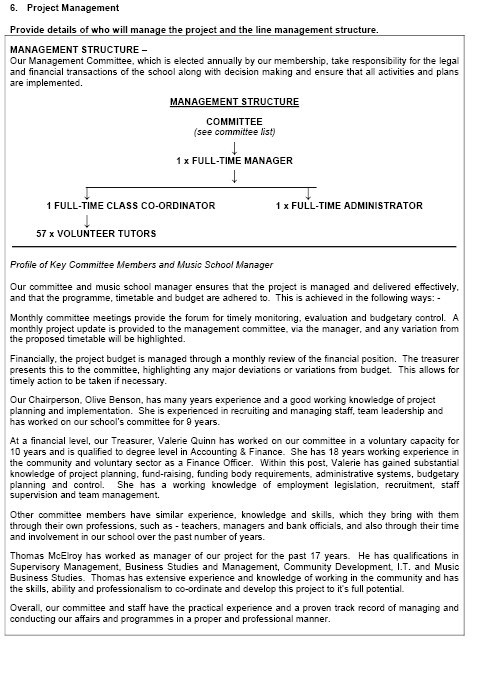


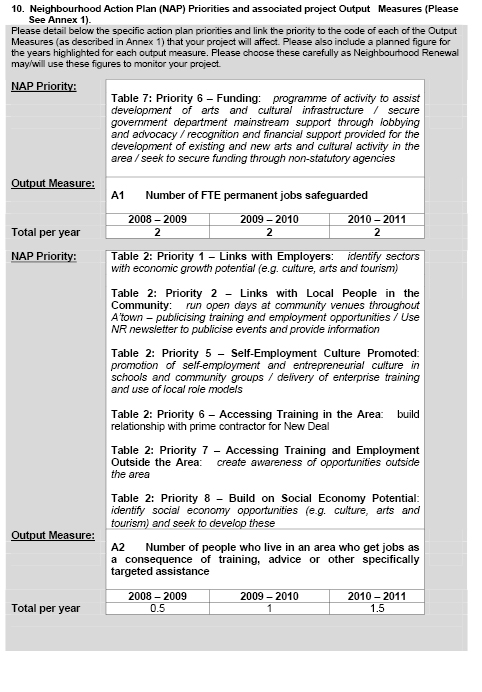
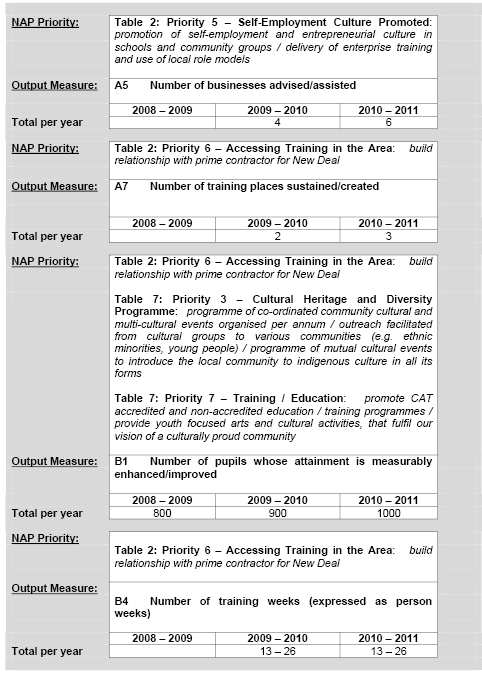
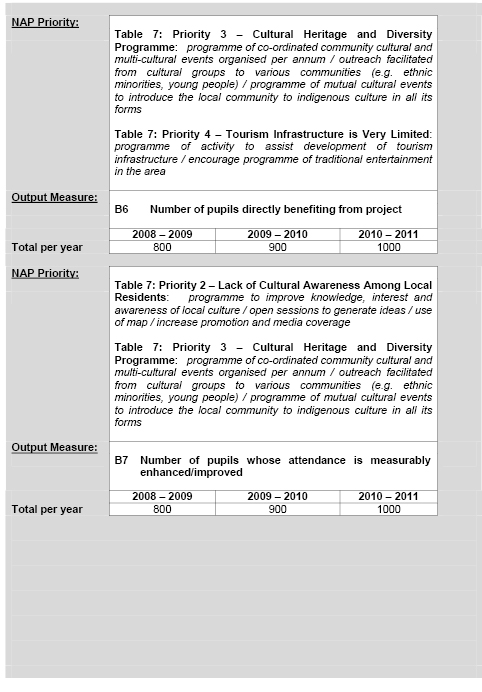
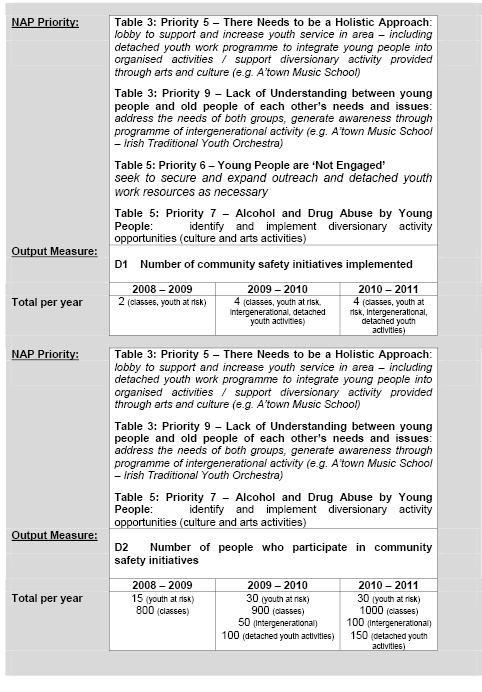
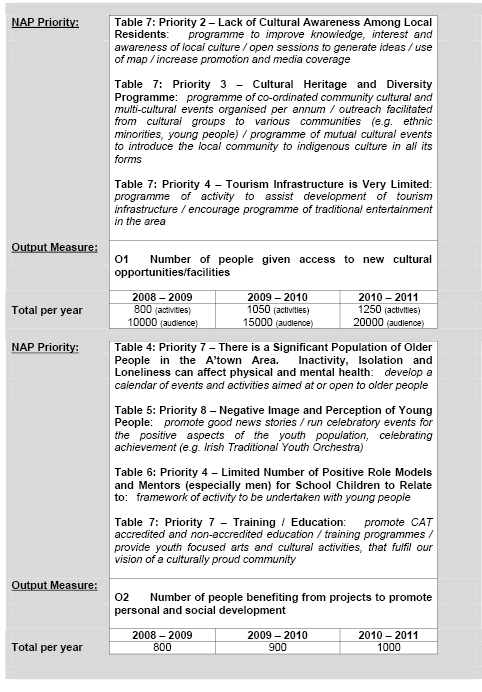
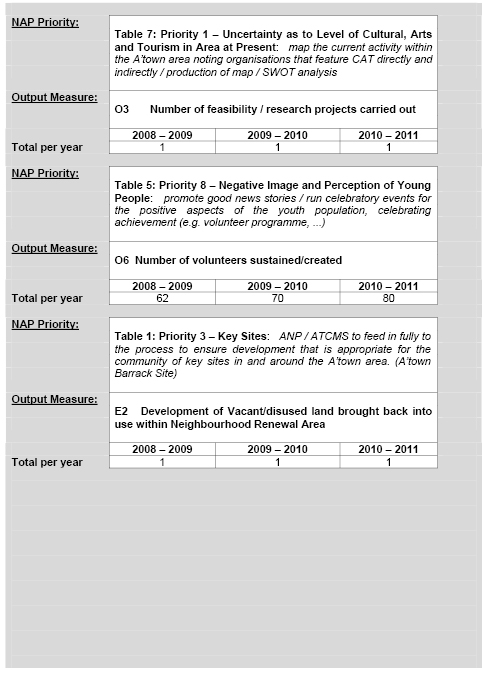
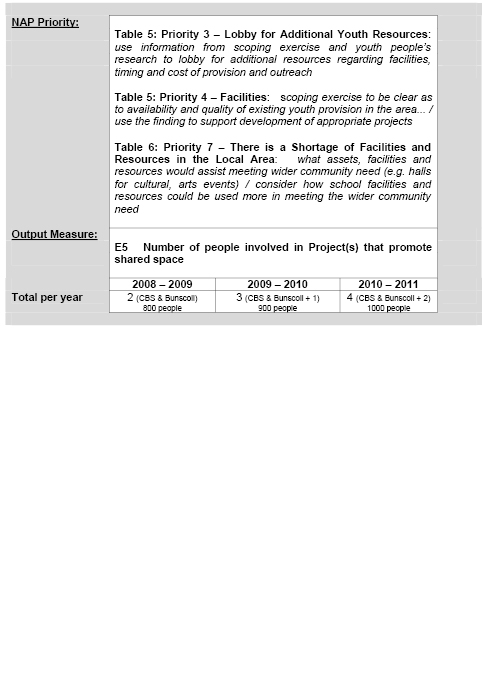
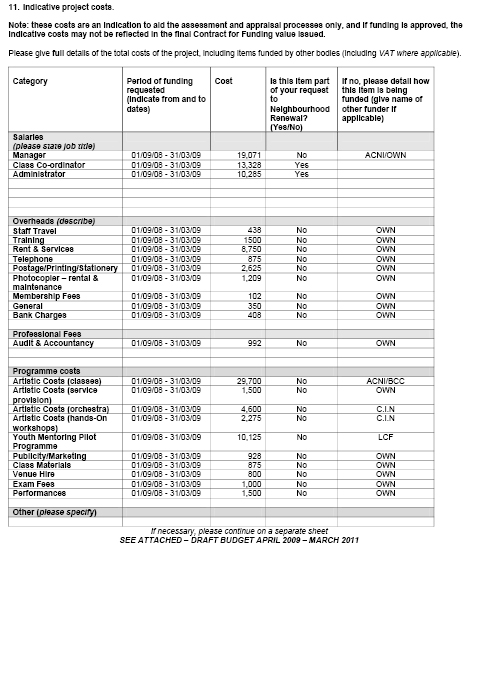
Correspondence from DEL to DSD
26 July 2008
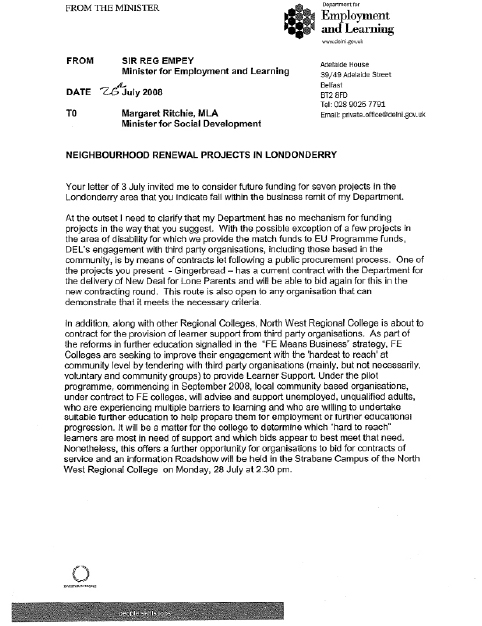

Correspondence from DHSSPS to DSD
6 August 2008
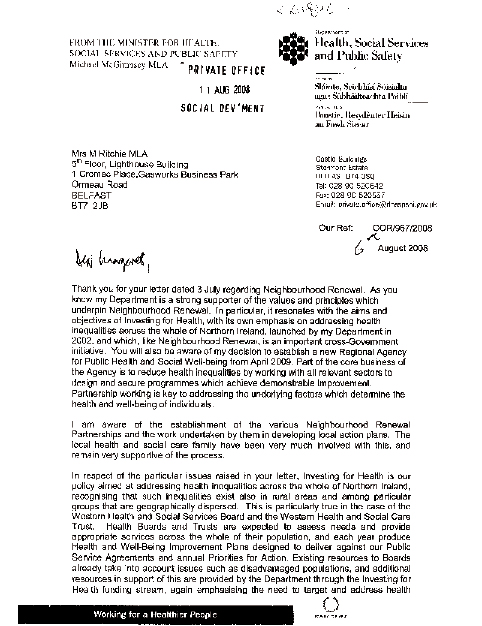

Correspondence from DENI to DSD
14 August 2008

Correspondence from DSD
1 September 2008
![]()
From: Linda MacHugh
Urban Regeneration Strategy Directorate
To: Marie Austin
Clerk to the Social Development Committee
Date: 1 September 2008
Social Development Committee – Request for Neighbourhood Renewal Information.
The Social Development Committee has requested further information as a result of the evidence session held on 5 June 2008. Please find response attached.
Linda MacHugh
Phone 028 90 829018
Questions and Suggested Responses
to the Social Development Committee
1. At the meeting officials informed the Committee that the Ministerial-led cross-departmental working group on Neighbourhood Renewal, which is supposed to meet on a quarterly basis, had not met since August 2007. The Committee should be grateful for:
- Details of the number of meetings that have taken place since the establishment of the group; and
- Details of departmental attendance at each meeting (name of each department and the position of the departmental official(s).
The Ministerial Group on Neighbourhood Renewal has met on eleven occasions since the launch of the strategy in June 2003. Details of the attendees at each meeting are held at Annex 1. Representatives from all other Government Departments are members of the Senior Civil Service.
2. Are the minutes of the cross-departmental working group’s meetings disseminated to relevant bodies e.g. the Chairs of Neighbourhood Renewal Partnerships?
The minutes of the Ministerial Group have not been shared with Neighbourhood Partnerships to date. However, at the last meeting of the Group, it was agreed that copies of the minutes of future meetings will be placed on the DSD website.
3. The Committee understands that the role of the cross-departmental working group is to ensure that all parts of government remain committed to the purpose and delivery of Neighbourhood Renewal. How does the group carry out this role? Does the group produce a forward work programme setting out how it intends to carry out this role over a period of time?
The Programme for Government highlights addressing poverty, disadvantage and exclusion as a specific aim requiring co-ordinated action across Government to support the most vulnerable. Members of the Ministerial Group work collectively and individually within Departments to develop policies and services to deliver Neighbourhood Renewal. Members provide leadership to ensure that Neighbourhood Renewal is considered in all appropriate aspects of Departmental business. Members are currently driving the work of Departments and Agencies in ongoing negotiations with DSD to address the priorities identified in action plans.
The work of the Group is determined at each meeting, progressed as necessary and reported upon either in advance of or during the next meeting of the Group.
4. How many times has Neighbourhood Renewal featured as an item on the Executive Committee’s agenda?
Neighbourhood Renewal has not yet been tabled as an item for discussion by the Executive. The Minister has, however, indicated her intention to present a paper to the Executive at the earliest opportunity and has written to Ministerial colleagues who have affirmed their commitment to the strategy.
5. Has the Department issued guidance to other departments / agencies on their roles and responsibilities in relation to the delivery of Neighbourhood Renewal?
Guidance in respect of Neighbourhood Renewal has not been issued to other Departments. It is for individual Departments to determine the most effective route to deliver Neighbourhood Renewal in line with the priorities of that Department. DSD has, however, worked through the Ministerial Group and Departmental officials to advise and influence more effective and better tailored services for communities in the most disadvantaged areas. This has been done at regional, sub-regional and local level.
This work is further enhanced and supported by cross agency working through the North West Programme Group and the Belfast Strategy Group, where representatives of key service providers play an important role in delivering against local priorities.
Targets in relation to closing the gap in Neighbourhood Renewal areas have been agreed in relation to Health, Education, Inward Investment and Work and Worklessness. Targets in relation to Community Safety are nearing completion. In driving to achieve these targets, Departments are working to deliver Neighbourhood Renewal. (Targets agreed are attached for your information at Annex 2).
6. Has the Department issued guidance to other departments/agencies on attendance at Neighbourhood Renewal Partnership meetings? For example, to encourage continuity with regard to the attendance of officials; to encourage attendance of senior officials who have decision making powers?
Guidance has not been issued as it is for each Department and their statutory agencies to determine who is best placed to interact with Neighbourhood Partnerships. Action has however been taken to ensure that statutory representatives at Neighbourhood Partnerships are appropriate. For example, during 2006, the then Minister for Social Development, David Hanson asked Departments to review their nominated representatives to ensure they were appropriate and properly empowered by their nominating authority.
Neighbourhood Renewal is a key component of the work of Ministerial Group members, however members also have responsibility for the delivery of key policy areas within their own Departments and would not be in a position to attend the meetings of 36 Neighbourhood Partnerships.
The North West Programme Group and the Belfast Strategy Group were established as the means to bring together senior officials from Departments and their delivery agencies at a strategic level to consider a co-ordinated response to the local priorities identified in action plans.
7. Did the introduction of the Neighbourhood Renewal Strategy have any effect on the strategic, operational and financial planning processes in the relevant departments and agencies?
Please see Departmental responses provided at Annex 3.
8. The Committee understands that the Department does not have the power to tell other departments/agencies what they must do in relation to Neighbourhood Renewal. However, given that commitment to the Strategy has been agreed at Ministerial level, is there any formal feedback given to Ministers on the performance of their respective departments in this area?
Please see Departmental responses provided at Annex 4.
9. How does the Department encourage, promote, support and demonstrate the benefits of Neighbourhood Renewal to relevant departments and agencies?
Specific targets in relation to Neighbourhood Renewal have been agreed in the Executive’s Programme for Government. Individual targets have also been agreed by Departments in respect of Neighbourhood Renewal and are reflective of the wider targets agreed in the Programme for Government. In delivering against Neighbourhood Renewal targets, Departments are delivering against their Public Service Agreements. DSD has continually emphasised this important perspective at conferences, presentations, individual meetings and through the Ministerial Group; and has taken pains to spell out the win/win situation for Departments in achieving their own targets by delivering improved services to Neighbourhood Renewal areas.
All Departments and their agencies are required to deliver services to address poverty and social exclusion through their own policies. DSD works with officials across Departments to influence the development of policies to ensure that Neighbourhood Renewal is reflected in the delivery of these policies.
Two major conferences have been held which demonstrated how Government and Communities are working together to improve the lives of those living in the most disadvantaged areas. Plans are in place for a further conference in the New Year.
DSD officials have delivered presentations on Neighbourhood Renewal to individual Departments, their delivery agencies and at conferences hosted by other Departments.
10. Does the Department have any plans to develop specific performance indicators to assess the effectiveness of the Strategy? How does the Department assess effectiveness at present?
Baseline information available through Noble and census data sets the strategic framework for monitoring of the strategy. The Department uses this information and information available through ongoing surveys to gather both qualitative and quantitative data. The further review of Noble (results expected early 2010) will enable the Department to monitor progress since the last review of Noble in 2005.
Monitoring of targets agreed across Departments will take place at regional level. As mentioned earlier, the table of agreed targets is attached at Annex 2. Departments will be required to report on progress towards the achievement of these targets.
Monitoring will also take place at neighbourhood level. Neighbourhood Partnerships and DSD Development Offices will report progress in the ongoing implementation and impact of Action Plans in local areas.
11. David Hanson said in December 2006: “Neighbourhood Renewal is unique and different to anything that government has done before. It is a long term commitment and is based on communities working in partnership with the public, private and political representatives to tackle the real causes of poverty. The short term and uncoordinated approach of the past has to change if we are to make the necessary improvements on the ground”. What evidence is there to suggest that the short-term uncoordinated approach of the past has changed?
The Ministers decision of the 10th March set out the next steps in implementing Neighbourhood Renewal and moved the strategy from its short –term ad-hoc project driven nature to longer term (3 year) funding commitments for those groups whose activities are delivering on the priorities identified in Action Plans.
Minister’s announcement also confirmed funding for one year for groups that provide services which contribute to action plan priorities, but which are the core responsibility of other Departments. This is to enable negotiations between DSD and Departments to determine how services can be taken forward in the longer term.
12. Are Action Plans (Agendas for Change) costed?
Action Plans are not costed as Neighbourhood Renewal is resourced primarily through mainstream Government budgets which are already deployed within, and for the benefit of, our most deprived areas.
13. What factors influence the Department’s allocation of funding?
A number of factors influence the Department’s allocation of funding. These include the Department delivering on its responsibilities under the Executive’s Programme for Government and the taking forward of Ministerial priorities for Social Development which are:-
- Investing in housing and addressing the housing crisis;
- Building communities, tackling disadvantage and encouraging social responsibility; and
- Creating vibrant cities, towns and urban areas.
14. How was the £60 million Neighbourhood Renewal Investment Fund allocated? The Committee should be grateful for full details of the funding criteria used together with information on who the money was allocated to and the amounts allocated.
The Neighbourhood Renewal Investment Fund is available across all Neighbourhood Renewal areas. At the beginning of each financial year an indicative budget for each neighbourhood is established on the basis of the population of the area. The indicative budget needs a degree of flexibility to ensure that the fund can be fully deployed in accordance with local needs which varies from area to area and year to year.
The budget is allocated to each Development Office who determine how funding is allocated based on the priorities identified in Action Plans. These are reviewed by the relevant Neighbourhood Partnerships on an annual basis. Normally funding is only granted to those projects recommended for funding by Neighbourhood Partnerships and following full economic appraisal.
The table at Annex 5 sets out the initial budget allocation for the three year Comprehensive Spending Review (CSR) period from 2005/06 – 2007/08 and the initial budget allocation for this financial year - 2008/09 (the first of the new CSR period).
15. At the outset, Neighbourhood Renewal Boards believed that they would have significant influence over how their budget would be allocated. Does the Department consult the relevant Boards when assessing funding applications?
In the event of any new application for funding, DSD would seek the opinion of the Neighbourhood Partnership in assessing if the proposed service addressed a priority within an action plan. Neighbourhood Partnerships are kept advised of the outcome of each application and the action plan amended to reflect the current position.
It would be inappropriate for the Neighbourhood Partnerships to be more involved in this process. Whilst their input is essential to the development of priorities and the implementation of the plan for the area, they could bring undue influence to bear on projects to be funded and this could be viewed by those outside the process as members looking after their own interests.
16. Do you agree that the Partnership Boards’ role is restricted because of a lack of input into expenditure of Neighbourhood Renewal funds?
No - Neighbourhood Partnerships have been involved at all stages of Neighbourhood Renewal development and implementation. They have played a central role in the development of action plans and will play a key role in their implementation. It was never envisioned that Neighbourhood Partnerships would have a role to play in the allocation of funding as the majority of services provided will be funded through mainstream Departmental expenditure.
17. Has the Department seen real evidence of departments/agencies bending the spend to tackle deprivation? The Committee should be grateful for specific examples.
There is evidence of positive cross-departmental initiatives to tackle deprivation. The Western Health and Social Services Board has analysed the six Neighbourhood Action Plans in the North West and identified that the key issues are around alcohol, drugs, smoking cessation and healthy living. To address this, it has developed a healthy lifestyle project which involves community based training. WHSSB is currently considering the cost and its contribution to this project. In Downpatrick, DSD is working with the South Eastern Health and Social Care Trust to develop a Family and Wellbeing programme.
There are strong linkages between Neighbourhood Renewal and Investing for Health which both target deprived areas. DSD is working closely with colleagues across the health family to address health inequalities through IFH.
The Department of Education’s Extended Schools programme specifically targets those schools within, or drawing the majority of pupils from, Neighbourhood Renewal areas. The decision to target schools in this manner is a direct result of Neighbourhood Renewal.
One notable success between Education and Neighbourhood Renewal in Belfast has been the partnership working achieved through the development of the Full Service Community Network centred on Corpus Christ College in West Belfast. Within the North West, there are a number of education projects currently funded by the North West Development Office that the Western Education and Library Board (WELB) is trying to secure mainstream funding for. WELB has already mainstreamed a “Nurture Unit” project. In Craigavon, the Regional Development Office (RDO) is currently working with the Department of Education on a Social Renewal and Education Programme supplementing Extended Schools provision there, whilst in Coleraine RDO, is working with the North Eastern Education and Library Board on a Nurturing Programme.
There is significant co-operation between representatives of the Southern Education and Library Board and the Southern Regional College and a number of programmes are being delivered in the Northern Board area.
The Department for Employment and Learning intends to fund community based provision through the Further Education (FE) sector. Under new policy proposals, scheduled to come into effect on 1 September, FE colleges may contract, on an open tender basis, for the provision of learner access, engagement and support to be provided by third party organisations, including voluntary and community groups. This presents an opportunity to link closely with Neighbourhood Renewal to regulate and support community service provision. Craigavon – DSD and DEL (Southern Regional College) – Further Education Programme.
Invest NI’s (INI) Small Business Support Programme will have a distinct Neighbourhood Renewal focus with ring-fenced funding. The Programme has been developed using learning from INI’s experiences in delivering enterprise and investment through Renewing Communities.
Further examples of Departmental and Council response to priorities in Neighbourhood action plans include:
- Derry/Londonderry – A Community Safety Warden project has been developed in Partnership with Derry City Council – Community Safety and the NIHE;
- Derry/Londonderry – Significant improvements around the Flyover achieved through working with DRD, Derry City Council and local shop owners.
- Omagh – DRD provided 50% of the funding to upgrade footpaths;
- Omagh District Council and DSD provided funding to refurbish local multi sports and play area;
- Dungannon and South Tyrone Council match funded two play areas in Dungannon and Coalisland;
- Ballyclare – DRD and DSD co-operated on a project to introduce traffic calming measures;
- Coleraine – DRD and DSD - upgrade to street lighting;
- Craigavon – DSD and Council - Multi use games area.
18. Does the Department believe that, in the context of Neighbourhood Renewal, departmental budgets are responsive and effective to local need?
The Programme for Government places a responsibility on all Departments to proactively work to change the existing patterns of social disadvantage in Northern Ireland. Departments are currently working closely with DSD to determine how best to respond to the priorities identified in action plans which fall to their statutory responsibility. Whilst Departments have their own targets and priorities, these are reflective of the priorities identified in action plans and there is clear evidence, as described at question 17 of Departmental budgets responding to local need. Please also note responses provided by Departments to Question 7.
19. Has consideration been given to establishing a lead contact for financial operations e.g. a lead accountable agency in charge of rolling out resources to maximise impact on the ground and to streamline financial auditing etc? i.e. a one-stop-shop.
It would be inappropriate to establish a lead contact for financial operations as Neighbourhood Renewal is delivered primarily through the mainstream spend of Departments. The use of an additional agency to administer funds would introduce further operating costs which would require funding and may not demonstrate the most cost effective implementation method. The creation of a further tier would be subject to similar accountable and governance issues as the Department.
20. Has the Department considered bidding for additional resources for the Neighbourhood Renewal Investment Fund e.g. through the monitoring round process?
The Department secured additional funding for Neighbourhood Renewal for the period 2008-11 through the Budget 2007 process. Should this prove insufficient, the Department will bid for additional resources at the In-Year Monitoring Rounds.
The Department has already bid for additional resources in the June 2008 in year monitoring round, but this request was unsuccessful.
21. Has the Department made any effort to address the level of bureaucracy associated with Neighbourhood Renewal?
The procedures for Neighbourhood Renewal are not unique. They are consistent with governance procedures across Government.
22. The Committee understands that the Department will cease to fund projects that it believes are the responsibility of other departments. Has the Department made efforts to encourage the relevant departments to fund such projects?
The Department has made consistent and sustained efforts at all levels to encourage Departments to deliver Neighbourhood Renewal effectively. Neighbourhood Renewal is not about continued funding of individual projects, it is about delivering services that best meet the priorities identified in Action Plans. These may be delivered through already established mechanisms or through more localised projects.
The Minister has been very proactive in engaging with Departments through the Ministerial Group to negotiate long term funding in respect of services which fall to the statutory responsibility of other Departments. She has also written to Ministerial colleagues regarding the funding position for a number of individual services.
In tandem, DSD Development Offices have been undertaking a series of intensive engagements through the North West Programme Group, the Belfast Strategy Group and at an individual level with Departments, to negotiate long term funding for those services which fall to their statutory responsibility. Agreement on future funding for such services must be reached well in advance of March 2009.
23. During the evidence sessions with representatives of Neighbourhood Renewal Partnerships, it was suggested that Neighbourhood Renewal funds could be better spent. A number of examples were cited where money could have been better spent e.g. the repair of public roads, extension of Nurture Units pilot project. Can you give an explanation for this type of spend?
The Neighbourhood Renewal Investment Fund is targeted at the priorities identified in Action Plans and funding is only granted to those projects recommended for funding by Neighbourhood Partnerships. Some Neighbourhood Partnerships have been keen to improve the physical environment to make their neighbourhood more attractive, thus making people want to live in the area.
The impact of environmental improvements in Neighbourhood Renewal areas should not be underestimated. These projects have a significant positive impact on restoring a sense of pride, reducing crime and fear of crime and gaining a commitment to Neighbourhood Renewal from residents.
In terms of the Nurture Unit, this was a very effective service, funded by Neighbourhood Renewal as a pilot to test effectiveness. The Western Education and Library Board has accepted the Nurture Unit as effective and worthwhile and has agreed to provide funding for the longer term. Testing the effectiveness of services in this manner is in line with what the Neighbourhood Renewal Investment Fund was designed to do.
24. Have clear guidelines and processes for the strategic, operational and financial implementation of Neighbourhood Renewal for all government departments been developed?
As advised at Question 5, guidance in respect of Neighbourhood Renewal has not been issued to other Departments. Guidance in respect of strategic, operational and financial implementation is developed by Departments or are consistent with governance procedures across Government. DSD would not be in a position to impose guidance of this nature upon Departments.
25. The Committee understands that Minister Ritchie intends to transfer responsibility for the delivery of Neighbourhood Renewal to local councils. A number of questions in relation to this area were contained in written evidence submitted to the Committee by representatives of Neighbourhood Renewal Partnerships. Officials have had sight of the written evidence referred to. However, I have copied the questions for ease of reference. The Committee should be grateful for a response to the questions posed.
Extract from written evidence – Session 5
- Does Minister intend to transfer to current councils?
- Does Minister intend to wait until the Super councils are set up and put in place?
- Do councils/ Super councils want this responsibility?
- Do they have the resources to deal with NR?
- Who will pay the councils to deliver the NR funding?
- Will the funding come out of the budget for the NR of the local areas?
- Will they have overall responsibility across departmental bodies to ensure delivery of the actions?
- Will they have the same power/ authority as the Assembly has, to work across departments. Some departments appear to only be paying lip service at the moment, so how can councils better this arrangement?
- Some of the departments will not come under the remit of the councils under RPA?
- How can NR Partnerships ensure that all aspects of their Action Plans can be implemented?
- Councils are at moment one of many lead partners, will the transfer lead to an imbalance in the Partnership?
In answer to the number of the questions raised I would refer members to Minister Ritchie’s letter of 30 April 2008 to the then Chair of the Social Development Committee, Gregory Campbell (attached at Annex 6). This outlined the plans for the transfer of Neighbourhood Renewal, consultation undertaken and the current position on funding and other resources.
Neighbourhood Renewal will be part of the Community Planning process in new councils. Key statutory organisations will be obliged to be involved in this through new legislation being developed by the Department of the Environment.
Annex 1: Names of Attendees at Ministerial Group.
Details of Ministerial Group Meetings and Attendees
1st Ministerial Group Meeting, 25 November 2003
Mr Spellar Minister of State
Alan Riddell Director of Operation, ODPM
John McGrath Deputy Secretary, URCDG
Henry Johnston URSD, DSD
Gerry Mawhinney DARD
Mike Thompson DRD
Mary Bunting OFMDFM
Deirdre Kenny DHSSPS
Adrian Arbuthnot DEL
Mike Maxwell DETI
Stephen Leach NIO
Ciaran Doran DFP
Peter Lowry DENI
Bryan Davis DCAL
Maeve Walls Neighbourhood Renewal Unit, DSD
Tony McKibben Policy and Research Unit
2nd Ministerial Group Meeting 11 May 2004
Mr Spellar Minister of State
Mr Shannon Permanent Secretary, DSD
John McGrath Deputy Secretary, URCDG
Henry Johnston URSD, DSD
Lindsay Hodges DARD
Mike Thompson DRD
Dr Gerry Mulligan OFMDFM
Patricia McAuley DEL
Mike Maxwell DETI
Conal Devitt NIO
Ciaran Doran DFP
Christine Jendoubi DENI
Bryan Davis DCAL
Frank Duffy Belfast Regeneration Office, DSD
Maeve Walls Neighbourhood Renewal Unit, DSD
Ciaran Purvis Neighbourhood Renewal Unit, DSD
Ciaran Sheehan Colin Neighbourhood Board
Paula Bradshaw Greater Village Regeneration Trust
Bob Stoker Greater Village Regeneration Trust
3rd Ministerial Group Meeting, 21 September 2004
Mr Shannon Permanent Secretary, DSD
John McGrath Deputy Secretary, URCDG
Henry Johnston URSD, DSD
Gerry Lavery DARD
Mike Thompson DRD
Mary Bunting OFMDFM
Patricia McAuley DEL
Mike Maxwell DETI
Tom Clarke NIO
Ciaran Doran DFP
Christine Jendoubi DENI
Colin Jack DCAL
Deirdre Kenny DHSSPS
Maeve Walls Neighbourhood Renewal Unit, DSD
Ciaran Purvis Neighbourhood Renewal Unit, DSD
Brendan Murtagh Queens University
Dr Deborah Brown Statistics and Research Unit, DSD
4th Ministerial Group Meeting, 08 February 2005
Mr Spellar (Chair) Minister
Mr Shannon Permanent Secretary, DSD
John McGrath Deputy Secretary, URCDG
Gerry Lavery DARD
Mike Thompson DRD
Evelyn Cummins OFMDFM
Patricia McAuley DEL
Mike Maxwell DETI
Conal Devitt NIO
Ciaran Doran DFP
John Caldwell DENI
Colin Jack DCAL
Deirdre Kenny DHSSPS
Marianne Flemming DOE
Maeve Walls Neighbourhood Renewal Unit, DSD
Paul Hughes (Minutes) Neighbourhood Renewal Unit, DSD
Susan McCarty Sandy Row Project
5th Ministerial Group Meeting, 28 June 2005
Mr Hanson (Chair) Minister
Mr Shannon Permanent Secretary, DSD
John McGrath Deputy Secretary, URCDG
Linda MacHugh URSD, DSD
Gerry Lavery DARD
Mike Thompson DRD
Gerry Mulligan OFMDFM
Robson Davison DEL
Irene McAllister DETI
Conal Devitt NIO
Catherine Daly DFP
Colin Jack DCAL
Deirdre Kenny DHSSPS
Tom Clarke DOE
Maeve Walls Neighbourhood Renewal Unit, DSD
Declan O’Hare North West Development Office, DSD
Margaret Miskelly North West Development Office, DSD
Kevin O’Carroll TRIAX
Brendan Bonner WHSSB
Chris Morris DSD Statistician
Ciaran Purvis Neighbourhood Renewal Unit, DSD
Martina Hanna (Minutes) Neighbourhood Renewal Unit, DSD
Alison McMillan DSD PS Minister
6th Ministerial Group Meeting, 07 February 2006
Mr Hanson (Chair) Minister
Mr Shannon Permanent Secretary, DSD
John McGrath Deputy Secretary, URCDG
Linda MacHugh URSD, DSD
Gerry McWhinney DARD
Ian Humes DRD
Gerry Mulligan OFMDFM
Robson Davison DEL
Rosemary Crawford DETI
Conal Devitt NIO
Bruce Vickers DFP
Stephanie Tallentire DHSSPS
John Caldwell DENI
Ian Snowden Regional Development Office, DSD
Kate McGregor Regional Development Office, DSD
Ciaran Purvis (Minutes) Neighbourhood Renewal Unit, DSD
Denise Ferguson Neighbourhood Renewal Unit, DSD
Allister Macrory DSD PS Minister
7th Ministerial Group Meeting, 19 June 2006
Mr Hanson (Chair) Minister
Mr Shannon Permanent Secretary, DSD
John McGrath Deputy Secretary, URCDG
Greg McConnell DEL
Robson Davison DENI
Sharon Polson INI
Bruce Vickers DFP
Tom McCready NIO
Gerry Lavery DARD
Mike Thompson DRD
Tom Clarke DOE
Colin Jack DCAL
Gerry Mulligan OFM/DFM
Andrew Elliott DHSSPS
Angela Clarke Neighbourhood Renewal Unit, DSD
Denise Ferguson (Minutes) Neighbourhood Renewal Unit, DSD Alastair Campbell DSD PS Minister
8th Ministerial Group Meeting, 31 October 2006
Mr Hanson (Chair) Minister
John McGrath Deputy Secretary URCDG
Linda MacHugh URSD, DSD
Greg McConnell DEL
Robson Davison DE
Sharon Polson INI
Graham Davis DETI
Bruce Vickers DFP
Rodney Scott DARD
Alan Preston DRD
Tom Clarke DOE
Colin Jack DCAL
Conal Devitt NIO
Andrew Elliott DHSSPS
Jim Hamilton DSD Information Officer
Angela Clarke Neighbourhood Renewal Unit, DSD
Denise Ferguson (Minutes) Neighbourhood Renewal Unit, DSD
Alastair Campbell DSD PS Minister
9th Ministerial Group Meeting, 05 February 2007
Mr Hanson Minister
Alan Shannon Permanent Secretary, DSD
John McGrath Deputy Secretary URCDG
Linda MacHugh URSD, DSD
David McAuley DEL
Gerry Mulligan OFM/DFM
Mike Thompson DRD
Sharon Polson INI
Robson Davison DE
Conal Devitt NIO
Rodney Scott DARD
Tom Clarke DOE
Colin Jack DCAL
Bruce Vickers DFP
Liz Mitchell DHSSPS
Jim Hamilton DSD Information Officer
Angela Clarke Neighbourhood Renewal Unit, DSD
Denise Ferguson (Minutes) Neighbourhood Renewal Unit, DSD
Elaine Downey Neighbourhood Renewal Unit, DSD
Alastair Campbell DSD PS Minister
10th Ministerial Group Meeting, 09 August 2007
Margaret Ritchie Minister
Alan Shannon Permanent Secretary, DSD
Linda MacHugh URSD – DSD
Angela Clarke Neighbourhood Renewal Unit, DSD
Greg McConnell DEL
Gerry Mulligan OFM/DFM
Mike Thompson DRD
Sharon Polson INI
Andrew Elliott DHSSPS
Pat McBride DOE
Conal Devitt NIO
Bruce Vickers DFP
John Caldwell DE
Hazel Campbell DCAL
Sean McGrade DARD
Kathryn Campbell DSD Information Office
Denise Ferguson (Minutes) Neighbourhood Renewal Unit, DSD
11th Ministerial Group Meeting, 28 July 2008
Margaret Ritchie Minister
Alan Shannon Permanent Secretary DSD
Michael McKernan Special Advisor
Linda MacHugh Director URSD – DSD
Greg McConnell Deputy Secretary - DEL
Patricia Carey Equality & Rights Unit - OFM/DFM
Donal Moran Arts- DCAL
Mike Thompson Director – Regional Planning and Trans - DRD
Sharon Polson Head of Entrepreneurship Dev Team - Invest NI
Andrew Elliott Director of Health DHSSPS
Katrina Godfrey Director Curriculum & Qualifications - DE
Rodney Scott Director of Corporate Services - DARD
Tom Clarke Director of Strategic Planning- DOE
Maura Campbell Director – Community Safety Unit
Elaine Wilkinson Director - BRO
Henry Johnston Director - RDO
Denise Ferguson Neighbourhood Renewal Unit DSD (Minutes)
Annex 2 - Neighbourhood Renewal Targets
|
Theme |
Desired Outcome |
Key Indicators |
Target |
|---|---|---|---|
|
Health |
Improvement in the general quality of life by addressing and reducing long term and mental health problems, teenage pregnancy and increasing life expectancy overall. |
Life Expectancy Gap = 5.2 years (Man) 3.1 years (Woman) Standard Suicide Rate Gap = 5.6 suicides per 100,000 persons. Births to Mothers aged under 17 Gap = 3.9 births per 1000 females aged under 17. |
By 2012 to close the gap between life expectancy in Neighbourhood Renewal areas and the Northern Ireland average by 33%. By 2013 to reduce the gap in suicide rates between Neighbourhood Renewal areas and the rest of Northern Ireland by 15% By 2010 to achieve a 25% reduction in the rate of births to teenage mothers under 17 living in Neighbourhood Renewal areas. |
|
Education |
No child will leave school without basic literacy and numeracy skills. |
% achieving Level 4 or above in: KS 2 English is 63%, NI average is 78% KS 2 Maths is 66%, NI average is 80% % achieving 5 + GCSEs A* - C in 2005/06 was 35.8% against NI average of 43% % achieving 5+ GCSEs A* -G in 2005/06 was 78.2% against NI average of 84%. GCSE attainment- % of pupils achieving no GCSEs in 2005/06 was 7.7% against NI average of 5% |
By 2010 bring the attainment levels of primary and post primary schools identified as having 51% or more pupils living at a postcode within a NRA, up to within 5 percentage points of the NI average at Key Stage 2 and 3 percentage points of the NI average at GCSE. By 2010, reduce the number of pupils achieving no GCSEs attending schools identified as having 51% or more of their pupils living at a postcode within a NRA, to within 1 percentage point of the NI average. |
|
Employability and Skills |
Maximise the potential of individuals and provide more opportunities to improve qualifications to enable people to move into their chosen career /employment. |
Employment Rate Gap = 5% Proportion qualified to level 2+ Gap = 17% |
By 2012, subject to economic conditions, increase the employment rate in Neighbourhood Renewal areas, and narrow the gap between the Northern Ireland employment rate and the employment rate in Neighbourhood Renewal areas. By 2015, increase the proportion of the working age population in Neighbourhood Renewal areas qualified to level 2 and above (including qualifications on the National Qualifications Framework), and narrow the gap between the Northern Ireland figure and that in Neighbourhood Renewal areas. |
|
Economic Growth |
Neighbourhood Renewal areas to benefit from sustainable economic growth. |
Inward Investment 2006/07 and 2007/08 New and Existing Inward Investment jobs in NRAs = 2972. 55% of 6500 = 3575 therefore target = 603 jobs by March 2009 2006/07 and 2007/08 856 business start ups in NRAs out of total of 5430 = 15.7% Enterprise Activity |
By March 2009, to have 70% of new FDI projects located within 10 miles of an area of economic disadvantage. By March 2009, to achieve 6,500 new jobs through inward investment, 55% of which will be in Neighbourhood Renewal areas. By March 2009 to have 15% of Business Start ups coming from Neighbourhood Renewal areas. By March 2009, to have 200 participants from Neighbourhood Renewal areas participating in the Small Business Support Programme. |
|
Crime and Fear of Crime |
Secure and safe life, free from fear of crime |
Anti-Social Behaviour |
Annex 3 - Departmental responses to Question 7
(Did the introduction of the Neighbourhood Renewal Strategy have any effect on the strategic, operational and financial planning processes in the relevant departments and agencies?)
DARD – Neighbourhood Renewal is an urban regeneration initiative. It has not, therefore, given rise to reprioritisation within this Department’s agricultural and rural programmes.
DCAL – The introduction of the Neighbourhood Renewal Strategy has had an effect on the strategic, operational and financial planning of a number of this Department’s non departmental public bodies.
The Arts Council of Northern Ireland worked closely with members of the Neighbourhood Renewal Steering Group and DSD officials to deliver its re-imaging communities initiative. The objectives of this initiative were consistent with those of the Neighbourhood Renewal Strategy.
Similarly Sport NI worked closely with DSD officials to deliver its Community Sports Programme in line with the Neighbourhood Renewal Strategy.
DENI – Improving educational outcomes overall and in disadvantaged communities is a key priority of the Department of Education and fits in well with Neighbourhood Renewal. The Department is seeking to improve outcomes through a range of policy developments including the revised curriculum, a new policy for school improvement and a revised literacy and numeracy strategy. We recognise however that the extent of improvement required cannot be delivered by the education system and schools working in isolation. It requires the support of the local community and of families in valuing education, supporting the school and encouraging and motivating pupils to achieve their best. We have therefore been encouraging schools generally and through our extended school programme in particular to develop effective working relationships with local groups including Neighbourhood Renewal Partnerships. There is still some way to go before this has been fully developed but early signs are encouraging. In terms of financial processes we have an agreed protocol with DSD for the processing of education projects. This should hopefully avoid the current problems being faced in relation to DSD funded projects ending without any arrangements made for exit or sustainability.
DEL – The Social Development Committee will wish to be aware that DEL is committed to tackling disadvantage whether in Neighbourhood Renewal areas or elsewhere. The needs of the NI economy and ensuring individuals have access to the opportunity to maximise their potential are the primary focus for DEL.
DEL has a range of programmes and services designed to address the needs of individuals that are delivered across Northern Ireland. By the nature of these programmes, DEL’s clients – e.g. the unemployed – tend to be concentrated in Neighbourhood Renewal areas and, in this way, DEL programmes address the needs of the areas, but not to the exclusion of other individuals in need. Contracts for the delivery of DEL programmes are let by means of the public procurement process to a range of delivery partners in various areas across NI. So, whilst programme policy might be centrally driven, its delivery is very much local facing and delivered by statutory and non statutory organisations. Individuals access these services via the network of Jobs and Benefit Offices and Jobcentres. The Department has a number of Regional and local District Managers who know well the areas in which they operate and who work closely with local groups and organisations to both promote the services available and to engage with all individuals that might benefit from DEL services. Also, the 6 new Regional Colleges offer a plethora of course opportunities, both on campus – and there are some 49 campuses across NI - but also in over 760 outreach venues throughout NI.
DEL already delivers at local level and in the interests of ensuring the best possible experience for the learner has invested heavily in a quality improvement programme designed to ensure that provision is quality assured and inspected. There has also been considerable investment in ensuring that programmes and services are flexible and adaptable to need. An example of this is the new Steps to Work provision that is menu driven and thus more tailored to the specific needs of individuals. Essential Skills provision is available free to users via Further Education (FE) colleges. Also, the Pathways to Work provision and its associated Condition Management Programme operated in collaboration with DHSSPS is proving successful in helping those new claimants of Incapacity Benefit to find suitable work. All these programmes and services are demand-led, and where need is clearly established, the resources have been found to meet that need. The strategic planning and financial planning process in DEL is heavily orientated towards individual need. Regrettably, it is impossible to demonstrate specifically at very local level uptake of these programmes, particularly in the case of some Neighbourhood Renewal areas that are at less than ward level, or might span more than one ward but not entirely.
The Department has developed a programme of Learner Access and Engagement to enable local organisations, including voluntary and community groups in Neighbourhood Renewal and other areas to provide, under contract to FE Colleges, support for learners taking FE courses that will help them prepare for employment. The programme will commence, on a pilot basis, in September 2008. Colleges will be announcing tendering arrangements shortly. A number of Information Seminars are currently being held to provide further details of the FE Learner Access and Engagement Pilot Programme, in advance of the procurement process commencing.
At operational level in relation to Neighbourhood Renewal areas, DEL Regional and District Managers have actively participated in partnership and sub-group meetings when invited to do so, and when the agenda requires it. These staff have responsibility only for employment related issues, but as they are DEL’s primary representation at local level and already engage with local groups that may in themselves be integral to Neighbourhood Renewal Partnerships, they are best suited to the task. However, issues that arise which are outside the remit of Regional and District staff have to be referred to HQ for attention. In order to facilitate this, DEL introduced a process by which Strategy and Equality Branch in HQ would act as liaison in relation to Neighbourhood Renewal. This Branch is the policy lead and links with DSD on all strategic matters, as well as facilitating responses to any Neighbourhood Renewal issues that might arise.
Neighbourhood Renewal has been accorded considerable effort within DEL. In addition to the linkages on the ground with partnerships, actions include:
- Briefing circulated to all branches in regard to Neighbourhood Renewal and the network of partnerships.
- Summary paper on all DEL programmes and services made available to DSD Neighbourhood Renewal and regional staff
- Summary paper on DEL programmes and services made available to all partnerships, either by writing from HQ or in person at workshops organised by DSD.
- Strategy and Equality Branch attended some consultant facilitated stakeholder events in relation to action plans.
- Strategy and Equality Branch has also attempted to respond in detail to each action plan indicating where DEL programmes and services might already be available to meet articulated need. So far of the 36 action plans, DEL has issued 15 responses, 7 have been drafted but not yet issued, 5 further action plans awaiting consideration and 9 action plans have not as yet been received centrally.
Invest NI - Economic renewal is one of the four strategic objectives of the Neighbourhood Renewal strategy and highlights the need to develop economic activity in the most deprived neighbourhoods and connect them to the wider urban economy. From an Invest NI perspective, the contribution of enterprise to economic development with under represented groups and in deprived areas takes a number of forms – local productivity growth, employment and income growth including increased economic activity, increases in local tax revenue, improved service provision, multiplier effects, supply chains and sub-contracting, building social capital, improving the physical environment and community investment and involvement. Enterprise is part of the way to create growing, productive and innovative economies as well as resilient and adaptive localities and people.
36 Neighbourhood Renewal Partnerships have been established –16 in Invest NI’s Eastern Regional office area, 8 in the North West, 6 in the Southern Regional office area, 2 in the North East with 4 in Western Regional office area. Enterprise is a theme in all NR plans. Invest NI is already actively involved in supporting economic renewal within the identified Neighbourhood Renewal areas. This includes providing assistance and advice to businesses via their SABP, SEP and Export Start schemes alongside support to existing client companies. Neighbourhood Renewal activity is a regular agenda item on both Invest NI’s Regional Managers meetings and the regular meetings with Enterprise Northern Ireland (the network of NI enterprise agencies). We have also base lined current levels of Invest NI activity in NR areas and this is updated on a monthly basis. This monitoring will be important in measuring the effectiveness of participation in Neighbourhood Renewal areas in terms of access to our programmes.
Current situation
One of the key issues emerging was a lack of awareness of all that is available within mainstream programmes and its take up in NR areas. Aligned with that, has been linkage with the programme delivery mechanisms on a local basis. A primary interest lies in ensuring that the Partnerships have access to appropriate advice to support enterprise development in their areas. As agreed with DSD at the outset of our involvement in Neighbourhood Renewal, Enterprise Northern Ireland is the delivery vehicle used to take forward the representational role on the individual partnerships. Enterprise Northern Ireland has written to all Neighbourhood Partnerships and offered local representation. The take up has been minimal to date and Enterprise Northern Ireland has followed up to reaffirm their offer of membership of the Partnerships.
With the focus now on the delivery of the actions within the plans, a challenge for DETI and Invest NI is to determine the most effective response, to work out what is practical and feasible to address these needs, including the implications of addressing need at such micro levels. All of the above has resulted in the commitment of Invest NI to include a specific NR dimension to the new Small Business Support Programme to be funded from Invest NI budgets.
Small Business Support Programme
The underlying objective is to support local people, including unemployed and benefit dependent individuals, to access suitable opportunities for self employment by:
Tackling accessibility issues through more local programme promotion,
including links with key community stakeholders. This will be a key theme in the marketing plan for the new business programme. We need to make the engagement with the NR partnerships as meaningful as possible reflecting the range of current actions relevant to their action plans whilst not over promising on micro delivery of bespoke programmes.
- Developing enterprise skills in NR areas – sometimes supporting personal development and personal needs that affect, and are affected by, their enterprise goals. This can be achieved through the use of local role models, enterprise away days and enterprise practise days.
- Offering a flexible, responsive programme of enterprise development
- support including ideas.
- Generation support, sector themed programmes (for example, Ebay
- trading, IT, Creative Industries and Business Services) at pre start stage alongside the support to the existing business base envisaged within the programme.
- Recognising that for some disadvantaged people, start up can take a long time and requires appropriate support.
The key deliverables within this element of the programme are:
- An increase in business start up in disadvantaged areas.
- An improvement in the overall productivity of small firms in NR areas.
- An increase in the number of people from all groups in society considering going into business.
DOE – Nil return.
DFP – As DFP are not a spending Department for Neighbourhood Renewal, this is a nil return.
DHSSPS – The public health strategy Investing for Health, published in 2002, recognised the direct correlation between social and economic inequalities and health. These inequalities result in an unacceptable health gap between the more affluent and those who are disadvantaged. Investing for Health is aimed at addressing health inequalities across the whole of Northern Ireland, recognising that such inequalities exist also in rural areas and among particular population groups that are geographically dispersed.
Tackling health inequalities is a key priority for DHSSPS and there is therefore a strong correlation between the aims of Neighbourhood Renewal and those of Investing for Health, and the need to work across government and inter-sectorally.
The effect of Neighbourhood Renewal on strategic, operational and financial planning processes across the health and social care sector is outlined below:-
- At the strategic level, the Department is represented by a senior official on the Ministerial Neighbourhood Renewal Group who is also the Departmental lead on Investing for Health. There is reciprocal DSD representation on the Ministerial Group for Public Health.
- Neighbourhood Renewal has been included as a regular item for discussion at meetings between the Department and Investing for Health leads in Health Boards.
- Boards are asked to liaise with Trusts to ensure appropriate representation on Neighbourhood Renewal Partnerships and to ensure that consideration is given in the development of local health improvement plans as to how to contribute/ align with Neighbourhood Renewal action plans.
- Targets have been agreed for Neighbourhood Renewal areas in relation to life expectancy, teenage pregnancy and suicide rates. Note: these targets align with priority issues identified in other strategic planning processes such as Programme for Government, Public Service Agreements 7 and 8.
- Departmental representatives are directly involved in meetings aimed at progressing Neighbourhood Renewal implementation – for example, membership of the Belfast Strategy Group which is tasked with ensuring cross-governmental support and co-ordination for the Belfast Neighbourhood Renewal Action Plans. Actions emerging from this work include:-
- a workshop held with all the Belfast Partnerships to consider the health needs expressed in the Belfast plans.
- the establishment of a health – sub group which is considering scope and options for delivery.
- further engagement with Neighbourhood Renewal Chairs.
Financial planning and allocation processes
- The Department uses the Capitation formula, a sophisticated research based formula to skew resources towards areas of need. HSS Boards also use the formula in allocating resources to local areas, which would include Neighbourhood Renewal areas. Targeting of need is therefore a key feature of the allocation of mainstream resources.
- Health Boards and Trusts assess needs and provide appropriate services across the whole of their population, targeted as necessary, and each year produce Health and Well-Being Investment Plans designed to deliver against Public Service Agreements and annual DHSSPS Priorities for Action.
- Existing resources to Boards take into account issues such as disadvantaged populations, and additional resources in support of addressing health inequalities are provided by the Department through the Investing for Health funding stream.
In summary
- Strategic and local planning processes take account of the need to address health inequalities through Investing for Health and related strategies including Neighbourhood Renewal.
- The use of the capitation formula influences the skewing of financial resources towards areas of need with some additional resources provided through the Investing for Health funding stream.
- Such funding is aimed at addressing health inequalities across the whole of Northern Ireland – whilst this includes Neighbourhood Renewal areas, it should be noted that the Health and Social Care sector must balance the need to address also inequalities in other deprived areas and amongst certain population groups.
DRD – DRD’s engagement with Neighbourhood Renewal is primarily on local issues such as street lighting, traffic calming measures and local bus services and would not therefore feature in our strategic planning.
In general, Roads Service would not contribute to the financial cost of a Neighbourhood Renewal Scheme. However, on some occasions where it is intended to upgrade an area, for example, to resurface the footway, and DSD indicated that they wished to carry out a renewal scheme in that area, Roads Service may agree a financial contribution to the scheme. Such expenditure would fall within normal Roads Service’s programme expenditure.
In relation to public transport, any bids or plans submitted under the CSR did not explicitly feature Neighbourhood Renewal considerations.
NIO – The draft consultation document on a revised Community Safety Strategy seeks to align with other relevant departmental strategies, including People & Place - the Neighbourhood Renewal strategy, and has been shared with DSD officials for comment.
A workshop on Community Safety will be held in October as part of the Belfast Strategy Group series involving Neighbourhood Partnerships.
There is ongoing effective working through Community Safety Partnerships. Environmental projects have had a positive impact on community safety in areas and good partnership working with Community Safety Partnerships, District Policing Partnerships and the PSNI is being reported.
OFM/DFM - This Department does not provide mainstream services within Neighbourhood Renewal areas but is instead responsible for cross-cutting policy and strategy. The introduction of Neighbourhood Renewal Strategy therefore did not impact directly on financial and operational planning. In its development of an overall strategy to tackle poverty and social exclusion however the Neighbourhood Renewal Strategy has been recognised as one of the key area-based strategies which will have an important impact on achieving strategic targets for poverty reduction. Furthermore, and subject to Executive adoption of, a strategy to tackle poverty and patterns of deprivation, it is anticipated that indicators of progress more generally will be consistent with those indicators of progress within Neighbourhood Renewal areas.
Annex 4 – Departmental responses to Question 8
(The Committee understands that the Department does not have the power to tell other departments/agencies what they must do in relation to Neighbourhood Renewal. However, given that commitment to the Strategy has been agreed at Ministerial level, is there any formal feedback given to Ministers on the performance of their respective departments in this area?)
DARD – Response as Annex 2
DCAL – The Department, as previously reported, attend the Steering Group as and when issues specifically relevant to DCAL are tabled.
The performance of the Department’s NDPBs in relation to these specific strategies is reported as part of the normal accountability and business review arrangements.
DENI – Given the close alignment between DE current policy and programmes (as outlined in the response to Question 7), it is not considered necessary to brief the Minister following each meeting of the Ministerial Group on Neighbourhood Renewal. The Minister is fully aware of the need to improve education outcomes in disadvantaged communities. The Minister is consulted on targets specific to educational performance in Neighbourhood Renewal Areas and has been briefed on the issue of representation by ELBs on Neighbourhood Partnerships.
DEL – The DEL Minister has been closely involved with the Department’s engagement with Neighbourhood Renewal and issues and matters of concern are routinely brought to his attention and his views sought. The Minister has indicated on a number of occasions that he is content that DEL is doing its utmost, within its remit, to address disadvantage in Neighbourhood Renewal areas and elsewhere.
Invest NI – There are no formal arrangements for providing feedback to the DETI Minister following meetings of the Ministerial Neighbourhood Renewal Group. However, the DETI Minister has received submissions on Neighbourhood Renewal-related issues as they arise. These issues have included:
(i) Access to advice for Neighbourhood Partnerships regarding support for enterprise development in their areas through the 32 Go for It Points of presence (May 2006);
(ii) Nomination of an Invest NI representative for the Ministerial Group on Neighbourhood Renewal and information on the contribution being made by DETI/Invest NI towards implementation of Neighbourhood Renewal Strategy (May 2006);
(iii) Adoption of the economic growth targets as part of the package of regional targets developed for Neighbourhood Renewal (August 2007); and
(iv) Information on assistance provided by Invest NI to Neighbourhood Renewal areas [in response to an Assembly Question] (April 2008).
DOE – NIL return
DFP – as DFP are not a spending Department for Neighbourhood Renewal, this is a nil return.
DHSSPS – Opportunities to brief Minister on progress/ issues with regard to health’s involvement and contribution in relation to Neighbourhood Renewal occur regularly. Updates have occurred through submissions on this and related issues e.g. on progress on Investing for Health, where submissions have been required to cover actions being taken to address health inequalities, on agreement of Neighbourhood Renewal targets, correspondence, visit requests and AQ responses.
Formal feedback following Ministerial Group meetings has therefore not been provided as a matter of course.
DRD – As DRD involvement is invariably at a local level it is not felt necessary to provide formal feedback to the Minister. However, when the Minister has received correspondence in relation to Neighbourhood Renewal he has received background briefing on the issue.
NIO – Paul Goggins does not receive formal feedback following Ministerial meetings but is kept briefed on an ongoing basis on joint working between the Community Safety Unit and DSD at a regional level and between the Community Safety Partnerships and Neighbourhood Renewal Partnerships at local level. His approval is sought for all major spending decisions and in putting forward advice, officials highlight the interests of other partners, including DSD and Neighbourhood Renewal Partnerships.
OFM/DFM - This Department proposes to establish a Ministerial-led Forum to oversee progress against strategic poverty reduction targets. Assuming Executive agreement with this proposal, then this will provide a formal mechanism for advising Departmental and other Ministers of progress against strategic and area-based targets.
Annex 5 - Details of Allocation of Neighbourhood Renewal Investment Fund
Neighbourhood Renewal
Initial Budget Allocation
|
Neighbourhood Renewal Area |
Population |
2005/06 |
2006/07 |
2007/08 |
2008/09 |
|---|---|---|---|---|---|
|
BRO |
|||||
|
Outer West Belfast - Colin |
16,184 |
859 |
1,270 |
1,219 |
1,611 |
|
Upper Ardoyne |
1,981 |
105 |
155 |
149 |
197 |
|
Ligoniel |
2,468 |
131 |
194 |
186 |
246 |
|
Greater Shankill |
19,498 |
1,035 |
1,530 |
1,469 |
1,941 |
|
Inner East Belfast |
20,264 |
1,075 |
1,590 |
1,527 |
2,017 |
|
Outer West Belfast - Lenadoon |
8,936 |
474 |
701 |
673 |
889 |
|
Upper Springfield/Whiterock |
11,413 |
606 |
895 |
860 |
1,136 |
|
South West Belfast |
6,379 |
339 |
500 |
481 |
635 |
|
Inner North Belfast |
13,502 |
717 |
1,059 |
1,017 |
1,344 |
|
Inner South Belfast |
6,407 |
340 |
503 |
483 |
638 |
|
Lower Falls/Clonard |
16,261 |
863 |
1,276 |
1,225 |
1,618 |
|
Tullycarnet |
2,173 |
115 |
170 |
164 |
216 |
|
Crumlin/Ardoyne |
13,975 |
742 |
1,096 |
1,053 |
1,391 |
|
Rathcoole |
7,709 |
409 |
605 |
581 |
767 |
|
Andersonstown |
7,414 |
393 |
582 |
559 |
738 |
|
BRO Total |
154,564 |
8,202 |
12,126 |
11,646 |
15,384 |
|
NWDO |
|||||
|
Triax |
17,380 |
922 |
1,364 |
1,310 |
1,730 |
|
Outer North |
15,248 |
809 |
1,196 |
1,149 |
1,518 |
|
Outer West |
9,197 |
488 |
722 |
693 |
915 |
|
Strabane |
6,948 |
369 |
545 |
524 |
692 |
|
Waterside |
8,733 |
463 |
685 |
658 |
869 |
|
Limavady |
2,840 |
151 |
223 |
214 |
283 |
|
NWDO Total |
60,346 |
3,202 |
4,734 |
4,547 |
6,007 |
|
RDO |
|||||
|
Coleraine East (Ballysally) |
3,732 |
198 |
293 |
281 |
371 |
|
Coleraine West (Churchlands) |
2,511 |
133 |
197 |
189 |
250 |
|
Ballyclare |
957 |
51 |
75 |
72 |
95 |
|
Downpatrick |
5,188 |
275 |
407 |
391 |
516 |
|
Newry |
10,069 |
534 |
790 |
759 |
1,002 |
|
Bangor |
2,826 |
150 |
222 |
213 |
281 |
|
Armagh |
4,548 |
241 |
357 |
343 |
453 |
|
Omagh |
2,787 |
148 |
219 |
210 |
277 |
|
Dungannon |
778 |
41 |
61 |
59 |
77 |
|
Lurgan |
9,691 |
514 |
760 |
730 |
965 |
|
Portadown |
2,621 |
139 |
206 |
197 |
261 |
|
Ballymena |
4,625 |
245 |
363 |
348 |
460 |
|
Brownlow |
6,639 |
352 |
521 |
500 |
661 |
|
Coalisland |
1,839 |
98 |
144 |
139 |
183 |
|
Enniskillen |
2,939 |
156 |
231 |
221 |
293 |
|
RDO Total |
61,750 |
3,277 |
4,845 |
4,653 |
6,145 |
|
Total |
276,660 |
14,682 |
21,705 |
20,846 |
27,536 |
Annex 6 – Letter to Chair of Social Development Committee re RPA
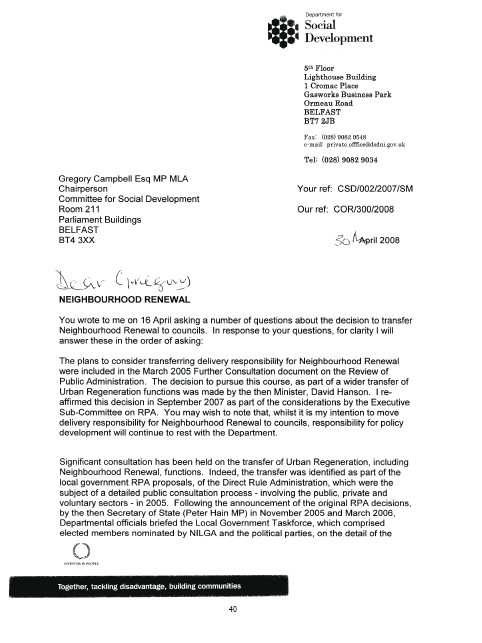
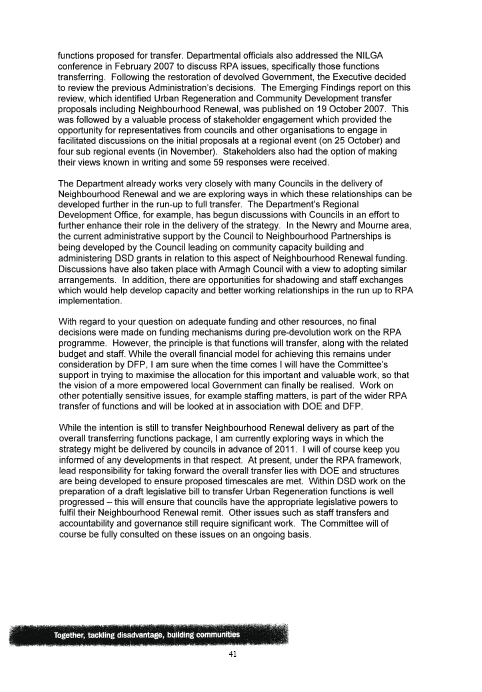

Correspondence from DSD
10 October 2008
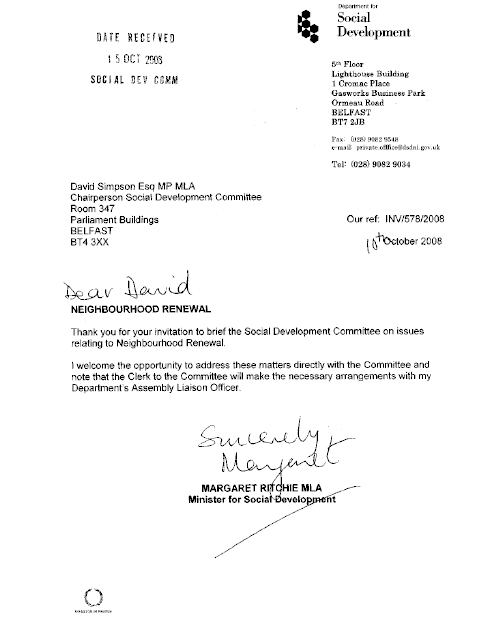
Correspondence from DSD
30 October 2008
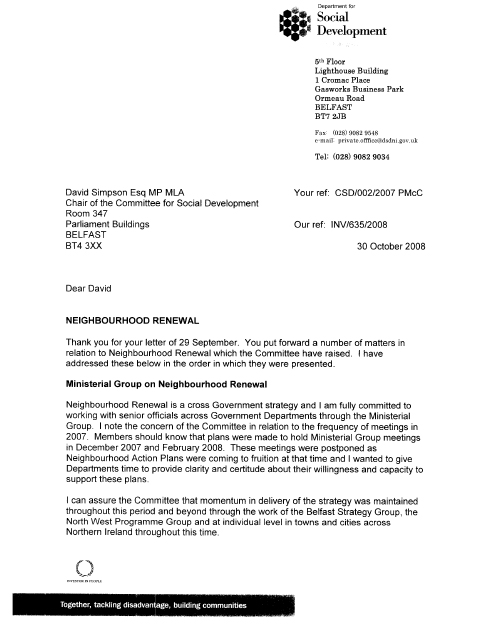
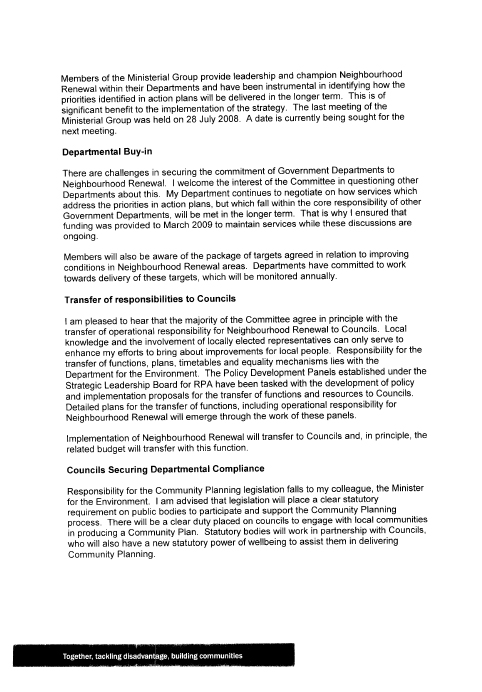

Correspondence from DSD
3 November 2008
| From: Tony McKibben Head of Neighbourhood Renewal Unit Date: 3 November 2008 To: Peter McCallion Clerk to the Committee for Social Development |
Report of the Committee on the Implementation of Neighbourhood Renewal.
Thank you for your correspondence of the 28th of October requesting background information on the Neighbourhood Renewal Strategy. Your queries are addressed below in the order they occur in your note.
What happened between the publication of People and Place in 2003 and March 2008?
The Neighbourhood Renewal Strategy was launched in June 2003 by the then Minister for Social Development John Spellar. The Strategy provided a blueprint for implementation but considerable work was required to agree boundaries, bring forward the delivery structures and engage key statutories. A range of activities directed at achieving these outputs have occurred in the interim, for example:-
- Neighbourhood Renewal areas were identified;
- Neighbourhood boundaries agreed following a period of consultation with local people;
- Baseline statistical data established for each area;
- Neighbourhood Partnerships, representative of community, voluntary, statutory, political and private sectors were established;
- Neighbourhood Vision Statements were agreed;
- Neighbourhood Action Plans were developed and agreed;
- Ministerial Group established and meetings held;
- Cross Government working encouraged;
- Regional Targets were agreed.
Whilst work was ongoing to develop the structures to deliver Neighbourhood Renewal, DSD continued to provide support to groups delivering services to Neighbourhood Renewal areas in accordance with the normal appraisal requirements.
Where did the Regional Targets come from?
‘People and Place’ indicates that challenging targets, against which progress would be measured at regular intervals, would be set for the strategy. At its meeting of the 19th of June 2006, the Ministerial Group on Neighbourhood Renewal moved to honour this commitment by agreeing that regional targets, linked to Government priorities, should be developed to measure the impact of the strategy.
As a result of negotiations with Departments a suite of thirteen targets focussing on key aspect of deprivation at the neighbourhood level have been agreed. These targets are owned by the Departments and they will be responsible for monitoring and reporting progress to the Neighbourhood Renewal Unit.
Are the area targets in People and Place still valid?
Annex 3 and 4 of the strategy document contained an illustrative list of output indicators and proposed Neighbourhood Renewal Targets. The intention was to demonstrate the relationship between the direct outputs of services and the longer-term impacts (outcomes) these could have on key indicators. The targets which are now in place correlate closely to the original proposed targets in detailing improvements to the community, economic, social and physical well-being of Neighbourhood Renewal Areas e.g. unemployment rates, life expectancy, educational attainment etc. There are also some additional targets e.g. in relation to investment and enterprise.
Do Neighbourhood Renewal Areas have Vision Statements?
Yes - Neighbourhood Partnerships devised a long term vision (7-10 years) for each area to inform the development of action plans to meet the vision.
What is the governance process for Neighbourhood Renewal?
The Department for Social Development has overarching responsibility to co-ordinate delivery of the Neighbourhood Renewal Strategy. Governance controls are in place at a number of levels to ensure effective implementation of the strategy:-
- The Minister for Social Development chairs the Ministerial Group on Neighbourhood Renewal which determines the strategic direction of the strategy.
- Quarterly monitoring of progress against relevant Public Service Agreements (PSAs) in the Programme for Government is undertaken by the Department of Finance and Personnel, with 6 monthly reports made to the Executive;
- Monitoring of PSA and other relevant commitments is undertaken by individual Departmental Management Boards (DMBs) to agreed timescales;
- Quarterly monitoring of progress on DSD commitments (including management of risks) is undertaken by the Urban Regeneration and Community Development Group (URCDG) Management Board and reported to the Departmental Management Board;
- Regular meetings of the Neighbourhood Renewal Implementation /Advisory Group are held to consider key implementation matters, explore optimum ways of tackling common issues and identifying and sharing best practice;
- Economic appraisals of individual projects are undertaken prior to the commitment of funds. Ongoing quarterly monitoring of deliverables against agreed contracts for funding awarded occurs throughout the lifetime of a project. Post project evaluations are completed 6 to 12 months after time-bounded project have ended or at appropriate intervals in relation to continual service delivery.
In addition, Development Officers in the relevant Directorates in the Urban Regeneration and Community Development Group are members of Neighbourhood Partnerships to provide support and guidance and encourage full participation of key statutory organisations and others on the partnership.
I hope you find this helpful. If you require any further information please contact me.
Tony McKibben
Correspondence from DSD to DENI
6 November 2008
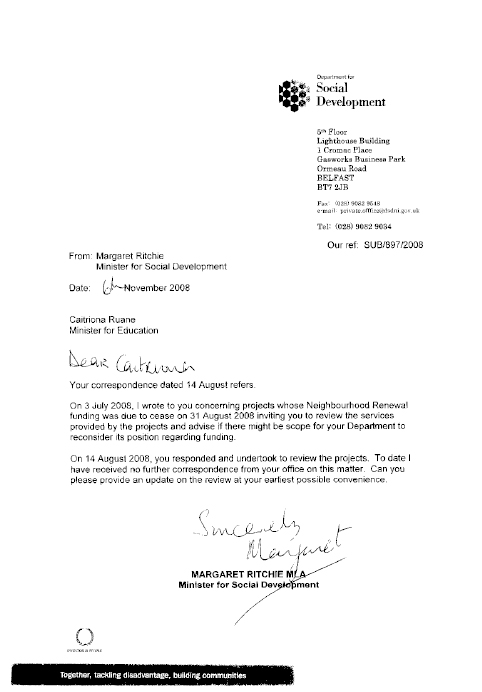
Correspondence from DSD
6 November 2008
From: Ferguson, Denise [mailto:Denise.Ferguson@dsdni.gov.uk]
Sent: 06 November 2008 15:41
To: McCallion, Peter
Cc: McKibben, Tony; Downey, Elaine; Rooney, David
Subject: RE: Neighbourhood Renewal Report
Hi Peter,
Please find below - responses to your questions.
Baseline Data - Baseline data for each Neighbourhood Renewal area can be found on Northern Ireland Neighbourhood Information Service (NINIS) website. Please see attached link - http://www.ninis.nisra.gov.uk/
Floor Targets - The use of floor targets was explored earlier in the strategy, but this was a concept peculiar to England and not something that was developed in Northern Ireland. “Regional Targets” were, therefore developed. Just to ensure your understanding - when we use the phrase “Regional Targets”, we do not mean targets for the whole of Northern Ireland, but targets for the 36 Neighbourhood Renewal areas across the region.
Action Plans: - Neighbourhood Partnerships are representative of key partners, including statutory organisations, although we do acknowledge that it has been difficult to obtain consistent statutory participation across all Neighbourhood Partnerships. That is why the North West Programme Group and the Belfast Strategy Group were established to bring together, at a strategic level, key statutory partners to consider action plans at a strategic level. Negotiations in other towns and cities are taking place at al local level.
Neighbourhood Renewal is about maximising the effectiveness of the significant amount of public funding already spent in Neighbourhood Renewal areas to deliver on the priorities identified by Neighbourhood Partnerships. The Economic Appraisal process clarifies the costs of projects for the longer term. When an application for funding is submitted, it is costed and appraised to ensure cost effectiveness in delivering on the priorities identified inaction plans.
Regional Targets - People and Place (5.2) para 3 - advises that if additional targets are needed - they will be agreed by the Ministerial Group. Annex 4 detailed proposed targets for Neighbourhood Renewal. The targets agreed through the Ministerial Group have been adopted by relevant Departments as the targets to be achieved in Neighbourhood Renewal areas. I am attaching a revised targets table, as the target in relation to Community Safety has recently been agreed. You will note that all the targets refer to improvements at Neighbourhood Area level.
Implementation Group. - The NR Implementation Group is chaired by the Director of Belfast Regeneration Office, who is currently on leave. A request for copies of the minutes has been made to her office. The Implementation Group comprises officials from DSD Development Offices, Neighbourhood Renewal Unit and Finance and Governance.
I hope that you find this information useful. It was good to put a face to the voice this morning. If you require anything further, please let me know.
Thanks
Denise
Denise Ferguson
Neighbourhood Renewal Unit
Level 3, The Lighthouse
Gasworks Business Park
Ormeau Road
Belfast
BT7 2JB
Phone 028 90829375
DD 38375
|
Theme |
Desired Outcome |
Key Indicators |
Target |
|---|---|---|---|
|
Health |
Improvement in the general quality of life by addressing and reducing long term and mental health problems, teenage pregnancy and increasing life expectancy overall. |
Life ExpectancyGap = 5.2 years (Man) 3.1 years (Woman) Standard Suicide RateGap = 5.6 suicides per 100,000 persons. Births to Mothers aged under 17Gap = 3.9 births per 1000 females aged under 17. |
By 2012 to close the gap between life expectancy in Neighbourhood Renewal areas and the Northern Ireland average by 33%.
By 2013 to reduce the gap in suicide rates between Neighbourhood Renewal areas and the rest of Northern Ireland by 15% By 2010 to achieve a 25% reduction in the rate of births to teenage mothers under 17 living in Neighbourhood Renewal areas. |
|
Education |
No child will leave school without basic literacy and numeracy skills. |
% achieving Level 4 or above in: KS 2 English is 64%. Non NRA average is 80%. (Gap = 16%) KS 2 Maths is 65%, Non NRA average is 82% (Gap = 17%) 2006/07 % of school leavers achieving at least 5 + GCSEs A* - G in 2006/07 was 79.2% against non NRA average of 90.6%. (Gap = 11.4%) % of school leavers resident in a NRA achieving no GCSEs in 2006/07 was 7.7% against non NRA average of 3.2%. (Gap = 4.5%) |
By 2010 bring the attainment levels of primary schools identified as having 51% or more pupils living at a postcode within a NRA, up to within 5 percentage points of the non-NRA schools average at Key Stage 2.
By 2010 bring the attainment level of school leavers resident in a NRA, up to within 5 percentage points of the non NRA average at GCSE. By 2010, reduce the number of school leavers resident in a NRA achieving no GCSEs to within 1 percentage point of the non NRA average. |
|
Employability and Skills |
Maximise the potential of individuals and provide more opportunities to improve qualifications to enable people to move into their chosen career /employment. |
Employment RateGap = 5%
Proportion qualified to level 2+Gap = 17% |
By 2012, subject to economic conditions, increase the employment rate in Neighbourhood Renewal areas, and narrow the gap between the Northern Ireland employment rate and the employment rate in Neighbourhood Renewal areas. By 2015, increase the proportion of the working age population in Neighbourhood Renewal areas qualified to level 2 and above (including qualifications on the National Qualifications Framework), and narrow the gap between the Northern Ireland figure and that in Neighbourhood Renewal areas. |
|
Economic Growth |
Neighbourhood Renewal areas to benefit from sustainable economic growth. |
Inward Investment
2006/07 and 2007/08 New and Existing Inward Investment jobs in NRAs = 2972. 55% of 6500 = 3575 therefore target = 603 jobs by March 2009 2006/07 and 2007/08 856 business start ups in NRAs out of total of 5430 = 15.7% Enterprise Activity |
By March 2009, to have 70% of new FDI projects located within 10 miles of an area of economic disadvantage. By March 2009, to achieve 6,500 new jobs through inward investment, 55% of which will be in Neighbourhood Renewal areas.
By March 2009 to have 15% of Business Start ups coming from Neighbourhood Renewal areas. By March 2009, to have 200 participants from Neighbourhood Renewal areas participating in the Small Business Support Programme. |
|
Crime and Fear of Crime |
Secure and safe life, free from fear of crime |
Anti-Social Behaviour 2007/08 - 25,826 anti-social behaviour incidents in Neighbourhood Renewal areas |
To reduce by 2011, the number of anti-social behaviour incidents in Neighbourhood Renewal areas by 15%. |
Correspondence from DSD
December 2008
Mr Peter McCallion |
December 2008
(Your ref: CSD/002/2007/PMcC)
Dear Peter
Committee Report on the Implementation of the Neighbourhood Renewal Strategy
Thank you for your letter of the 28th November.
The Department’s response to the questions put forward by the Committee are attached to this letter.
Yours sincerely
John Ball
DSD Assembly Liaison Officer
Questions and responses to the further questions raised by the Social Development Committee
1. The number of projects that have been identified as ‘category 2’ and have had, or are to have, their DSD funding withdrawn.
The funding position in relation to existing ‘category 2’ projects is the subject of ongoing negotiations. It is not possible to provide a definitive answer to this question before the conclusion of these negotiations. To date it has been determined that 28 projects will not have DSD funding continued post March 2009.
The Committee is advised that these projects provided services which were either:-
- coming to the end of their contracted period;
- not addressing a priority need in the Neighbourhood Renewal area;
or
- providing services which duplicated those already provided by a statutory provider.
Decisions regarding these projects were taken only after extensive negotiations with the relevant statutory bodies.
2. A brief description of the ‘category 2’ projects.
This information is provided in the table attached.
3. The number of jobs that have been lost or are to be lost as a consequence of the current or future discontinuation of Departmental funding for category 2 projects.
The Department for Social Development is funding services in Neighbourhood Renewal areas which fall within the functional responsibilities of other Departments. These are the subject of ongoing negotiations with statutory bodies and final decisions have not yet been made.
Neighbourhood Renewal resources are used to provide services, identified in action plans, which address the causes of deprivation. In many instances this will translate into funding for posts associated with the delivery of such services. The Department does not employ the post holders for the projects concerned and is not obliged to be informed of employer’s plans in relation to these posts, as a result of decisions made by the Department.
4. An estimate of the funding withdrawn, or to be withdrawn.
No funding has been or will be withdrawn. The Committee will be aware of the Minister’s recent announcement providing significant levels of funding from March 2009.
The Department currently also funds services which fall within the core responsibility of other statutory bodies. Those bodies have a role to play in providing financial support for services in the longer term. That role is currently the subject of negotiations with the relevant statutory bodies and Minister will comment further on the future of these projects before the end of the financial year.
5. An indication of the key deprivation indicators that may be adversely affected by the current or future withdrawal of funding.
This question is predicated on the withdrawal of funding from Neighbourhood Renewal areas. The Minister has clearly indicated that this is not the intention of the Department and it is her intention to ensure that the resources available are used in the most efficient and effective manner.
|
Project Identified as Category 2 |
Description |
|---|---|
|
Good Morning North West / Neighbourhood Assist through Dove House Community Trust |
Community Welfare |
|
Citizens Advice Bureau |
Advice Services |
|
Galliagh Community Development Group |
Advice Services |
|
Limavady Community Development Initiative |
Advice Services |
|
NIHE Social Education Programme |
Community Safety |
|
Top of the Hill 2010 - Gorbal’s Youth Project |
Youth Services |
|
Tullyally and District Dev Group Ltd Youth Club |
Youth Services |
|
Dove House Community Trust Youth Worker |
Youth Services |
|
Dunluce Family Centre Lifestart Programme |
Family Support |
|
Derry City Council Active Citizenship Through Sport Programme |
Skills & Employment |
|
Derry Healthy Cities Neighbourhood Health Development Project |
Health Services |
|
Old Library Trust Healthy Living and Learning Centre |
Health Services |
|
WHSSB - The Nexus Institute Evening Counselling Services |
Counselling Services |
|
Outer North Community Arts & Culture Programme |
Community Relations |
|
Fountain Primary School Transport Links for the Fountain Community |
Education Services |
|
Rainbow Child & Family Centre |
Education Services & Family Support |
|
St Joseph’s Community Playgroup |
Education Services & Family Support |
|
Naiscoil Colmcille |
Education Services & Family Support |
|
Naiscoil Na Rinne – Tus Maith |
Education Services & Family Support |
|
Creggan Pre-school & Training Trust |
Education Services & Family Support |
|
Chapel Road Community Playgroup |
Education Services & Family Support |
|
Jack & Jill Community Playgroup |
Education Services & Family Support |
|
Hillcrest House – Internet Tools for Schools Homework Club |
Education Services & Family Support |
|
Dunluce Family Centre Ltd – Lifestart Programme |
Education Services & Family Support |
|
Holy Family Kindergarten |
Education Services & Family Support |
|
Greater Shantallow Area Partnership – Community Drugs Awareness Officer |
Health Services |
|
Galliagh Womens Group |
Family Support & Advice Services |
|
Galliagh Community Development Group - Good Morning North West |
Community Relations & Welfare Services |
|
Centre of Creative Energy |
Health Services |
|
Waterside Women’s Centre |
Family Support & Advice Services |
|
Mencap – Family Advisor Service |
Family Support & Advice Services |
|
Dunluce Family Centre Ltd – Lifestart Programme |
Family Support & Advice Services |
|
Strabane Sigersons GAA |
Health Services & Community Development |
|
North West Centre for Learning Development |
Skills Development |
|
Galliagh Womens Group |
Family Support & Advice Services |
|
Creggan Pre-school & Training Trust |
Education Services & Family Support |
|
Waterside Women’s Centre |
Family Support & Advice Services |
|
Gingerbread NI: Lone Parents Centre |
Family Support & Advice Services |
|
Western Health & Social & Services Board – New Horizons Partnership – Tubs & Buds / Enabling Employment Project |
Health Services & Employment Services |
|
Partnership Care West – Pathways to Employment & Shared Parenting Solutions Project |
Family Support & Employment Services |
|
Andersonstown Traditional & Contemporary Music School Class Co-ordinator |
Culture Arts & Tourism |
|
Upper Andersonstown Community Forum Director |
Economic Development, Youth Services & Health Services |
|
Ardmonagh Family & Community Group Childcare Co-ordinator |
Family Support & Childcare |
|
USDCL - Intervention Project Youth Co-Ordinator, Health Initiatives Worker and Detached Youth Workers |
Youth Services |
|
Ballymurphy Women’s Centre Co-ordinator, Finance Officer & P/T Administrator |
Advice Services |
|
USDCL - Training for Life Project Peers Educators |
Youth Education & Skills |
|
Upper Springfield Resource Centre P/T Administrators |
Advice Services |
|
Springhill Community House Co-ordinator |
Counselling Services & Family Support |
|
USDCL - Public Arts Project Art Project Manager |
Community Relations |
|
USDCL - Action on Disability Project - Project Manager & |
Community Relations & Welfare |
|
USDCL - Active Learning Project Essential Skills Co-ordinator |
Skills & Employment |
|
Voices Women’s Group Development Officer |
Advice Services |
|
Greater Turf Lodge Residents Association Advice Co-ordinator |
Advice Services |
|
Corpus Christi Services Mental Health Counsellors, Training Project Co-ordinator, Welfare Advice Worker and Education Befriender / Trainer |
Community Relations and Counselling Services |
|
Lenadoon Women’s Group Parenting Coordinator & Family Support Worker |
Health & Education Advice Services |
|
Lenadoon Community Forum (Education & Training Project) Project Coordinator & P/T Admin |
Health, Skills, Employment & Education Advice Services |
|
Glen Community Parent/Youth Group Youth Co-ordinator |
Family Support, Youth Services and Community Relations |
|
An Munia Tober Economic Development Officer, Economic Development Project Worker & PT Finance Admin |
Community Relations & Advice Services |
|
Colin Neighbourhood Partnership Community Development Workers & Marketing Officer |
Health, Education, Economic Development, Community Safety, Environment & Recreation & Youth Services |
|
Footprints Womens Centre Childrens Service Manager, Training & Education Coordinator, Training and Education Development Worker, Catering Manager, Childcare Coordinator, Childcare Worker, Cook & Assistant Cook |
Health Services, Youth Services, Education and Family Support |
|
Youth Initiatives Project Support Worker |
Youth Services |
|
Colin Neighbourhood Partnership. |
Health Services and Community Welfare |
|
North Belfast Advice Partnership Incorporating Ligoniel Improvement Association, Lower North Belfast Community Council, Ballysillan Community Forum – Advice Workers |
Advice Services, Health Services and Community Welfare |
|
Ashton Community Trust – Kinderkids Childcare Supervisor & Administrator |
Family Support, Childcare and Education |
|
Ashton Community Trust – Community Access To Lifelong Learning -IT Tutor |
Skills Services |
|
Ashton Community Trust – Steps To Work - Training Coordinator & Outreach Guidance Workers |
Skills Services and Education |
|
Ashton Community Trust Essential Skills Tutor |
Skills Services |
|
Ashton Community Trust – Women’s Community Training Project - Development Worker & Part-time Administrator |
Advice Services, Skills Services & Education |
|
Star Neighbourhood Centre – Centre Manager - Childcare Co-ordinator, Childcare Deputy Leader & Youth Development Workers |
Skills Services, Education, Health Services, Youth Services and Family Support |
|
Corner House Cross Community Family Centre Youth Co-ordinator |
Youth Services |
|
Tar Isteach Youth Worker |
Skills Advice, Education & Youth Services |
|
Depaul Trust Drive Ahead Project Manager & Trainer |
Education & Skills Advice |
|
174 Trust After Schools Club Project Co-ordinator |
Education, Skills Advice, Family Support and Childcare Services |
|
Upper Ardoyne Community Partnership Education Coordinator |
Education & Health Services |
|
North Belfast Women’s Initiative and Support Group Development Worker & Part-time Finance Administrator |
Health Services & Community Welfare |
|
Good Morning Ballysillan Telephone Befrienders |
Health Services, Community Safety & Welfare |
|
Wheatfield Action Project – Community Environmental Officer & Community Environmental Officers |
Youth Services, Environmental Services & Employment Services |
|
Glenbank Community Association Playgroup Leader/ Playgroup Assistant |
Childcare Services |
|
Cancer Lifeline Administrator |
Health Services |
|
Wishing Well Family Centre - Centre Manager & Finance Manager |
Skills & Employment Services & Community Welfare |
|
New Life Counselling Youth Counsellor, Adult Counsellor & Therapeutic Counsellor |
Youth & Health Services |
|
Marrowbone Community Association Youth Development Worker Category |
Skills Development, Youth Services, Community Safety and Welfare |
|
Ardoyne Women’s Group Childcare Supervisor |
Health Services, Skills & Employment Development and Community Welfare |
|
Lower Oldpark Community Association/Creche - Creche Leader |
Childcare Services |
|
Manor St Confident Cliftonville Community - Childcare Co-ordinator & Youth Workers |
Youth Services, Community Relations, Childcare Services & Health Services |
|
Womens News – Editor & Finance Admin Officer |
Employment Services, Youth Services & Health Services |
|
Ardoyne Youth Providers Forum – Director & Administrator |
Youth & Health Services |
|
North Belfast Senior Citizens Forum - Project Co-ordinator, Outreach Advice Worker & Administrative Assistant |
Education Services, Health Services & Community Welfare |
|
Greater Village Regeneration Trust Community Sustainability Officer & Economic Development Officer |
Health Services, Employment & Skills Advice, Community Development & Community Relations |
|
South Belfast Malecare Project Worker |
Health Services |
|
Southcity Resource & Development Centre Crèche Supervisor, Deputy Crèche Supervisor, Out of School Club Leader & Out of School Club Assistant |
Community Development, Skill & Employment Advice, Community Relations, Education & Youth Services |
|
Belfast South Community Resources - IT Manager & Community Liaison / Families Officer |
Community Development, Skill & Employment Advice, Community Relations, Education & Youth Services |
|
Belfast Health & Social Care Trust Healthy Neighbourhood Project |
Community Relations, Housing Services, Community Development, Community Safety, Health Services, Family Support, Skills Development |
|
Tullycarnet Community Forum Part time Playgroup Workers |
Community Relations, Housing Services, Community Development, Community Safety, Health Services, Family Support, Skills Development |
|
Tullycarnet Primary School - Nurture Group – Salary for Teacher |
Community Relations, Community Development, Health Services, Family Support, Skills Development |
|
Donegall Pass Community Forum Training/Education co-ordinator & Community Training Officer |
Community Relations, Housing Services, Community Development, Community Safety, Health Services, Family Support & Childcare, Skills Development, Education Services & Youth Services |
|
An Droichead Nursery Co-ordinator & Nursery Supervisor |
Education Services |
|
Lower Ormeau Residents Action Group Youth Workers & Childcare Worker |
Youth Services, Family Support & Education Services |
|
Ashfield Boys School Counselling service for vulnerable Boys |
Counselling Services, Youth Services, Education Services, and Health Services |
|
Ballymac Friendship Trust - Youth Project Co-ordinator and Youth Worker |
Education Services, Community Relations, Community Safety |
|
Bridge Community Association - Youth Project Co-ordinator |
Housing Services, Community Development, Education Services, Family Support, Skills & Employment Services, Health Services, Community Safety, Youth Services |
|
Community Drug Awareness Programme – CODA Project Director, Training Co-ordinator, Project Worker, Support Worker & Running Costs |
Health Services, Community Safety, Counselling Services & Youth Services |
|
East Belfast Community Education Centre – Training and Employment Project - Centre Manager, Co-ordinator, Crèche assistant & Administrator |
Education Services, Skills and Employment Services |
|
Inner East Youth Project - Team Leader, Project Worker, Support Worker & Administrator |
Education Services, Skills & Employment Services, Youth Services & Community Relations |
|
Newtownards Road Women’s Group LTD - After schools Leader, Afterschools Assistant & Crèche Worker |
Education Services, Skills & Employment Services & Community Safety |
|
EPIC - Welfare Officer |
Skills & Employment Services, Health Services, Community Relations, Community Development |
|
Streetbeat Youth Project - Youth Worker, Administrator & Cleaner |
Youth Services, Community Relations |
|
West Belfast Athletic & Cultural Society - Development Worker |
Health Services, Community Relations |
|
Forum for Action on Substance Abuse (FASA) – Therapists, Trainee Community Support Officer, Finance Officer, Information Point Officer, Counsellor & Cleaner |
Health Services |
|
Shankill Women’s Centre - Health Worker |
Health Services |
|
Stadium Youth and Community Project - Youth Worker x 2 Development Worker |
Youth Services |
|
Riddell Crèche Association - Creche Assistants |
Education Services |
|
Hobby Horse Playgroup - Senior Supervisor, Playgroup Assistant & Administrator |
Education Services |
|
Conway Education Centre - Centre Manager, Co-ordinator & Administrator |
Education Services |
|
Conway Mill Preservation Trust - Project Support Worker & Finance Officer |
Community Development |
|
Culturlann MacAdam O’Fiaich - Tourism Officer |
Community Development & Relations |
|
Failte Feirste Thiar - Senior Development Officer, Development Officer & Administrator |
Community Development & Relations |
|
Falls Community Council - Duchas Project Manager, Family Support Worker, AMPS Manager, AMPS Trainer, Senior Family Support Worker, Family Support Worker & Childcare Co-ordinator |
Community Development & Relations, Youth Services, Family Support, Skills Development |
|
Lower Falls Newstart - Health Support Worker |
Health Services |
|
Neighbourhood Development Association - Community Development Officer & Secretary / Administrator |
Health Services, Welfare Services, Advice Services |
|
Pobal - Running Costs |
Youth Services, Community Relations |
|
Support Care & Advice - Outreach Worker, Co-ordinator & Volunteer Expenses |
Health Services, Welfare Services, Advice Services |
|
Tar Anall - Family Support Worker & Training & Education Co-ordinator |
Family Support, Education Services, Skills Development, Health Services, Advice Services, Employment Services |
|
Welcome Trust - Co-ordinator |
Health Services |
|
West Belfast Parent Youth Support Group - PT Administrator |
Education Services, Youth Services, Skills Development & Employment Services |
|
Clan Na Gael Sports Development Officer |
Health Services & Youth Services |
|
Drumcree Comm Trust – Learning through Play |
Health Services & Youth Services |
|
First Friends Playgroup - 1 P/T Play leader, 1 Deputy & 1 assistant plus play & office equipment |
Health Services, Education Services |
|
Brownlow Craigavon Watersports Centre Outdoor pursuits training |
Health Services & Youth Services |
|
Downpatrick : Good Morning Down |
Welfare Services, Health Services |
|
Health & Wellbeing Programme - Armagh & Dungannon – Co-Ordinator |
Health services |
|
Mental Health & Community Empowerment South Eastern Health & Social Care - Salaries for Mental Health Worker and Community Development Workers, admin support, running costs and programme development |
Health Services |
|
Safe & Well Older Person’s Project -South Eastern Health & Social Care - Salaries for P/T Community Health Development workers admin support, running costs, and programme development costs |
Welfare Services & Health Services |
|
Downpatrick Family Health & Wellbeing - South Eastern Health & Social Care - Salaries for P/T Family Support workers and programme support for mobile crèche and family support services |
Family Support & Health Services |
|
Craigavon UBI Education & Social Exclusion Programme - Educational programme |
Education Services & Youth Services |
|
SELB Social Renewal Education Programme Armagh |
Education Services & Youth Services |
|
HSSST Health & Wellbeing Newry |
Health Services |
|
Armagh FE College-social renewal Education Programme |
Education Services |
|
Downpatrick NR Health Enhancement Project - Computer equipment & programme costs |
Health Services |
|
SELB - Social Renewal Educational Programme – Craigavon - Educational programme |
Education Services & Youth Services |
|
Southern Health & Social Care Trust - 80/20 Recycling |
Community Development |
|
SELB - Social Renewal Educational Programme Newry |
Education Services |
|
Ballysally and Churchlands Advice and Support Services |
Advice Services |
|
Ballymena South Community Sports Programme |
Health Services & Youth Services |
|
Family Nurturing Programme |
Family Support |
|
Ballee Preschool Play Group |
Education Services & Family Support |
|
After School Club and Summer Scheme |
Education Services & Family Support |
|
Ballee After Schools Play Care Project |
Education Services & Family Support |
|
Healthy Eating Café |
Health Services |
|
The Development of a Nurturing Community |
Education Services & Family Support |
|
Ballyclare Breakfast Club |
Education Services & Family Support |
|
Ballyclare Homework Club |
Education Services & Family Support |
|
Getting IT Together |
Skills Development |
|
Drive For Life |
Skills Development & Employment Services |
|
Nurturing Programme - Ballysally P.S. |
Education Services & Family Support |
|
Support for After Schools Club Strathroy Omagh |
Education Services & Family Support |
|
Newry - Education and Training Towards Equality (NEATTE) |
Education Services |
|
Work4you (Newry) |
Skills Development & Employment Services |
|
NI Alternatives |
Advice Services & Family Support |
|
Movie House Advertisement Project |
Community Development |
|
Omagh Programme to improve educational attainment |
Education Services & Family Support |
|
Enclosed play area Strathroy, Omagh |
Health Services & Youth Services |
|
Development Assistance for social economy projects & capacity building in Mullaghmore |
Community Development & Relations |
|
Health & Wellbeing Programme in Omagh NR Area - Phase III - Activities & Alcohol support outreach worker |
Health Services |
|
Health & Well Being Programme for Enniskillen NR Area Phase II |
Health Services |
|
Enniskillen Programme to improve educational attainment |
Education Services & Family Support |
|
Programme to improve Employment & Learning |
Skills Development & Employment Services |
|
SELB Social Renewal Education Programme Newry |
Education Services |
|
SELB Social Renewal Education Programme Armagh |
Education Services |
|
Ballee Primary School IT Suite |
Education Services |
|
After Schools Club and Summer Scheme |
Education Services & Family Support |
|
Fresh Fruit |
Health Services |
|
Ballymena Citizenship and Employability Project |
Skills Development & Employment Services |
|
Family Nurturing Project |
Education Services & Family Support |
|
Extended Schools Activity Camphill PS |
Education Services & Family Support |
|
Getting IT Together (Year 3) |
Skills Development |
|
Ballymena Adopt a School Ballee High School |
Education Services |
|
NIHE Area wide schemes |
Community Development |
|
Drumalane + Camlough Rd Fencing |
Community Development |
|
Cathederal Road Playing Field |
Community Development |
|
Ballee Childcare Ltd |
Education Services & Family Support |
|
Riverside Cycle Path |
Community Development |
|
Environmental Improvements - Strathroy |
Community Development |
|
Grange Play Park |
Community Development |
|
Millburn Street Lighting |
Community Development |
|
Mullaghmore Lights |
Community Development |
|
Mullaghmore Toilets |
Community Development |
|
O’Kane Park - Up-grade Multi-sport, Equipment for Community Centre & Playgroup |
Community Development, Education Services, Youth Services |
|
Campsie - Railings & landscaping &improvements to community facility |
Community Development |
|
Omagh NRA Gallows Hill Entrance feature, landscaping, play equipment and support for traffic calming, disabled access and footpath upgrade |
Community Development |
|
Omagh NRA Roads – upgrade street lights in areas of high ASB and EI to footpaths in O’Kane Park & Strathroy |
Community Development |
|
Provision of Community Facility In Windmill Heights |
Community Development |
|
Refurbishment at Dungannon Youth Resource Centre |
Community Development & Youth Services |
|
Dungannon NRA Environmental Improvements & community Capacity – EI, Clean ups, entrance features |
Community Development |
|
Dungannon NRA Recreation/community provision |
Community Development |
|
Coalisland NRA Environmental Improvements – community clean ups, landscaping and best kept garden competitions |
Community Development |
|
Coalisland NRA Recreation/community provision |
Community Development |
Appendix 7
Other Papers Submitted to the Committee
Assembly Research Paper on People and Place
A Strategy for Neighbourhood Renewal – June 2007
Correspondence from DRD – 8 July 2008
Correspondence from DHSSPS – 7 August 2008
Correspondence from OFMDFM – 13 August 2008
Correspondence from DENI – 4 September 2008
Correspondence from Andersonstown (Upper) Community Forum – 1 December 2008
Correspondence from Brownlow Neighbourhood Renewal Area – 1 December 2008
Correspondence from Downpatrick Neighbourhood Renewal Area – 1 December 2008
Correspondence from Lenadoon Neighbourhood Renewal Area – 1 December 2008
Correspondence from Link Community Association – 3 December 2008
Assembly Research Paper on Neighbourhood Renewal
in Scotland, England and Wales – February 2009

Research and Library Services
People and Place
A Strategy for Neighbourhood Renewal
Introduction
Lifetime Opportunities is government’s Anti-Poverty and Social Inclusion Strategy for Northern Ireland.[1] The strategy outlines what will be done by the Northern Ireland Departments and the Northern Ireland Office over a period of fourteen years in achieving its overall objectives of working towards: the elimination of poverty and social exclusion in Northern Ireland by 2020; and halving child poverty by 2010 on the way to eradicating child poverty by 2020. The strategy is structured into four key life stages: Early Years (0 . 4), Children and Young People (5 . 16), Working Age Adults and Older Citizens. The Anti-Poverty and Social Inclusion strategy is described as retaining the key principle of New Targeting Social Need which is to direct resources within government programmes at those areas, groups and individuals in greatest objective need.
The Neighbourhood Renewal Strategy forms part of the wider government strategy to address poverty and social exclusion in Northern Ireland.
People and place – A strategy for Neighbourhood Renewal
In June 2003, the Department for Social Development (DSD) launched “People and Place – A strategy for Neighbourhood Renewal”.[2] The Neighbourhood Renewal Strategy is intended to represent a move away from short-term, project-led interventions, which characterised programmes such as Making Belfast Work, towards a long-term programme based approach to tackle deprivation and close the quality of life gap. Neighbourhood Renewal has 4 strategic Objectives:
Community Renewal – to develop confident communities that are able and committed to improving the quality of life in their areas
Economic Renewal – to develop economic activity in the most deprived neighbourhoods and connect them to the wider urban economy
Social Renewal – to improve social conditions for the people who live in the most deprived neighbourhoods through better co-ordinated public services and the creation of safer environments
Physical Renewal – to help create attractive, safe, sustainable environments in the most deprived neighbourhoods
The focus of the strategy is on Urban Neighbourhood Renewal Areas which are being targeted because they are within the top 10% of deprived neighbourhoods in Northern Ireland based on the ‘New Noble Multiple Deprivation Measure’. Following consultation, a total of 36 areas have now been targeted for action. Geographically the areas are described by DSD as being split:
- 15 in Belfast,
- 6 in Londonderry and
- 15 in other towns and cities across Northern Ireland.
As ‘Neighbourhood Renewal’ is based upon a community planning approach focused on improved public services, a key element of the Strategy is the establishment of Neighbourhood Partnerships in each Neighbourhood Renewal Area. Neighbourhood partnerships are the vehicle for local planning and implementation of the strategy but are not normally expected to handle money or commit public resources. Instead, their focus is on identifying local priorities and working to influence and contribute to the determining of Government spending priorities for their neighbourhoods. They are expected to act as a vehicle for local planning and implementation. To assist Partnerships, the DSD may provide technical assistance funding. This will allow for the employment of staff and/or consultants and where necessary, the channelling of financial resources to support this may be achieved through a “Lead Partner“ arrangement. A Lead Partner may be a Local Strategy Partnership, District Council, a Belfast Area Partnerships or properly constituted community/voluntary organisation capable of receiving, managing and accounting for public money. Each Neighbourhood Partnership is responsible for:
- Analysing and prioritising the needs of their Neighbourhood Renewal Areas;
- Engaging and consulting local communities to drive and implement Neighbourhood Renewal;
- Leading the process in the preparation of the Vision Statements and 3 year Neighbourhood Action Plans;
- Oversee the implementation of the Action Plans;
- Publicise and build awareness of “People and Place” - A Strategy for Neighbourhood Renewal, across the target areas, with particular regard to informing local communities of progress made;
- Participate in the monitoring and evaluation of Vision Statements and Action Plans including reporting progress against their Action Plan targets as required by Development Offices.
Each Neighbourhood Partnerships is required to develop a Vision which covers a 7-10 year period and a rolling three year Neighbourhood Action Plan to implement the Vision. Action Plans should be reviewed and amended as and when required, at least annually, with the requirement that a new Action Plan is developed every 3 years. DSD provides the following guidance on action plans.
At its simplest, an Action Plan is a list of actions to move the neighbourhood to where the Neighbourhood Partnership wants it be. The Plan will not simply focus on activities to be supported by DSD but must reflect an integrated and co-ordinated approach to the neighbourhood by all statutory, public and community sectors. It should be a broad based document, which is developed and owned by all members of the Neighbourhood Partnership. It should set out realistic actions and targets against which the Partnership can review progress and use to oversee the implementation of Neighbourhood Renewal in the area. The Action Plan is not a one-off, and should be reviewed and developed over time. It should be recognised that the development of an Action Plan in itself is an achievement for the Partnership and the wider community and signifies a milestone in successful joint working.
Most agencies that deliver services in the neighbourhood plan their services and decide how money will be spent well in advance (sometimes a year or two ahead). It is important therefore that Neighbourhood Action Plans are developed with the full involvement of the statutory partners. Statutory partners also need to ensure that each Action Plan is compatible with and is capable of shaping and influencing statutory agencies planning processes at the appropriate stages.[3]
Measuring success
The success of the strategy is to be measured at both Neighbourhood Renewal Area and Regional level. In terms of the former, baseline information is being compiled for each area and targets are to be agreed within the context of Neighbourhood Action Plans and set for every Neighbourhood Renewal Area. The Northern Ireland Statistics and Research Agency (NISRA) is in the process of developing Geographical Information Systems to monitor change. The overall impact of strategy at regional level will be measured against a number of high level regional targets, which are set out as an appendix to the strategy.
In the past weakness have been identified in the approaches adopted in Northern Ireland to measure performance in relation to urban regeneration policy. In October 2001, the DSD appointed Cambridge Economic Associates Limited to examine the then existing approaches to the measurement of urban regeneration policy in Northern Ireland and make recommendations for a performance measurement framework for the new urban regeneration strategy. This examination concluded, amongst other things, that:
...the existing financial, output and outcome monitoring systems within URCDG (Urban Regeneration and Community Development Group) are fragmented and have a number of fundamental weaknesses. The extent of data collected and relevant statistical back-up is inadequate. As they stand, these systems are not capable of meeting the performance management requirements of the new urban regeneration strategy.[4]
The report also noted that DSD’s PSA output/outcome targets were essentially process orientated and need to be refocused. In the short term the report recommended that the targets should reflect a range of output targets but In the longer term the PSA targets should be more outcome driven.[5]
The current key PSA target which is relevant to the Neighbourhood Renewal Strategy states that “By 2010, in conjunction with other government departments, agencies and public bodies, implement the Neighbourhood Renewal Strategy, which aims to close the gap between the quality of life for people and marginalized groups in the most deprived neighbourhoods and the quality of life in the rest of Northern Ireland”. This PSA target together with the related associated actions and business plan targets are included as Appendix 1 to this paper. The targets are largely focused on processes and Members may wish to explore the potential for more output and outcome focused PSA and business plan targets.
Included as Appendix 2 to this paper, is Annex 4 of the strategy, which sets out proposed ‘regional ‘Neighbourhood Renewal Targets. Whilst these targets are outcome focused, they often make reference to ‘reductions’ but fail to specify to the extent of reduction. This lack of specificity means the targets are not SMART (Specific, Measurable, Achievable, Relevant and Timed). Members may wish to consider the need for more specific targets against which to measure the impact of the strategy at a high level.
Consultation Responses
A working paper describing the results of the consultation process that followed publication in 2002 of the Neighbourhood Renewal Consultation Document has been published by DSD.[6] A number of issues under headings used to structure responses in the DSD publication are highlighted below.
What is meant by neighbourhood
‘It was felt that the nature of neighbourhoods differs between settlement types, especially between cities, large towns and smaller areas, and this gave rise to a concern that smaller communities outside Belfast and Derry/Londonderry could be overlooked by the strategy. There was also a feeling that a gap between areas supported by rural policy and the settlements classified as urban could cause a range of intermediary settlement types to miss out. The need for clear urban and rural definitions as well as complementary urban and rural policies was prioritised in the consultation. (para 2.3)
Prioritising areas and regional balance
‘Attention was also drawn to the needs of areas in decline as well as those that exhibit the highest deprivation indicators. Over time, the distribution of deprivation might change and areas may move up or down the scale of need. Continuous monitoring and analysis should be employed to ensure that the strategy can adapt and respond to these changes.’ (para 3.6)
‘A number of respondents warned against drawing parallels with policy in the rest of the United Kingdom and highlighted the importance of developing a policy that would fit the distinctive Northern Ireland context. The need to look at and learn from examples of regeneration around the world was acknowledged, but it was stressed that we should draw on this experience selectively.’ (para 3.8)
Delivery Structures and Governance Arrangements
‘Capacity building was regarded as essential to empower local people to make decisions about the future of their areas. It was also felt that although capacity building should be a continuous process of learning and reflection, there would be a clear need for intensive work at the start of the process, especially in areas with a weak tradition of local development.’ (para 4.8)
‘There was also a call for a strong connection between the Neighbourhood Renewal Strategy and the Department for Regional Development’s Regional Development Strategy (RDS) for Northern Ireland and the Regional Transportation Strategy. In particular, it was felt that Neighbourhood Renewal should sit within the spatial frame of the RDS and help to animate key development proposals.’ (para 4.11)
Timing and assessing programme success
‘It was widely agreed that monitoring and audit need to be built into the Neighbourhood Renewal process. It was emphasised by many that the process of delivery of the strategy must be looked at as well as the outputs and impacts. It was also agreed both long and short-term objectives and the measures used in evaluation should be agreed at the outset with the local community and that in order for these to be monitored effectively, a comprehensive baseline will have to be established’. (para 5.4)
Priority issues in neighbourhoods
‘Some consultees suggested that there may be apathy among communities that have already been through a number of initiatives resulting in burn out or fatigue. Energy and interest will need to be developed, especially at the start of the planning process’. (para 6.7)
Equality and Neighbourhood Renewal
‘Some of the suggestions for operational ways in which the equality agenda could be reinforced included:
- Transparent selection processes in the identification of target areas;
- Equal access to resources within the target areas identified;
- Specifically targeting minority and section 75 groups within local plans; and Closely monitoring the effects of initiatives on section 75 categories over the life of the programme.’ (para 7.5)
Understanding neighbourhood decline
‘During the consultation process, particular attention was focused on the process of neighbourhood decline and the need to use resources under the strategy to address the underlying processes that cause spatial disadvantage. Some positive ideas for initiatives and the use of funding were also identified during the consultation.’ (para 8.1)
Members may wish to seek information on how these issues have been resolved in relation to the development of the strategy and its ongoing implementation.
Joseph Rowntree Foundation Research
The Joseph Rowntree Foundation (the Foundation) is one of the largest social policy research and development charities in the UK. It spends about £10 million a year on a research and development programme that seeks to better understand the causes of social difficulties and explore ways of overcoming them. The remit of the Foundation’s Housing and Neighbourhoods research programme is to understand the causes of, and seek solutions to, ‘place’ based deprivation within the UK. Place is broadly defined to include a focus on the home, immediate neighbourhood and the wider locality within which people’s homes and daily lives are located.[7]
In 2002, the Foundation launched its Neighbourhood Programme to support community groups and organisations in 20 neighbourhoods across Great Britain. This programme has provided the opportunity to test out a ‘light touch’ approach to supporting groups at neighbourhood level and a recently published report[8] concluded that:
- Sustainable neighbourhood-based organisations are vital to effective community engagement. If the intention to engage communities at neighbourhood level is to become reality, local authorities and the key strategic partnerships in England, Scotland and Wales need to have a community development strategy that maps existing resources and commits local and regional bodies to providing ‘light touch’ and more intensive support as circumstances require.
- A low level of continuous ‘light touch’ support can make a real difference to neighbourhood groups. The ‘light touch’ support provided through the JRF programme illustrates the value of giving neighbourhood organisations access to:
- a facilitator: someone who is ‘on their side’ and to whom they can turn for ideas, support and when things go wrong;
- credit: small amounts of unrestricted money can make a big difference, particularly to smaller community groups and those just starting out;
- networking opportunities: there is a confidence and status that comes from finding out your experience is shared with others;
- help with action planning: even the smallest of community groups benefited from support to review local needs and opportunities, map out their future and reflect on past achievements and difficulties;
- a broker who can mediate with other organisations and agencies if necessary and unblock relationships with power-holders such as the local authority.
- More intensive community development support is needed where there is a long history of disadvantage, where there is a fragmented community and where there is a major change at community level e.g. as a result of regeneration programmes. It will also be needed where there are pockets of disadvantage in more affluent areas, which are often hidden from view and where there has been little previous investment.
- The pace and complexity of policy change is demanding for communities that are already stressed.
Members may wish to ascertain the extent to which the current strategy is research/evidence based. Members may also wish to seek information on any research that is being or wil be carried out to evaluate its operational strengths and weaknesses of the strategy?
May 2007
Appendix1
DSD Corporate Business Plan 2007-2008
Strategic Objective 3 – To improve the physical, economic, community and social environment of neighbourhoods, towns and cities in Northern Ireland with a particular emphasis on tackling disadvantage.
|
Planned Citizen Outcomes |
Spending Area: Urban Regeneration and Community Development Group |
||||||
|
Public Service Agreement Targets |
2007/08 Business Plan |
Budget £m |
|||||
|
Actions |
Targets |
||||||
|
Regenerated urban areas and strong communities |
6 |
By 2010, in conjunction with other government departments, agencies and public bodies, implement the Neighbourhood Renewal Strategy, which aims to close the gap between the quality of life for people and marginalized groups in the most deprived neighbourhoods and the quality of life in the rest of Northern Ireland. |
6a 6b 6c |
Complete the development and agreement of Neighbourhood Renewal Action Plans in all 36 Neighbourhood Renewal Areas. Work with statutory bodies and others to respond to Action Plans and to deliver real change in deprived neighbourhoods. Continue to tackle areas of dereliction and under-utilised land in Neighbourhood Renewal Areas through the use of land acquisition and development powers, conferred under the Planning Order 19991/Social Need Order 1986. |
6a 6b 6c |
Neighbourhood Action Plans to be in place in all Neighbourhood Renewal Areas by the end of September 2007. In each of the 36 areas to have taken at least 4 actions to address key priorities by 31 March 2008. Throughout the year to have taken forward a programme of land acquisition in targeted Neighbourhood Renewal Areas to bring derelict/underused land back into meaningful use. |
Resource 19.4 Capital 2.0 Total 21.4 |
Appendix 2
People and Place - A Strategy for Neighbourhood Renewal
Annex 4
Proposed Neighbourhood Renewal Targets
The time-scale for the achievement of the proposed targets is the duration of this Strategy.
Where possible, targets have been chosen that complement those being pursued by the
Department with responsibility for that domain. The targets also are closely linked to the new TSN ethos in that the focus is on employment and employability and reducing the differentials on other sorts of social need such as education, health and housing.
It is through reducing or eradicating the differentials on these indicators within target
neighbourhoods that we can show the impact of this Strategy and demonstrate that because of our actions residents have experienced an improvement in the quality of their lives.
In the first instance, baseline studies will be conducted that will establish the starting point in each area. On this basis we will establish challenging targets against which progress will be measured at regular intervals both for the Strategy overall and for individual neighbourhoods.
Community Renewal
To develop confident communities that are able and committed to improving the quality of life in the most deprived neighbourhoods.
Domain: Community involvement
Indicator: Proportion of residents involved in community activities.
Target: To increase the proportion of residents in the most deprived neighbourhoods involved in community activities.
Indicator: Proportion of residents giving a positive assessment of impact of community sector activities in their area
Target: To increase the proportion of residents giving a positive assessment of community sector activities.
Economic Renewal
To develop economic activity in the most deprived neighbourhoods and connect them to wider urban economy.
Domain: Work and worklessness
Indicator: Employment Deprivation Domain (Noble)
Target: To reduce proportion of the working age population suffering enforced exclusion from the world of work. (30% worst-3% best).
Indicator: Claimant Count
Target: To reduce the number of unemployed claimants.
Indicator: Proportion of claimants Long Term Unemployed (LTU).
Target: To reduce the proportion of LTU claimants.
Domains:Qualifications, skills and training
Indicator: Proportion of the working age population qualified to NQF level 2 (highest qualification)
Target: To match NI Position of 76%.
Social Renewal
To improve social conditions for the people who live in the most deprived neighbourhoods
through better co-ordinated public services and the creation of safer environments.
Domain: Health
Indicator: Life expectancy
Target: To halve the gap in life expectancy between those living the most deprived wards and the life expectancy for N. Ireland. (Current gap 3.1 years for men and 2.5 years for women.)
Indicator: Standardised Mortality Ratios (SMRs)
Target: Reduce the SMRs for the most deprived wards to the N. Ireland rate.
Domain: Educational attainment, attitudes to education (inc. childcare facilities)
Indicator: GCSE attainment levels in secondary schools
Target: To increase the proportion of pupils gaining 5 or more GCSEs A*-C, Intermediate GNVQ or
NVQ level 2, in secondary schools serving most deprived areas
Indicator: Attendance rates
Target: To increase the attendance rates in secondary schools serving the most deprived neighbourhoods to the secondary school average.
Indicator: Staying on rates
Target: To increase the proportion of pupils staying in schools and further education.
Indicator: Shortfall in pre-school provision
Target: To eliminate the shortfall in pre-schools provision in the most deprived wards
Domain: Crime & Safety
Indicator: Recorded Crime Rates
Target: To reduce the overall crime rates in the most deprived wards to the Northern Ireland rate.
Indicator: Perceptions of levels of crime, anti-social behaviour, personal safety
Target: To halve residents’ reported perceptions of the levels of crime and anti-social behaviour in their area.
Indicator: Personal safety
Target: To increase residents reported level of security.
Domain: Income and benefit dependency
Indicator: Income Deprivation (Noble)
Target: To reduce the income deprivation rate in the most deprived neighbourhoods (69% worst- 3% best).
Physical Renewal
To help create attractive, sustainable environments in the most deprived neighbourhoods.
Domain: Population stability
Indicators: Population
Targets: To stabilise the populations of the mos t deprived areas
Domain: Physical development, satisfaction with area and housing
Indicator: Derelict sites
Target: To reduce the total area covered by derelict disused sites.
Indicator: Residents’ perceptions of attractiveness of area
Target: Increase the satisfaction levels of residents with their area as a place to live.
Indicator: Number of vacancies
Targets: Reduce the number of vacancies.
[1] OFMDFM Lifetime Opportunities - Government’s Anti-Poverty and Social Inclusion Strategy for Northern Ireland November 2006 http://www.ofmdfmni.gov.uk/index/equality/central-anti-poverty-unit.htm (accessed May 2007)
[2] DSDNI People and Place – A Strategy for Urban Renewal June 2003 http://www.dsdni.gov.uk/index/urcdg-urban_regeneration/neighbourhood_renewal.htm (accessed May 2007)
[3] DSD Neighbourhood Renewal Unit - Guidance on the creation of Neighbourhood Action Plans www.dsdni.gov.uk/nrurg_ap_guidance.doc (accessed May 2007)
[4] DSD People and Place: A Strategy for Neighbourhood Renewal Working Paper 2 Urban Regeneration in Northern Ireland – Policy Measurement. (p i) www.dsdni.gov.uk/people_and_place_workingpaper2.pdf (accessed May 2007)
[5] Ibid p ii
[6] DSD People and Place: A Strategy for Neighbourhood Renewal Working Paper 1 Report of the Consultation Process. www.dsdni.gov.uk/people_and_place_workingpaper1.pdf (accessed May 2007)
[7]http://www.jrf.org.uk/about/ (May 2007)
[8] Taylor M et al. Changing neighbourhoods: lessons from the JRF Neighbourhood Programme (2007) http://www.jrf.org.uk/bookshop/details.asp?pubid=872 (accessed May 2007)
Correspondence from DRD
8 July 2008
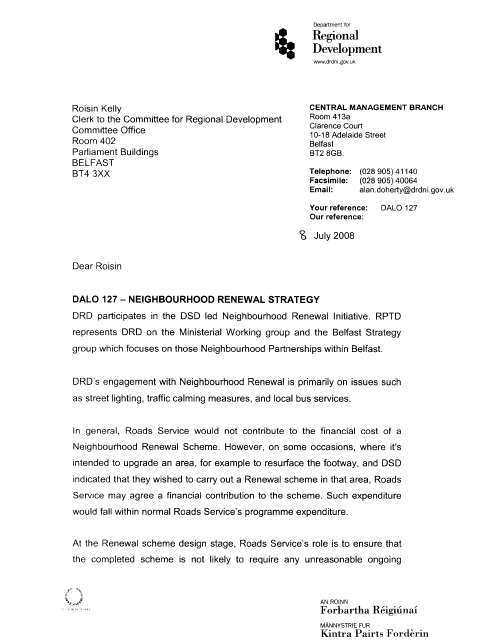
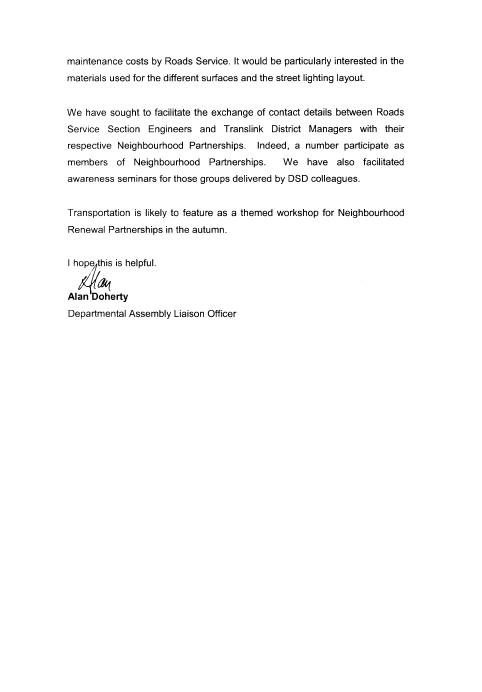
Correspondence from DHSSPS
7 August 2008
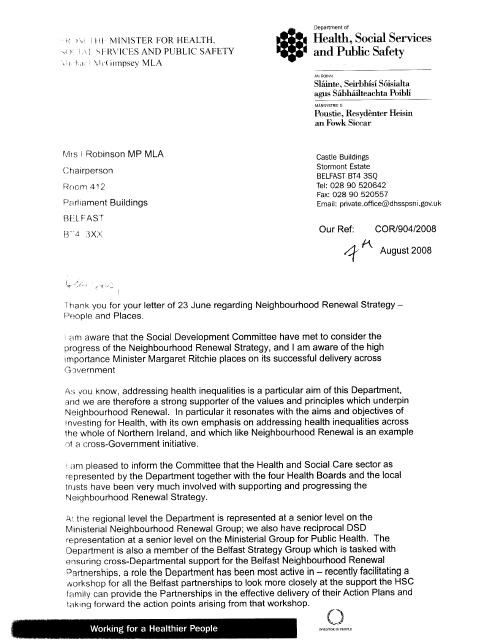
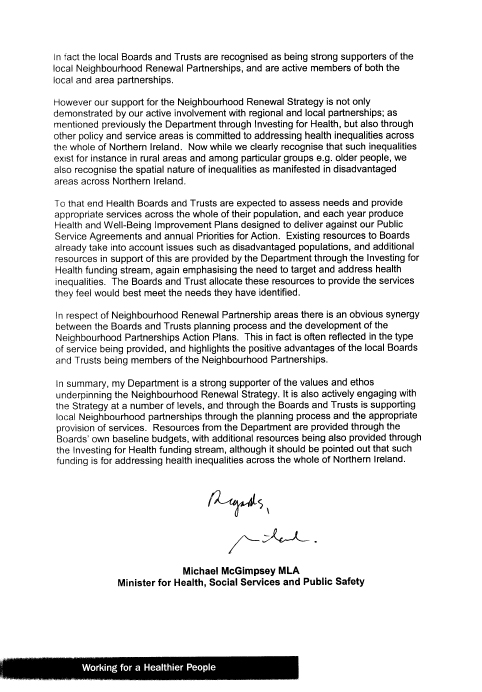
Correspondence from OFMDFM
13 August 2008
| Damien Martin Clerk Committee for OFMDFM Room 406 Parliament Buildings BELFAST BT4 3XX |
 |
|---|
13 August 2008
Dear Damien
Neighbourhood Renewal Strategy
The Committee’s request for clarification on how OFMDFM contributes to the implementation of the Neighbourhood Renewal Strategy refers.
In responding I would wish to highlight that this Department does not provide mainstream services within Neighbourhood Renewal areas but is instead responsible for cross-cutting policy and strategy. However within our development of an overall strategy to tackle poverty and social exclusion here we have recognised Neighbourhood Renewal as one of the key area-based strategies which will have an important impact on achieving strategic targets for poverty reduction.
OFMDFM is represented on the Ministerial led Neighbourhood Renewal Group which meets quarterly. Officials from the Central Anti-Poverty Unit also liaise regularly with colleagues within DSD’s Neighbourhood Renewal Unit to ensure consistency between the overarching strategy to tackle poverty and social exclusion (Lifetime Opportunities) and the Neighbourhood Renewal Strategy.
In the future, and subject to Executive adoption of a strategy to tackle poverty and patterns of deprivation, we will aim to ensure that indicators of progress, against the strategic targets for poverty reduction, remain consistent with those indicators of progress within Neighbourhood Renewal areas.
Thus, when reporting on progress against strategic targets for poverty reduction, we will be in a position to focus also on progress achieved in those areas in greatest objective need, including Neighbourhood Renewal areas, and the extent to which the gap between these areas and the rest, reduces over time.
I hope that you find this information useful.
Yours sincerely
Signed Gail McKibbin
Gail McKibbin
Departmental Assembly Liaison Officer
Correspondence from DENI
4 September 2008

John Simmons
Clerk to the Committee
Education Committee
Room 241
Parliament Buildings
Stormont
BELFAST
BT4 3XX
Tel No:(028) 9127 9693
Fax No:(028) 9127 9100
Email: john.leonard@deni.gov.uk
Your ref: 363-08-I-02
4 September 2008
Dear John,
Neighbourhood Renewal Strategy
I refer to your letter of 23 June regarding the Committee’s request for a written briefing note on the Department’s involvement in the Neighbourhood Renewal (NR) Strategy following on from the Committee for Social Development’s consultation with Neighbourhood Renewal Partnerships.
The Department fully supports the NR Strategy and is aware that most of the neighbourhood partnerships have identified education as a key issue in neighbourhood renewal areas. We fully recognise the relationship between social deprivation and educational outcomes and that enhancing achievement and levels of literacy and numeracy can provide a route way out of the cycle of deprivation and benefit the economy and society as a whole.
There has been steady progress in overall standards of literacy and numeracy in key stage assessments and in GCSE. However, as was highlighted by NIAO/PAC, much remains to be done and raising standards, particularly of literacy and numeracy, is essential. In particular, pockets of stubbornly low performance levels must be tackled. Any barrier to learning denies individuals, and their families, opportunities to improve their life chances and impedes economic progress.
Action is underway on a number of fronts, to address weakness in the current system and raise levels of performance:
- The Minister has brought forward, and is seeking a legislative framework for, proposals for future post-primary transfer arrangements. These proposals have at their heart the need to address disadvantage and create equality of opportunity. These are proposals for the phased ending of academic selection and the current transfer arrangements – under which children entitled to Free School Meals have half the chance enjoyed by all other children of obtaining a place at grammar schools. These proposals envisage the creation of a unified and collaborative post-primary system:
- Where schools work together to ensure that all children have access to a broad range of post-14 educational pathways; and
- Where young people are matched to suitable provision, not through a mechanism failing 10/11 year-olds and entrenching a two-tier school system, but rather through a mature and informed process of Election at 14 operating in an area-planned and flexible system.
- We have completed consultation on our new school improvement policy “Every School a Good School” and will be finalising this over the next few months. At the heart of this policy lies the expectation that each school is responsible and accountable for its own performance and, through a process of self-evaluation, planning and target setting can improve. Measures will be put in place to support those schools where performance is poor and where improvement is not forthcoming, a formal process will be initiated to consider a range of options.
- Alongside the new policy we are consulting on a revised Literacy and Numeracy Strategy. This strategy emphasises the importance of literacy and numeracy – literacy is the key to all learning – and our expectation that each teacher has a responsibility to support this regardless of the subject they teach. Teachers will have access to various support materials to support pupils in the classroom.
- We are working with other Departments and with the Belfast and Western Education and Library Boards to develop long term, strategic intervention to raise performance in schools in Belfast and Derry. Achieving Belfast was launched by BELB in February 2008 and the Board is refining, an action plan setting out how it will tackle underachievement and raise standards in 19 of its lowest performing schools. The programme for the Derry area is called “Achieving Derry – Bright Futures” and will be launched in September 2008.
A total school improvement fund of approx £7,000k and £1,218k for Achieving Belfast and Derry is available for the above in 2008/09;
- As part of our vision of seeing schools as hubs of their local community we have been encouraging extended schools to engage with Neighbourhood Partnerships as part of the process of developing their Extended School Action Plans. The Extended Schools programme focuses on providing financial support for schools with high percentages of disadvantaged pupils enrolled and involves the provision of activities for pupils before and after school and during the holidays and improved links with statutory agencies and the voluntary and community sector. While there is some evidence of good practice it is fair to say that this is an area for development and we have therefore identified this as a priority area in 2008/09 school year. The Extended Schools Programme was funded at £10.050m in 2006/07 and 2007/08 and at £10,862 in 2008/09);
- In an effort to build understanding and awareness of the potential for joint working between the extended schools and NR strategies we jointly funded a project with DSD’s Neighbourhood Renewal Unit to second two school principals to develop guidance on how to build more effective partnership working between schools and Neighbourhood Partnerships. The resulting draft guidance is currently the subject of a quality assurance process and will, when finalised, be distributed to Neighbourhood Partnerships, community interests and schools serving NR areas;
- The Full Service Demonstration Project at the Girls and Boys Models in North Belfast is seeking to demonstrate how extended provision for children and families and improved integration of services can lead to improved education outcomes for children. More recently, we have given approval in principle to a further model in the Ballymurphy area. This is being taken forward by BELB through the Full Service Community Network centred on Corpus Christi College in West Belfast. It is intended that this project will bring about a new relationship between the school and the community and help remove barriers to learning with a greater uptake of services by children and parents. This requires support from sectors beyond education to help develop the concept for the Ballymurphy community. DSD is represented on the Project boards of both projects.
- There is regular contact between DSD and DE officials on NR issues and a number of small programmes (£10k-£50k) have been developed which contribute to at least one of the strategic objectives of the NR strategy. A key issue in our consideration of these projects has been whether they can simply cease when DSD funding ends and, if not, whether we are likely to have the resources to mainstream the project;
- Colleagues in Education and Library Boards participate in the work of individual Neighbourhood Partnerships where possible. The number of Partnerships in Belfast and the availability of senior staff in BELB has meant that this has not been possible in all cases.
In terms of targets, in addition to those set out in the Public Service Agreements, including one which related to educational performance in Neighbourhood Renewal Areas, the Department has also set out a range of longer term targets in the draft Literacy and Numeracy Strategy issued for consultation on 24th June.
I trust that this information is sufficient to persuade you that this Department has demonstrated its commitment to Neighbourhood Renewal. The Department is determined to raise education performance right across the system and is particularly concerned with addressing educational disadvantage and narrowing the achievement gap. This represents a major challenge and we are acutely aware that, while our policy framework and the efforts of schools and teachers can take us some way towards achieving our aim, the level of success required will only come about if parents and local communities play their part by valuing and supporting education. Neighbourhood Renewal therefore represents an important dimension of our broader education strategy.
Yours sincerely
JOHN LEONARD
Departmental Assembly Liaison Officer
Correspondence from Andersonstown (Upper) Community Forum
1 December 2008
Projected Salary and Revenue Budget Breakdown.
|
Description |
Basis of Apportionment Unit costs |
Year 1 |
Year 2 |
Total |
|---|---|---|---|---|
Salaries |
||||
I.T.C Co-ordinator |
||||
NJC Scale Senior Officer scale 2 point 30 |
£0.00 |
|||
Adjusted inflationary increase 2.475% as per NJC Scales |
£0.00 |
|||
Gross Annual Salary |
37.5 hours |
£25,775.01 |
£25,775.01 |
|
N.I.C |
ENIC 12.8% |
£2,600.32 |
£2,600.32 |
|
Pension @ 6% |
Year 2 etc increased by 2.95% |
£1,546.50 |
£1,546.50 |
|
Sub Total |
£29,921.83 |
£29,921.83 |
||
Tutor costs |
£0.00 |
|||
First Steps in computers |
10 week course x 2.5hr session x Rose x 1 course |
£0.00 |
£0.00 |
|
Internet and Email class |
10 week course x 2.5hr session x Rose x 1 course |
£0.00 |
£0.00 |
|
Computer tea room for older people |
2hr session x Rose x 15 class session x 4 courses |
£0.00 |
£0.00 |
|
50 + Entry level I.T |
10 week course x 2.5hr session x Rose x 1 course |
£0.00 |
£0.00 |
|
ECDL x 3 courses |
34 weeks x 2hrs x £20 per hour x 3 classes |
£4,080.00 |
£4,080.00 |
|
CLAIT |
25 weeks x 2.5hrs x £20 x 1 Course |
£1,250.00 |
£1,250.00 |
|
Summer Digital Computer Club |
4 Hours per day x 3 days x 2 groups |
£0.00 |
£0.00 |
|
Digital Story Telling for Adults |
10 week course x 2.5hr session x Rose x 1 course |
£0.00 |
£0.00 |
|
Digital Imaging |
10 week course x 2.5hr session x Rose x 1 course |
£0.00 |
£0.00 |
|
Childrens digital Photography |
10 week course x 2.5hr session x Rose x 1 course |
£0.00 |
£0.00 |
|
Microsoft Office specialist Access |
15 weeks x 2hrs x £25 per hour x 1 classes |
£750.00 |
£750.00 |
|
Microsoft Office specialist Powerpoint |
15 weeks x 2hrs x £25 per hour x 1 classes |
£750.00 |
£750.00 |
|
Microsoft Office specialist Word |
15 weeks x 2hrs x £25 per hour x 1 classes |
£750.00 |
£750.00 |
|
Microsoft Office specialist Excel |
15 weeks x 2hrs x £25 per hour x 1 classes |
£750.00 |
£750.00 |
|
Sub Total |
£8,330.00 |
£8,330.00 |
||
Childcare Costs |
£0.00 |
|||
First Steps in computers |
£0.00 |
|||
Internet and Email class |
£0.00 |
|||
Computer tea room for older people |
£0.00 |
|||
50 + Entry level I.T |
£0.00 |
|||
ECDL x 3 courses |
£0.00 |
|||
CLAIT |
(6 Kids) Therefore 2 Worker @ £6.48 per 2hr x 22weeks |
£570.24 |
£570.24 |
|
Summer Digital Computer Club |
£0.00 |
|||
Digital Story Telling for Adults |
£0.00 |
|||
Digital Imaging |
£0.00 |
|||
Childrens digital Photography |
£0.00 |
|||
Microsoft Office specialist Access |
£0.00 |
|||
Microsoft Office specialist Powerpoint |
£0.00 |
|||
Microsoft Office specialist Word |
£0.00 |
|||
Microsoft Office specialist Excel |
£0.00 |
|||
Sub Total |
£570.24 |
£570.24 |
||
Overheads |
£0.00 |
|||
Rewritable CD’s |
£0.16 x 100 |
£160.00 |
£160.00 |
|
AQA Registration |
30 people x £11 registration fee |
£330.00 |
£330.00 |
|
Microsoft Office specialist |
Registration £25 per person x 4 modules x 12 |
£1,200.00 |
£1,200.00 |
|
Insurance |
6 projects / £7500 |
£1,250.00 |
£1,250.00 |
|
Cleaning / maintenance |
£0.00 |
£0.00 |
||
ECDL Logbooks |
30 logbooks x £25 |
£750.00 |
£750.00 |
|
Stationery photocopying |
Based on historical estimate of similar project |
£650.00 |
£650.00 |
|
Heat and Light |
Room floor area 25sqmr/tot flr area 703sqmr x£7800 annual bill |
£277.29 |
£277.29 |
|
Auditors Fees |
£3000 total cost / 6 major projects |
£0.00 |
£0.00 |
|
Phone Fax |
£5400 annual cost /12 people |
£450.00 |
£450.00 |
|
Publicity / Promotional Material |
£850.00 |
£850.00 |
||
Miscellaneous |
£0.00 |
£0.00 |
||
Overhead Sub Total |
£5,917.29 |
£5,917.29 |
||
Salary & Overhead Total |
£44,739.36 |
£0.00 |
£44,739.36 |
|
Total salary and overhead costs |
£44,739.36 |
The Category 2 post involves 1 member of staff. This is specifically for the UACF.
I have e-mailed BRO regarding the full list for Andersonstown.
The proposed ICT Project will address barriers through the provision of a structured programme of soft skills such as improving personal development combined with hard skills in the form of accredited ICT provision.
Rose has headed up the ICT Project for 3 years and has a strong track record of delivering both pre accredited and accredited courses for people of all ages locally.
For effective and efficient management of the Project, it is essential to have one member of staff in charge of delivery of programmes, maintenance of the equipment and co-ordination of tutors.
Rose has managed the following projects in terms of ICT delivery,
Training Projects / ICT Training
Essential Skills Project /Build on I.T.
Making IT Work (Personal Development/Career Development)
Youth Employability and Training Project
Accredited OCR Centre
ECDL
ICT career progression for Young People
Cascade Career Development Software
OCR Internet Technologies
Microsoft IT Academy
Quantitative Outputs to date relating to Neighbourhood Renewal Output Measures:
A7: Number of training places sustained/created as a result of the program
From May 2004 – February 2007
370 beneficiaries were recruited to our accredited ICT Training programme with breakdown as follows:
|
Numbers of beneficiaries in ICT training Per Year
|
May 2004 |
May 2005 |
May 2006 |
Total Training Places 2004 - 2007 |
||||
|---|---|---|---|---|---|---|---|---|
|
Male |
Female |
Male |
Female |
Male |
Female |
290 |
||
|
Target Set* |
20 |
50 |
25 |
75 |
35 |
85 |
||
|
Actual Numbers recruited |
28 |
58 |
25 |
84 |
89 |
86 |
370 |
|
* The Programme has increased its target numbers each year and has consistently met, and in most instances, exceeded these in its recruitment figures. Through Word of Mouth and prior to promotion of a new programme timetable, we have a waiting list of 41 people who wish to undertake ICT training at various levels, with the majority of the current programme participants wishing to progress to a higher level of qualification.
B3: Number of residents in area who obtain a qualification on completion of formal training:
|
Highest Qualifications Gained by residents in area |
May 2004 - April 2005 |
May 2005- April 2006 |
May 2006 - March 2007 (Ongoing) |
Total Qualifications |
|||||
|---|---|---|---|---|---|---|---|---|---|
|
Male |
Female |
Male |
Female |
Male |
Female |
Male |
Female |
Total |
|
|
Qualifications below Level 1 |
17 |
30 |
8 |
43 |
30 |
23 |
55 |
96 |
151 |
|
Level 1 |
5 |
9 |
4 |
10 |
8 |
32 |
17 |
51 |
68 |
|
Level 2 |
6 |
14 |
5 |
10 |
12 |
19 |
23 |
43 |
66 |
|
Level 3 |
Not Offered |
Not Offered |
2 |
4 |
5 |
2 |
7 |
6 |
13 |
|
Totals |
28 |
53 |
19 |
67 |
55 |
76 |
102 |
196 |
298 |
All beneficiaries attending Taster sessions moved successfully into structured tutor-led training, with all receiving at least one AQA certificate with most achieving three or more Units. In addition most of the beneficiaries achieving at Level 2 had progressed through the levels and had achieved qualifications at below Level 1 and at Level 1. These achievements are not recorded in the table above, which counts the number of people trained and not the number of qualifications gained by each person.
Correspondence from Brownlow Neighbourhood Renewal Area
1 December 2008
From: Gerry [mailto:gerry.bltd@btconnect.com]
Sent: 01 December 2008 10:33
To: Hamilton, Joy
Subject:
Joy,
There are no “category 2” projects in the Brownlow Neighbourhood Renewal area,
Gerry McIlroy
Correspondence from Downpatrick Neighbourhood Renewal Area
1 December 2008
-----Original Message-----
From: David.Patterson@downdc.gov.uk [mailto:David.Patterson@downdc.gov.uk]
Sent: 01 December 2008 15:16
To: McCallion, Peter
Subject: Neighbourhood Renewal Category 2 projects
Your Ref: CSD/002/2007/PMcC Letter of 28 November
Peter
You requested information on the withdrawal of funding to category 2 Projects, being those that are part funded by DSD.
Existing projects in the Downpatrick Neighbourhood Renewal Area are funded for up to 3 years under the present 2007 - 2010 Action Plan and we are not aware of any withdrawal of funding other than that planned on the completion of these agreed projects. We fully expect additional and relevant new or extended projects to take the place of current activity based on our annual reviews of our rolling plan.
As such I do not think the Committee’s queries are relevant to the position in Downpatrick.
I hope this is helpful
David Patterson
Local Development Programmes Manager
Down District Council
Magh-Inis House
8 - 10 Irish Street
Downpatrick BT30 6BP
Office Tel: 028 44 617 667
Mobile: 079 71 567 894
Fax: 028 44 619 789
e-mail:david.patterson@downdc.gov.uk
Correspondence from Lenadoon Neighbourhood Renewal Area
1 December 2008
1 December 2008
-
The number of projects that have been identified as “category 2”;
There are two Category Two Projects in the Lenadoon Neighbourhood Renewal Area.
The Lenadoon Womens Group Family Support Project and Glen Community Parent Youth Group Youth Project
-
A brief description of the “category 2” projects
The Lenadoon Womens Group Family Support Project has a Full-time Co-ordinator and a Part-time Family Support Worker employed under the Neighbourhood Renewal Funding. They also have four sessional workers and volunteers who do the Home Visitation and Family Outreach Work.
The other Category Two Project is the Glen Community Parent / Youth Group Youth Co-ordinator Post. This Postholder is the only full time Youth worker in a Neighbourhood of over twelve thousand people. The Youth Co-ordinator supervises four part-time and eight sessional / volunteer youth workers.
Funding for all three Category Two Posts is due to end in March 2009 and the loss of these three posts will have a devasting impact in the local area. The Lenadoon Womens Group Family Support Project is the only Project of its kind in both the Lenadoon and Andersonstown Neighbourhood Renewal Areas. They take referrals every week from Health Visitors, Social Workers, G.P.s and Community Projects based in both Neighbourhood Renewal Areas. We have been in negotiations with Senior Officials from both the Department of Health and the Belfast Health and Social Care Trust about the long term mainstreaming of this Project and believe that this is possible by April 2010. The most vulnerable within our community will suffer should this category two funding end in March 2009. In particular, the families of children who are on the Child Protection Register or “In Care” will suffer most. The Home Visitation and Parenting support that these individuals and families receive from Lenadoon Womens Group will end with no other local provider able to offer the service.
Should the Category Two funding for Glen Parent / Youth Group Youth Co-ordinator end in March 2009 then it will have a devastating effect on Youth Services in the Neighbourhood. The Co-ordinator as the only full-time Youth Worker locally, facilitates and co-ordinates the Lenadoon Youth Providers sub group. He plans and co-ordinates youth programmes throughout the area and is the liaison person for local primary and secondary schools. He delivers Community Safety Programmes in the schools and organises an After-Schools and Homework Project four afternoons a week. He also Co-ordinates youth activities in the Glen Community Complex four evenings a week and runs an outdoor five-a-side football league for young people in the area who don’t frequent Youth Centres. He works with the Suffolk Lenadoon Interface Group and other Cross Community Groups on cultural diversity, Education and Drama initiatives. He also supervises twelve youth leaders / volunteers in the Neighbourhood. Should this Category Two Post end in March 2009 then most of these Youth Projects will come to an end.
- The number of jobs that have been lost or are to be lost as a consequence of the current or future discontinuation of funding for “category 2” projects;
The number of jobs lost would be three should funding end in March 2009.
- An estimate of the “category 2” funding withdrawn, or to be withdrawn;
Almost £75,000.00 in salaries and services would be withdrawn should category 2 funding be ended in March 2009.
- An indication of the key deprivation indicators in your Neighbourhood Renewal area that may be adversely affected by the current or future withdrawal of funding to “category 2” projects.
The key deprivation factors in relation to these three Category Two posts as identified by Deloitte in the Lenadoon Neighbourhood Action Plan were as follows:
Statistical information from the Lenadoon Community Renewal Plan 2005 – 2010 (Appendix Three Baseline Study) includes
Child Poverty –Glencolin Ward
The Child Poverty index ranks all wards in the region on the basis of the number of children living in poverty. A ranking of 1 represents the highest level of child poverty while a rank of 566 represents the lowest level of child poverty. The Glencolin ward is ranked 75 compared with all wards in the region and 28 compared with the 111 wards in Belfast. (Source: www.ninis.nisra.gov.uk)
29% of the population is aged 0-15 years old, this is higher than Belfast LGD (24%) AND Northern Ireland (23%). While the proportion of the Neighbourhood population who are aged 75 and over (3%) is less than Belfast LGD (7%) and Northern Ireland (6%)
Almost half (45%) of households with dependent children in the neighbourhood are lone parents compared to 36% for Belfast LGD and 22% for Northern Ireland. Almost half (49%) of the working age population, 16-74 year olds, have no qualifications.
The figure for both Belfast LGD and Northern Ireland is 42%.
The Lenadoon Neighbourhood contains a higher proportion of households (25%) that contains at least one person with a limiting long-term illness compared to both Belfast LGD (24%) and Northern Ireland (20%).
Data Source: Census 2001 key statistics (Table KS08: Health and Provision of Unpaid Carer)
In addition to a larger percentage of the total population of Lenadoon providing unpaid care than Belfast LGD and Northern Ireland in 2001, over one third (36%) of persons in the neighbourhood who provided this care did so for more than 50 hours per week, this is higher than Belfast LGD (28%) and Northern Ireland (25%)
Almost one fifth of the population of Glencolin Ward (17%) were Disability Living Allowance recipients in 2004. In Belfast LGD and Northern Ireland the figures were 12% and 9% respectively.
In 2001 the proportion of the economically active unemployed was greater in the neighbourhood (17%) than for Belfast LGD and Northern Ireland (7%)
The Neighbourhood Action Plan (Deloitte August 07) highlighted under Social Renewal
- Significant and increasing mental health problems including feelings of isolation, crisis and issues related to post conflict situation-high dependency on prescription drugs.
- Increasing instances of domestic violence and the resultant breakdown in family structures-victims being rehomed in the NHA.
- Increasing numbers of children “At Risk”.
- Increasing numbers of families referred by Health Workers to community services for parental support.
- High levels of drug and alcohol abuse, open air and under age drinking.
Correspondence from Link Community Association 3 December 2008
3 December 2008
Link Community Association Capacity Build Project Overview
The Capacity build project has been developed since 2003 and is currently funded by BRO up to 31st Mar 2009. Its aim is to develop skills that will allow users to; develop effective decision-making processes; engage in strategic and operational planning; analyse local needs; negotiate for resources; deliver programmes; work with people from different traditions and beliefs; represent their community; communicate effectively; contribute to the formation of policies at local level and advocate on behalf of their community.
It has three distinctive strands. Training and education, Advocacy and advice and the Oasis Project.
The Link Training and Education programme, is an innovative programme which actively involves local people from TSN neighbourhoods and communities in the design and delivery of customised training which will enhance their ability to contribute effectively to the social and economic regeneration presently being experienced in west Belfast.
400 people accessed courses from Dec 2004-Nov2005 and Over 500 people accessed courses and training organised by the Link between December 06 and June 08. Link are currently running 18 different classes per week which include IT courses Beginners, Specialist (digital photography video editing etc) CLAIT 2 and ECDL. We also provide classes in Driving Theory, Card Making, Beginners in Oils class, Children’s art class, Self Esteem, Stress management, Anger management, study skills, Beginners Irish, Essential skills Maths and English, We presently have a waiting list for places on some courses. Link has identified a range of training courses, which will enhance the employability of local People and contribute to the regeneration of the area. These courses will be both accredited and non accredited and will be delivered locally with small class sizes and an informal and relaxed atmosphere. All training will be additional and will in no way displace existing training opportunities as we aim to actively target individuals who would not through lack of confidence, fear of institutionalism and officialdom seek training elsewhere.
Because of the high rate of suicides of young people in our area, we will continue to offer self esteem courses to teenagers and parents/grandparents, stress management and anger management and where necessary one to one sessions. We will work closely with organisations/groups who work with these people to research design and deliver courses relevant to them. We also aim to continue offering well being courses such as Positive steps for women and to set up a self help group for women with mental health issues.
We also aim to secure the necessary funding for the completion of the Oasis Project. If successful this will provide a purpose build community centre and sporting facilities for the greater west Belfast area.
We aim to continue with our advocacy and advice service which entails.
- Benefits take up advice. At present this service is provided by volunteers from the Link Women’s Group with Two qualified advice workers and two trainees. The service operates three days per week with home visits to those who are not able to come to the office. Our client base comes from the greater west Belfast area and some from the poleglass/twinbrook area. We also organise and deliver a Big Information and Advice day every Nov which have representatives from Stat bodies and all department of the Social Security Agency. Last year this day resulted in £53000.00 claimed from Andersonstown SSA office in community care grants.
- We will provide a Bi Monthly community bulletin to be delivered to every home in our area which will inform our community of services courses projects etc and also provide other useful information such as Safe homes advice, Health advice.
- We will attract funding and resources to the area via fundraising activities and grants for specific projects.
- We will facilitate/act as broker between local community and service providers-statutory/public through representation on various panels and sub groups and through our advice service.
- We will continue to bring groups together to engage in collaborative ventures that will be to the benefit of the whole of Andersonstown area
- We will Employ and manage staff and volunteers.
- Facilitate other groups by providing physical resources to members and the community and develop and support local organisations.
- Liaise and network with statutory and public agencies and elected representative on behalf of individuals and the greater community.
- Provide volunteering opportunities.
The other part of our Oasis Project is to secure the development of two run down unused gravel pitches in the heart of Andersonstown.
The project will provide facilities for young people to participate in a wide range of sports including soccer/Gaelic football, basketball, volleyball by providing an all weather floodlit astro turf pitch and a new grass pitch with changing and showering facilities. Provide a Community Centre at the heart of a socially deprived area which will provide advice, training opportunities, meeting rooms, indoor climbing wall and a Social meeting area.
Correspondence from Link Community Association 3 December 2008
Peter McCallion
Committee Clerk
Room 412
Parliament Buildings
Belfast
BT4 3xx
3/12/08
Dear Peter
Tish Holland asked me to Email you with a brief description of our “Category 2” project and the funding to be withdrawn from March 2009. Only one of our posts are “Category 2” but if we do not get the funding for this post we will lose all our posts which are Project Manager F/T Training and education Officer F/T and Admin/finance Officer P/T.
The approx cost of the withdrawn funding is £86,000.00
The Link community Association is greatly affected by the decision to place the education element of our organisation in category 2 and is therefore not funded by DSD after March 2009. Because it has been deemed that the training and education element is the bulk of the work that this organisation delivers, our Cat 1 element, Project managers post and Admin /Finance post and associated running costs are also not been funded after Mar 2009 if we do not secure the funding for the Cat 2 posts.
We are a neighbourhood renewal area and our community organisations operate mainly in the Andersonstown 2 and 3 wards and Glen road 1, 2, and 3 all of which are in the top 20 most deprived areas and two are in the top 10%.
If we do not secure the funding for the Training and education officer and programme costs by Mar 2009 this community organisation will close. As well as the immediate withdrawal of all training courses and opportunities, this will also mean the closer of our Independent Benefit Advice service, our personal development programme which is designed and delivered by our training and education officer, our lobbying and liaising services with statutory organisations and the scraping of all plans for the Oasis Project.
Links closure will also mean that the six local organisation affiliated to the Link will find it difficult to continue the work they do as they will not have the benefit of facilities, equipment, Advice and assistance and an address. These groups are Link Youth and Young Adult group who work with youths in our area on an outreach basis, organise a Summer scheme annually, Organise day trips throughout the year, organise a night out to the Christmas Panto annually. Link Women’s group organise and run Welfare benefit advice service on an appointment basis and out reach, organise courses on self development for women, first aid, etc, organise an alternative therapy day annually, organise self defence classes, day trips throughout the year. Middle Andersonstown Festival group organise large local festival every August, Halloween Disco, Santa letters annually, Link Pensioners Group, Slieve Residents and Binguin/Bernagh Residents.
As well as the groups that will be affected we also have thirty active volunteers on our register that will no longer have opportunities for volunteering.
Please find attached further details as requested by you about our Cat 2 element. If you require any further information please do not hesitate to contact me at the above number.
Yours Sincerely
Barbara Lynn
Project manager

Research and Library Services
Briefing paper prepared for the Social Development Committee on:
Neighbourhood Renewal in Scotland, England and Wales
Introduction
The purpose of this briefing paper is to provide the Committee with a broad overview of neighbourhood renewal arrangements in Scotland, England and Wales. The paper examines the structures for neighbourhood renewal in each of the jurisdictions and explores a number of other relevant issues such as governance arrangements, target setting and progress monitoring, and the allocation and management of budgets.
Scotland
The Strategy
1. The framework for regeneration and neighbourhood renewal in Scotland is set out in ‘Better Communities in Scotland – Closing the Gap’, published by the Scottish Executive in June 2002[1]. The central aim of the strategy is to tackle the inequalities between communities by narrowing the gap between the most disadvantaged communities and the rest of Scotland. The strategy recognised that an important vehicle in achieving this aim was the network of Social Inclusion Partnerships (SIPs) throughout Scotland.
The Delivery Model: Social Inclusion Partnerships and Community Planning Partnerships
2. Social Inclusion Partnerships (SIPs) were established in 1999 as a key part of the social justice policy agenda in Scotland. There were 48 Social Inclusion Partnerships, of which 34 were area-based initiatives and the other 14 thematically-based partnerships (e.g. health; young people; black and minority ethnic communities etc.). Thematically-based SIPs focused upon the social exclusion of specific social groups rather than specific areas of deprivation[2].
3. SIPs were multi-agency partnerships comprised of representatives from, for example, Local Authorities, Health Boards, further education providers the private sector, and local voluntary and community bodies. They monitored at national level by Communities Scotland and funded through the Social Inclusion Partnership Fund.
4. However, it was recommended in ‘Better Communities in Scotland – Closing the Gap’ that SIP funding and the role of SIPs in tackling poverty and regenerating local communities, be integrated into new local Community Planning Partnerships (CPPs). Each local authority area in Scotland has a CPP facilitated by the local authority and whose membership comprises of key public, private and community organisations in that area.
5. In 2004, the Scottish Executive established a Community Regeneration Fund to replace the Social Inclusion Partnership Fund and the Better Neighbourhood Services Fund. The CRF is focussed on the most deprived 15% of areas identified by the Scottish Index of Multiple Deprivation 2004. The new CPPs had to set out, through three-year Regeneration Outcome Agreements (ROAs) how they intended to use the new Community Regeneration funding, alongside their own resources, to deliver specific regeneration outcomes[3]. The rationale for this was to move away from project-based funding and to ensure that local regeneration takes place within the wider strategic context of community planning so that core services and core budgets are working together.
6. The process of integration between SIPs and CCPs began in 2003/04. However, before the formal integration process could begin, each CPP had to demonstrate that it was ready to integrate SIPs into their community planning framework through the submission of a ‘Statement of Readiness’.
Community Planning Partnerships: Governance Arrangements
7. The Local Government in Scotland Act 2003 provides the legislative basis for Community Planning Partnerships (CPPs). It places a statutory duty on local authorities to initiate and facilitate community planning through the creation of Community Planning Partnerships. The Act also places a statutory duty on other agencies to engage in community planning on different levels, i.e.:
- Local authorities – have a duty to initiate, facilitate and maintain Community Planning;
- Core partners (e.g. health boards, enterprise networks, police, fire and regional transport partnerships) – have a duty to participate in Community Planning; and
- Scottish Ministers – have a duty to promote and encourage Community Planning[4].
8. Each CCP has strategic Community Planning board. In many of the CPPs the Board is chaired by a local councillor (in some cases a senior local councillor) and membership consists of senior executive representatives from local statutory bodies (e.g. police, health and social care, transport etc). The size of CCP boards and the degree to which private sector and community and voluntary sector participate can vary between local authority areas[5]. For illustrative purposes, Table 1 provides some background information on Glasgow Community Planning Partnership.
9. Day to day performance management for community planning priorities is usually delegated from the CPP board to theme groups (e.g. community safety, health, community regeneration, employment and lifelong learning, environment and transport). CPP boards play a key role in holding these groups to account for their progress against action plans.
10. In a review of CPPs in 2006, Audit Scotland suggests that CPPs have developed highly complex structures. For example, an audit of partnership working in North Lanarkshire CPP revealed that 53 different groups were working within the CPP, some of which were supported by further groups. The Audit Scotland report highlights that one of the objectives of the community planning legislation was to help to rationalise structure. However, in their report Audit Scotland maintained that CPPs had not helped to rationalise the number or complexity of partnerships in any significant way[6].
Table 1: Glasgow Community Planning Partnership[7]
|
The Glasgow Community Planning Partnership was established in 2004 and is made up of a number of key public, private and community organisations many of which are required by law to participate in community planning. The Glasgow Community Planning Partnership Strategic Board consists of: Glasgow City Council; Glasgow Housing Association; NHS Greater Glasgow and Clyde; Strathclyde Fire and Rescue; Strathclyde Police; and, Glasgow Chamber of Commerce. The Board is chaired by the Deputy Leader of Glasgow City Council and it is reported that each organisation on the council is represented at the ‘highest executive level’. The Board meet three times per year. In addition to the work of the overall Glasgow CPP, there are ten local CPPs across the City, each with its own Board with a degree of delegated decision making powers within local boundaries. These partnership boards provide membership opportunities to a broader range of strategic partners including Glasgow Council for the Voluntary Sector, Jobcentre Plus, Culture and Sport Glasgow, five Local Regeneration Agencies, local residents, and representatives from the further education sector etc. Each local partnership board also has a Community Reference Group (CRG) consisting of representatives from community based organisations. The CRG aim to give a voice to local residents. The Glasgow CPP has a ‘Memorandum of Understanding’ which commits the partnership to, amongst other things, develop a clear and long term vision for the city that sets out joint priorities, performance indicators and targets. |
11. The Audit Scotland report further highlighted that some difficulties arose from the new partnership governance arrangements. For example, the different boundaries, accountabilities and financial regulations in partner organisations can make community planning and joint working difficult. The operational boundaries of statutory partners usually differ from those of the local authority and the Audit Scotland report suggests that this can cause delays in decision making and additional bureaucracy. Additionally, for statutory bodies involved in more than one CPP (e.g. police and fire services, NHS boards and enterprise networks) there can be considerable demands on senior managers of such bodies to prepare for and attend different CCP meetings[8].
12. The Audit Scotland report also highlighted that the various bodies represented on CPP boards are accountable to different accountability structures and that this can have practical implications on how CPPs function and can also create tensions between community planning partnerships. For example, local authorities, fire and rescue authorities and regional transport partnerships are accountable to locally elected members (and ultimately the community through elected representatives). NHS Boards are accountable to Scottish Ministers and ultimately to the Scottish Parliament.
Management and Allocation of Budgets
13. The most significant source of funding available to CPPs is the Community Regeneration Fund (CRF), £318m over a three year period (2005-2008) was allocated to CPPs to improve Scotland’s most deprived areas. However, the range of other funding streams available to CPPs is complex; for example in 2005/06 the Audit Commission estimated that the Scottish Executive provided at least 42 different funding streams totalling around £685.1 million intended to be spent through partnership working. Each funding stream usually has its own application process and monitoring and reporting arrangements. Audit Scotland suggests that whilst it is important to maintain control over public funds, this system increases the bureaucratic workload of partnerships and creates an administration burden on the lead agency responsible for managing the funds[9].
14. CRF funding ended in 2008 and has been replaced by the Fairer Scotland Fund (FSF), a new ring-fenced fund aimed at tackling poverty and deprivation across Scotland[10]. The fund, totalling £435m over 3 years, is allocated to CPPs to enable them to ‘tackle area based and individual poverty and to help more people access and sustain employment opportunities’. The aims of FSF are three-fold:
- Regeneration of disadvantaged communities;
- Tackling poverty by helping vulnerable people and groups; and
- Overcoming barriers to employment.
15. Allocations of the fund are informed by objective evidence of levels of need in each area, using the Scottish Index of Multiple Deprivation 2006[11]. This takes into account both concentrations of multiple deprivation and patterns of individual deprivation. The fund is allocated to CPPs and it is for them to decide how they wish to allocate resources locally to meet their priority outcomes.
16. Progress is tracked through Single Outcome Agreements (see next section for further details on SOAs). Initiatives supported by the fund are driven by local circumstances and priorities in each area. They range from employability and financial inclusion initiatives in Dundee, a shopmobility service in East Ayrshire, a benefits uptake and fuel poverty advice for the elderly project in Falkirk, to a mentoring support project to help ‘looked after’ young people in Renfrewshire. The Fairer Scotland Fund is ring-fenced until March 2010 to allow all CPP priority outcomes linked to regenerating communities, tackling poverty, and overcoming barriers to employment to be fully embedded within SOAs[12].
Target Setting
17. A significant number of CCPs set and monitor area targets through Single Outcome Agreements (SOAs). SOAs resulted from the Concordat between the Scottish Government and the Convention of Scottish Local Authorities (COSLA) (November 2007) which set out the terms of a new relationship between the Scottish Government and Local Government, based on mutual respect and partnership[13]. Each CPP SOA is based upon 15 ‘National Outcomes’ (see Table 2) which were agreed in the Concordat. CPPs are expected to commit to supporting progress at national level through improvement in outcomes at local level.
18. The Scottish Government has developed a set of 45 ‘National Indicators’ (see Table 3) to track progress towards outcomes which include explicit targets. Local Government has developed a ‘Menu of Local Indicators’[14] that CPPs can select from to monitor progress at a local level. This is a ‘live’ menu where the scope and coverage of indicators will expand over time to support the ongoing development of SOAs. The menu includes links to relevant national data sources (e.g. Scottish Index of Multiple Deprivation, Scottish Household Survey etc.) which can be used at local authority level. However, CPPs are free to use other local indicators they feel are relevant to their outcomes (e.g. locally generated qualitative information such as residents’ and services’ user’s views of the quality of life in local areas).
Table 2: 15 National Outcomes[15]
|
1. We live in a Scotland that is the most attractive place for doing business in Europe. 2. We realise our full economic potential with more and better employment opportunities for our people. 3. We are better educated, more skilled and more successful, renowned for our research and innovation. 4. Our young people are successful learners, confident individuals, effective contributors and responsible citizens. 5. Our children have the best start in life and are ready to succeed. 6. We live longer, healthier lives. 7. We have tackled the significant inequalities in Scottish society. 8. We have improved the life chances for children, young people and families at risk. 9. We live our lives safe from crime, disorder and danger. 10. We live in well designed, sustainable places where we are able to access the amenities and services we need. 11. We have strong, resilient and supportive communities where people take responsibility for their own actions and how they affect others. 12. We value and enjoy our built and natural environment and protect it and enhance it for future generations. 13. We take pride in a strong, fair and inclusive national identity. 14. We reduce the local and global environmental impact of our consumption and production. 15. Our public services are high quality, continually improving, efficient and responsive to local people’s needs. |
Table 3: A Selection of the 45 National Indicators and Targets[16]
|
Indicator 10: Decrease the proportion of individuals in poverty. Indicator 16: Increase healthy life expectancy at birth in the most deprived areas. Indicator 18: Reduce alcohol related hospital admissions by 2011. Indicator 21: Reduce mortality from coronary heart disease among the under 75s in deprived areas. Indicator 27: Increase the rate of new house building. Indicator 28: Increase the percentage of adults who rate their neighbourhood as a good place to live. Indicator 31: Increase positive public perception of the general crime rate in local area. |
19. Each SOA should also include a number of ‘Intermediate Outcomes’ which measure the shorter-term benefits and changes for citizens and the community resulting from the activities of an organisation or service over the medium term. Intermediate achievements are expected to lead to large outcomes in the long term.
Progress Monitoring
20. The methods by which each CPP monitors and reports on progress against targets can vary. A significant number of CPPs have given a commitment to report progress on the Single Outcome Agreement annually via their websites[17]. Some groups, such as Aberdeen CPP, have given a commitment that each of lead partner will report on a six monthly basis demonstrating what action has and will be taken to deliver on each outcome, including identifying risks which might impede delivery[18]. Additionally, the vast majority of CPPs have their own dedicated websites which keep residents and other local stakeholders informed through the publication of SOAs, Community Plans and CPP Board minutes.
England
The Strategy
21. In January 2001, the Cabinet Office published ‘A New Commitment to Neighbourhood Renewal: National Strategy and Action Plan’[19] which set out the Government’s vision for neighbourhood renewal in England. The Strategy’s main aspiration is that within 10 to 20 years time no-one in England should be seriously disadvantaged by where they live.
The Delivery Model: Local Strategic Partnerships
22. A central part of the Neighbourhood Renewal Strategy is the creation of Local Strategic Partnerships (LSPs). A LSP is a non-statutory body that brings together the different parts of the public, private, voluntary and community sectors at a local level. The lead player in the LSP is the local council. LSPs are tasked with developing and implementing local strategies and setting local targets for improving outcomes in deprived neighbourhoods.
Governance Arrangements[20]
23. The majority of LSPs are not corporate bodies, although a handful are organised as companies limited by guarantee. As a result, the working relationships within the LSP and the governance arrangements are reflected in partnership agreements or other protocols.
24. As non-statutory partnerships, LSPs remain free to define their own constitutions and their own remit. However, an increasing weight of government expectation is placed on LSPs. Many of the individual partner bodies involved now have statutory duties to undertake as part of their partnership work. The Local Government and Public Involvement in Health Act 2007 introduced a new ‘duty to cooperate’. This applies to many public bodies involved as partners on LSPs, and on the sub-partnerships or ‘thematic’ groups which feed into LSPs. Partners in the LSP need to agree targets in their Local Area Agreement (LAA), and identify individual or shared responsibility for meeting them.
Target Setting & Progress Monitoring
25. Local Area Agreements (LAAs) are three-year agreements, developed by local councils with their partners in a LSP. Each LAA is negotiated with the Government Office for the region, before being agreed and signed off by the Secretary of State. Within each area, LAAs are overseen by LSPs. The local authority is the lead partner in the LSP and the statutory ‘responsible body’ for the LAA.
26. LAAs are drawn up by ‘upper-tier authorities’, i.e. counties, unitaries, London boroughs. District councils are also involved in this process in that they are statutory ‘named partners’ in terms of requirements for consultation and co-operation. Therefore, developing an LAA in a two-tier area can be a complex process.
27. As part of the development of LAAs, a growing proportion of government funding streams are now combined in a single Area Based Grant (ABG). This funding is used alongside mainstream budgets to support the achievement of specific ‘improvement targets’ identified in LAAs. Each LAA includes up to 35 such targets, negotiated through the Government Office and subsequently designated by the Secretary of State.
28. The priorities and targets within each LAA are normally drawn from the Sustainable Community Strategy (SCS) for the area. The SCS is a long-term vision (often 10 or 20 years) based on evidence and forecasts of economic, social and environmental trends. An SCS may go through several stages in its preparation and involve extensive consultation with local people.
29. According to the Improvement and Development Agency (IDEA) local councillors also have an active role to play in overview and scrutiny of LAAs, reviewing progress and calling to account those charged with delivering on targets. The Local Government and Public Involvement in Health Act 2007 has strengthened the role of councils in scrutinising the activities of local partners.
30. From 2008, councils and LSP partners are using a range of mainstream funds, coupled with the new Area Based Grant (ABG), to resource the delivery of LAA targets. ABG is a general grant allocated by government to individual areas[21].
Management and Allocation Of Budgets
31. 86 of the most deprived local authorities in England were identified as eligible for funding through the Neighbourhood Renewal Fund (NRF). To qualify for funding each area had to establish its own LSP. Indices of Deprivation are used to allocate funding to specific local authorities. £1.05 billion of NRF resources were made available during the period 2006/08[22].
32. In 2008, NRF was replaced by a new fund, the Working Neighbourhoods Fund (WNF). This fund also incorporates the Department for Work and Pensions ‘Deprived Areas Fund’. The WNF, will form a distinct element of the Area Based Grant (ABG). It will provide resources to local authorities to tackle worklessness and low levels of skills and enterprise in their most deprived areas. The fund will provide the basis for a new approach, recognising the need to tackle worklessness on a community wide basis and including those claiming Jobseeker’s Allowance and those on Incapacity Benefit. The total WNF of £1.5 billion will be allocated, with more than £450million in 2008-09, and over £500million in 2009-10 and 2010-11[23].
Wales
The Regeneration Programme
33. ‘Communities First’, which has been in operation since 2001, is the Welsh Assembly Government’s long term regeneration programme aimed at ‘improving the living conditions and prospects for people in the most disadvantaged communities in Wales’.
34. The programme supports 132 spatially targeted community regeneration partnerships at electoral (ward) level or sub-ward level comprising of:
- The 100 most deprived electoral divisions as identified by the 2000 Welsh Index of Multiple Deprivation (WIMD); and
- 32 sub-ward ‘pockets of deprivation’.
In addition to these, 10 projects of special interest were supported under the programme on the basis of the specific needs of identified groups (e.g. physical disability, victims of domestic violence, minority ethnic groups). Following a revision of the Welsh Index of Multiple Deprivation in 2005 a further 46 Lower Super Output areas were identified for support[24]. The inclusion of these new areas means that the programme covers approximately 20% of the population of Wales[25].
The Delivery Model: Communities First Partnerships & Governance Arrangements[26]
35. The key delivery vehicle for ‘Communities First’ is local Community First Partnerships, each is supported by a team of community development workers. The Welsh Assembly Government recommends that the make-up of Communities First Partnerships adheres to a three thirds principle model with one third of members drawn from the local community, one third from the statutory sector and one third from the voluntary/business sectors. The members drawn from the local community should not be outnumbered by the number of members in either one of the two other categories.
36. Statutory sector membership on a Communities First Partnership may be drawn from a wide range of public bodies, e.g. local authorities, local health boards, schools, the police, the fire service, Assembly Government etc. Councillors or elected/appointed members may sit as statutory sector representatives on the Partnership but only if they have been formally delegated to do so by their organisation.
37. Some Communities First Partnerships have sought and acquired legal status in their own right. Others remain informal organisations (in a legal sense) and have selected another body which has legal status (e.g. a local authority or a housing association) to act as a grant recipient body to apply for and administer funding on behalf of the Partnership.
38. In all cases a Communities First Partnership should have a ‘Partnership Agreement’ (also referred to as “rules of procedure” or “constitution”) which governs the arrangement of Partnership business. Each Partnership must also, at their Annual General Meeting (AGM) elect a Chair, Secretary and Treasurer. Information on the outcomes of Partnership meetings, including minutes, action points and other Partnership activities should be circulated to the wider community in an accessible format.
39. The Local Government Act 2000 provided authorities with the power to promote or improve the social, economic and environmental well-being of their area. This power provides an important new tool for local authorities to improve quality of life and contribute to sustainable development within their areas. The responsibilities conferred on local authorities under these powers reflect what are likely to be several of the main priorities for Communities First Partnerships. Guidance produced by the Welsh Assembly Government recommends that the lead department for Communities First in each local authority should meet on a regular basis (at least quarterly) with Community Partnership co-ordinators in their area to discuss strategic issues.
Management and Allocation of Budgets
40. The Communities First Trust Fund was established by the Welsh Assembly Government in 2001, it is a fund to develop social capital in Communities First areas rather than as a strategic fund. The Fund distributes small amounts of funding for activities and projects to community groups and was designed to be ‘red-tape busting’ by reducing the application and evaluation paperwork associated with it. By doing this, the Trust Fund aimed to quickly and easily distribute funds to Communities First areas, thereby developing the feel good factor in areas that had suffered from long-term deprivation.
41. The Communities First Trust Fund is managed on behalf of the Welsh Assembly Government by the Communities First Support Network (CFSN) and administered centrally by Wales Council for Voluntary Action (WCVA) via a team of six staff members who manage an annual budget of over £3 million. Each of the existing Communities First areas has an annual allocation of funds for which community groups working within that area can apply. The 100 ward-based partnership areas are allocated £20,000 per year, as are the 10 communities of interest or imaginative proposals. The 32 areas that are classed as sub-pockets of deprivation are allocated £10,000 annually. The maximum size for an application is £5,000[27].
42. Communities First funding represents a substantial investment of public money in a Communities First Partnership. The Assembly Government, and in particular the Assembly Minister for Social Justice and Local Government, are held to account by the National Assembly for Wales. The Grant Recipient Body is answerable to the Assembly Government in respect of Communities First funding and is responsible for ensuring that the Communities First grant is spent correctly, on the purpose for which the grant was approved, and that the best possible value for money is obtained[28].
Target Setting: Community Action Plans
43. Guidance development by the Welsh Assembly Government recommend that each Communities First Partnership should aim to development a strategic Community Action Plan which sets out the aspirations of the wider community, identifies the issues of concern and prioritises actions which the community wishes to adopt. The Guidance document states that,
“The purpose of a Community Action Plan is to share the vision of a community with a range of stakeholders. In particular the plan will need to show the aspirations and solutions identified by the local community on the basis of evidence and their local knowledge. It should be a strategic broad-based document, which is developed and owned by a variety of people with a stake in the community. It should set out realistic actions and targets against which local people can review progress and decide whether things have improved. The Community Action Plan is not a one-off, and should be reviewed and developed over time”.
44. The guidance further states that this need not be overly complex, but that if a plan is to be a living document and regularly updated, then Partnerships need to have a way of checking whether success has been achieved. The guidance stresses that Partnerships should use the Annual Report to keep the Assembly Government’s Communities First Unit fully informed about progress in taking forward Community Action Plans.
Monitoring Progress
45. One of the key roles of the Communities First Partnership is to monitor progress of the Communities First Programme in the local area. In order to do this effectively, the guidance issued by the Welsh Assembly Government states that it is important that there are clear targets, indicators of success, a timescale and a way of evaluating achievements. The Welsh Assembly Government has produced a 2001 statistical Baseline report in which each area can identify priorities and set targets. The Welsh Assembly Government also provide partners with advice and links to other statistical sources in which to set targets and monitor progress (e.g. Welsh Index of Multiple Deprivation[29]).
46. In terms of disseminating widely the impact and progress of Communities First Partnerships, the Welsh Assembly Government published in June 2008, ‘Making A Difference: Good Practice in Communities First’[30], a comprehensive document which showcased best practice and the achievements amongst partnerships in a range of areas such as jobs and business, lifelong learning, environment and housing, community safety etc.
Future Directions: Communities First Next Steps[31]
47. In January 2008, the consultation document ‘Communities Next: taking communities forward’ was launched. The document set out proposals for the changes the Assembly Government believed were needed to the Communities First programme. The consultation closed on 1 May 2008. The consultation included responses from a range of sources including Local Authorities and Communities First Partnerships and were broadly supportive of the suggested way forward, i.e. that Communities First should have a clearer focus on practical regeneration initiatives and on tackling poverty, particularly child poverty and income generation. The Welsh Assembly Government has also expressed a commitment to further develop Communities First into an outcomes focused Programme, with a greater proportion of resources targeted at front line delivery and less on administration and support.
48. The new phase (running for 3 years from 2009) will include the following changes:
- Failing Partnerships - Arrangements will be set in place to identify and target support for partnerships which are struggling to make an impact locally;
- Critical Success Factors - the Programme will develop a set of criteria for success which will provide a consistent and stable point of reference for Partnerships to aspire to and be measured against;
- Vision Framework: the new revised Framework will re-state the key themes for the work of Partnerships and be used to help set priorities, identify partners and the actions necessary to tackle those priorities;
- Partnership Funding: more proportionate and consistent staffing and funding arrangements will be developed, taking account of population sizes. Although the majority of existing posts and activities will continue for at least a further three years, some current funding arrangements will not be renewed after April 2009.
49. From 1 April 2009, Communities First Partnerships will also provided support through a new fund, the Communities First Outcome Fund which will be divided into two categories:
- Funding - To provide a core staff team and overhead costs to support CF Partnerships to deliver their local Programme; and
- Outcomes Funding – To develop and deliver new activities, services and projects for the benefit of CF Communities.
50. Applications can be submitted for activities and services that benefit one or more than one Communities First area within a county or county borough area, and also across county areas. Applications must be linked to the Work Programmes and Action Plans of one or more Communities First Partnerships. The Fund will normally provide up to a maximum of £300,000 for up to a three year period. The minimum value of an application is £5,000 in a financial year, and £25,000 over 3 years. Proposals must be able to demonstrate outcomes achieved and positive change/improvement for the community/in the community receiving funding[32].
2 February 2009
[1] Scottish Executive (2002) Better Communities in Scotland – Closing the Gap. The Scottish Executive’s Community Regeneration Statement. www.scotland.gov.uk/Resource/Doc/46729/0031676.pdf
[2] Communities Scotland (2007). Learning Lessons from Thematic Social Inclusion Partnerships. www.communitiesscotland.gov.uk/stellent/groups/public/documents/webpages/pubcs_017193.pdf
[3] Communities Scotland website: www.communitiesscotland.gov.uk/stellent/groups/public/documents/webpages/cs_008070.hcsp#TopOfPage
[4] Information extracted from the Community Planning website - www.improvementservice.org.uk/community-planning/about-us.html
[5] Audit Scotland (2006) Community Planning: An Initial Review. www.audit-scotland.gov.uk/docs/central/2006/nr_060616_community_planning.pdf
[6] Ibid, p17.
[7] Information extracted from the Glasgow Community Planning Partnership website, www.glasgowcommunityplanningpartnership.org.uk/
[8] Ibid, p14.
[9] Ibid, p14.
[10] The Fairer Scotland Fund replaced seven funds – Community Regeneration Fund, Community Voices Fund, Working for Families Fund, Workforce Plus, More Choices More Chances, Financial Inclusion Fund, and Changing Children’s Services Fund.
[12] Information extracted from www.scotland.gov.uk/Topics/Built-Environment/regeneration/fairer-scotland-fund
[13] From 2010 it is anticipated that all Community Planning Partnerships will become responsible for producing Single Outcome Agreements.
[14] Improvement Service (2008) Menu of Local Outcome Indicators (Version 3) www.improvementservice.org.uk/core-programmes/single-outcome-agreements-/
[15] Improvement Service (2008) SOA Development and Self Assessment Toolkit. www.improvementservice.org.uk/core-programmes/single-outcome-agreements-/
[16] Improvement Service (2008) Single Outcome Agreements: Guidance, Format and Indicators for Scottish Local Government. www.improvementservice.org.uk/core-programmes/single-outcome-agreements-/
[17] The vast majority of CPPs have their own websites containing their SOAs and Community Plans (e.g. Glasgow CPP - www.glasgowcommunityplanningpartnership.org.uk/gcpphome.aspx; Aberdeen CPP www.communityplanningaberdeen.org.uk).
[18] Aberdeen City Alliance (2008) Community Plan Update 2008 and Single Outcome Agreement 2008-2011.
[19] Cabinet Office (2001) A New Commitment to Neighbourhood Renewal: National Strategy and Action Plan. Report by the Social Exclusion Unit. www.neighbourhood.gov.uk/publications.asp?did=85
[20] Information in the ‘Governance Arrangements’ and ‘Target Setting’ sections are largely drawn from the Improvement and Development Agency website, www.idea.gov.uk/
[21] Improvement and Development Agency, www.idea.gov.uk/idk/core/page.do?pageId=6908743
[23] Department for Work and Pensions (2007) The Working Neighbourhoods Fund.
www.partnersinsalford.org/working-neighbourhoods-fund.pdf
[24] Adamson, D. & Bromily, R. (2008) Community Empowerment in Practice: Lessons from Community First. Joseph Rowntree Foundation. www.jrf.org.uk/sites/files/jrf/2157-community-wales-empowerment.pdf, p4.
[25] Welsh Assembly Government (2007) Communities First Guidance 2007. http://wales.gov.uk/dsjlg/publications/communityregendevelop/cfguidance07/guidancee?lang=en, p3
[26] The information in the following sections has been largely drawn from Welsh Assembly Government’s (2007) Communities First Guidance 2007.
[27] Welsh Assembly Government (2007) Evaluation of the Communities First Trust Fund: Research Summary. Research conducted by Wavehill Consulting, http://new.wales.gov.uk/dsjlg/research/cftrustfund/summarye.doc?lang=en, 2.
[28] Welsh Assembly Government (2007) Communities First Guidance 2007.
[29] Welsh Index of Multiple Deprivation, http://wales.gov.uk/topics/statistics/theme/wimd/?lang=en
[30] Welsh Assembly Government (2008) Making a Difference: Good Practice in Communities First. http://wales.gov.uk/dsjlg/publications/communityregendevelop/making/guide.pdf?lang=en
[31] Information extracted from the Welsh Assembly Government Communities First webpages, http://wales.gov.uk/topics/housingandcommunity/regeneration/communitiesfirst/faq/;jsessionid=Q1MsJH7pT9s2kC2nzfc2XZf94Qd5WKw9sRQ2WRTJHNJzdwbwDnRT!335850833?lang=en
[32] Welsh Assembly Government. Communities First Programme Funding – Guidance and Factsheet. http://wales.gov.uk/topics/housingandcommunity/regeneration/communitiesfirst/publications/outcomes/?lang=en
Appendix 8
List of Neighbourhood Renewal Partnerships
|
Andersonstown Neighbourhood Renewal Partnership |
West Belfast Partnership Board |
218-226 Falls Road |
|
Belfast |
|
Armagh Neighbourhood |
333 Mullacreevie Park |
|
Armagh |
|
|
Ballyclare Neighbourhood |
RDO, Northern Division |
62-68 Church Street |
|
Ballymena |
|
Ballymena Neighbourhood |
RDO, Northern Division |
62-68 Church Street |
|
Ballymena |
|
Bangor Neighbourhood Renewal Partnership |
Northern Ireland Housing Executive |
Bangor District Office |
2 Alfred Street |
Bangor |
|
Belfast - Ballysillan/Upper Ardoyne Neighbourhood Renewal Partnership |
Ballysillan Community Forum |
925 Crumlin Road |
|
Belfast |
|
Brownlow Neighbourhood |
711 Rosmoyle |
Brownlow |
|
Craigavon |
|
Coalisland Neighbourhood |
Derrymagowan |
|
|
Dungannon |
|
Coleraine (East) Neighbourhood Renewal Partnership |
Coleraine Borough Strategy Partnership |
Cloonavin |
66 Portstewart Road |
Coleraine |
|
Coleraine (West) Neighbourhood Renewal Partnership |
Coleraine Borough Strategy Partnership |
Cloonavin |
66 Portstewart Road |
Coleraine |
|
Colin Neighbourhood |
The Colin Centre |
Stewartstown Road |
|
Belfast |
|
Crumlin/Ardoyne Neighbourhood Renewal Partnership |
Cliftonville Community Regeneration Forum |
185 Clifton Park Avenue |
|
Belfast |
|
Downpatrick Neighbourhood |
47 Marian Park |
|
|
Downpatrick |
|
Dungannon Neighbourhood |
Dungannon SureStart |
SureStart Centre |
Unit, 1 Ballysaggart Business Complex, Ballygawley Road |
Dungannon |
|
Enniskillen Neighbourhood |
(Kilmacormick 1 Community Association) |
75 Corban Avenue |
|
Enniskillen |
|
Greater Falls Neighbourhood |
Divis Joint Development Committee |
The Frank Gillen Centre |
1a Cullingtree Road |
Belfast |
|
Greater Shankill Neighbourhood Renewal Partnership |
Greater Shankill Partnership Board |
Spectrum Centre |
331-333 Shankill Road |
Belfast |
|
Inner East Neighbourhood |
East Belfast Community Development Agency |
269 Albertbridge Road |
|
Belfast |
|
Inner North Neighbourhood |
Ashton Centre |
5 Churchill Street |
|
Belfast |
|
Inner South Belfast Neighbourhood Renewal Partnership |
Barnabas Ventures |
4th Floor Imperial House |
4-10 Donegall Square East |
Belfast |
|
Lenadoon Neighbourhood Renewal Partnership (Includes Suffolk) |
41a Suffolk Road |
|
|
Belfast |
|
Ligoniel Village Neighbourhood Renewal Partnership |
Wolfhill Centre |
148 Ligoniel Road |
|
Belfast |
|
Limavady Neighbourhood |
Limavady Borough Council |
7 Connell Street |
|
Limavady |
|
Lurgan Neighbourhood |
14 Springwell Gardens |
Lurgan |
|
Craigavon |
|
Newry Neighbourhood |
Martin’s Lane Area Community Association |
14 Martin’s Lane |
Carnagat |
Newry |
|
North West Portadown Neighbourhood Renewal Partnership |
48 Parkside |
|
|
Portadown |
|
Omagh Neighbourhood |
20 Sunnycrest Gardens |
|
|
Omagh |
|
Outer North Neighbourhood |
88a Drumleck Drive |
Shantallow |
|
Derry BT48 8EW |
|
Outer West Neighbourhood |
17 Killary Road |
Foyle Springs |
|
Derry BT48 0ED |
|
Rathcoole Neighbourhood |
Merville Residents Association |
Merville House |
Merville Garden Village |
Newtownabbey |
|
South West Belfast Neighbourhood Renewal Partnership |
Greater Village Regeneration Trust |
337 Donegall Road |
|
Belfast |
|
Strabane Neighbourhood |
21 Springhill Park |
|
|
Strabane |
|
Triax - Cityside Neighbourhood Renewal Partnership |
Iona Business Park |
Southway |
|
Derry/Londonderry/Doire |
|
Tullycarnett Neighbourhood |
Bradford Court |
Upper Galwally |
Castlereagh |
Belfast |
|
Upper Springfield/Whiterock Neighbourhood Renewal Partnership |
Top of the Rock |
689 Springfield Road |
|
Belfast |
|
Waterside Neighbourhood |
122 Strabane Old Road |
|
|
Derry |
|
Waterside Neighbourhood |
Irish Street Youth and Community Association |
Irish Street Community Centre |
Bann Drive |
Londonderry |
Appendix 9
List of Witnesses
Ms Paula Bradshaw South West Neighbourhood Renewal Partnership
Ms Renee Crawford Lenadoon Neighbourhood Renewal Partnership
Mr Brendan Curran Brownlow Neighbourhood Renewal Partnership
Mr Michael Doherty Lenadoon Neighbourhood Renewal Partnership
Mr Mark Finlay Inner South Belfast Neighbourhood Renewal Partnership
Mr Paul Gallagher Strabane Neighbourhood Renewal Partnership
Mr Charles Lamberton Triax — Cityside Neighbourhood Renewal Partnership
Mr Roy McCartney Armagh Neighbourhood Renewal Partnership
Mr Cathal McCauley Outer North Neighbourhood Renewal Partnership
Mr Damien McIlroy Waterside Neighbourhood Renewal Partnership
Mr John McGrillen Downpatrick Neighbourhood Renewal Partnership
Mr Paddy McMenamin Lurgan Neighbourhood Renewal Partnership
Mr Gerry O’Reilly Newry Neighbourhood Renewal Partnership
Mr David Patterson Downpatrick Neighbourhood Renewal Partnership
Mr Danny Power Greater Falls Neighbourhood Renewal Partnership
Ms Angela Clarke Department for Social Development
Mr Mark O’Donnell Department for Social Development
Mr David Ferguson Department for Social Development
Ms Denise Ferguson Department for Social Development
Mr Mark O’Donnell Department for Social Development
Mr Tony McKibben Department for Social Development
Ms Margaret Ritchie Minister for Social Development

